Cinecultist's reviews that have been appearing over on Kaboose.com:
Slapstick, female empowerment and dreamy Gerard Butler in Nim's Island.
Springy, bright and elastic Whos in Dr. Seuss' Horton Hears a Who.
Raven-Symoné's star wattage and pet pigs in College Road Trip.
Reese Witherspoon's producing debut and Christina Ricci's plastic snout in Penelope.
Michel Gondry's visual styling and the advent of "Swede" as a verb in Be Kind Rewind.
P.S. We've also been doing a little tumblring and are in search of more folks to follow, so let us know if you've also joined. It's 2.0-tastic!
 Innovative Swedish director Lukas Moodysson continues to challenge the devotion of your Cinecultist. Last night, we went to see his most recent work Container at Lincoln Center, where it was playing as a part of the annual Film Comment Selects series and we walked out of the hushed theater perplexed. On the way home, we even contemplated accosting Film Comment's pithy editor Gavin Smith on the platform of the downtown 1 train for some further explanation, but then thought better of it. Sometimes it's better to struggle with the thoughts evoked by a Moodysson movie alone.
Innovative Swedish director Lukas Moodysson continues to challenge the devotion of your Cinecultist. Last night, we went to see his most recent work Container at Lincoln Center, where it was playing as a part of the annual Film Comment Selects series and we walked out of the hushed theater perplexed. On the way home, we even contemplated accosting Film Comment's pithy editor Gavin Smith on the platform of the downtown 1 train for some further explanation, but then thought better of it. Sometimes it's better to struggle with the thoughts evoked by a Moodysson movie alone.
Moodysson has said cryptically that Container is his silent film with sound, which makes sense in a way because the diegetic characters, a cross-dressing fat man and his tiny female Asian alter-ego, don't speak. Instead we hear a continuous train-of-thought voice over from American actress Jena Malone who narrates what seems to be the man's twisted and self-hating inner life. Obsessed with religious iconography, celebrity culture, consumer detritus and cross-dressing, the voice-over is both fascinating and maddening. It leap frogs from topic to topic, musing over Paris Hilton's ubiquitous fame one minute, then gender confusion and the desire to lick everything the next. The droning buzz of Malone's whispers even began to make Cinecultist feel a little ill, which isn't surprising after sitting through the graphic surgery footage in Moodysson's last movie A Hole In My Heart.
Surely anyone paying for a ticket to see this film at this series would expect a challenging movie, but apparently a bunch of the audience members weren't digging Moodysson's avant-garde experimentation because at the 20 minute mark about 15 or so people boldly got up and exited the theater. Cinecultist though wasn't tempted to flee, we still wanted to see where Container was going. As the final pixelated gray image cut to black, we didn't have a concrete conclusion on Moodysson's purpose, though it seems clear that the movie is interested in false exteriors masking true interiors. We're all containers for something, etc. Interestingly, of all the oddities that flashed past in the 72 minutes, that shot of the beige cooked ravioli swirling around the bathtub was perhaps one of the most oddly unsettling images from the whole proceeding. Don't ask us why. It was just too weird for words.
Thank goodness, Cinecultist found out that our man Lukas doesn't intend to stay on this provocative avant-garde track for ever. As he says in a Channel 4 article on Moodysson and an exhibit of his work at London's Institute of Contemporary Art:
"I'm thinking of going back to making a film that's not about broken or ruined things but whole things," he says surveying the jumbled chaos of his installation. "I had all these things in the room where I write. But when I started working on the exhibition I had to clear everything out. My room is empty and clean and that's inspiring me. My next film is mainstream and totally linear. I need to tell simple stories again."
Screw the much anticipated Indiana Jones trailer—Cinecultist is super duper psyched to get a taste of Sisterhood of the Traveling Pants 2! No official site yet but it's supposed to hit theaters on August 8. Yay.
Speaking of sappy chick movies you think you will be embarrassed to buy a ticket for, Cinecultist heartily agrees with A.O. Scott's assessment that in the sea of horrendous dreck passing for romance in Hollywood Definitely, Maybe is one of the most interesting romantic comedies we've seen in a long time. Page Lindsay: it actually has smart, interesting, culturally literate women characters! Isla Fisher's character April is introduced in a The Smiths t-shirt, travels the world on a lark and can express an opinion, while Rachel Weisz's character Summer unapologetically sleeps with her brilliant advisor, has a kid on her own but also knows the lyrics to a standard like Gershwin's "I've Got a Crush On You." The general adorableness of Ryan Reynolds plays a worthy foil to these rockin' chicks. Plus, the movie includes some choice New York locations like Cafe Gitane in Nolita and Odeon in Tribeca. The premise may be cribbing HIMYM (btwm new episodes Mar. 17), but all in all a cute little movie that's worth seeing over the long holiday weekend.
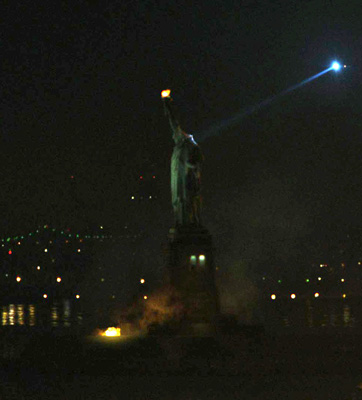 On Saturday, Cinecultist and Matty attended an afternoon screening of Cloverfield at Kip's Bay. Obviously it was the activity for your group of bros, about 10 dudes were all in a line in the row next to us and smatterings of other groups dotted the theater. But that's not surprising since producer J.J. Abrams and his crack marketing team have been working overtime the last few months to get as many bodies into the theater as possible for their star-free, DV monster movie.
On Saturday, Cinecultist and Matty attended an afternoon screening of Cloverfield at Kip's Bay. Obviously it was the activity for your group of bros, about 10 dudes were all in a line in the row next to us and smatterings of other groups dotted the theater. But that's not surprising since producer J.J. Abrams and his crack marketing team have been working overtime the last few months to get as many bodies into the theater as possible for their star-free, DV monster movie.
However this chick wasn't as enamored with the mayhem we saw on screen as other movie geeks have been. The "found video tape" structure of the movie and its lack of compelling characters hobbles it unnecessarily. Cinecultist doesn't want to watch YouTube videos for more than a few minutes, so we certainly don't want to spend 84 minutes with an action movie indebted to a shaky cam, amateurish YouTube aesthetic. Any visceral thrill just gets completely overtaken by annoyance.
Unlike other entries in the city stomping monster genre, such as Godzilla or The Host, Cloverfield gives us characters without any agency. Rob and his party-going friends can't do anything to fight back against the monster that's invaded their city, they can only run around midtown scared. But, because the camera (toted by Rob's buddy Hud) is showing the story entirely from their point of view, the viewers spend the duration of the film forced to either align ourselves emotionally with these clueless, freaked out morons or distance ourselves, declare it "just a movie" and revel in the "coolness" of seeing New York City decimated without reason. As a person who moved here in the fall of 2001, that's a tough place to choose to be in, even six plus years later. Ultimately, neither of these reactions to the movie were satisfying and the whole mess turned us off. In fact, we could hardly wait for the unidentified monster to eat the stupid 20 something characters. Hopefully that chatty one, Hud, didn't give him indigestion.
We'd also like to mention that we've been pleased to discover Grady Hendrix's contributions to The Sun's movie coverage. As one of the programmers for Subway Cinema, he's a voracious movie watcher and a good writer to boot. Case in point, a selection from his excellent review of Cloverfield:
"At a brisk 90 minutes, Cloverfield is too fast-paced and well-produced to completely exhaust our enthusiasm for major monster mayhem, but it doesn't take long for the lack of story to become tiring. Like some tourist from the Midwest, once the creature stumbles into Manhattan and visits Central Park and the Empire State Building, there's nothing left for it to do but knock around aimlessly, getting in trouble and making a mess on the sidewalks."
What movies are appropriate for children? is the subject of A.O. Scott's well-written essay in today's New York Times. This very topic has been on the Cinecultist brain lately too, between hanging out with our 11-year-old brother and 14-year-old sister over the holidays and writing reviews for Kaboose.com, a parenting website. "If it's PG-13, should we write a review about it?" is often a discussion between CC and our editor.
When Cinecultist thinks back to the movies we loved as a child, a huge chunk of them were not children's movies per se. As Scott writes, it's great for kids to feel challenged by their entertainment. Why does everything have to be so sanitized and stripped of all points controversial? Surely there are bloody, disturbing movies like No Country For Old Men out in theaters now that should be avoided with a kid in tow, but something like Persopolis would be perfect for my politics-minded little sister.
When CC, our 27-year-old sister and her boyfriend wanted to take our little brother to the movies over the vacation, we all went to see National Treasure: Book of Secrets. It seemed safe for him and entertaining enough for us. During a few of the more suspenseful moments, CC turned to look at Mark and noticed he had pulled his feet up onto his seat and had his fingers in his ears. Smart strategy: he didn't want to hear the explosion that was about to happen but he wanted to know the outcome. Despite a few of those anxious moments, Mark totally dug the movie and all the way home was asking us if he could become a treasure hunter. When we all encouraged him to let his imagination fly, he seemed a little skeptical but still excited about learning more about his own ancestors just like Nic Cage's character does. Movies do have the power to thrill and inspire, especially for children. They don't always have to fluffy and G rated.
 And speaking of CC's Kaboose reviews, you can read our opinions of Water Horse: Legend of the Deep and The Pirates Who Don't Do Anything: A VeggieTales Movie on their site. Regarding the Veggies, it was perhaps one of the more boring flicks we've reviewed but at least the angry Cheetos were cute.
And speaking of CC's Kaboose reviews, you can read our opinions of Water Horse: Legend of the Deep and The Pirates Who Don't Do Anything: A VeggieTales Movie on their site. Regarding the Veggies, it was perhaps one of the more boring flicks we've reviewed but at least the angry Cheetos were cute.
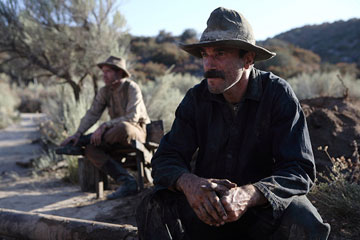
Someone we know said Paul Thomas Anderson's There Will Be Blood was going to be the best movie of the year, and Cinecultist scoffed. But turns out we kind of have to eat our words, because PTA has made an incredibly tense and powerful film filled with gorgeous cinematography and spectacular performances, particularly the one by Mr. Method Daniel Day-Lewis. We also absolutely loved Johnny Greenwood's score, it creates the most intensely palpable tone of dread. The title tells you oh yeah, there will be blood, but Greenwood's score has you on the edge of your seat waiting for it. The only thing that made CC put it on our top 10 list in the number two spot was the lack of female characters. Weren't there any ladies of interest in independent oilman Daniel Plainview's life? This bleak story could've used an infusion of estrogen, in our opinion. But regardless of the gender imbalance, get thee to a theater to see this movie. It's going to be considered a classic and start sweeping the awards season.
You can read more about the film and a press conference Cinecultist attended at the Waldorf Astoria with PTA, DDL and the like a few weeks ago on Metromix.
This week the Cinecultist weighed in on Alvin and the Chipmunks over at Kaboose.com. The filmmakers are pretty much pandering to the lowest common denominator when it comes children's entertainment, but we still think the fat, sentimental chipmunk Theodore is awfully cute.
Focus Films has launched a new website with tons of original content called FilminFocus. Check it out, there's lots to enjoy from features on Focus films like Atonement, a look back at film history from that corresponding week and interviews with smart movie bloggers like our friend Andrew Grant.
Have you gotten a $1 promotional movie ticket from Fandango yet? It's a sweet deal, you just send a text on Wednesdays and they text you a code. Could be good for some cheap seats during the holiday vacation.
The Cinecultist has been slightly under the weather lately, so while trying to take it easy this weekend we constructed our top 10 list for 2007. Now granted, CC still have two weeks worth of screenings we could (and probably will) try to cram in, so bear that in mind when you analyze our choices. Looking back it's been a strong year for drama, full of dysfunctional families, cultural malaise and senseless violence at the movies. But, CC still managed to toss a musical comedy, a Western and a summer action blockbuster on the pile. Because basically that's how we roll, viewing taste-wise.
After the jump, we also listed the rest of the movies we saw this year divided into the categories stuff we liked, stuff that we are now indifferent to and stuff that is just painful to recall. When you watch this many movies in a year (nearly two a week, on average! and that's not counting dvds or repertory), sometimes you have to sit through utter garbage. But if Cinecultist didn't suffer a little, we know we'd never discover the hidden gems, those little features that make this delightful obsession all worth while.
1. No Country for Old Men
2. There Will Be Blood
3. The Savages $ @
4. Michael Clayton @
5. The Bourne Ultimatum @
6. The Wind that Shakes the Barley
7. Enchanted $ @
8. I’m Not There
9. The Assassination of Jesse James by the Coward Robert Ford $
10. Zodiac $
(special award) 4 Months, 3 Weeks, 2 Days (saw this year, but comes out in January and it’s amazing.) @
$ = paid money to see
@ = didn’t watch alone
Saw and Enjoyed
Catch and Release. Jennifer Garner at a grieving granola chick in the Pacific Northwest kind of hit a cord for us.
The Lives of Others. East Berlin was not a happy place but this is a great movie.
The Namesake. Kal Penn rewards us for our long term support of Harold and Kumar Go To White Castle. $ @
Blades of Glory. Funnier than you’d expect a one-note comedy about ice skating should be.
Black Book. Only Paul Verhoeven would dare make Nazis sexy.
The TV Set. If you’re lovin’ Juno, give Reitman’s other fellow second generation director Jake Kasdan's feature from this year a go.
Year of the Dog. How much do you love Peter Sarsgaard’s asexual vegetarian dog rescuer?
Hot Fuzz. Simon Pegg makes darn funny movies.
Waitress. $ The affection for Kerry Russell is not unfounded.
Fay Grim. Hal Hartley still makes movies that make us think.
Once. Bringing back the musical, one busking Irishman at a time.
Knocked Up. CC laughed until it hurt during our screening but we got tired of the over-enthusiasm and subsequent backlash against this movie.
La Vie en Rose. Marion Cottilard is a revelation in this one.
A Mighty Heart. @ Just pretend this isn’t an Angelina Jolie movie.
Broken English. This is how neurotic real New York single women are.
Ratatouille. $ Paris, this is my town baby.
Rescue Dawn. Christian Bale, you are the man. Steve Zahn isn’t too shabby either.
Sunshine. Like Solaris and 2001 but with Michelle Yeoh in it.
Exiled. Bad ass Asian gangsters but with a Western twist.
3:10 to Yuma. @ Better than we expected for a nouveau Western with Russell Crowe.
Into the Wild. Sean Penn brings out lots of great quiet performances and some gorgeous scenery.
My Kid Could Paint That. Quite well edited, and we’re not just saying that because we’re friends with the editor.
Lars and the Real Girl. $ @ Ryan Gosling does it again.
Gone Baby Gone. @ Amy Ryan is our favorite new discovery of the year.
Persopolis. A good, woman-centric story about life in a part of the world we want to know more about.
Juno. $ Ellen Page is great though the script has some overly cutesy moments to it.
Sat Through
The Water Horse
The Kite Runner
Alvin and the Chipmunks
The Golden Compass
Southland Tales $ @
Margot at the Wedding @
Redacted
Mr. Magorium’s Wonder Emporium
Lions for Lambs
Bee Movie
Elizabeth: The Golden Age
The Darjeeling Limited
Nanking
Transformers (saw on an airplane, okay?)
Sydney White
The Jane Austen Book Club $
The Brave One
December Boys
I Want Someone to Eat Cheese With
The Nanny Diaries
Mr. Bean’s Holiday
Super Bad @
The Invasion
The Last Legion $
Becoming Jane
El Cantante $
No Reservations
Goya’s Ghosts $ @
Harry Potter and the Order of the Phoenix $ @
Joshua
License to Wed
Sicko
Vitus
You Kill Me
Ocean’s Thirteen $ @
Mr. Brooks @
Pirates of the Caribbean: At World’s End $
The Wendell Baker Story
Home of the Brave
The Ex
Paris, je t’aime
Private Fears in Public Places
Aqua Teen Hunger Force Colon Movie Film For Theaters
Grindhouse
The Host
300 @
Avenue Montaigne
Music and Lyrics
Blood and Chocolate @
God Grew Tired of Us
Delirious
Run, Fat Boy, Run (comes out next year)
The 11th Hour
Hannah Takes the Stairs
Great World of Sound $ @
Dans Paris
Day Night Day Night @
Election
East of Havana
The Wayward Cloud @
Tears of the Black Tiger
Want/Need to See Before the Oscars
Sweeney Todd
Charlie Wilson’s War
Atonement
The Diving Bell and the Butterfly
Eastern Promises
Away From Her
Painful. Utterly Painful. That’s 2 Hours of Our Life We’ll Never Get Back
Because I Said So. Worst Mandy Moore movie ever. And that’s saying something. $ @
Exterminating Angels. This was an art house French film that was actually porn, but not in a good way.
Evening. Dear god, the cheesy flash back-induced pain. It still hurts.
Last week in the brisk fall morning air, Cinecultist chatted with Stu Van Airsdale in Washington Square Park about two new releases this week, Margot at the Wedding and Redacted. You can see CC gushing about Noah Baumbach's use of natural light and trying diplomatically not to call Brian de Palma a hack over on the Reeler. That's right, see! Video blogging, it's the wave of the future, people. While CC does admit we need to hone our on screen persona a touch, don't you think we look and sound pretty good on the tape? Remember it was cold out there and we were talking totally off the cuff. Hopefully this is just the first foray into our on air movie punditry career.
CC saw both of these movies during our coverage of the New York Film Festival and another NYFF vet which we highly recommend, and is now out in theaters, is No Country For Old Men. This is a real return to form for the Coen brothers, sort of like if Blood Simple went on a road trip with Fargo to West Texas and was listening to a Cormac McCarthy book on the cassette deck. All the performances are pitch perfect, particularly the brusque Josh Brolin (who CC found oddly alluring during the post-screening Q&A) and the utterly freaky Javier Bardem. Be forewarned, his character Chigurh (pronounced "Sugar," if you can believe it) will haunt your nightmares. Go to see it, CC thinks its the best movie of the year.
After a long week of work, Cinecultist needs to get our movie on. But we're a bit overwhelmed by the wealth of options at our fingertips. Here's our list of possibilities. Feel free to leave us pros or cons in the comments.
Fitzcarraldo (at the IFC Center) - Lately we've had Herzog on the brain and we've always been curious about Klaus Kinski's supposedly bonkers performance in this one.
The Jane Austen Book Club (new release) - We're hearing the siren call of the chick lit and the beloved Jane Austen, plus CC read this book so long ago the reasons why we didn't really love it are now fuzzy. Seeing the movie should fill those back in.
Great World of Sound (new release) - We've heard good things, plus a friend suggested going to see it together. Cinecultist is a sucker for movie outings.
The Assassination of Jesse James by the Coward Robert Ford (new release) - In the elevator this afternoon at the Day Job, one of those handy dandy trivia screens told us EW gave it an A and the NYT gave it a pretty strong endorsement too. Plus, we have a thing for Brad Pitt on the open range that's left over from seeing Legends of the Fall in the theaters at an impressionable age.
Plus, we have DVDs of Taste of Cherry and Cranes Are Flying at home from Netflix. Oh, and we're going to see Rilo Kiley at Webster Hall on Saturday night and we have to find time in there to eat, sleep and clean the bathroom. Yes, it's going to be a busy few days of rest.
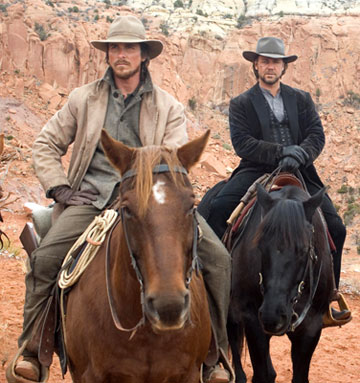 It just goes to show that sometime the Cinecultist doesn't know what she's talking about. Case in point, last Thursday night CC and Josh attended a preview screening of 3:10 to Yuma at the Museum of the Moving Image in Queens.* While we found the straightforward, genre faithful cowboy story from James Mangold to be quite entertaining, we predicted that it wouldn't do too well at the box office. Despite the Oscar win for Unforgiven
It just goes to show that sometime the Cinecultist doesn't know what she's talking about. Case in point, last Thursday night CC and Josh attended a preview screening of 3:10 to Yuma at the Museum of the Moving Image in Queens.* While we found the straightforward, genre faithful cowboy story from James Mangold to be quite entertaining, we predicted that it wouldn't do too well at the box office. Despite the Oscar win for Unforgiven a few years ago in '92 (jeez, that long ago? when did we get so old?), CC just didn't think audiences today would choose to see their action on horses and accessorized with ten gallon hats. Especially since Clive Owen was releasing a modern gangster flick this weekend as well, and it has the very self-explanatory title of Shoot 'Em Up.
However, Cinecultist was wrong about 3:10's potential for popularity and as Variety reports this morning it was the top grossing film of the weekend. Was it the good reviews that sent people to the theaters? Or maybe the star power of Russell Crowe, and to a lesser extent, Christian Bale? (Both of whom turn in really strong performances, by the way.) To CC's pop culture barometer, a Western doesn't feel "current" (or relevant) but maybe that's not actually what moviegoers wanted this weekend. A little throwback nostalgia at the cineplex can be more alluring than we thought.
It's a mystery frankly, and all the more reason why Cinecultist should stick to watching movies for their quality, not for their box office potential.
*It'd been a while since we'd taken the trek out to MI and from our day job in midtown it was only about 25 minutes on the subway. The museum is such a lovely screening space and they have such great programming, we always kick ourselves for not going more often. That is until it took CC an hour to get back to the Eee Vee after some post-movie drinks. Ugh.

The Damon man talks with director Paul Greengrass on set.
The third installment of the Bourne series, The Bourne Ultimatum, was one of Cinecultist's most eagerly anticipated summer release and as you can tell from our rave on Gothamist yesterday, it didn't disappoint. Our girl Manohla loved it too, and in her review she touched upon what we found so exciting about the movie, that it is popular entertainment with smarts and a point of view.
She writes,
"As Bourne has inched closer to solving the rebus of his identity, he hasn’t always liked what he’s found. He isn’t alone. Movies mostly like to play spy games pretty much for kicks, stoking us with easy brutality and cool gadgets that get us high and get us going, whether our gentlemen callers dress in tuxes or track suits.What’s different about the Bourne movies is the degree to which they have been able to replace the pleasures of cinematic violence with those of movie-made kinetics — action, not just blood. Mr. Greengrass and his superb team do all their dazzling with technique. They take us inside an enormous train station and a cramped room and then, with whipping cameras and shuddering edits, break that space into bits as another bullet finds its mark, another body hits the ground, and the world falls apart just a little bit more. Without fail, Mr. Greengrass always picks up those pieces, reshaping them so that Bourne can move to the next location, the next kill, as he gets closer and closer to the mystery of his terrible existence."
As the movie thunders towards its climactic showdown, Cinecultist realized that this is one of the most politically minded current Hollywood movies we've seen. Almost as a counterpoint to director Paul Greengrass's brutal September 11 movie from last year United 93, The Bourne Ultimatum looks into the face of our government's policy decisions and demands to know what we've become. It's not enough to say we were just following protocol or making the best decisions we could with the information we had. Like Jason Bourne, our country has to face ourselves in the mirror every morning knowing what we've done. And this coming from a filmmaker who's a Brit.

The Cinecultist is reporting to you today via free wifi from the second floor food court of the Whole Foods on Houston Street and thus it is fitting that we want to discuss No Reservations, a movie we saw last weekend. Foodies and cinephiles seem to be cut from the same bolt of cloth, and CC likes to think of ourselves as both a food and film fan. It's really all about Taste, a commodity that's important in our ever increasingly homogenized culture. However unlike the excellent Ratatouille, No Reservations is not about the quest for good taste. Rather, it's about how uptight, career driven girls should loosen up, listen to some opera and learn to Feel.
CC has some friends who are quite devoted to Catherine Zeta-Jones, or CZJ as they lovingly refer to the Welsh actress. While we've never been an unabashed fan, we did find her performance as Kate, a superstar perfectionist chef at a West Village boîte who has to care for her orphaned niece, to be quite charming. She really is lovely to look at, and her chemistry with her costars the square-jawed Aaron Eckhart and the cutie pie Abigail Breslin is believable.
So what's the problem?
No Reservations is yet another merely serviceable Hollywood romantic comedy. Two hours of mildly diverting entertainment floats by, but are we changed or moved? Hardly. It seems overly cranky to really get worked up about a movie like this. Sure, it's not as cute as the European original and its depiction of Kate's New York single life is wholly unrealistic but are either of these gripes those new arguments about mainstream cinema? Watching movies like No Reservations is probably why Janet Maslin went back to review books for the NYT—if yet another movie is neither really bad nor particularly good, what can you even say about it?
In other movie news, CC was saddened to hear we also lost Michelangelo Antonioni so shortly after Bergman. A film artist who brought us coal-eyed Monica Vitti on screen is someone to be sorely missed. Also, if you're curious about our opinion of Milos Foreman's Goya's Ghosts we wrote about it for the Movie Binge.
Heh. The Gothamist commenters are having spirited fun regarding our post on Sicko today. The headline is a quote from one of the incendiary statements.
Here's a reprint of the review part of Cinecultist's post.
As for the quality of this new bit of agit-prop from the pudgy Michigander (which Gothamist caught last night at an advance press screening), it's a persuasive and disturbing two hours. Moore introduces us not only to a number of Americans screwed over by their lack of health care, but also interviews numerous health care industry employees disgusted by the business's practices. These stories from ordinary Americans are heart-wrenching, as is the footage Moore shot of very sick 9/11 volunteers finally getting the health care they desperately needed from the socialized medicine system in Cuba. Unfortunately like most Moore movies, the shocking state of America's relationship to its more disenfranchised residents is tempered by the ridiculousness of his on screen antics. Moore filming himself on a boat outside of Guantanamo Bay using a megaphone to try to get entrée into the holding center's medical facility is unnecessarily over the top, no matter how you feel about the issue of privatized heath care.
After the screening, CC walked out and took the subway with three of our esteemed friends/movie writing colleagues Nicolas Rapold (The Sun, Stop Smiling), Michael Joshua Rowin (L magazine) and Michael Koresky (Reverse Shot, Criterion Collection). (These dudes know about movies; they'd give CC a complex if we hadn't already survived the intellectual smack down of cinema studies grad school.) Rowin ranted, Koresky seemed bemused by the whole thing and Rapold looked positively ill. Cinecultist heartily looks forward to reading their fully formed opinions of the movie shortly.
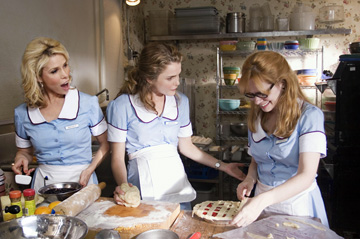
Before the Cinecultist moved to New York for graduate school, we were kind of obsessed with Keri Russell and Felicity. Okay, not kind of, totally obsessed. Bear in mind that this was 2001 and also, we have the taste of a 14-year-old schoolgirl sometimes but Felicity represented all that was good and pure about our fantasy of moving to beautiful NYC. Now that Russell has moved on and Felicity finished, we're ready to let our curly haired actress mature from teenie bopper sensation to fully formed actress and her movie Waitress is just the ticket. Funny, melancholy and a little bit wise, Waitress isn't a far reaching movie. It makes a comfortable home in the details.
About a young Southern wife who discovers she's pregnant by her snake of a husband and who finds joy in baking elaborate pies, Waitress could be over-the-top folksy without barely trying. It's the sort of character driven small indie that littered the decaying art house movie palaces of the '90s. In fact, you may recall the writer and director Adrienne Shelly from that era acting in Hal Hartley's movies. However, Shelly's product is so insidiously charming that to do some jaded "been there, done that" number on it would be utterly heartless. This movie sweet talks you, and that's in no small part due to Russell's lovely performance. In particular her exchanges with Andy Griffith, who plays the cantankerous pie shop owner Joe, as well as her easy girlfriend-report with her fellow waitresses Cheryl Hines and Shelly, are very winning. Stylized and yet real, everything from the dialogue to the scenario and the pie baking in this movie walks that fine line.
Obviously it was a terrible thing to hear of Shelly's murder shortly before the movie's acceptance into the Sundance Film Festival and its warm reception there, but when you go to see Waitress—as you should—let that extra-textual tragedy go. Try to enjoy the quiet charms of this movie and its star on their own terms. Trust us when we say, they will be enough to win you over.
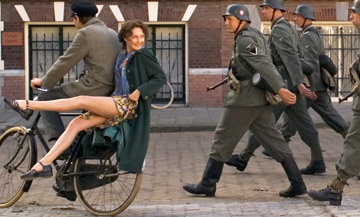
This week in the New Yorker, Anthony Lane ripped Paul Verhoeven's Black Book a new one and Cinecultist finds ourselves in the unenviable position of feeling the need to defend Verhoeven. If you feel that chilly breeze wafting out of Hades don't be alarmed, that is indeed the feeling of Hell being frozen over with CC standing up for the Dutch schlockmeister auteur but frankly, it must be done. Black Book doesn't deserve the Lane treatment.
Here's the bullet point version of what problems Lane finds in Verhoeven's movie about a Dutch Jewish girl working for the Resistance in occupied Holland.
However, this is where CC has to depart from Lane's caustic, but otherwise accurate, observations of Verhoeven's prettified version of Nazi Holland. Verhoeven's main purpose is to create melodrama. Even when he uses the tropes of a thriller, like in Basic Instinct, he wants to draw larger than life characters existing in the realm of grand scale storytelling. Except that his favorite kinds of characters also have a whiff of crass humanism to them--they like sex a little dirty or their drinks extra strong. There must be bawdiness in Verhoeven's movies, but it's all for the sake of fun, entertainment and hyperbole (see Showgirls's exuberant pole dancing or Starship Troopers's shower scenes as examples).
The totally brilliant thing about Black Book in Cinecultist's mind is that Verhoeven actually had the balls to bring his brand of melodrama to a Holocaust story, the ultimate sacred cow in Hollywood. Of course he had to publicly leave Hollywood behind to make that kind of movie, but as the production still above shows, Verhoeven isn't afraid to put some tasty gams on a Jewish girl and let her use them to taunt a few Third Reich soldiers. It's so salacious it can't help but make us think differently about this great tragedy. There were real people involved, who had sex drives and double crossed each other. The Resistance fighters could be as despicable as the Gestapo middle men were noble. Revolutionary, right?
Anthony Lane get off of your fucking snarky high horse. Black Book is an entertaining, sexy thriller that giggles as it snubs its nose in the face of taboo. Now, with that out of the way, Cinecultist is going to go put on a sweater. It's cold here in the Hell of our own making.

Gang-du (Song Kang-ho) knows that something wicked this way comes in the new Korean movie The Host.
Cinecultist likes monster movies with bite, the kind where you get goosed by something jumping out from the screen right after you've laughed uproariously at some witty, ironic aside. The two parts "goosing" and "laughing" have to go together, one without the other just devolves into Children of the Corn or the like. If you also appreciate smart scariness on screen, might we suggest checking out The Host, a newish movie by Korean director Bong Joon-Ho which CC saw at NYFF last year and is finally getting a theatrical release. The IFC Center here in New York is also hosting a mini-fest of his movies starting next Monday and culminating in a screening of The Host with Bong conducting a post-film Q&A on Tuesday.
Two things we heartily enjoyed about this movie, though there's a lot in it to endear:
1) It's a Godzilla for the 21st century, a seemingly innocent action movie that's actually fraught with intriguing paranoia about mankind's callousness towards nature coming back to bite us in the ass. The Japanese in '54 were freaked out by the prospect of nuclear disaster, while the Koreans seem to be more afraid of the mutations from pollution by chemicals. Either way, in both movies they know they've been co-opted by American expansionist greed and they sorta know they're screwed (ie. expecting a huge beast to emerge from the water and eat their people). It ain't gonna be pretty, but it makes for a darn entertaining movie.
2) In the face of scary nature rebelling against stupid mankind, you'd expect the movie's heroes to actually be heroic but Bong says, Pshaw that kind of simplistic characterization is for chumps. In every instance where various members of this one family could save the day with their unique abilities, they don't. It's failure and well-meaning fuck up all around, which as a movie's strategy takes some serious balls. Without giving too much away, Cinecultist really admires any film that can be both decidedly genre picture yet flout that genre's structures to the audience's face. Bong achieves this with grace and good humor, while keeping the suspense level high.

Blech, Valentine's Day. If Cinecultist has to watch one more idiotic Zales commercial, we may crawl under the duvet and not come out until March. It's not romance that CC objects to so much as the consumerist co-opting of it by the card manufacturers and the candy sellers. We're big on affection and love on all days except for Feb. 14, just like we're big on great romantic comedies. Sadly the new Drew Barrymore/Hugh Grant movie, Music & Lyrics which is out today isn't one of our new favorites. A sort of cute premise* and usually winning stars though don't add up to anything that's worth your $10.75, no matter how die-hard you might be about the genre.
Grant plays a watered down version of his character from About A Boy, a washed up musician instead of lay-about pop song heir, who doesn't feel all that motivated to make more of his singing career than some appearances at Knott's Berry Farm. Barrymore enters his life as the temporary plant waterer for his apartment and her ability to spout insightful yet catchy rhyming lyrics on a dime improbably pairs her up with Grant to write a new song. Barrymore is doing an odd Diane Keaton On Crack impression here, she's all skittish neurosis in skinny jeans. But these tics don't make the character more likable, she just seems like the kind of person you'd scooch away from on the subway.
In addition to the wearisome characters, every last joke lies lamely on screen like 3 day old fish. The plot twists which are supposed to show the couple bonding (she has an ex-lover played by Campbell Scott that she wants to tell off, he needs to learn to enjoy performing in front of aging boomer ladies) are equally as weak. In the end, CC found ourselves completely tuning out on the dialogue to focus instead on Drew's costume choices. Her very Lucky magazine look was hardly enough to distract us though. We'd rather be forced to watch a Home Fries and Two Weeks Notice double feature than revisit this painfully bad movie. Do yourself a favor and stay away. It's barely worth an accidental viewing on TNT in two year's time.
*The premise reminded CC a lot of this musical we loved as a kid, They're Playing Our Song about the real life singer/songwriter couple Marvin Hamlisch and Carole Bayer Sager. If only we'd kept that faded original cast album, it was really great.
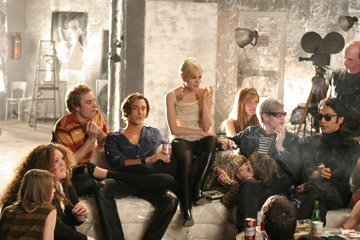
On Sunday afternoon, Cinecultist went to see a screening of Factory Girl and based on the crowds in the lobby you would've thought Edie Sedgwick herself had descended on the Angelika. The Angelika has such an odd set up with their over-priced cafe on the ground floor and then the concession stands, restrooms and theaters on the floor below. When it's not too crowded these two areas don't matter too much, and actually the cafe is nice to sit in if you're early to your movie like CC was on Wednesday. We'd gotten coffee up at Think with just this plan in mind and sat reading, observing the packed lobby scene for about an hour.
Angelika has a pretty good line up right now, some Oscar nominated movies like The Queen or Notes on a Scandal that people perhaps haven't seen yet, plus some newer, much buzzed about movies like Factory Girl and The Lives of Others. Consequently, the Angelika staff had the moviegoers lining up, either to the left of the entrance or to the right, in these velvet roped areas. However, they held the lines there until about 5 minutes before the movies started and with all the people, plus the proximity of the start times to each other, there got to be quite a bottleneck. Also, certain people get antsy/cranky when they're not in their movie seats a good 15 minutes or so before the movie starts. It's confusing to be still waiting upstairs as the start time nears, they want to be on time and situated. The woman in line in front of CC even turned around to ask if she was in the right place because of it. This is after the staff has been announcing over the PA system where everyone should be every 10 minutes or so. Perhaps she thought the movie might start without her? Poor lady, she should've pretended she was an Edie Sedgwick, confident that the party couldn't start until she had arrived.
It's a popular New York movie obsessive past time to complain about the Angelika, and CC does it too, mostly because that subway rumbling from the 6 train is seriously distracting during the movies. The Angelika has a tricky situation on their hands; they're showing movies worth seeing right now and they're trying to handle the crowds but it doesn't seem to be working all that well. People cut in the line, there's a general sense of crankiness and it seemed to CC like a lot less people were going to the concession stand downstairs as they rushed into their designated theater. This can't be good for Angelika business cutting down on those popcorn sales.
By the way, how was Factory Girl, you may be wondering? Pretty good actually, considering that Weinstein Co. intended to release it before the end of 2006 but held it for legal reasons. Sienna Miller is just as lovely as you'd imagine she would be, and does come across as a compelling artist's muse. Though we were surprised that Bob Dylan's people objected to the "folk singer" character played by Hayden Christensen which is an obvious homage to Dylan. If anyone is culpable for Edie's demise in the movie, it's not Dylan but Andy. He basically turns his back on her because she deigns to fall in love with the heterosexual hunk played by Hayden. The film depicts Andy as rejecting anyone who doesn't remain in his orbit, treating him as the most important person in the world. For someone seemingly so self-hating, he's awfully narcissistic.
After seeing this movie, CC still thinks the most interesting woman at the factory was Brigid Berlin. She wasn't a waify lovely inspiring fashion trends like Edie, but at least she kept making art even after sublimating herself to Andy's creative dominance. Rent Pie In The Sky: The Brigid Berlin Story and you'll see what we mean.
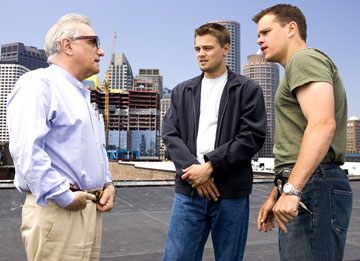
Over the weekend, Cinecultist finally got around to seeing the Oscar-nominated Martin Scorsese movie, The Departed. It'd been on the list for quite awhile now, especially because we enjoyed the source material Infernal Affairs, but just hadn't made the time for a screening. Now with the end of the year nominations out, CC was certain it would end up a front runner, particularly for best director, and then we'd be unable to really weigh in confidently on its merits. Will this be Marty's year? That's the question on everyone's mind, or at least everyone who has such obsessive Oscar conversations as the Cinecultist or Dave Karger.
While eating dinner at a totally old school "red sauce" Italian joint afterwards (in other words the perfect food to digest Scorsese with), CC came to the following conclusions. The Departed is not a great Scorsese picture, like Goodfellas or Raging Bull, but it's good. More importantly, it's better than some of the very sub-par product he's been giving us in the last few years (yes, Gangs of New York, we're looking at you). Since Oscar likes to reward whole careers rather than a single film (except for in the best supporting actress category, that is), 2006 could be a respectable and reasonable year to reward Scorsese for services rendered. He's made an entertaining thriller which touches upon his signature themes of class and ethnicity, as well as elicited some excellent performances from a rich band of actors. It may not be a truly lasting movie that will be considered cinema art, but CC is fine with that. Good but not great is okay for someone like Marty.
Further side notes: Is there anything Alec Baldwin can do lately that isn't completely wonderful? Okay, maybe Mini's First Time, but that movie was just plain BAD. Most everything is better when he's on screen. Also, the costume designer who could put Vera Farmiga in both those amazing little panties for her make-out with Leo scene and the worst three piece suit ever in two other sequences is both brilliant and a fool.
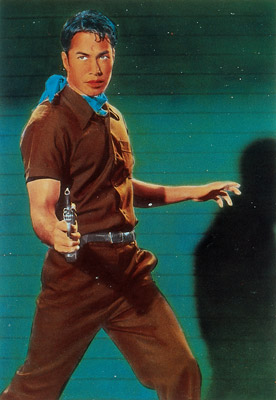 In this week's Time Out New York film section, David Fear interviewed Thai director Wisit Sansanatieng about his movie, Tears of the Black Tiger which finally makes it to New York theaters this weekend after languishing in that black hole for good Asian cinema, the Miramax vault.
In this week's Time Out New York film section, David Fear interviewed Thai director Wisit Sansanatieng about his movie, Tears of the Black Tiger which finally makes it to New York theaters this weekend after languishing in that black hole for good Asian cinema, the Miramax vault.
"Honestly, it’s been so long that I’d almost forgotten I’d made the movie,” Sasanatieng, admits via e-mail. “My worry was always that Americans would only think of the film as a parody, when my goal was to pay tribute to the history of popular Thai cinema. I purposefully wanted to blend old and new styles. The look, the editing and the way the camera moves are all very modern, yet the acting is intentionally theatrical in a way that evokes older movies. I wanted actors who looked like contemporary versions of classic stars. We even scratched up the film so it resembles a beat-up print that’s been sitting around for a while."
Watching this movie last week, Cinecultist couldn't help but think how perfect it would've been to discuss it with one of our former cinema studies professors, Richard Dyer. This is partly because Dyer is a witty and slightly caustic little British man who always has something slightly catty but spot on to say about movies, and also because Dyer's most recent scholarship has centered around the concept of "pastiche," a term he calls "knowing imitation." This is the idea that artists in their new work are drawing purposefully from previous art and in the process of pastiching one on top of the other, create something unique.
Of course what's interesting about the above quotes from Sasanatieng is how deliberate his pastiche choices--genre, color, the actors' looks and camera movement--yet how sincere the movie seems. There's not anything ironic or winking in Tears, it could more easily be an actual '60s Thai Western than what it is, a new movie made to look old. Watching most current post modern movies, like this week's utterly stupid looking parody comedy Epic Movie, you'd think that in order for current directors to elude to or reference cinema history in their films it has to be with an overtly knowing tone. Tears suggests otherwise.
Unfortunately then, you end up with a straight-forward technocolor-on-crack Western set near Bangkok, which CC is a bit sheepish to admit we found a little boring to sit through. Intriguing concept and excellent follow through, we just don't really like Westerns. However you might and if you do, please go see this movie if only so that innovative directors like Sasanatieng will continue to get their work rescued from the American distribution black hole.
 Invariably cocktail conversation for the Cinecultist turns to movies and what we've seen in the theaters, particularly during this end of the year top 10 season. Everyone seems to like to talk about film and you can imagine it only takes a little bit of egging on to get CC going. Disappointment in Zhang Yimou's newest Curse of the Golden Flower seems to be a favorite topic in these conversations, especially if our fellow revelers know about CC's penchant for Asian cinema. Sadly though when you think about Curse for very long you realize poor, deluded Zhang is only giving his audiences what he thinks they want to see on screen--lavish spectacle, gorgeous actors, a few gravity defying sword fighting scenes and some decadent sexual intrigue. However, the combination of these elements which may have given him big box office successes in the past have only delivered an empty shell of a movie. Curse is all surface, a gorgeous shiny color riot of a surface, but really no substance.
Invariably cocktail conversation for the Cinecultist turns to movies and what we've seen in the theaters, particularly during this end of the year top 10 season. Everyone seems to like to talk about film and you can imagine it only takes a little bit of egging on to get CC going. Disappointment in Zhang Yimou's newest Curse of the Golden Flower seems to be a favorite topic in these conversations, especially if our fellow revelers know about CC's penchant for Asian cinema. Sadly though when you think about Curse for very long you realize poor, deluded Zhang is only giving his audiences what he thinks they want to see on screen--lavish spectacle, gorgeous actors, a few gravity defying sword fighting scenes and some decadent sexual intrigue. However, the combination of these elements which may have given him big box office successes in the past have only delivered an empty shell of a movie. Curse is all surface, a gorgeous shiny color riot of a surface, but really no substance.
Set during the Tang Dynasty in China, this royal family is beyond dysfunctional. The king and his second wife's marriage has dissolved in the most chilly of public displays. Every day he commands she drink a tea he has prepared specially for her, predicated upon the assumption that she has severe health issues. Though she'd probably be healthier if the King wasn't secretly poisoning her with said tea. Of their three sons, the eldest (and from a mysterious first marriage), is set to be the next king, if only Dad doesn't find out Step Mom and son have been having an illicit affair. First son is also dallying with a girl from the court, the daughter of the King's physician. Meanwhile, the second son has returned from battles on the borders and discovers how rotten things have gotten at home. He wants to help his mother, but will he be able to act out against his all powerful father?
With such an operatic and convoluted plot, you'd think ordinarily strong actors like Gong Li and Chow Yun Fat could make this material compelling. Instead, it all becomes so muddled that you can hardly tell which end is up. As the forces of intrigue barrel towards a final showdown during the festival of the Chrysanthemum (the gold colored flower from the title), it should seem all the more momentous but instead the action becomes disposable. Like the hordes of soldiers dispatched and then swept away during the bloody coup the Queen organizes, nothing in this story seems to have any permanence. It should all be so awe inspiring what with the incest, the killings, and the royals but you can't help but suspect that they're just the vaguest pretexts for Zhang to put his actors in yet another costume change. Each set dressing is more over the top than the next that it makes your eyes swim in color overload. But so what, CC wanted to yell at the screen. What is this movie saying about anything, beyond trying to be beautiful? We honestly had no clue as the credits began to roll. So much excess on screen can be surprisingly infuriating.

Over the weekend, the National Society of Film Critics continued the trend of lavishing praise on Guillermo Del Toro's Pan's Labyrinth by naming the Spanish-language horror/fantasy/fairy tale the best picture of the year. Cinecultist has had Pan's on the brain too because we finally got to a screening on Saturday night. This is actually our third attempt to see the movie, first we missed the two press screenings at this year's NYFF because of work commitments, then our friend Josh and I tried to see a showing on New Year's Day but it was sold out. This time we planned ahead, picking a screening time a few days before and purchasing tickets online (btw, it's now $25 sodding bucks to buy two tickets online, between service charges and whatnot, which is getting a tad ridiculous). We mention this protracted process to seeing the movie because Cinecultist suspects it may have affected our enjoyment of the movie, turning our response from heightened anticipation into one of "ehh."
Why else should we be so halfhearted about what is ostensibly a gorgeous, well-made movie? Everything the critics say is true, Del Toro has created a deeply personal and creepy fantasy, peppered with moments of in-your-face violence. CC went back to read some of the rave reviews to see if we agree with what the critics said in praise. Jonathan Rosenbaum in The Chicago Reader writes, "Del Toro's exquisite, integrated digital effects, like [Alfonso] Cuaron's imagined future landscapes [in Children of Men], combine the familiar with the uncanny in ways that leave us uncertain which is which." Yes, that's true -- part of what's interesting about Pan's is that the young girl Ofelia's imaginings are in a real sense disproved by the bleak ending. Glenn Kenney in Premiere says about that end that "its devastating conclusion is far more layered than typical Hollywood "fantasy will set you free" bromides, and the film's stout-hearted contempt for cruelty of all kinds is uncanny, and inspiring." This is also an accurate description, as the real villian, Ofelia's evil step father the Fascist captain is much scarier than anything Ofelia sees in her magical universe.
The only conclusion CC can come to then to explain our less than stellar regard for this movie would be the fact that we saw it so late in the hype cycle. Surely if we'd gotten in on either of those previous two occasions, particularly at the Film Festival, we'd also be raving about the movie. Sometimes the biggest enjoyment in movies for the professional moviegoer comes from that experience of discovery. Too many Magellans planting their flags upon this surface leaves CC feeling uninspired. Granted, that's a totally petulant and stupid response to work of strong artistic merit, but there you are.
And hey, while we're bitching, we'd point out that it's just not fun to see such a packed movie at the Loews 19th Street theater. Between huge lines outside and then a very tall dude sitting in front of CC making it nearly impossible to read each subtitle without getting a serious neck cramp is enough to make even the biggest movie fan cranky.
Consider this your official "little white string around the finger" reminder for all of Cinecultist's fellow Woody Allen fans in New York: the "Essentially Woody" series at Film Forum is going on only until next Thursday, January 11th and this weekend is Manhattan. Our Jewish movie guilt reflex kicked in this afternoon while we enjoyed yet another David Rakoff post on the festival, and have already bought our ticket online. Don't be kicking yourself for letting this great selection pass you by because you're too busy or still suffering from holiday fatigue.
BTW, Cinecultist interviewed an Allen expert, professor Bob Kapsis for Gothamist just before we left for vacation. People who can talk for hours and hours about their love for Woody Allen filmography are CC's kind of people.

Walking up to the 2nd Avenue Cinema Village East theater last week and seeing the line of people going half way down the block, Cinecultist wondered if something was going on. Could this many people be desperate to see Children of Men on a Friday afternoon? One frantic ticket seller behind the counter was trying to move people into the theater, but for some reason there wasn't a single person waiting to use the credit card kiosk inside. Even though it had been awhile since we'd been to a screening we had to pay for, it's still obviously good to be up on our local theaters' layouts.
Inside the theater it was full, though we still snagged a seat that wasn't in the very first row. Sometimes the movie gods are just aligned that way, and as Alfonso Cuarón's movie began to unspool, CC couldn't help but feel blessed. Sure, that sounds like a totally silly reaction to a dystopian sci-fi fantasy about a near future world dissolved into mass riots and lawlessness because women can no longer conceive, but it's true. Children is such an exhilarating viewing experience that we couldn't help but simultaneously thrilled by its deftness and then acutely aware that we were being thrilled. It's a very well done movie that makes the Cinema Studies student in us think, "Damn, look at that point of view camera" before plunging head-long back into the story. And it's not just that dogged pov, seeing this crazy world through the eyes of main character Theo (Clive Owen) as the camera runs along side him through refuge camp battlefields and terrorist attacks, that makes the movie so visceral. The acting is also superb, from Michael Caine's tough-in-check irreverence to Danny Huston's tossed off bonhomie.
The movie also reminded CC why we love Mr. Owen so much, despite appearing in such dreadfully over-hyped and then disappointing films as Derailed or Closer. His rugged, manly man magnetism is on par with some of the great screen legends and yet even when he looks worn down to the nub, as he does towards the end of this movie, he's still completely lovely. Like Cuarón's big American break out, Y Tu Mamá También, it's tough to put your finger precisely on why Children is such a wonderful movie other than it just feels so good.
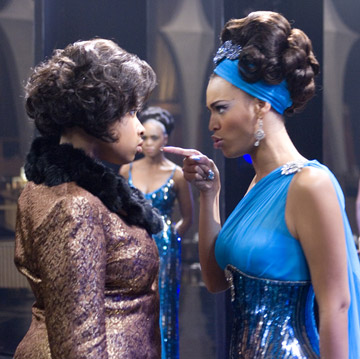
Wow, Cinecultist didn't realize we were intending to take such a long hiatus from regular posting when the business of last month whipped into a fever pitch. However, it was a enjoyable holiday season, one filled with festivities, visits with family and of course, lots of year end movies. We'll try to get to recounting all the great films we've seen (including a year end top 10) but for now, a mention of one.
CC spent a week around Christmas on the West Coast visiting family and friends, and even rented a car -- which was way too much fun than is entirely healthy for this New Yorker who never gets to drive. On the 25th, CC and our Mom did the traditional Jewish celebration of a movie matinee and then Chinese food for dinner. CC's Mom lives in the Marina district of San Francisco, a lovely little enclave of adorable row houses near the water and 30-somethings with just so handbags and Internet money to burn. At the Presidio on Chestnut Street, the locals were out in droves though the streets themselves were pretty quiet since most things were closed. Mom had reserved Dreamgirls weeks ago as our official Christmas Day movie selection, ever since she'd seen the cast interviewed on Oprah.
A movie musical with all of the pageantry and diva posturing is really perfect for the holiday season. Dreamgirls in particular has gotten that tone right, the artificiality of characters singing their feelings to each other fit in perfectly with the bouffant '60s wigs and lavish stage shows in the story. Of the musicals released in the last few years during this revival of the genre, Dreamgirls also seemed to best capture the energy of seeing a great show on Broadway. Walking out of the theater, we hummed the songs all the way to car in between exclamations over Jennifer Hudson's performance as Effie. The buzz is all true, she's just wonderful. The Academy seems to love giving out best supporting Oscars to untested ingenues like Hudson, so we won't be at all surprised if her diva-licious belting isn't handsomely rewarded.
Of course the unspoken oddity about all of the nominee buzz and the casting of this movie is that while Beyoncé Knowles' character, Deena Jones, becomes the lead singer of the Dreams and is loosely based on Diana Ross, she's actually not the center of the movie's story. Instead it's Effie that we really root for when her jerk boyfriend and the band's manager, Curtis (Jamie Foxx) boot her out of the girl group because she's not as photogenic as Deena. Beyoncé gets the best outfits in the movie (oh to channel Ms. Ross with the enormous mane of wavy hair and glittery eyelids) but Jennifer gets the most likable character and best songs. "Listen" is a good song, but "I'm Telling You I'm Not Going" gives you chills.
For those used to seeing Beyoncé in the limelight with Destiny's Child and the like, it might seem surprising that she'd take this less-than-plum role. However, for our part it seems like a brilliant career move for Beyoncé. As a member of this ensemble in this kind of movie, she's transformed herself from pop singer or fashion maven to serious actress. All that time spent hanging out with the image conscious Jay-Z was not for nothing, that B is one smart girl.
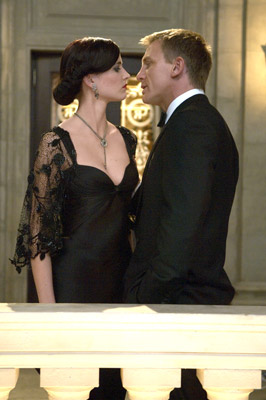 While Cinecultist would never pretend to be a James Bond fan of the caliber of Anthony Lane, we do appreciate the finesse with which Ian Fleming's creation continues to draw audiences to the theaters. People understand, almost instinctually, what makes for a good Bond movie and 40 plus years on, the formula still works as evidenced by Casino Royale which CC saw last weekend. A rollicking, action-packed, sexy as hell installment, this 007 tale stars a new Bond played by Daniel Craig, and with the new lead actor seems to be an updated way of telling a Bond story.
While Cinecultist would never pretend to be a James Bond fan of the caliber of Anthony Lane, we do appreciate the finesse with which Ian Fleming's creation continues to draw audiences to the theaters. People understand, almost instinctually, what makes for a good Bond movie and 40 plus years on, the formula still works as evidenced by Casino Royale which CC saw last weekend. A rollicking, action-packed, sexy as hell installment, this 007 tale stars a new Bond played by Daniel Craig, and with the new lead actor seems to be an updated way of telling a Bond story.
For some reason, even though we know it's a terrible soap opera cliché, we love a romance where the couple initially hate each others guts. The disdain and then the heat! It's like cinematic candy corn for the Cinecultist. When Craig tells the brittle but lovely Eva Green, "you're not my type. Why? Because I'm smart? No, single" we knew we loved this flick. And of course that's ages after Bond has raced through a construction yard, leaping up scaffolding and hurling himself pell mell through walls. See, we're also a sucker for an elaborate chase scene as well as for barbed, sexually-charged wit.
Fortunately, this 007 also never dissolves into the easy catch-phrases of sub-par action films. Casino Royale is the first story in the Bond catalogue but this film still feels fresh. In the final sequence (which granted comes about 20 minutes later than our short attention span would prefer), as Bond and the bad dudes destroy a palazzo on the Grand Canal, we feared for a quip about Venice sinking. But, it never comes. Bravo Bondies, this jaded but hopeful moviegoer is completely reinvested in your franchise.
 Even though Cinecultist has already recommended Iraq in Fragments to our Gothamist readers, it has become our default response lately to "What's good in theaters right now" and so we mention it here. You have until next Tuesday, Nov. 21 to catch this heart-felt and beautifully shot documentary at Film Forum. Consisting of three stories from around the war-torn country, this documentary stands out to CC because of its lack of experts and talking heads. Instead it consists of lushly, complexly told lives from the mouths of those living them. Particularly the young Kurdish boy at the end who wants to become a doctor but his father wants him to go into the clergy broke our heart. His expressive face has really stuck with us. For our money, this film gave us the most interesting picture of the effect of American foreign policy, and that's with all of our efforts to stay up on our Jon Lee Anderson and the New York Times coverage.
Even though Cinecultist has already recommended Iraq in Fragments to our Gothamist readers, it has become our default response lately to "What's good in theaters right now" and so we mention it here. You have until next Tuesday, Nov. 21 to catch this heart-felt and beautifully shot documentary at Film Forum. Consisting of three stories from around the war-torn country, this documentary stands out to CC because of its lack of experts and talking heads. Instead it consists of lushly, complexly told lives from the mouths of those living them. Particularly the young Kurdish boy at the end who wants to become a doctor but his father wants him to go into the clergy broke our heart. His expressive face has really stuck with us. For our money, this film gave us the most interesting picture of the effect of American foreign policy, and that's with all of our efforts to stay up on our Jon Lee Anderson and the New York Times coverage.
Also of note, Iraq in Fragments is on the 15 doc short list for the best documentary award at this year's Oscars. So it's not just CC who thinks it's worth a watch.
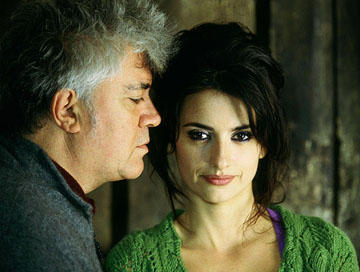
One of Cinecultist's favorite movies from this year's New York Film Festival was definitely Pedro Almodóvar's newest, Volver, which hits theaters this weekend for limited release. It's a real Almodóvar movie in all of its melodramatic, stylized, lush glory. Also, Penélope Cruz gives an amazing performance as Raimunda, the daughter and mother at the center of this story. Almodóvar lovingly and fetishistically photographs Cruz in the film, particularly her lush décolletage. There's one straight down from the ceiling shot that'd be almost pornographic, if it wasn't so hilariously stylized.
It's no surprise then that Almodóvar admits in the press notes for the film that he's totally obsessed with his muse's form. [Please note, all of those exclamation points in the following quote are Pedro's.]
"The Strength and Fragility of Penélope Cruz. And her beauty. Penélope is at the height of her beauty. It's a cliché but in her case it's true. (Those eyes, her neck, her shoulders, her breasts!! Penélope has got one of the most spectacular cleavages in world cinema). Look at her has been one of the great pleasures of this shoot....Penélope Cruz is a strong minded actress, but it is the mixture with that sudden, devastating emotion which makes her indispensable in Volver."
CC would second that Pedro, she really rocks and deserves all the recent Oscar buzz about her work. However, someone should clue Cruz into the fact that she should just stick to Spanish language projects. For some reason in English, she comes off not as well as she does in all of the films from Spain we've seen her in.

Padding around and trying to get some work done this afternoon, Cinecultist noticed we were having this weird tinge in our left shoulder. It's not yoga strain and it's not the shoulder we use to carry around the handbag, so we weren't sure quite what was up. Until we had this odd thought: maybe it's phantom clavicle pain from watching Babel earlier this week.
All of the world-spanning characters in Babel undergo some pretty painful experiences, but CC found Cate Blanchett's circumstances (estranged marriage, cleanliness phobias, then being caught by a stray bullet while riding in a tour bus, and having her shoulder sewn up by a needle and thread) particularly affecting. It's not often that a movie will give you a physical reaction, and frankly we're not sure if we should be recommending it if it does. Babel is a film that kicks you in the gut. The characters are disconnected and not just for the obvious reasons of language barriers. While it could be argued that the ending is primarily hopeful, director Alejandro Gonzalez Inarritu's path to that conclusion isn't an easy one. Like the women's melodramas of the '50s, Babel wants you to feel the characters' pain viscerally and to have a good cry on their dime.
In the bathroom line after our screening, a few girls in front of CC had some heated things to say about the movie. A flick that inspires debate always makes us happy, so if argument and weeping are moviegoing reactions you crave, then Babel could be right up your alley. Blanchett certainly gives a good performance, as does the rest of the strong cast which includes Brad Pitt, Gael Garcia Bernal and Koji Yakusho. Actually, CC wouldn't be surprised if we hear Oscar buzz for Pitt, this is one of his best roles in ages.
If you're curious for a differing opinion, our friend The Reeler wasn't as impressed with Inarritu's attempts to emotionally affect/manipulate his audience and really ripped Babel a new one. Stu writes, "...The stultifying Babel is where cosmopolitan auteurs go to die." Ye-ouch. A harsh, but as always, a well-argued rebuttal from The Reeler.

Forest Whitaker is one bad mofo. He's the ghost dog. He's the Maddog. He's the Bulldozer. Maybe it's the lazy eye, maybe it's the brilliant instincts as a thespian but he kinda scares the Cinecultist and we like it. Now, he's back on screen in The Last King of Scotland as one really freaky dictator, Uganda's Idi Amin and it's a performance that can only be called a tour de force.
James McAvoy plays Nicholas, a young Scottish doctor who escapes his uptight family for adventure in Africa. This is a guy who doesn't think twice about stopping his journey to bed a cute girl he meets on the bus, so from the start we know he has poor impulse control. A few months into his village gig, Nicholas attends a rally for the new president with a coworker (a lovely, under-utilized Gillian Anderson) and finds himself in thrall of the massive leader. A chance meeting with Amin leads to Nicholas becoming his personal doctor and quickly becomes embroiled in Amin's administration.
If you know even a little bit about history, you can probably figure out that things get much, much worse for Nicholas at this point. Amin's crazy yo and it doesn't take long to figure it out. But Whitaker does an amazing job of making him oddly sympathetic, or at least charming and intriguing. Though, that meat hook scene at the airport (don't ask) is not something we want to ever have to watch again. Actually, we didn't really watch it the first time, as Cinecultist had to scooch down in our chair and cover our eyes. Icky.
This movie though is more than just Whitaker's amazing performance. Director Kevin MacDonald and screenwriter Jeremy Brock bring up complex themes about race and colonialism, shading our supposed protagonist with suspect behavior. No one in this film gets to come off entirely as a hero or a villain and it makes for a bracingly realistic movie. In a season where the movie theaters are just starting to fill up with must see movies (wait until CC starts raving full force on the NYFF Friday), don't let The Last King of Scotland pass you by.
We also wrote a review for Radar, if you find such things of note.
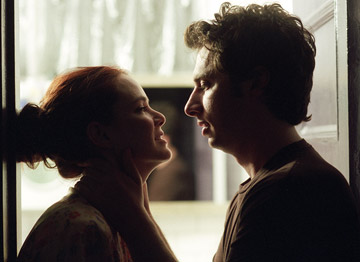
During the summer of 2001, Cinecultist flew to Italy to join our family for a vacation and on the plane, we saw this really bizarre and horrible movie. Completely soap opera-y with a bunch of young, attractive actors all trying to screw each other, yet whining about the pains of fidelity the entire time. We couldn't understand why so many Italians loved this movie. Of course this was the Italian blockbuster, L' Ultimo bacio which Paul Haggis has now adapted into the script for The Last Kiss starring Zach Braff. Apparently, bad source material does not guarantee a good movie any more than a good source does.
When Garden State came out, Cinecultist is not embarrassed to admit we were drawn in by Braff's mopey, indie boy shtick. A good soundtrack and puppy dog eyes are surprisingly effective, even on the jaded CC. But in The Last Kiss, il Braffino has worn out his voice over laden welcome. Hit a certain point in your life and all of this a do about fear of commitment becomes incredibly tired. Especially when Braff's only dramatic acting technique seems to be to get a completely petrified look in Michael's eyes when faced with any complex decisions.
For the American version, Haggis has jettisoned much of the emphasis on Michael's childhood buddies and their romantic hang ups for Braff's performance, hence the harping on our annoyance with him. It's too bad since Blythe Danner and Tom Wilkinson, who as Michael's girlfriend Jacinda Barrett's parents also have a relationship on the rocks, are each such deft performers. Casey Affleck also isn't half bad, but his lack of screen time, as Michael's married buddy with a kid and also contemplating divorce, seriously cuts into his ability to shine.
Perhaps the biggest problem with The Last Kiss is the naiveté attributed to the two main women characters, Barrett's pregnant girlfriend Jenna and Rachel Bilson's lithe, flirty college student Kim. Just the implication that Michael may have lied and been out for the evening not with a guy friend but with a real live girl sends Jenna completely round the bend. Granted, Michael seems incapable of having a girl as cute as Kim as just a friends but still, how is Jenna to know this? And why doesn't Michael know any girls who aren't his buddies' wives or girlfriends? This seems like a pretty limited circle of influence to have at 30. Then when Michael does admit to straying, you'd think he committed atrocities against humanity in the way Jenna shuts him out of her life. Sure, being betrayed, especially if you're pregnant and unwed, isn't going to feel great but are women in Wisconsin really that unsophisticated to think the possibility isn't there?
Then Kim, who seems to be a girl who knows no boundaries when it comes to flirting with a dude at a wedding who obviously has a girlfriend, gets the idea that one late night hook up is for forever? She's in college for god's sake, how can it take this little to break her heart? It's not as though she and Michael seem to have much of anything in common, as their interaction is limited to brief car rides and noisy house parties.
It really is ironic that the final desperate straw for Michael to ditch Kim is when she shows up at his office with a mix CD. Seeing the Braff turn down a compilation made by a girl, and one who carries the additional meta significance of having made her fame by starring on TV show infamous for choice mixes, is quite biting. Sadly, CC seriously doubts director Tony Goldwyn would consciously concoct anything quite that Entertainment Weekly-caliber silly. His characters after all make jokes about hybrid cars and think their puny little lives carry the significance of Tolstoy.
Doesn't Braff have the weirdest chin in the above production still with Barrett? This is not the chin of a forceful man.
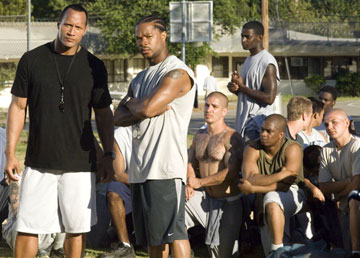
This may seem like an odd request, but Dwayne “the Rock” Johnson should give up his career in showbiz. With his sensitivity, strength and palpable kindness on screen, we could really use him in other arenas—a hostage negotiator maybe or a therapist at Guantánamo Bay. On screen, there doesn’t seem to be any male ego he can’t soften, win over or tame. Yes, that’s right. After watching his performance in Gridiron Gang, Cinecultist can indeed smell what the Rock is cooking and it’s called inspiration. Unlike revenge, it is not a dish best served cold.
The big conversion happened about a third of the way into this redemption through sports picture. Corrections officer Sean Porter at Camp Kilpatrick in Los Angeles is trying his damnedest to turn this rag tag bunch of delinquent gang bangers and drug dealers into a football team. But a visitor's day shakes up some of the potentially best players, as reminders of their messed up home lives start to intercede on their rehabilitation. One kid is visibly upset by a fight with his mom and Porter begins to build him back up with a offer that they should go over some new plays in the playbook. Just that smallest token of support is all most of these kids need. Maybe that sounds naive, but in that moment CC thought, The UN Peacekeeprs could really use a good man like the Rock on their side.
CC often finds it difficult to really analyze sports movies for their merits of realism. To us, it's a lot of running, throwing and catching. But Gridiron communicates a nice sense of urgency in all of this sweating, especially as the drama leads to that final important game. The plot, the characters and their collective struggles really do have you on your feet rooting for their victory, a feeling more essential to this lay viewer than any realistic calls or plays. In a few moments, the turn around of many of these excellent teen actors seems too effortless. But a third act moment of real seeming brutality on the field quickly dissuades that jaded assumption. The film is tagged as based on true events, and that moment made CC believe the reality of its East L.A. milieu.
Robin Williams' John Keating, Edward James Olmos's Jaime Escalante and Morgan Freeman's Joe Clark all have a new fellow educator in Johnson's performance as Sean Porter. We tip our hat to you, sir.
Radar made CC do it: we attended a screening of The Covenant last week and only barely survived to tell the tale. The opening credits nearly put us into epileptic shock from the jarring cuts and hardcore soundtrack. The plot is convoluted and incomprehensible. And the actors in it aren't even very cute, and have all the charisma of an A&F catalogue without the homosocial subtext fun.
We beg of you, from the bottom of our Cinecultist heart: Do. Not. See. This. Movie. If only for the reason that the scriptwriters included the term "witchy" as an insult from one teen warlock to another mid death match. That's just completely unacceptable as far as we're concerned.

A few weeks ago Cinecultist caught an advance screening of Sherrybaby at Makor, and we've been mulling over Maggie Gyllenhaal's performance ever since.
As the former drug addict and struggling single mother, Sherry, Gyllenhaal does amazing work fully inhabiting a complex and not very likable character. Sherry's like a little child herself, she wants everything to happen right now and she constantly feels persecuted. She longs to turn her life around, attending AA meetings, getting a job at a day care and reconnecting with her family who's been caring for her daughter while she was in jail. Except that every move she makes towards being a straight citizen, Gyllenhaal makes seem like its most painful act in the world.
Writer and director Laura Collyer does that thing which seems so elusive to the rest of mainstream Hollywood—she crafts a believable female character. You wouldn't think that'd be such an amazing feat, what with many women producers, directors and writers hard at work in the biz. But Gyllenhaal and Collyer are surprisingly brave to construct such an unlikable, yet intensely compelling young woman. Not to give too much away but Sherry never met a bad decision she didn't like and there are moments as the film wears on where you want to slink down in the seat and cover your eyes as she stumbles yet again. But this after all, is what good character driven drama is about and Sherrybaby is a real delight to see after the string of summer's cookie-cutter plots.
Cinecultist is happy to say, here's a smaller flick worth checking out and it's a sweet vindication for all of us who've loved Gyllenhaal, despite being not just a little bit overexposed after Secretary.
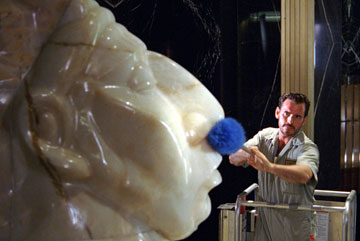
Cinecultist should probably just go ahead and name today officially Factotum day, since we have a couple of linky links to point out regarding the Charles Bukowski movie. CC interview the flick's director, Bent Hamer while he was in town a few weeks ago for the movie's premiere and our chat is now available on Papermag.com.
Also, we reviewed the movie for the Movie Binge crew yesterday, in addition to Material Girls. This may not be a huge surprise to our many bright readers, but of the two subjects, Factotum is the superior movie. It may be glum in its naturalistic portrayals of life on the edge as only Bukowski can tell it, but it didn't make CC want to do bodily harm to ourselves while it was playing. Oh no, only the new Hilary Duff movie could do that. It was so bad we stopped watching and started contemplaing what way would be best make to gouge out our eyes with a blunt object. Maybe a spoon.

Reading this post's headline, one might think Cinecultist is referring to John C. Reilly, Will Ferrell's cast mate from Talladega Nights: The Ballad of Ricky Bobby. Or maybe the ever brilliant, and increasingly Peter Sellers-esque, Sacha Baron Cohen. Sorry, no it's a more minor cast member that we totally dug. Cinecultist hearts the cougar because she's named Karen! Isn't that the silliest coincidence? The cougar represents Ricky Bobby's fear of the road and it is personified by a man-eating big cat with our name. During CC's screening of the movie, we thought maybe we were just projecting, but confirmation from friends who saw it later and various fanboy message pages agree.
It seems though that the promotional people for Talladega had a bit of a crystal ball, anticipating that fans of the film would want to project themselves into the movie just like Cinecultist. With that in mind, they put a weird little feature on the official website which allows you to create a poster of yourself and Will Ferrell all decked out in the race car driver gear. After the jump, the version featuring our mug.
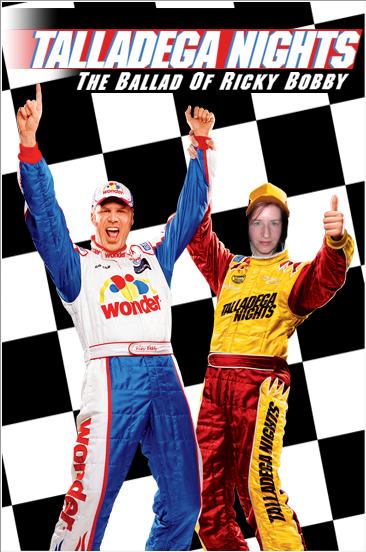
Not too realistic, right? Guess we'll just stick to writing about movies rather than imagining that we're in them.
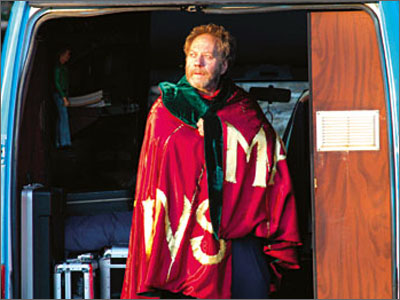
For a really long time Cinecultist has been a vocal opponent of horror films. We don't see them. We refuse. We're a huge 'fraidy cat. However, in the last few years our stronger credo of "see whatever is put in front of us" has exposed CC to more horror, and we think we've developed a tougher skin. We probably won't seek out Texas Chainsaw Massacre say, a movie recently our friend Eric told us about seeing for the first time, but when an editor asks CC to review a movie like Calvaire (The Ordeal), we'll start saying okay more quickly.
Calvaire is a Belgian movie made in 2004 by Fabrice du Welz and is finally getting a limited theatrical release here in the States, before it comes out on DVD in the fall. It stars Laurent Lucas as Marc Stevens, a cabaret-style singer who travels around the countryside performing for small groups. At the start of the film, we see how incredibly attractive Marc can be to his audiences, inspiring stalker-like devotion from two female fans, one quite old who smooches him in the dressing room and another much younger who gives him nudie pictures of herself. Like in Hitchcock's Psycho, these opening scenes which establish our protagonist's sexual appeal will later prove to be his serious liability.
On a country road to the next gig, Marc's van breaks down in the fog (classic horror movie mistake) and he enlists the help of a nice seeming young man searching for his doggie (also a mistake) to lead him to a nearby inn (don't do it, Marc!). At the Bartel Inn, the proprietor Bartel offers him a dank room and promises Marc the next day they'll easily fix his van. However at day break, this creepy, remote locale gets creepier and creepier as Bartel becomes less and less helpful. Also those town folk, all seriously scruffy dudes with a deep fascination for their livestock, don't seem to be too normal either. And then things start to get REALLY bad for Marc.
Perhaps what we liked most about this movie is that nothing pops out to goose you. To Cinecultist, that's cheap horror. Besides, we don't like leaping out of our seats, and trust us when we say, Cinecultist can really leap. Rather, Du Welz keeps his dread slow moving, lumbering and the more bizarre the better. Many times we peered closer to the screen muttering, "Wha? Did he really just do that? That's messed!" Jackie Berroyer, the grandfatherly looking actor who plays Bartel, gives a seriously disturbed performance; it's quite fucked up and menacing. But this movie doesn't try to offer any psychological explanations at the end, ala Hitch. It just leaves you with the lingering weird feeling that all isn't right, and it's not going to get any better. A pretty horrific conclusion actually, if you ask us.
Production still of Jackie Berroyer as Bartel in Calvaire (The Ordeal). The movie plays starting this weekend at the Cinema Village.
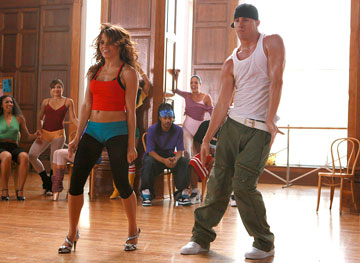
The dance school musical is a much maligned genre. With cheese-tastic plot lines, fancy footwork and a little teen smooching, they can be some of the most purely entertaining movies. When Cinecultist was a young girl we lived on them, despite our own less than stellar abilities on the dance floor. Fame, Flashdance, The Red Shoes, and we'd argue Save the Last Dance and Center Stage, all deserve a rental if you've not seen them recently.
Sadly, the newest addition to the pack Step Up, isn't worth canonization. CC caught an advance screening with our dance movie connoisseur friend Lisa and we both agreed it was less than slammin', in the poetic words of STLD. The dancing isn't as memorable as you'd expect from Anne Fletcher, the choreographer of Bring It On, and CC wasn't swept up in the implausible spectacle the way you'd hope. Maybe if Fletcher had been a bit more blatantly po-mo the movie would've been better.
In an interview in this week's Time Out New York, she plays dumb to any kind of dance movie references in her film.
TONY: Could you talk about the references to dance movies in Step Up? AF: What do you mean, honey? I’m sorry.TONY: It’s just that I saw moments from Flashdance, Dirty Dancing, Fame…
AF: It’s interesting because that was never in my thinking, ever. I can’t respond! [Laughs] I never, on any level, tried to do any sort of tribute or hat tip to any of those movies. I’m dead serious: I’m not that clever.
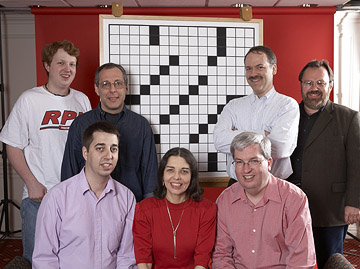
Last Saturday, Cinecultist perused the lists of films playing at our local theaters in search of an afternoon movie. However, we'd already seen about 85 percent of the releases. This is the good and bad thing about seeing movies for work -- many times we get to see them for free, but then what the heck are we to do for leisure? (Besides try to eat at all 101 New York mag cheap eats?) Fortunately, we'd not gotten around to catching Wordplay, the crossword puzzle documentary, so after a pleasant walk across town, we found ourselves at the IFC Center.
Wordplay is one of those difficult movies to write about because it's so sort of middling. It's perfectly entertaining while it's playing, and it's not really doing anything horribly awful or particularly groundbreaking. This seems to be a surprisingly prevalent trend amongst documentaries these days. They follow a familiar story arc, usually involving a competition and a rag tag bunch of quirky real life characters. But while these folks are cute and mildly engaging, they're not captured in a substantive way. Unlike a fictional character in a narrative film, it's not really possible to argue that they're not believable, because they're already actual human beings. Instead they remain a sum of their quirky attributes, cobbled together with a few anecdotes or odd pronouncements to the camera. We don't see anything on screen that we haven't seen a version of, in some form or another, a zillion times before.
With some help from our friends Adriane and John, two very fine documentary filmmakers that Cinecultist happened to have dinner with later on Saturday, we decided the problem is Quirk. Quirk becomes an easy short-hand for moviemakers which provides likable characters. However, these figures have no substance, their odd characteristics become a convenient checklist. One crossword puzzler is interviewed in front of an oil portrait of an ancestor. Another one lives near Columbia University and juggles batons. Yet another hangs out with his frat buddies between bouts of competitive crosswording. Blah, blah, blah. Rather than constructing unusual stories which happen to have odd characters in them who could potentially be unsympathetic, these movies seem to start from the checklist and grow from there.
That may sound overly harsh on a flick that we did enjoy well enough while we were watching it, but it's not something we'd honestly feel we should recommend. Especially when we know it could be so much more than merely quirky.
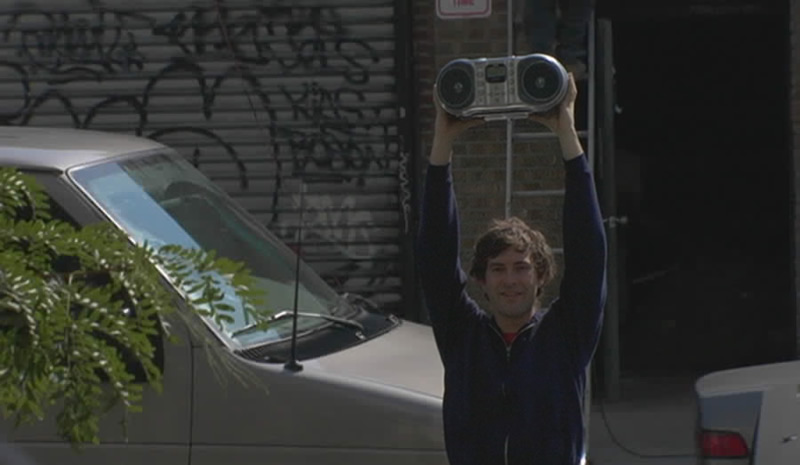
Cinecultist is all about The Puffy Chair these days, a small indie film made by the Duplass brothers on a shoestring budget, which is finally coming to New York for a run at the Angelicka starting this weekend. CC had a great chat with director Jay Duplass which is up on Gothamist now. For space considerations, we had to edit our interview down to the most pithy parts of Jay's responses and so didn't include this part where we discussed the great cluster of movie theaters in downtown New York. We were delighted learn though that Jay, like CC, is partial to the Cinema Village East from his salad days living here in the Eee Vee.
The one thing I’m the most excited about with the Puffy Chair which doesn’t really mean that much is that when you open at the Angelicka, you most surely get a move over to the Cinema Village East, which isn’t a premier theater by any means. Everyone always asks me, What does it mean to have your movie showing up at movie theaters? How surreal is that? It doesn’t feel surreal at all, because three hours before every screening we’re running around the neighborhood. We’re putting flyers up and we’re making sure that the colors look right and that it’s not going to get screwed up. So it feels very hands on, it doesn’t feel like Warner Brothers picked up our movie and bombed it out to every theater in the country. But with the Cinema Village East, I think it’s going to mean a lot when it comes to my little neighborhood theater. That’s the one thing I’m looking forward to the most.
Now that's what you call keepin' it real.
Production still from The Puffy Chair starring Mark Duplass, co-written by Mark and Jay Duplass. In this scene, Josh holds up his boombox to his girlfriend, Emily's apartment playing "Transatlanticism" by Death Cab for Cutie. As people who know our taste can attest, that was obviously the moment when Cinecultist knew we were deeply in love with this movie.
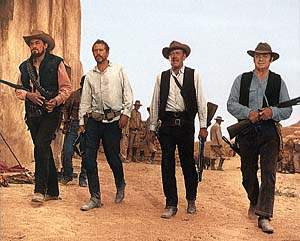 Yesterday evening, Cinecultist braved the sauna otherwise known as the New York subway system during this heat wave, to head out to Brooklyn for a screening of The Wild Bunch at BAM. BAM Cinématek has recently kicked off a Sam Peckinpah retrospective and while CC remembers discussing the elaborate final shoot 'em scene of The Wild Bunch in grad school, we hadn't seen the rest of this canonical Western. A steamy August night seemed like as good enough time as any to remedy that.
Yesterday evening, Cinecultist braved the sauna otherwise known as the New York subway system during this heat wave, to head out to Brooklyn for a screening of The Wild Bunch at BAM. BAM Cinématek has recently kicked off a Sam Peckinpah retrospective and while CC remembers discussing the elaborate final shoot 'em scene of The Wild Bunch in grad school, we hadn't seen the rest of this canonical Western. A steamy August night seemed like as good enough time as any to remedy that.
Sometimes when you watch something that you've heard is "good" or "art," the experience is transformative and it's instantly clear why its lauded. Watching Buster Keaton movies for the first time can be like that. (CC has Keaton on the brain because Film Forum is doing a Mondays series of his movies in August and September. Go see some if you can.) But other times, what was obviously the innovation at the time seems dated to our modern eyes, probably because its been ripped off so many times it's now cliché. Casablanca springs to mind as a classic example of that type of old movie.
The Wild Bunch fell into the later category for CC and our viewing pal, JP. What must have seemed so shocking at the time, like the indiscriminate violence during the shoot outs and the moral blackness of all of the characters, feels very tired now. Also, stylistic flourishes like the tough guy swaggering dialogue or the creepy, extended laughter amongst the bunch after they've narrowly escaped a bloody death, was just off-putting and bizarre. Equally weirdo was the movie's depiction of women from huge bosomed whores take a wine vat bath to a former love who's now with the evil general being shot point blank by her lover. Talk about women as objects, this movie really optimizes that ickiness.
While this wasn't a movie Cinecultist would be happy to see in the theaters today, as a cultural artifact, it's oddities make it sort of interesting. It's how we feel about Westerns in general. Mostly they're boring because CC doesn't get them on a visceral, personal level. As a genre, they don't say anything to us about our experience. Yet, the fact that they're so alien makes them intriguing as case studies. They don't entertain but they make us think. What did The Wild Bunch say about the Vietnam era? Why does that seem to be so different than now, even though our country is again in a quagmire of a foreign dispute? Was blood that looked like just tons of red paint really scary in 1969? Was this movie the beginning of our current trend of quick cutting action films?
All of these questions are still swirling around hours after seeing this movie that we could easily say we didn't like. So, in conclusion it was a movie going experience we liked, even if the movie itself wasn't our cup of tea.
BTW, if this whetted your Peckinpah fascination, here's a nice career overview on Senses of Cinema.
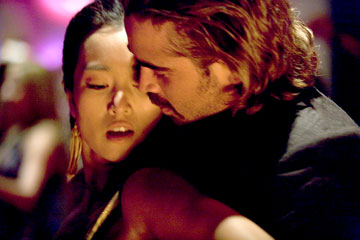
Walking into the Union Square theater this morning at 9:58 am, Cinecultist wondered for a moment about who the hell goes to see Miami Vice on the Friday morning it comes out? Besides our summer Friday selves and our business school student friend Ilana, of course. Quite a few people actually, not a packed house but a very generous smattering, mostly dudes. Fortunately, Michael Mann's hyperbolic art house action spectacle merited hauling our butt out of bed and into the humidity this early in the morning. There were a few snicker-worthy moments, but all in all we can highly recommend spending the over two hours communing with Sonny Crockett and Rico Tubbs as they take to the big screen.
Two big problems in our mind with most cop movies are the need for baroquely elaborate plots and realistic lingo banter. This kind of convoluted filmmaking can be difficult to follow and Mann lavishes attention on both elements to the point of distraction. Cinecultist realized after the movie was over, that we almost had to block out the plot and the dialogue to make sense of this movie, because to understand the whole two Miami vice cops undercover in the drug trafficking arena story is tough. Something about Aryan brothers, the Columbians, transport, fast boats and double crossing was all we could gather.
Colin Farrell and Jamie Foxx play the titular cops with deep cover and a deep friendship. Both performances had their charms, between Foxx's understated confidence and Farrell's uber-manly swaggering handlebar mustache. Like many buddy movies, the best relationship on screen is between the two men, though the sizzle between Farrell and Gong Li as the underworld businesswoman Isabelle was pretty amazing as well. Watching these two writhe around on the floor of a SUV or slither on the dance floor of a kingpin's salsa club, it's hard to imagine two sexier people on screen. Though again, it's best to just look at these two rather than listen to them, as Farrell's Irish by way of San Antonio accent and Gong's stilted English makes them tough to decipher.
This movie also converted Cinecultist to the beauties of shooting on HD video. In one of Mann's previous films shot on this stock, Collateral, we felt the blown out color and nausea-inducing not-so-steadycam made the movie look amateurish. But here, Mann super saturates the image, bringing the focus in tight during most shots and taking advantage of HD's ability to capture the contrast of night and twinkle lit backgrounds. The sleekness of the camera work perfectly compliments the shininess of the actors' good looks, making for an appealing visual product. Movies this pretty do really seem worth the $11 admission.
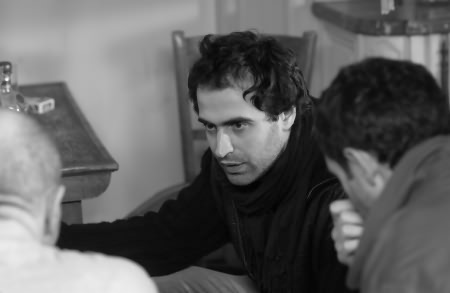
If despite our frantic urgings on Gothamist you still haven't made definite, written in the calendar with ink plans to see 13 Tzameti at Film Forum which starts today, consider this your next dose of incentive. The director, Gela Babluani will be doing Q&As following the 6:30 pm screenings tonight and Saturday. Cinecultist met him and found him delightful, so you have no excuses.
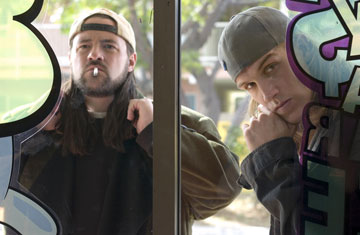
Last night Matty had plans to see Clerks II for his review on the Movie Binge and because Cinecultist is a bit of a masochist and a Kevin Smith nerd, we joined him. See, our feelings on KS are intensely conflicted as only a true movie obsessive could be. We were defeatist from the start. All night, having dinner first with TMB's Bronto Burger and then at a friend's eating ice cream, we kept announcing "Matty and I are going to see Clerks II later. It's gonna suck." But on the opposite token, we insisted to Matty that we go see the movie at the Anjelika because on the Clerks 10th Anniversary DVD, which we own, KS talks about how the Anjelika is where he first screened the film in a small festival. That kind of movie tourism only comes from a weirdly deep love.
But after sitting though that travesty of a sequel, Cinecultist thinks it might be time to break up with KS. Sever all ties. Loose his phone number and forget we were ever in love.
Walking out of the theater completely dejected, CC realized KS doesn't really understand why the first Clerks works, because the sequel does wrong everything that the original got right. Clerks takes a tiny premise (a day in the life of two dudes in going nowhere jobs) but adds complex, real characters with heart and culturally resonant banter. The camera work is static but like a play on screen, the important thing is the dialogue getting to ramble on with impunity. There the film can show its point of view and it's a delight. However, II seems to think that the point of the film should be the plot plotting along, hot girls to ogle and bewilderingly bad camera movement. For god's sake there's an unnecessary dance sequence! With nuns and other sundry Jerseyites! And it pulls back into a gratuitous crane shot!
What's the point of revisiting these characters if there's not enough of Dante and Randall just chatting and getting exasperated by each other? The only bright spots in the proceedings are the extended comments about Lord of the Rings Vs. Star Wars and Randall posting inflammatory comments on blogs which seems an obvious progression of his character. Also, the new character Elias, a super nerdy 19-year-old Christian virgin coworker, was quite amusing. Trevor Fehrman, the young actor who makes Elias both sweet and a total freak show, should get some great comedy roles from this performance. He really nails it.
In the climactic scene where Dante, Randall, Jay and Silent Bob are all supposed to reveal their true feelings through dude-like arguing and Silent Bob's voice of the sphinx pronouncements of truth, KS as Bob says something very telling. After a few false starts, he explains, "I've got nothing."
Sigh. *Sniff*. Exactly.
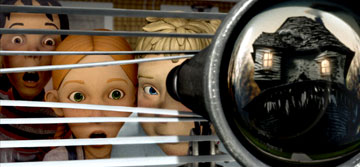
Between the summer deluges and the skin drenching humidity today, it's not be a pretty picture in Manhattan. But not to worry, Cinecultist spent much of the afternoon indoors at a screening of the new kiddie animation film, Monster House. Lured to Union Square by Josh, we had no idea that we were actually signing up to see Monster House in...wait for it...3-D! That's right, the tickets were even more pricey than usually ($12 sodding 50) but we did get the cool commemorative glasses pictured below.

They're made by this company called Real D, and they remind users on the packaging that while they may look like sunglasses made popular circa Back to the Future, said glasses will not protect the eyes from the sun. Here's a picture of Josh modeling them. Snazzy, right? Note that they fit adults and can be worn over your own glasses, which is a bonus for ocularly challenged parents.

The movie itself was actually pretty cute, about three pre-teens who suspect that the house across the street might have a life of its own. Particularly Maggie Gyllenhaal, as the voice of the babysitter and Steve Buscemi, who voiced the cranky old man who lives in the scary house, were quite good. Also, the children characters, D.J., Chowder and Jenny were funny without being annoyingly precious. But of course, the real test of a good kids movie is an audience filled with kids but who keep quiet because they're into the flick. The filmmakers of Monster House should be happy to know there was nary a peep during our screening.
Also, according to the trailers which were also in three dimensions, they're planning to rerelease Tim Burton's The Nightmare Before Christmas in this format in October. That could make for a pretty fun Halloween viewing experience of a total animation classic.
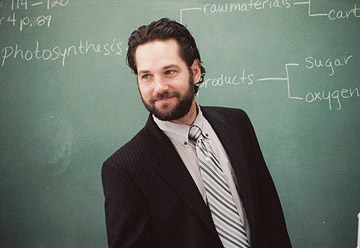 Ah, the things Cinecultist will submit ourselves to for the sake of actor crushes. Ever since Paul Rudd tenderly kissed Alicia Silverstone at the top of her mansion's staircase in Clueless, we've been crunching for the Rudd pretty bad. In more recent years he's eschewed his potential as a rom com leading man for quirkier, darker roles and that only makes us love him more. That's why small indie's like The Oh In Ohio, which we watched for the Movie Binge over the weekend, make us so depressed.
Ah, the things Cinecultist will submit ourselves to for the sake of actor crushes. Ever since Paul Rudd tenderly kissed Alicia Silverstone at the top of her mansion's staircase in Clueless, we've been crunching for the Rudd pretty bad. In more recent years he's eschewed his potential as a rom com leading man for quirkier, darker roles and that only makes us love him more. That's why small indie's like The Oh In Ohio, which we watched for the Movie Binge over the weekend, make us so depressed.
See, it's like this. There are movies that are good and there are movies that aren't good. And Oh is one of the later. Not that there aren't a few moments that vaguely amuse but generally, it was lame. Lame. And no amount of gazing at Rudd's crinkling eyes or contemplating how they could find a Volvo as monumentally rusted as the one Rudd's character drives could counter act the lamiosity. CC doesn't want to go to the movies just to oggle, we want stories that resonate and jokes that tickle because they're real. This wasn't one of those opportunities.

Two little indies that premiered at this year's Tribeca Film Festival are getting wider theatrical release this weekend, The Groomsmen directed by Ed Burns and Mini's First Time. Cinecultist interviewed the director of the later, Nick Guthe, a Brooklyn native for Gothamist this week. During our conversation when Nick mentioned he knew Noah Baumbach when they were kids in Brooklyn, CC had to hold ourselves back from exclaiming, "oh we've been in his apartment." It was for the Day Job and we were happy to note that Baumbach and wife Jennifer Jason Leigh who we also met, drinks coffee from a French press. However, despite the innocence of this connection, we thought it sounded a bit stalker-ish in our head and thus refrained. Though of course, we can share you guys.
Anyhow, despite wanting to support the indie directors and always enjoying chatting about their process and our mutual love of New York movie going, there is a reason why certain movies are going to stay little movies with minimal exposure and distribution. Mini's First Time, while having the distinction of being the least annoying of Nikki Reed's performances we've been forced to sit through, isn't a great film. It's perfectly passable and if you're into seeing sexually adventurous high school girls trying to be sophisticates (which granted, there are a lot of people who do) then you may really enjoy this movie. However, there seems to be something creepy and retrograde about it being the center piece of yet another indie flick.
Zee premise: Mini (played by Reed) is our narrator, telling through flashback the story of her last year in high school and how she learned so much through her various firsts. Her mother, Diane (Carrie-Anne Moss) had her while she was a struggling actress to milk child support out of a big name producer but according to Mini, the sex-pot shopaholic never really wanted her around unless Mini was mixing her strong, blended drinks. Mini gets along tolerably well with her stepfather, Martin (Alec Baldwin), a PR exec though their relationship changes considerably when Mini who's gone the Belle du Jour route seduces him as a high price escort. After Martin falls for Mini, the two begin to conspire to drive Diane crazy and get her committed.
Moss and Baldwin are always good actors and they hold their own here. However, the little feminist voice in our head kept raising it's hand to ask, Don't movies like this really do a disservice to the young starlets they are applauding? Mini's in charge, she's the smartest one in the room and the voice of the narrator who forces us to identify with her. But despite this celebration of young womanhood, we're all essentially leering at her because her sexuality is so on display. Isn't it sort of sad that this is how we want to be entertained and this is how girls become stars? Cinecultist isn't some prudish purist, titillation and defying taboos are all good in their own way. But shouldn't we question these constructs anyway?
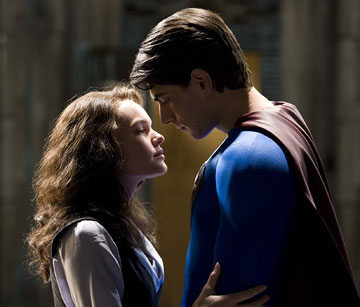
With a Sunday iced latte and toasty panini from Tarallucci e Vino on 18th Street in hand, Cinecultist finally got around to attending a screening of Superman Returns at Union Square and we're happy to report the movie was nearly as tasty as our sandwich. This was a surprise to be honest, because we'd almost gotten completely overloaded on all of the coverage, coverage, coverage of this movie. If we had to read yet another Brandon Routh is the Next Big Thing article, we were going to crawl under the duvet and never come out.
However! We're ready to say proudly, that Routh is a tasty little morsel of steel. Even Kate Bosworth, who with Orlando Bloom makes for one of the blandest hot couples ever, didn't entirely bug. The chemistry between these two, particularly in the sequence where Superman takes her from a toe to toe flight around Metropolis, made our blockbuster-lovin' heart soar. How could we ever have doubted that our boy Bryan Singer would bring subtle humor, big heart, complex metaphors and stunning set pieces to this iconic, familiar comic book tale?

Between reading Jonathan Lethem's Fortress of Solitude and hanging out with that strange creature known as the "New York Late 20-something Man Child," we felt like we sort of understood the Superman persona. But this movie casts a whole new light on this archetype and gave us new insights into why his character would hold such a sway over the boys who revere him. See, Superman by token of his god-like powers is set apart from human beings, he's grown up with them and loves them but isn't like them. He feels an intense sense of empathy, as evidenced by the scene where he flies above earth all deified listening to their prayers/complaints with his super hearing. Yet he isn't human, so his pain at the separateness is mitigated.
Also, the love between Superman and Lois Lane is the ultimate geek boy fantasy. She reveres him, yet she can't understand why he's so damn aloof. She's engaged to another man but she'll always pine for Superman and as for Clark Kent, she doesn't really know he's alive. That way Superman can be both the one with the crush and the crush object all without the muss or fuss of a real relationship. As for Superman's feelings, he obviously feels deeply for Lois and (spoiler alert) his kid, but his concerns as Superman keep him from ever having to do more than look longingly at her and chastises her for smoking. He's sensitive and the ultimate good, yet never has to take out the garbage or go to couple's counseling. Lucky dude. He can repel both bullets and adult relationships.
Finally on a different tangent, a word about the baddies in this movie. Usually Kevin Spacey crawls under our skin he's so irritating but here, his scenery-chewing abilities were used to their fullest. Our love for Parker Posey also continues unabated, especially with those frizzy hair-dos and her fascination with that evil little fluffball dog. Those dogs are seriously menacing and hilarious. However a note to the movie's editors, what the heck happened to Kal Penn's dialogue? His character is apparently mute because he's in all of these key scenes yet doesn't speak a word. It's a bit creepy to be honest and quite perplexing. It's not like he's so scary looking, why cast him if he never gets to utter any lines? There's got to be some serious Penn banter on the cutting room floor and maybe we'll be lucky enough to see it on the DVD extras.
Other than that, ranks as one of our favorite movies of the summer so far and even (*gasp) worthy of it's 2 hours and 34 minutes (a.k.a. too freakin' long) running time.

Cinecultist had a few thoughts about last weekend's boffo blockbuster Pirates of the Caribbean, Dead Man's Chest which we posted over on the Movie Binge today. Basically, we feel like it epitomizes the definition of "bombast" and we mean that in the best way possible. For moviegoers like CC who love the spectacle of summer movies, the more overblown the better.
Though we will say our enthusiasm for the movie is slightly clouded by our expectations for it. The first Pirates movie was in our top ten of 2003, so it's hard not to have high hopes for a sequel. It probably would be more enjoyable if it weren't such an obvious serial, marking time between part one and part three. Our theory is that usually in trilogies, part two is the best (see Godfather II, Empire Strikes Back, etc.). It's often when the filmmaking team hits their stride in terms of overall clarity of vision. The brilliant premise was there in the first installment but the second one is where they can really expand on it. Unfortunately, we didn't get that sense in Verbinski's follow-up. Sure, there's lots to like. Practically each sequence is chock-a-block with stuff. But that makes the quality of it a touch suspect.
But heck, a little guarded enthusiasm from Cinecultist isn't going to stop the Hollywood machine from churning out a huge hit from this movie. So go, if you haven't already, with our blessings. We all need a little cinematic padding during these hottest of months.
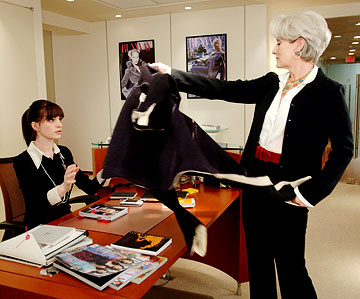
One of the most surprising discoveries from the Cinecultist's participation in the Movie Binge project has been finding out that we share our pretty low-brow taste for typically what is called "chick flicks" with fellow contributor, Matthew "Fluxblog" Fluxington. A few times now, movies that most of our friends would call "Karen movies" with a tone of affection and dismay, have been flicks Matthew wants to cover too. Who knew a music dude like Matthew would know such much about our genre of choice?
While CC was still working on our opinion of The Devil Wears Prada movie for our Movie Binge review, we had the following interesting IM exchange with Matthew.
Matthew: I thought it was fun enough, but it had no idea what it wanted to say and the resolution is idealistically incoherent.
CC: Yeah, I think the filmmaker's fear of how Anna Wintour would feel being portrayed as she is in the book changed the characters a lot.
Matthew: Yeah it's funny how Meryl is the most sympathetic character by the end.
CC: I know.
Matthew: But the thing I don't get is the whole "being ambitious and hard working is great and will get you far, but if your shlubby underachieving friends are alienated by you, well then you MUST be a fraud."
CC: Yeah, that was pretty muddled.
Matthew: I think there's probably a much better movie in a sympathetic person trying to deal with how their ambitions have led them into a lifestyle at odds with their old circle of friends, and trying to have both at the same time. But the movie never gave us much reason to reject the fashion people, and so it's jarring when it asks you to do so. So this movie is about how most people like to admire ambitious people, but cannot relate to them.
Most of our thoughts up until then had been on the plane of "Meryl continues to rock our world," "Anne looks lovely with smooth hair" and "Simon Baker's face has something funny about it that we can't quite put our finger on." But as Matthew rightly points out, the movies which seem the most throw away often actually say best what is happening in our culture at that moment in time.
What's more of the zeitgeist according to Prada? Turning bitching about your subservient work environment into dubious fame and a multiple book deal? Or the subtle power that the demanding boss ultimately wields in modifying the resulting movie to make her look sympathetic and be played by Meryl Streep? Or is it about how ambition looks better on a woman when she's a size 4 and totting the most current handbag? The jury's still out on all of the above as far as we're concerned.
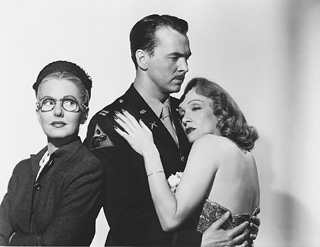
Cinecultist is in a total cheese coma. No, we haven't rewatched some Molly Ringwald/John Hughes movie but trying to recover from dinner at Freeman's with our friends Kristi and Ilana where we consumed Freeman's infamous mac & cheese, the sublime artichoke dip AND a plate of camembert with apricots and honey. Plus there was wine, of course. Ugh, our happy stomach is completely overwhelmed.
To keep from having dreams where we're attacked by a giant plate of artichoke dip, we thought we'd tell you about the movie we three caught at Film Forum before our cheese-tastic meal. The rep house is running a great series of Billy Wilder movies this month in honor of his centennial and today we watched A Foreign Affair with Jean Arthur and Marlene Dietrich. Arthur plays an uptight congresswoman post-World War II who visits Berlin with her congressional committee to check up on the reconstruction troops' moral. She begins investigating a former Nazi lounge singer (Dietrich) who seems to be getting special treatment from the army. John Lund as Dietrich's officer boyfriend wants to throw Arthur off the scent and starts wooing Arthur with great comedic effect. There's one spectacular scene where he's going in for the kiss and she keeps opening file cabinets and reciting the poem Paul Revere's Ride to distract him. The rest of the film is full of great Wilder sexual puns and Dietrich sex-pot musical numbers. It's not to the level of Wilder sublimity as The Apartment or Sunset Boulevard but it was certainly diverting and at time intriguing with the corrupt post-war Germany setting.
At dinner afterwards during our wine-fueled discussion of the movie, CC offered to go to our trusty Conversations with Wilder by Cameron Crowe book when we got home to see what pithy comments the writer/director had about his movie. CC argued that Dietrich, though this performance doesn't compare to Blue Angel or Morocco, is still h-o-t. Wilder the pragmatic dirty old man agrees, to a point.
Cameron: "...Comparing the close-ups in the film, you did seem to put special care into Dietrich's close shots. Maybe that was her knowledge of the lighting and the camera, but it seems that it would be hard in a way not to fall in love with Dietrich, looking through the lens?
Billy: I was not. I do not fuck a star. That's a primary rule of mine. Because I was so busy with the picture. Because I'm so worried about the picture. If I did have real yen for that thing...then I fuck the stand-in. I go to the Valley where the stand-in lives."
 Two years ago, Cinecultist caught Yoji Yamada's 2002 film Twillight Samurai and went nutso for it, even going so far as to say it was in the top ten for the year. So it was with great anticipation that we attended a screening of his most recent film, The Hidden Blade last Friday and again we're in love. Complex characters, intriguing cultural context, familial duty, unrequited romance and stunning photography always gets CC a swooning. This movie has all of that, plus some judiciously doled out kick ass samurai fighting. Can you really go wrong with that combination?
Two years ago, Cinecultist caught Yoji Yamada's 2002 film Twillight Samurai and went nutso for it, even going so far as to say it was in the top ten for the year. So it was with great anticipation that we attended a screening of his most recent film, The Hidden Blade last Friday and again we're in love. Complex characters, intriguing cultural context, familial duty, unrequited romance and stunning photography always gets CC a swooning. This movie has all of that, plus some judiciously doled out kick ass samurai fighting. Can you really go wrong with that combination?
Like Twillight Samurai, The Hidden Blade follows a down and out samurai whose formerly prosperous family has become threadbare following his father's hara-kiri, mother's death and his sister's marriage. To make matters worse, Munezo Katagiri (Masatoshi Nagase) also secretly pines for the family's former maid Kie (Takako Matsu). When it comes to light that her husband's family isn't treating her well, Katagiri swoops in to the rescue, despite the obvious impropriety. Meanwhile, Katagiri's school days friend, Yaichiro Hazama (Yukiyoshi Ozawa) has become embroiled in a plot on the Shogun and the clan has brought him home to the provinces to imprison him. That is until the dangerous criminal escapes. Katagiri and Hazama trained under the same sword teacher and only Katagiri can match Hazama's prodigious skill. What will this noble samurai do in the face of these two scandals?
In our review of Twillight, we noted the Jane Austen-esque plot flourishes and again in this film that comparison is apt. Convention and societal structures constrain these characters in their positions more than ever a mighty battle could. When the drama exists internally, in the complications we create in our own minds, it is at its most compelling. Though we will say, the scene where the title finally comes to make sense is also pretty awesome. We don't want to give anything away which would detract from the kick ass-ness of it, but needless to say, it's swift and a little shocking, just as real life violence can be.
This movie is finally getting the US DVD treatment in August, so really we urge you to either try to catch it at Cinema Village now in NYC or add it to the Netflix queue. You won't be disappointed. After all, Cinecultist only gives our heart to the most worthy and The Hidden Blade is surely one of them.

Earlier today CC posted a long-ish review of the new Jennifer Aniston and Vince Vaughn picture over on our new project, The Movie Binge. Though we think we hit most of the major points in that review, there is this needling detail from the film that we failed to mention which often happens in the star vehicle romantic comedies and is totally annoying: completely unrealistic real estate.
Granted, as a New Yorker (nearly half way to the 10 year benchmark!) Cinecultist is at time overly sensitive to the difficulties of urban life and the fantastical ways it is depicted in cinema and on television. Also, The Break Up is set in Chicago and though we've visited, Cinecultist has never tried to rent an apartment there, let alone buy a condo like the characters in the film. Regardless! Our gut, intuition and sense for bullshit says a tour bus company operator and a gallery manager could not afford such posh digs. Let alone furnish it in that tasteful, modern and oh so elegant decorating scheme. It's seriously distracting.
Perhaps before movies like this, or even before every rerun episode of Friends, we could get a reality disclaimer from someone who knows real estate, Barbara Corcoran* perhaps. Barb would appear on screen, or maybe just her voice, disembodied and godlike: "The property you are about to see in the following teleplay is fictional and does not represent actual market value in said urban area. Thank you." That'd be very sobering and helpful, in our opinion.
We're all about escapism in movies, especially summer ones, but come on. Let's keep it from becoming sci fi in regards to the set design. And don't even get us started on Jennifer Aniston's wardrobe in this. Sheesh.
OMG. Did you know Barb has a blog? Check it. Seriously. "She" blogs about her interns and from the point of view of a mouse in her office.

Summer is the best because it means summer Fridays and summer Fridays mean full on permission (from us to us) to watch crappy movies in the middle of the afternoon. Ahh, it is the sweet life. Though we hadn't officially begun the summer half day ritual last week because it was pre-Memorial Day, we still were encouraged to vacate our office at 3:00 pm and thus just barely caught a 3:30 pm downtown of the Lindsay Lohan vehicle, Just My Luck. Balcony seating, smuggled in Diet Coke and special treat Toblerone bar (we're vicariously eating for poor, troubled Linds) -- does it get any more choice?
Oddly enough, even in this ideal situation we encountered something we hardly expected. The movie wasn't half bad. Sure, the premise is weak (lucky girl looses her luck to unlucky boy with a masked kiss then must find him again to regain said luck) but the blithe charm of both Ms. Lohan and her co-star Chris Pine actually carried the day. They're both cute and personable on screen, which is actually more than we can say for a certain supporting player previously from the O.C. (Samaire Armstrong, your 15 minutes are up, girl!). Plus, the film has the advantage of being quite downtown and Eee Vee centric. Linds's character lives in the most beautiful building on Fifth Avenue (same layer cake stone facade as Kate Hudson in How To Lose A Guy In 10 Days), Chris Pine's character lives on Ludlow Street, starts working down in Tribeca, there's mention of the Knitting Factory and the girlfriends live in a walk up above the Dumpling Man on St. Mark's. Sure, they randomly constructed a set on Ludlow for a Bowling Alley/Bar, which would never fly in that hipness arena but you can't fault them for at least trying to be sorta, kinda genuine.
While we wouldn't go so far as recommend going out of your way to see this movie, it's surely better than a poke in the eye and if it happens to come into your periphery sometime soon on cable or whatnot, you don't have to turn away in disgust. That may seem like an oddly specific way to put our Cinecultist stamp of approval on a new release but you'd be surprised at how many times those very circumstances come up in real life.
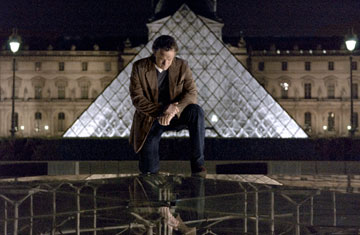
Cinecultist merrily contributed this weekend to the $77 million figure for domestic box office receipts for The Da Vinci Code. Even though the official summer movie season doesn't start until after the long weekend next weekend*, CC felt like we were chipping in our $10 at BAM's theater to the big kick off. However, instead of being swept away by the spectacle and the intrigue and the big name stars, we found ourselves fidgety, bored and snickering a little at the pomposity of it all. If only Ron Howard had spent less time figuring out how to make Ian McKellen's fancy PowerPoint display for Da Vinci art history and more time making this movie fun.
Speaking of Ian McKellen and his crippled, crotchety Professor Teabing character, as other critics have said, he's the best part of the proceedings. Hobbling around on his dueling crutches, challenging Hanks's character to a tea trivia fest (milk or lemon? depends on the tea, of course) and making things tough for his man servant, McKellen can't help but evoke all of his other wizened old men characters. It's like Gandalf and Magneto weren't as benign as we always thought they were. Yet, they're all now more infinitely intriguing.
Except for this brief bright spot, the rest of Da Vinci is da dreadful. Howard's visualization is for the lowest common denominator, his moviemaking can't possibly fathom that the audience could understand as simple a conceit as "bullet in door groove jams the door" and so must spell it out in the most obvious shot-reverse shot structure. Hanks knows how to do "affable" but is completely at a loss on "aloof" and "overly intellectual." Plus there aren't really any satisfying twists to the plot, most of the huge revelations are easily spotted miles away. Then, after these hushed tones and dramatic airs, Howard will switch tacks and plop in an innocuous chat in the courtyard scene. There was audible snickering around us in the theater at that point.
For a film from a book that has such a huge international fan base, CC sort of assumed that at least the story was entertaining if not the most original or plausible. But Howard and screenwriter Akiva Goldsman have made an utterly unfun film. Now it'll just be interesting to see if that general critical opinion translates into lower box office receipts or if Code continues to convert the masses.
*Psst. Get ready for The Movie Binge. 85 movies between Memorial Day and Labor Day. It's gonna be brutal and hilarious.
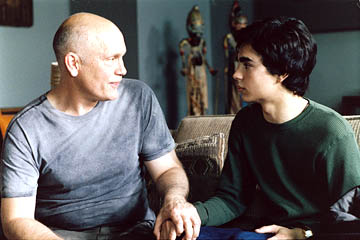
We wanted to like Art School Confidential, the new Dan Clowes/Terry Zwigoff movie, more than we did. After all, the supporting cast (Anjelica Huston, Jim Broadbent, Steve Buscemi and John Malkovich) could certainly live up to Clowes' usual kooky cast of characters, lead Max Minghella is easy on the eyes and Cinecultist loves pretentious art school students as much as the next urban dwelling bohemian. However, this movie didn't have the spark that it needed to come together as a compelling film. Instead it was just a hodge podge of good intentions and half-baked jokes.
Maybe the problem was the Rilke-esque plot structure. Young poets or artists trying to make it big are sweet but essentially annoying, whining, self-indulgent characters. We want them to be able to rise above their own naive ineptitude but that process can be painful nonetheless. Minghella's character Jerome longs to be both a great artist and have a beautiful girlfriend but the way he goes about it with the nervousness and the cool guy yet not posturing is painful to watch. Maybe the Cinecultist doesn't really "get" what it's like to pine for a girl who likes the dumbest guy in school but this hardly seems like the high drama Art School Confidential makes it out to be.
All of that would faux pathos be palatable if only the jokes were funnier. The crass film student gets his funding from his grandfather, who wants to see a horror film about a strangler with shooting in it. A cute art school girl alternates between sobbing and laughing hysterically as Jerome tries to make a move. A pretentious art prof makes paintings with only triangles in them but says it took him years to learn to paint like that. Ha. But not so genuinely funny or real.
Still Sophia Myles, as the dream girl Audrey, is lovely and Max has some intriguing eyebrows. Next time will be better for our friends Clowes and Zwigoff, surely.
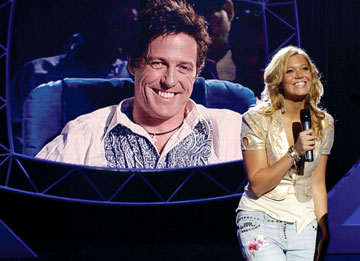
Sunday morning Cinecultist texted Lisa with the following (slightly cryptic) message:
Too rainy for kickball I think. Want to catch a movie later? New M Moore?
See, the T9 function on our cell phone didn't have the word "Mandy" in its memory but we figured Lisa would know what we meant. She did, calling us later with the news that it was playing at 7:30 pm in her neighborhood. What was exactly? Why American Dreamz, of course.
CC has a bit of a thing for Mandy Moore movies calling Chasing Liberty (which we also watched with Lis), "the best film of 2004" on January 13th of that year. On the scale of Mandy goodness we'd rank this one not as good as "the one where Mandy's the president's rebellious daughter" but definitely better than "the one where Mandy's the cancer stricken preacher's kid." Basically, she's the thinking person's pop star slash actress. She's cute but there's substance there too.
In the film she plays a Britney-esque pop star wannabe who gets on an American Idol type tv show where she competes against a sleeper cell terrorist who loves show tunes, in front of the President of the United States who's a guest judge on the program. This silly, very-of-the-moment satire is mildly diverting, though it probably isn't something that will be resonant beyond six months from now. But no matter. A little political and sociological fluff in the cineplex never hurt anyone and at least there's enough of a dialogue going on these days that projects like this can get bankrolled in the first place. If our administration had any say in it there'd be no discussion at all, let alone the goofy cinematic kind.
Matthew Barney's newest film/art piece Drawing Restraint 9, a collaboration with his lady Björk, comes out this weekend and Cinecultist is pretty excited. We first saw Barney's work when we went to Germany, in an exhibition about gender difference. It was a still from Cremaster 3 (his last series which culminated in an amazing show at the Guggenheim that we went to twice) and we were hooked on his bizarre mise en scéne and allusions to cultural memory.
This time around Barney's major influence is traditional Japan and once again, Vaseline plays a huge part in the "plot" as he pours a huge slab of it on a sailing ship. Björk appears along with Barney as one of "the Guests" on the boat and she also composed the music, using particularly an old Japanese instrument called the sho. It should be totally beautiful and completely perplexing, if the stills below are any evidence. For those in NYC, it's playing at the IFC Center in the West Village.


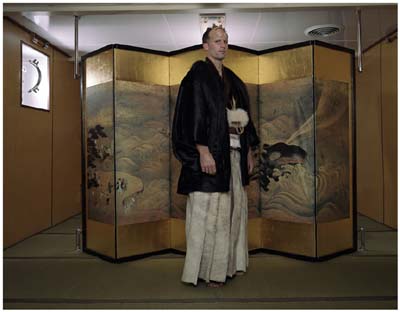
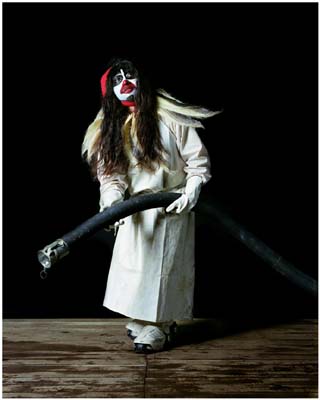
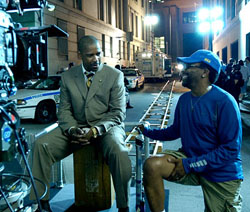 Lately, Cinecultist feels like we're all about the genre picture. Formulaic Hollywood plots done right with good acting, strong but not flashy camera work, and solid but not cheesy plot sign posts. All roads that away lead to good entertainment, says CC.
Lately, Cinecultist feels like we're all about the genre picture. Formulaic Hollywood plots done right with good acting, strong but not flashy camera work, and solid but not cheesy plot sign posts. All roads that away lead to good entertainment, says CC.
Hence our happiness with Inside Man, a "Spike Lee joint" that Lee directed as a director for hire, aka not a script he developed himself. This is auteur studies at it's most basic, because in these instances a cinephile can sit down with the final product knowing the filmmakers didn't begin with their preoccupations inherent to the project, and thus any trademark flourishes are by products of the director's distinct style. Themes common to Lee's work -- New Yorkers, race, class, 9/11 -- all come into relief here. Plus, we get a few trademark Lee visual touches like a seemingly stationary person propelled forward through space and direct address to the camera.
Cinema studies aside, Inside Man is also a super entertaining little picture with great performances and a fun, twisty plot. It should go without saying that seeing Denzel Washington, Clive Owen and Jodie Foster on screen separately, let alone acting together, can be a joy. Each of these performers burrow into their roles and give what could be simple parts impressive depth. Also, the chemistry between Washington (who plays the investigating detective) and his partner, Chiwetel Ejiofer, an English actor less familiar to US audiences, is really solid. And we also need to give props to the costume designer (Imdb tells us it's Donna Berwick) for putting Foster into those fierce suits and heels. Girl looks h-o-t-t. CC can completely understand how her corporate fixer character can bend the will of powerful men when she's dressed like that. Yowza.
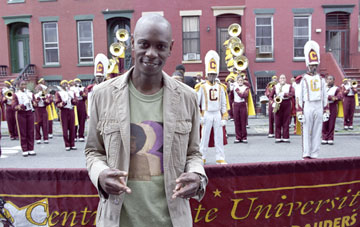
Ever since Cinecultist saw toked up Dave Chappelle inside the craziest taxi cab ever in 200 Cigarettes, we've been a fan. But our bemusement has turned into full on crush with the release of his concert documentary, Dave Chappelle's Block Party directed by the brilliant Michel Gondry (Eternal Sunshine of the Spotless Mind). Filmed in 2004 at an outdoor concert Chappelle planned in Bed-Stuy part of Brooklyn, the film intercuts between the show which featured the reunited Fugees, Erykah Badu, Jill Scott, Mos Def, Common and others with shtick of Chappelle prepping and inviting folks to the secret show.
Cinecultist actually heard about the concert before it happened and tried to get tickets but with no luck. We had to sign up on a website and sorta hoped that our last name which doesn't automatically indicate that we're a square Jewish white girl from the Eee Vee would help our chances. It didn't. However, what Gondry's captured here is more than just the show itself. It's Chappelle's asides, how he interacts with his fans and the amazing characters he invites along for the ride that make this an utterly charming movie.
Some stand out bits: Chappelle and Mos Def's straight man/funny man Vegas lounge act banter complete with Mos on the high hat and snare. Erykah Badu pulling off her Afro wig mid-set and then crowd surfing her way off stage. The crazy hippie couple who live in the Brooklyn Angel building that becomes the backdrop for Chappelle's stage who invited Dave to come up and "rest his loins." The uber fussy band director from Ohio whose band travels all the way from the heartland to play Kanye West's hit "Jesus Walks" at the start of the concert. Cody ChesnuTT acoustic send out at the end of the film -- that guy really knows how to rock.
But of course, the real star of the show is Chappelle himself. This guy may think he has no talent and talked his way into a fortune but this movie, and his equally brilliant though short lived TV show, proves differently. Chappelle's brilliance lies in organizing brilliant people around him and then letting the magic happen
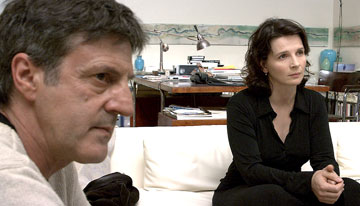
Caché [The Hidden], Michael Haneke's newest film about bourgeois French guilt starring Daniel Auteuil and Juliette Binoche is a fascinating treatise about the powers and limitations of the camera. A story of a middle aged Parisian couple who begin receiving unsettling surveillance videotapes, it's one of the most anxiety inducing films Cinecultist has seen since A History of Violence last fall. It's the kind of movie whose tone makes you long to get up from your seat from the suspense and yet you won't want to miss a frame.
Right from the beginning, Haneke plays with our assumptions that what's on screen is what there is to see. The opening shot, an exterior of a middle class Paris house in medium distance with the credits playing over it, is revealed to be the first of the mysterious tapes delivered anonymously. However later in the movie when the camera moves around to reveal other angles of their street, you realize how impossible it is that a camera could be position in that spot unnoticed. It's much to high, well above the cars parked there, and almost in the middle of the street. It's as though it had to have been on a tripod or cherry picker or something. In this moment and many others, Haneke wants us to distrust and question what we see in the frame.
This visual theme is expertly carried over into the story as guilt and secrets come bubbling to the surface in this complacent family. A harsh indictment of the French intellectual and their country's relationship to the Algerians, the movies is probably pretty prescient about the future of America's own connection to the Arabs within its borders. We hate to say more elusive things but really this movie's resonance lies in knowing not too much as the film starts. So just go see it and be wowed.
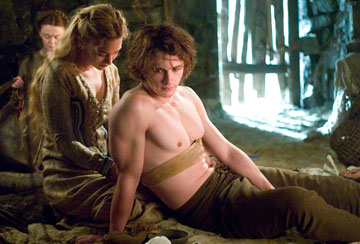
We really don't need to tell you that Cinecultist was eagerly anticipating Tristan and Isolde right? It has all the elements we're a total sucker for: historical setting, epic romance, pretty costumes, sword fights, castles. More castles the better, we say. But, throw in some James Franco goodness and CC was so totally there last Saturday for an afternoon screening.
However, even with our deep love for this kinda crap, we do acknowledge its usual crappiness (see Kingdom of Heaven) and seldom transcendency (see Queen Margot). On the continuum of "C" to "T", Tristan and Isolde is happily above mediocre and almost close to not half bad. Some elements which help: plentiful shots of shirtless James Franco. Rufus Sewell doing his patent-pending flawed bad dude routine. Sophia Myles and her lush blonde locks. The plot clips along and the dialogue while earnest is not ham-fisted.
Apparently, Tristan and Isolde was a book, in addition to being a legend and a Wagner opera, and it's so good that Jen, who usually bills herself as mostly a music person, can quote from it. Sadly though, the usually literary-minded CC has to leave such geeked out posting to her and dwell instead on the hotness of James Franco a bit more. Dear lord, he's pensive and lovely. So much so that we might even be excited now to see Justin Lin's Annapolis. And that's a guy movie about military culture! Shocking.

Wednesday night after work, Cinecultist walked uptown with our co-worker Josh and discussed CC's plan of taking in something craptacular cinema to unwind from a long day. After parting at St. Mark's, Cinecultist grabbed a tasty steak burrito from the closest Chipotle and headed over to the Village East to a 8 pm screening of Casanova. A cheap dinner and a movie date with ourselves, if you will.
However, despite the pleasing spicy kick in our burrito there was not such a pleasant mess emanating from the screen. Not bad per se, just well, uh, bland. Homogenized. We couldn't quite put our finger on what was so beginning of January release* worthy about Casanova, what with it's decent cast, costumed comedy-ness, until Josh asked for a recap today. Then it came to us. Epiphany. Here it is:
The movie is set in Venice, Italy during the 18th century but everything is so darn tootin' clean. We're not talking just about the people or the houses -- the canal is a crystal clear green. The Venice canal! In one scene, they throw Heath Ledger's Giacomo Casanova in prison and even the prison is spotless. The walls are so pristine, you could lick them. Don't know why you'd be licking a prison wall, but still. Nary a touch of mold or dank or anything interesting in the whole place, or the movie for that matter.
Casanova has no dank. That's our problem with it. In a nutshell of course.
*You realize that if this pic, and pretty much everything in the theaters during January and February, was any good at all it would've come out before the Oscar eligibility cut-off on December 31, right? Okay. Good, we're all on the same page.
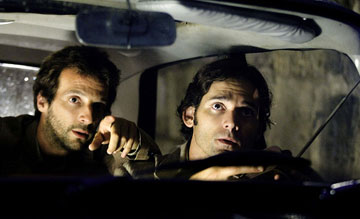
Though we didn't include it in our top ten from last year, Cinecultist did appreciate Steven Spielberg's newest release, Munich, more than the general consensus (ie. the very unscientific polling of a few movie-ish friends). It's overly long like many of the movies in the theaters right now but the cast is great and its topical commentary makes an interesting bookend to another story about the Middle East, Syriana.
Of course, Munich is also a companion piece to Spielberg's other personal story about Jewish identity, Schindler's List. When that movie came out CC was deeply affected by it, going to see it twice in the theaters and bawling like a baby both times. If Schindler's was, in a round about way, about "why a Jewish state", then Munich is contemplating "Jewish state, 25 or so years later." In 1972, 11 Israeli athletes were held hostage and then killed by Palestinian terrorists at the Munich Olympics. Spielberg's film follows the aftermath of this attack as the former Mossad member, Avram (Eric Bana) and his crack team track down and assasinate a list of PLO operatives in Europe.
The film has a vignette structure as the group discovers the location of each name on their list and then plots how to do them in. However, unlike most caper or thriller movies we seen lately, Avram et al are a bit inept. They're not experts in the art of killing. There's not really the usual voyeuristic pleasure to be derived from watching them execute a precision attack with finesse. Instead, at every turn, we feel their anxiety, guilt and second guessing of their pursuit. Are these really the guys they're looking for? Were they really involved in the Munich attack? And is their extermination really worth the horrible retribution being heaped on the Israelis in response?
Spielberg doesn't shy away from this questioning though his movie remains fiercely loyal to the Israeli cause. Perhaps what we liked best from the movie (beside of course the pleasure of seeing Prime Minister Golda Meir depicted on screen -- you go, Golda!), is how much it insists that there is no easy answer to terrorism. If you strike back against violence and madness, do you get a real result? Doesn't seem that way from the hollow eyes of Eric Bana's character by the end of this picture. Though maybe this complexity and anti-Pollyanna-ness that we're unused to seeing in Spielberg should be attributed to screenwriter, Tony Kushner, a playwrite (Angels in America) familiar with tackling questions without easy answers.
However, we should note that despite the interesting questions raised within this movie, Cinecultist still felt it necessary for our sanity and well being to go right across the street to Urban Outfitters after the movie to try on some frivolous tank tops. Oy. It's hard to be a questioning Jew, isn't it Steven?
1. Capote
2. Taste of Tea
3. Nobody Knows
4. Good Night, and Good Luck
5. 9 Songs
6. The 40 Year Old Virgin
7. Look At Me
8. Sympathy for Mr. Vengeance
9. Brokeback Mountain
10. King Kong
Honorable Mention:
The Hitchhiker's Guide to the Galaxy, Sisterhood of the Traveling Pants, The Dying Gaul, Pride & Prejuide, North Country, Syriana, Batman Begins, Lords of Dogtown
After the jump, a list of all the theatrically released movies Cinecultist saw this year. At over 70, that's more than one a week on average. Good work for the past 365, but we think perhaps we have room to improve. In the comments, feel free to leave your top picks for the year...
In Good Company
The Wedding Date
Hitch
Bride and Prejudice
Constantine
Diary of a Mad Black Woman
The Upside of Anger
Melinda and Melinda
Oldboy
Sin City
Look At Me
Fever Pitch
A Lot Like Love
The Interpreter
The Hitchhiker's Guide to the Galaxy
Crash
Mysterious Skin
Kicking and Screaming
Monster-in-Law
Layer Cake
Star Wars III
Saving Face
Sisterhood of the Traveling Pants
Lords of Dogtown
Rock School
Mr. & Mrs. Smith
Batman Begins
Me and You and Everyone We Know
Bewitched
Murderball
Charlie and the Chocolate Factory
Wedding Crashers
The Island
9 Songs
Last Days
Must Love Dogs
The Dukes of Hazzard
2046
Broken Flowers
Junebug
Pretty Persuasion
Asylum
The 40 Year Old Virgin
Red Eye
Sympathy for Mr. Vengeance
The Baxter
The Constant Gardner
Lord of War
Everything Is Illuminated
Roll Bounce
A History of Violence
Capote
In Her Shoes
Good Night, and Good Luck
Nine Lives
North Country
Shopgirl
Jarhead
The Dying Gaul
Ellie Parker
Pride and Prejudice
Harry Potter and the Goblet of Fire
Walk the Line
Rent
Syriana
The Chronicles of Narnia
Brokeback Mountain
Memoirs of a Geisha
King Kong
Munich
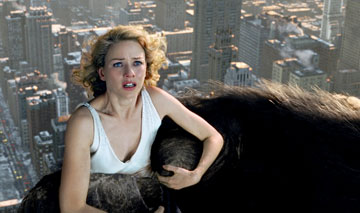
Like having a 40 foot silverback gorilla in the room but not saying a word about the primate smell, the first comments one must make for purely the sake of obviousness about Peter Jackson's King Kong is that it's 3 freakin' hours long. Usually Cinecultist gets cranky at anything that's billed as action adventure and over 90 minutes but one gets the feeling that Petey J couldn't find a solitary shot from the proceedings to cut. But the spectacle which is packed into his 187 minutes is so spectacular and yet so human and moving, we can hardly chastise him for our sore butt. It's all too too much. Yet it's difficult to get upset when the excess offers so much art.
In case you've missed all the internerd hubbub about this production, the 1933 version of KK is the reason Jackson first wanted to become a filmmaker and he's always wanted to remake it. It's his Ur-text. After the success of his Rings trilogy, it seems the studio was willing to write Jackson practically a blank check and he's taken full advantage. There's barely a scene that's not CGI'd or lavish set pieced within an inch of it's life. However, this film is not purely about surface effect. It's also about love. Love between an out-of-work, blonde vaudeville hoofer and a giant petulant monkey.
Naomi Watts does some really nice, though also completely over the top work here as Ann Darrow. She's fragile, yet strong. Timid but also brave. She's a girl who prides herself on being funny, not necessarily pretty though she's totally gorgeous. These are the kind of women we don't often see in the movies, or at least not enough of them. Ann's vaudeville theater has just been closed but fortunately for her, the hack filmmaker Carl Denham (Jack Black) is in need of a leading lady for his flagging film project. Denham convinces Ann, as well as the the cast and crew of his film, including a kidnapped screenwriter Jack Driscoll (Adrien Brody), to set sail in a dirty scow for the uncharted Skull Island. On this island the natives are particularly scary and everything is giant, not the least of them this monkey, Kong whose faces are acted by the brilliant Andy Serkis (Gollum from LOTR).
While the film has the usual sparky comic flirtation between the geeky writer Jack and lovely Ann, the really compelling romance here is between Ann and Kong. These are the moments where Watts really has the opportunity to shine. If you caught her earlier this year in the tiny indie Ellie Parker as the titular actress, you know Watts can turn on and off her emotive face like a switch. This talent makes her perfect for a green screen movie like King Kong. Her tentative friendship and then empathy for the monkey is palpable. When the rescue party of sailors and crew "save" her on Skull Island, it's as though we're seeing a teenage girl bodily separated from her rebel boyfriend with the noisy motorcycle. She knows she should go with dad but she really loves Johnny and his bad, bad ways.
The final act follows the time-worn plot points and as Kong tears into the Manhattan skyline, then climbing to the top of the Empire State like we know and love, it's difficult to know really who to root for. But whether your sympathies lie with the monkey or the bomber pilots, there's something very now about the touch of glee from watching a little destruction tempered with some tears. In mining this old cinema story, Jackson has uncovered something utterly modern.

Sometimes Cinecultist thinks the reason we live in New York City is because we're a sucker -- a sucker for Unabashed Romanticism and Believing In The Dream. (It might maybe perhaps be because of all the movies we consume.) At times, we'd like to think that the music coming from our iPod is actually the soundtrack to our life and every emotional up or down a plot point towards our big beautiful happy ending. Chris Columbus' adaptation of the musical Rent preys on suckers like CC. We are its bread and butter.
In the media blitz leading up the release of this movie, CC's most cynical side lashed out against its treacle-filled sunshine. We honed our Rent joke -- as in, if we wanted to see dirt poor 20 somethings break into song in East Village walk ups, we'd not pay $10.75 for it. Or some such snide remark. But just as we wanted to do our best sneer every time the cast performed on the Today show or we saw the huge billboard at Astor Place, CC couldn't help but also be intrigued. How bad would it be? Last night, we went to the Union Square theater to find out.
With pretty good performances and darn catchy tunes, it's not an unpleasant 2 and a half hours spent at the movies, especially if you're a movie musicals person. However, like when CC saw Baz Luhrman's production of La Boheme a few years ago, this LB story brings up a bunch of issues. It seems to get most hairy during the "Viva La Vie Bohemia" song in the Life Cafe. The gang is all there; they've pushed a bunch of tables together and are now singing at the table adjacent which holds Benny and his investor friends about how great their bohemian life is.
Like that Billy Joel song, it's a mad dash to list all the things that are great about being young, poor and artistic in the late ‘80s like the Village Voice and masturbation. But all of this unabashed, wide-eyed belting of song and loving of life seems so incredibly unhip and dated. Not to mention the pervasiveness of AIDS and the need to act up, that feels so removed from urban life today. Do the young people LOVE like this anymore? Is life ever filled with such intense drama? Does the fact that we doubt this living for a dream make us even more bourgeois than the fact that we can afford the rent, eat three meals a day and even afford decadent digital cable service?
In the end, all of this second guessing and evaluation really cuts into one's enjoyment of the stirring pop rock songs and how short Rosario Dawson's skirts are. But if you're a real Chris Columbus kinda believer, maybe you won't be hampered by it. You'll be able to walk out of the theater thinking (and humming) that there is no day but today and really mean it.
After a movie binge day like the Cinecultist had on Sunday, it's tempting to look for patterns in the plots of the movies we watched. This may sound silly to you but with a double feature at the theaters of North Country and Good Night, and Good Luck, then Erin Brockovich on tv it's not hard to see the connection. As Julia Roberts playing Erin says in her movie, "it's like David versus what's his name." Underdog movies are popular fare with audiences and Academy Award voters alike and while it does throw into relief how much energy CC spends either working, eating, sleeping or sitting on our ass and not out there saving the world, they're still fun. It's the "wahoo, you get'em girl!" factor. Or "David Strathairn" factor as the case may be.
Regarding our journey into the North Country: that Charlize, she can really act. We never quite got around to seeing Monster but obviously we heard the buzz and now we can see of what she's capable. Similar to Brockovich with it's bad hairdos and single mom trying to make good theme, North Country will leave you quite freklemt as Minnesota miner Josey wages the first class-action suit against her bosses. Her kids are just so darn cute and the injustice leveled against her throughout her life, not just at this one job, can't help but break your heart. It might be tempting to feel a bit cynical about such an obvious ploy for your sympathies but Niki Caro's direction (the director of Whale Rider) is so assured there's no denying it.
Watching Good Night, and Good Luck, CC ended up in the very first row on the far left side and thus had that unfortunate neck crick viewing experience. The (back) pain we go threw for our love of le cinema! Good Night is a lovely looking movie, all tender blacks and greys. The Cloon looks mighty good in this palate as does the ever lovely David Strathairn and their performances, as well as the rest of the cast, is great. The only thing, and we hate to mention it, as the story of journalist Ed Murrow against Senator McCarthy is such an important one in our American history, but the movie is a touch boring. Shh, don't tell anyone we said so, but it's a bit like taking our vitamins. We know it's good for us, but the pacing, the spareness of the human subplots, the insistence on oh-so-arty b&w stock all feels a touch abstemious. Where's the wahoo moment? Where's the Erin Brockovich, kicking big energy's ass in the boardroom, making the suckers flinch moment? Good Night doesn't have this. It ends with a whimper rather than a hooray.
Not that this should detract from the rest of it's very solid filmmaking, but we like our underdog movies to have that triumphant end note. Then we can march out of the theater, with fire in our belly and a clear sense that the drivel we've been wasting our brain power on is so much fluff.
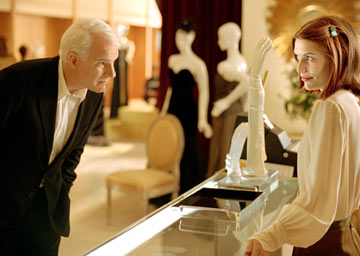
Cinecultist read Steve Martin's novella Shopgirl when it came out a few years ago but when we sat down for an advance screening of the film last week, CC couldn't quite recall our impression of it. Guess we didn't like it all that much. However, once the film got going it all came rushing back -- the limitations of the book are also the movie's. Condescension thinly masked by supposed quirkiness does not make CC feel romantic, it just makes us depressed.
Claire Danes plays Mirabelle, a glove salesgirl at the tony Beverly Hills Saks Fifth Avenue store. A transplant to Los Angeles from Vermont, Mirabelle still has that innocent glow about her, unsullied by the jaded, over-plasticized, overly made-up metropolis. She drives a pick up truck. She does little drawings which occasionally she sells in a gallery. Then she meets two men, Jeremy (Jason Schwartman) an amplifier salesman turned rock roadie and Ray (Martin), an older tech millionaire who buys gloves at her counter only to mail them to her apartment in a bid for her affections.
This is the kind of story that men write when they don't really understand women. Hello? Interior life? Can we have some for our characters here? Sheesh. There's only so far simplistic "quirk" can get you in terms of story arc and identification. Also, these two suitors are so utterly mediocre CC found it difficult to understand why we should hope anyone would pick them let alone this milquetoast who is supposed to be our heroine. Nothing gets the Cinecultist's feminist hackles up like a romance story that says all a woman is waiting for is for a guy to come along and choose her. Grrrr. Both Danes and Martin are pretty lifeless on screen, though we've liked, nay loved, them in past work. ("My So-Called Life" and L.A. Story double feature anyone?) Schwartzman has his moments of bemusing charm but his OCD franticness and extreme chest hair is just this side of off-putting.
We hate to be the bearers of bad news like this but please, avoid Shopgirl. It's more than just bad. It's on a whole new plane of painful.
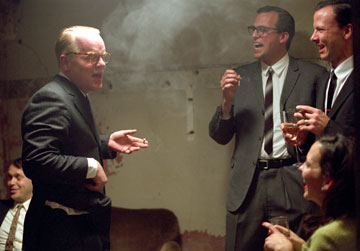
There's certain indie actors out there who invoke an instant "Lord, I LOVE them" response from nearly every discerning movie goer you encounter. Philip Seymour Hoffman is surely one of them. Heck, so are Catherine Keener and Chris Cooper. Luckily for their fans like Cinecultist, all three are in a simply wonderful movie in theaters now, Capote directed by Bennett Miller.
Hoffman plays the titlar New Yorker writer while he is researching and writing his classic non-fiction novel In Cold Blood. His friend Nell Harper Lee (Keener) travels with him to Kansas shortly after a family is murdered in their home mysteriously one night and the quieter Nell helps the sophisticate Truman get in to their small society. The twist (you know, if this were just a film and not actually "real" life) occurs when Truman's efforts to befriend one of the killers, Perry so as to get his story spirals out of Truman's control.
For a small budgeted film, Miller and co judiciously create their late '50 milieu like real pros. Why construct an elaborate Manhattan street scene with period cars and loads of extras when a meditative shot of the Brooklyn Bridge with just less light shining from the city works just as well? The filmmakers understand that a better use of time is to cut from those timeless but simple establishing shots to interior party scenes with Truman holding court as the ultimate wit. Here is the man utterly in his element and Hoffman just shines in these bits, though he is perfectly delightful through out. It's so lovely to see movies with flawed characters like Truman, not a perfect person but sometimes brilliant and sometimes weak or completely self-centered.
Real filmmaking like this should be rewarded with your $10.75. Don't miss it, CC expects (or at least sincerely hopes for) big things for Mr. Hoffman come Oscar time.
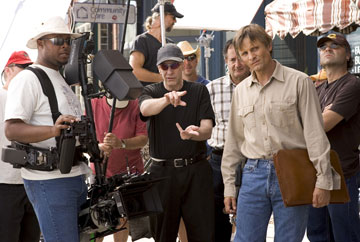
In case you were keeping track, Cinecultist is a good observant Jew -- even when it means using a precious vacation day so that we can attend Rosh Hashanah services. Going to High Holiday services is like visiting the dentist (which is next week actually) or voting, it's good for you. However, once the services at NYU's Kimmel Center concluded it was still only 12:30 pm. Thus we assured our Joshie that it was perfectly kosher to observe the rest of the Jewish new year's day with lunch and a movie.
After twin cheeseburgers at Chat n' Chew, we scurried over to 19th Street for a screening of A History of Violence, David Cronenberg's much lauded new feature. During lunch, CC mentioned that if ever we had the opportunity to meet the Canadian director our first question would be something along the lines of, "Mr. Cronenberg, how come you're so fucked up and awesome?" Dead Ringers and those gynecological instruments, not to mention Videodrome with Debbie Harry and video cassettes that eat you? Come on! So needless to say, we had high expectations for the flick.
It's certainly an intriguing film, though we're still not sure we loved it to death. A modern day Western, it plays with the tropes of the gun totting genre as two bad men come to town and the simple family man takes them down while protecting his way of life. There's also a bit of play with the gangster genre as William Hurt plays the oddest, most vaguely WASPy mafia kingpin we've ever seen on film. There's a lot of suspense in the picture, that point when CC got up to use the restroom was more because we needed a little break from the tension than that we were so desperate to pee. Viggo's great in this as the family man Tom Stall, as is the always solid Maria Bello who plays his wife, one of those poor actresses who's been poised for breakout status far too long even as she delivers one quality performance after another.
Cronenberg paints his story here with broad strokes and primary colors. He appears to want to spell it out but achieves this without being simplistic or pat. As our friend Ilana pointed out to us the other day, this movie is in a way about the history of violence in movies and thinking about it now, we can see Cronenberg touched on all the classic permutations in his plot. The bully, the sheriff, the noble man, the ass-kicking wife are all present and accounted for. Our only problem with the film may be the inconclusive ending. With so many emotions stirred up in this small town family, how can they possibly go back to their idyllic past life? Like any good story, that final scene at the dinner table made it impossible for CC to imagine what could come next for the Stalls but still desperately wanting to know nonetheless.
Cinecultist is still in Seattle, drinking lots of coffee and pondering why "rockabilly" is still a viable fashion option for those in the Northwest but in our absence we bring you the following guest review. We sent our friend Lisa to an advance screening of Jodie Foster's new action-thriller Flightplan last Wednesday and following is her dispatch from the trenches of poor screenwriting and crazy-town, Mommy-ified Jodie.
When the CC offered me free tickets to Jodie Foster’s new flick, Flightplan, I was all over it like a monkey on a banana-flavored burrito. Never mind that I hate tense, psychologically scary movies. Never mind that after I saw Signs I made my friend check my car for aliens, or that after I saw Seven I made another friend check my apartment for Kevin Spacey. “Bring on the free Foster,” I told CC. And she brung it.
But after I saw Flightplan, I didn’t need to have a friend check for anything, and this weirdly disappointed me. I went to the movie expecting to have the bejeebers scared out of me, and yet I left the theater with all my bejeebers securely in place.
Flightplan starts out on a promising note. We see Jodie’s character, an American engineer, sitting in a German subway station looking quite forlorn. And as the trains whoosh by with surprising intensity, you feel you’re in for a good film – if the subway cars can be this disturbing, you think to yourself, wait ’till we get the airplane. That’ll be slammin’.
It isn’t.
Jodie boards the ridiculously enormous airplane – which she helped design – with her daughter, who looks like an eerie robot clone version of that girl from One Fine Day. Jodie already knows she’s not in for a good flight, since she and her daughter are flying to America with the body of her recently-dead husband in a casket below deck, and that’s some heavy stuff. Even a jovial Peter Sarsgaard sitting just a few rows back can’t cheer her up. So she falls asleep. But when she wakes up . . .
Her daughter is missing! And no one can find her! Or her belongings! Or her boarding pass! And actually, wait a second, there’s no record of her ever being on the plane! And, hold up now, the morgue says she’s dead!!!!!!!
This is when Jodie launches into her patented Panic Room butt-kicking Mom routine. It doesn’t matter if the world thinks she’s crazy, dammit, she’s going to find her freakin’ kid. And when the crew tries to call off the search, Jodie goes berserk – turning off the lights, making the oxygen masks come down, even turning off the No Smoking signs. No, I made that last part up. But there are some tense airplane moments.
Unfortunately, this is where the movie starts to take a downward turn. The whole dilemma behind the daughter’s existence and Jodie’s sanity is intriguing, but it can’t support the whole movie. Soon enough the film launches into action-flick mode, and the cheesy dialogue about vaporizing nine-year-olds isn’t far behind. And when that starts happening, nothing can save the flick – not even Jodie Foster’s butt-kicking, or Peter Sarsgaard’s droopy eyelids, or the head stewardess’s Nova Scotia-sized lips. Because not only does the movie get cheesy, it stops making any sort of sense. You know you’re in trouble when after the film, everyone around you is still trying to figure things out. “Now, why did he . . . ?” they’re asking each other on the escalator. “And wouldn’t it have been easier to just . . . ?” All my roommate and I had to say to each other was “Huh?” It’s not that the movie was terrible, but for something that started out with such a fun premise, it definitely disappointed.
Maybe when I got home, I should have had her check under my bed for sucky screenwriters. Now that’s scary.
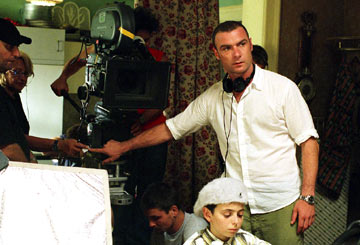
Being a film adaptation junkie is hard on the heart. You fall in love so fast, so hard and then all too often you end up downtrodden and sobbing into your pillow. It's all about the disappointment. Perhaps this sounds too melodramatic for a little innocent movie viewing but Cinecultist has been feeling very emotional since reading and then watching Everything Is Illuminated. We loved the book. We loathed the movie. The tears are falling fast and furious onto the keyboard even as we type.
Perhaps we had unfairly high expectations because of the director, first time behind the camera but long time actor Liev Schreiber. Seeing him on stage earlier this year in Glengarry Glen Ross and everything we've read about him, he seems like such a bright fellow. Plus, he's got this adorable dog that we saw him using to charm the staff of Shakespeare and Co on Broadway a few years ago, so we know he's sensitive as well. Surely, this combination would result in a movie that's truthful and thoughtful about Jonathan Safran Foer's novel?
Unfortunately, this wasn't the case. CC doesn't usually have a problem with the jettison of some of the novel's plot points for the sake of a clean movie narrative. But in Everything Is Illuminated, Schreiber cuts out the entire history and back story of the hero, Jonathan and his family. There's no "why" here and as a result we have no reason to be invested in his search through the Ukraine for his grandfather's shtetl Trachimbrod. Somehow the idea that Jonathan is a collector should be charming but the way that Elijah Wood plays it, all OCD and tidy he merely comes across as creepy and insensitive. Eugene Hutz, the singer from the band Gogol Bordello who plays Jonathan's translator Alex, fares slightly better in terms of making us care for his character but still his depiction lacks depth.
Plus, without giving it entirely away, the grandfather's secret we discover is so 180 from what it is in the novel that it almost makes the rest of the plot incomprehensible. Did Liev think we couldn't handle the harsher realization Foer delivers in his book? Or did some unseen studio exec or producer think it had to be dumbed down for the screen? Le sigh. When will they understand that dumbing down is never, ever the answer? It only makes for a much bigger problem.
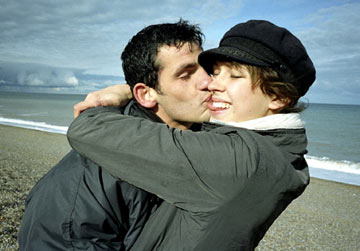
It's a nice thing to have friends to go to the movies with -- except for when it takes nearly 2 weeks of scheduling discussions to get there. But no matter, last week Cinecultist and our friend JP pooled our collective Michael Winterbottom love and took in the director's newest, 9 Songs. Before we even agreed to see the movie together, we joked about the inherent weirdness in going to see a sexually explicit art house movie with a friend and good thing too because Winterbottom puts his camera in places CC didn't know cameras could go. It brings new meaning to the phrase, "extreme close-up."
The film is about a young British guy, Matt who reminisces while in Antarctica about his relationship with an American girl Lisa, flashing back to their nights out at indie rock shows and in bed. Or on the kitchen table. Or in hotel rooms. Or the bathtub. Anyhow, there's lots of sex in this and the aspect that everyone's been talking about is how it's "real." Hipster porn, if you will.
However, like porn 9 Songs is heavy on the action but lighter on the characters or motivation. Apparently all that Matt really recalls is the music and the sex, but none of the talking or the connection. In most romances we at least get to see how the couple met, but here it's a quick cut from interior concert scene to interior bedroom. What was the initial pick-up line? For Winterbottom's story, that detail is mere detritus. Not to seem like a total chick about it, but CC finds it difficult to identify with movies where the characters don't prioritize talking. Of course we're meant to understand that they just feel, but for someone who spends a lot of time in our own head this is tough to buy.
Even in Godard's Contempt, another movie about an insular relationship and the power of sex on screen, we get at least a glimpse of the Brigitte Bardot character's interior life. But in 9 Songs, Lisa is a complete cypher. She's there and then she's gone. It is only at the end that we find out that Matt only stepped foot inside her apartment the day she left London. If this dude can't even get inside her front door, how could he really think he's entered her life?
Cinecultist's complaint about the concert footage in the film, that it never really gets close enough the visceral experience of being at a great show, seems to also be our problem with the characters. The camera captures every physical detail of them, but doesn't actually take us to the heart of things.
Cinecultist participated in the group review of Park Chan Wook 's newest US release Sympathy For Mr. Vengeance today on indieWire with some other Reverse Shot writers.
Of the three films by the Korean director's we've seen thus far, Sympathy is perhaps our favorite. It's gross but also poignant and complex. It has some really wonderful cinematic flourishes, like the use of intertitles to stand in for dialogue from the deaf main character Ryu. While it does not include any good dumpling references (raise your hand if after seeing Oldboy, the next time you ate dumplings you wondered if there was too many scallions in the filling?), there's lots of bits worth rehashing over coffee or drinks after the screening.
Last night on the way home from an evening screening of the Dukes of Hazzard -- we had a long day, okay? We needed to see junk blow up -- Cinecultist got to thinking about what we liked about the original television show. It boils down to these three things:
1) That the Dukes never ever ever used the car doors. For some reason, the climbing in and out of the car windows, while being chased no less, was so incredibly anti-social and fascinating.
2) Sheriff Roscoe's pet basset hound, Flash. He talked to it. It was his best friend.
3) The theme song. Waylon Jennings and good sing-along fun. It was about as close to country music as you'd get in suburban Northern California.
The new movie with Johnny Knoxville, Jessica Simpson, Willie Nelson, Burt Reynolds and our boyfriend, Seann William Scott has all of these things in it, but we don't think we need to put a fine point on it: this movie is not good. It's really, really bad. Boring bad. Despite many scenes of car chases, flaming arrows shot at explosives and various lame sexual puns, we didn't blame those two people in our screening for leaving two-thirds of the way through.
There were a few bits we did like, moderately. Willie Nelson is a surprisingly good actor. He should find a Straight Story type of script directed by someone like David Lynch. The growing sexual disfunction of characters SWS plays. His Luke Duke wants to make love to his car, the General Lee. No seriously, he wants to have sex with the car. So weird, and so awesome at the same time. Johnny Knoxville's white suit and aviator glasses at the end was kinda a hot look for him.
If only there had been a way for the out-takes credit sequence to be the whole movie. You don't realize how much they really beat the living hell out of those orange cars in all of the action sequences and then there's a Willie Nelson version of the theme song over it. A perfect good ol' boy combination.
So after our disparaging but uninformed and off the cuff remark yesterday about how movie goers were going to see a movie about penguins instead of the excellent Murderball, we read on Variety today [sorry, subscription required] that March of the Penguins is after last weekend's box office the "2nd highest grossing documentary of all time." Yeah, OF ALL TIME. We read the sentence twice, just to make sure.
CC didn't entirely understand the reason for this, until we watched the trailer today. Here's what we learned about the movie: 1) Morgan Freeman says penguins are the birds that think they're fish. Weird. Okay, and 2) This movie is about finding love. Penguin love. Awww. That's so cute, right? The little guys in tuxes are in a nature Woody Allen movie, neurotic about their identity and searching for romance but without references to Bartok and riding in taxi cabs. We get it now. We see the appeal.
Here's some sweet penguin pictures courtesy of the production company (Warner Bros. is having a good summer.) Isn't it sad that the cuties are the ones usually in need of a good Freudian shrink? That's what living in Manhattan and watching too many Woody Allen movies has taught us.

Baby penguins! Yay!

They're so cute and furry. You want to take them home and keep them in your pocket. Or spend $10.75 to watch them cavort. Whichever is easier.
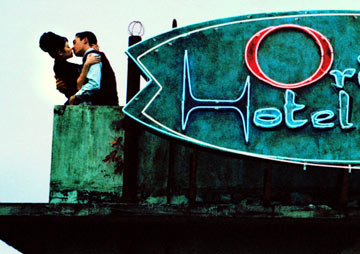
Don't forget that Wong Kar Wai's newest film 2046, a sequel, an extension, a further obsessing over? using some of the characters from In The Mood For Love hits theaters this weekend. In the downtown area, it's playing at our fave nabe theater, the Sunshine. Make your plans accordingly.
Just an idle question: Imagining that Carina Lau, Tony's long time partner, weren't a factor, do you think that Karen Leung Chiu Wai would be easy to get monogrammed onto stationary and towels?

Cinecultist attended the New York premiere last week of Jim Jarmusch's new film, Broken Flowers and despite being a little dazzled by the celebrity/red carpet factor of the event (Sofia Coppola is a tiny, tiny woman), we actually tried to judge the movie on it's own merits. Outside of the fact that we'd chatted with Jim about his air conditioner before an interview conducted at our Day Job, or that we had an invite to the after-party or even that a few of our close friends had even worked on the film's production (apparently, Jim's a good boss). No, as the lights dimmed it was just the Cinecultist and the screen. As it should be, of course.
Bill Murray plays Don Johnston, an aging bachelor whose most recent girlfriend (Julie Delphy) leaves him the same day a mysterious pink envelope arrives informing him that he has a 19 year old son who may or may not be trying to locate him. Don's amateur sleuth and settled family man neighbor (Jeffrey Wright) convinces the melancholy Don to plan an elaborate multiple city trip wherein he visits each of his former flames who could potentially be the mother of his alleged child.
But even with these plot details neatly laid out, it's important to acknowledge that for Jarmusch this "detective" narrative is entirely a MacGuffin. A MacGuffin is a fancy film critic term used usually by Hitchcock scholars to describe the plot lynchpin around which the story revolves but which is actually just a ruse, an seemingly consequential detail that actually isn't, designed to draw the viewer into the action. To have these many girlfriends, to have this pink letter or even the nosy neighbor are all excuses for Jarmusch to put Murray into various poses and locales where he can contemplate him with the camera.
Which is not to say that the performances by each of the actresses who play the girlfriends (Sharon Stone, Frances Conroy, Jessica Lange and Tilda Swinton) are inconsequential or even that the various other supporting players (Alexis Dziena, Chloe Sevigny and Pell James) should be written off completely. Certainly they all evoke nuance within their short scenes and bare sketches of characters, though at times it does devolved into a bit slapsticky in its obviousness. All this fuss is lovely and exists but as the foil to Murray's most Eeyore-meets-Droopy-the-Dog performance yet. He's a man wounded by a life's worth experiences and yet he still retains the ability to naively believe he could connect. If only.
Certainly there are bits of the whole thing which don't make a lot of sense and Jarmusch leaves the ending intentionally vague. Like the obvious and yet disavowed connection between Don Johnston and the mythical Don Juan (Don watches an old movie version of Don Juan. People keep thinking his name is Don Johnson, like the actor, who was a sort of Don Juan.) How could a guy who seems this sad, who reaches out so little actually have this many hot girlfriends? Did these women just throw themselves at him? Regardless though, Murray is so very compelling on screen it seems worth it to revolve such an elaborate game around what he can do. He barely needs to speak, let alone show emotion on his face and yet he communicates so much.
It seems paradoxical that so much could be supported or surrounded by so little and yet Jarmusch carries it off. There's not a lot of there there and yet, it's all there. If that makes any sense. Or maybe like Jim, we'll just leave it at that.
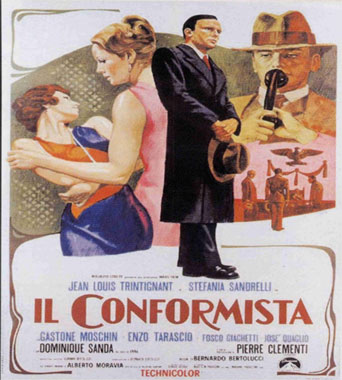
The Cinecultist begs you. If you live in the New York area and can make it down to the Film Forum between now and next Thursday, August 11, please please please go see Bernardo Bertolucci's 1970 movie about fascist Italy, The Conformist. It will remind you all the amazing, gorgeous, stirring, sexy, sad, surreal ways that the movies can be. And it's a great looking print, to boot.
More reading: a Senses of Cinema essay on Bertolucci which discusses Il Conformista.
Hey. How's it going? Happy summer to you. Cinecultist knows you must love the summer months because it really is the season best suited to your brand of high concept, low intelligence quotient filmmaking. In fact, we're writing because we spent our half day Friday afternoon yesterday at the cinema watching your newest, The Island.
You sure do like to make things explode and god love ya for it. When it's hot outside there's something very satisfying about watching pure mayhem, and you really know how to stage that stuff. However, a little constructive criticism from a reluctant but still admiring fan:
1) Anything over the two hour mark is much too long for a summer movie. You sir, are no David Lean. It's just not necessary to have your movies go on that long. Bad Boys II? 147 minutes. Armaggedon is 150 minutes, which is just plain excessive if you ask us. Even that extra 7 minutes on the Island, accounting also for extensive trailers and commercials before the movie begins feels like an extra thirty and just makes our ass tired.
2) We liked the little meta moments (Scarlett Johansson watches herself in that Calvin Klein ad, Ewan McGregor talks to his rogue-ish alter ego who likes fast cars, has a Scottish accent and a raging STD from all of his philandering) but felt you could've sustained them further. Such a simplistic ending in a movie about cloning (cloning bad! bad cloning doctor Sean Bean!) seems like a cop out even for you.
3) That much senseless urban mayhem, particularly in the light of recent London terrorist attacks which of course you couldn't have anticipated but is on tour mind nonetheless, seems unnecessarily callous. Particularly that car chase scene with the flying metal and flipping cars was quite brutal, though the hover bike through the office building and the office workers flying each which way was also rough. If you're going to make junk blow up and cars flip end to end one after another, let's not see the horrified look of the passengers just before it happens, 'kay? And then have no follow up afterwards? Not cool. Imagined gore with no consequences, when your plot is about demanding consequences for inhumane organ harvesting from clones, is just too hypocritical.
Granted, we may be reading too much into this sci-fi flight o' fancy of yours but you do have two Criterion discs out. If you ask people to call you an action auteur, you should expect this kind of mail.
Anyhow, thanks for making our ear drums ring yet again. And for the scene where Scarlett tells Ewan to use more tongue when kissing her. Good one. Maybe we didn't need to be able to hear those finer registers anyway. See you next summer!
kisses,
the Cinecultist.
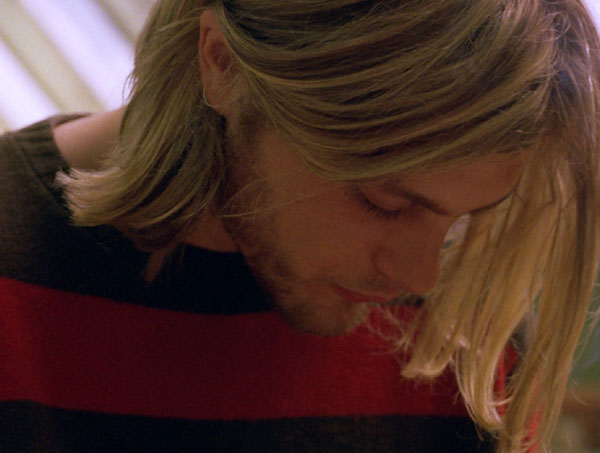
Readers of this space know that the Cinecultist feels strongly about the young actor Michael Pitt (having eaten chicken in the same room with him) and so it was with pleasure that we attended an advance screening of the movie Last Days a few weeks ago.
After the film, we ran into our friend Andrew (aka the Filmbrain) exiting the screening room who wanted to know what CC thought. "I think I liked it," was our confused response. However, the more time we've spent letting the movie percolate, the more we've enjoyed it. It seems strange to think that a move going experience could be felt most outside of the theater, but that's been our reaction to Last Days.
In fact, we'd argue that Gus van Sant imbeds this reaction into this and his previous two films, Gerry and Elephant. Like much of van Sant's work, these three films are about ostensibly "real" moments made fiction. But particularly in these most recent pictures, the ending of the stories (ie. death) is already known by the audience before the film even begins. Going into Last Days, the two things you probably already know is 1) it's sort of about, though not exactly about, Kurt Cobain and that 2) Kurt Cobain killed himself. With death eminent for the characters we're being introduced to, there's a feeling of anxiety for the audience that is strong despite being entirely extra-textual. Unlike a horror film or a weepy drama, no music or lighting or obvious plot points hint at the death to come but still it's very much a part of the viewing experience.
It seems then, that van Sant in his movies is interested in exploring those banal moments prior to death. Not a whole lot "happens" in Last Days, which may contribute to our feeling that the movie is much more enjoyable when we're not actually watching it. Much of the movie is taken up with the camera contemplating Michael Pitt's character, Blake, a musician living in a rambling estate in the Pacific Northwest. The estate rambles and so does Blake, and meanwhile there's a bunch of grungy hangers on in the house who all seem to be looking for Blake but can't really find him. The timeline weaves in and out of this day leading up to Blake's death, sometimes showing us the same scene more than once but from a different angle.
Like in Elephant, the camera is one of the most interesting character's in the film, seeming to stand in for some omniscient, unnamed narrator. The camera always knows where Blake is, even if the grunge kids don't, though at times it'd rather observe Blake from a less advantageous point of view, like outside through a bay window. Harris Savides is van Sant's cinematographer on this project as well as Elephant and Gerry plus he also worked on Birth and Se7en, so his camera work is quite distinctive.
Another pleasure of the movie, though some might call it a distraction, is how much van Sant makes Pitt look like Cobain. He dresses him up in his signature clothes, gives him the greasy locks and has him mumble a lot so we don't hear too much of his voice, and it's an uncanny effect. Plus, Pitt's a pretty good musician surprisingly and his performances have a power that's unexpected. Certainly, it's hard to forget that we've seen so very much of Pitt in the Dreamers but he's an arresting performer with with charisma to spare.
Like the most powerful artists, van Sant is able to show us beauty and grace where we never expected to find it. The death of Kurt Cobain always seemed to us before like a moment to contemplate with sadness, nostalgia and a longing for what could have been. For van Sant it's something else as well, and his ability to propose this interpretation of a watershed cultural moment is something very powerful indeed.
The best part about Charlie and the Chocolate Factory in the last few days has been talking to other people who've also seen it. It's totally a "favorite lines" movie, where there's nearly as much enjoyment to be had in rehashing the best bits as there was watching it the first time. You're like fellow members of a not-so-secret club where the password is "I like grapes!" or mentioning the doll and puppet burn ward.
Director Tim Burton and his marketing team have been very pointed in insisting that Charlie and the Chocolate Factory is not a remake of the 1971 musical Willy Wonka and the Chocolate Factory but rather a new adaptation of the book. But if he had not been able to conjure up his own weird world in classic Burton fashion, it all would've been movie marketing hot air.
Johnny Depp's performance alone is worth the price of admission. His facial expressions are priceless. They almost could be the work of a silent film actor, they communicate so much. If only we could make a flip-book of some of his reactions.

We want to watch this movie about fifteen more times and take people to it who haven't seen it yet, so we can nudge them and whisper, "get ready, this is the best part" throughout. Which is probably really annoying, but CC wouldn't be able to contain ourselves. Charlie is a movie overflowing with goodness that fills us with good will for the whole endeavor of moviemaking.
Elsewhere: Poor Jen Chung, she just wanted to watch her Charlie in peace...
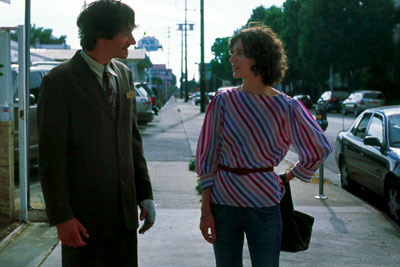
If you've already seen Miranda July's movie, Me and You and Everyone We Know the above headline is the most obvious thing in the world. If you haven't, we'll leave you to puzzle what this online anagram could possibly signify with the hopes that the mystery urges you into the theater all the quicker.
Cinecultist visited the new IFC Center last Wednesday after work (the first Wednesday of it's existence, as programmer John Vanco enthused) with Janelle to take in the flick. We're happy to report that it's all very indie rock, and all in all we like the space though we do have a few minor complaints. As a persnickity New York movie goer, it's essential that we have a few complaints, otherwise one has to give back the membership card.
First though, the film. Miranda July is a performance artists and this is her first feature film but it's clear from the very first sequence that she has a strong vision for her work. The way that she views the world is very singular and yet the insistence on real world details gives the proceedings a humanity that feels genuine. The story is ostensibly about a young woman (played by July) who is a struggling performance artist and who falls for a recently divorced shoe salesman. But each of the individual characters made up of "people in their neighborhood" in a way, seem to be extensions of July's distinctive voice, despite their varying ages, occupations, genders, etc. The other arresting thing about the film is how each character's most private inner life seems to be constantly on the surface of their interactions. On one hand, it's such a relief to know that our psyches aren't so terribly tender as July depicts but at the same time it's seems sort of sad that we can't all experience life with such fresh eyes. It's an unique movie and you really should try to see it if you can.
As for the IFC, CC loves old theaters like the Waverly and we love when they get revived. Also, the scope of their programming intentions (midnight movies, talks from distinguished guests, docus, short films, revivals) is pretty darn exciting. The design-y-ness inside is a little off putting (why semi-transparent windows into the bathroom? why chartreuse lighting?) and despite the usher's reminder that we mind the single stair in the theater's aisle, CC totally tripped on it and stubbed our big toe pretty bad. (Comment from Janelle the Architect: "There's a reason why building code specifies two stairs.") Also, the concept that visitors to the oddly dark inside and a bit pricey bar/restaurant next door will get priority seating during screenings? We'll believe it when we see it.
However, these gripes add up to minor infractions in the face of our general excitement about the space. Yay for more indie movies, right? And with an advisory board like this: Noah Cowan, Alfonso Cuaron, Rick Linklater, Rebecca Miller, Errol Morris, John Sayles, Kevin Smith, Steven Soderbergh, Cynthia Swartz, Dan Talbot and Gary Winick we'll definitely wait for the kinks to be shook out.
Be sure to read Aaron and Lily's extensive interview with Vanco on Gothamist.

In Katsuhito Ishii's world, when your crush leaves on the tram it's as though her train has ridden a whole through your head. Still from Taste of Tea (2004).
OMG, cinecultists. Too much to do, especially at that work place. As you may or may not have noticed, once every three weeks CC disappears for about a week. That's because all our brain can possibly deal with during that period is working, eating and sleeping -- sadly in that order. We should probably post some "don't worry, we're not dead" posts during that time, but even that would take more energy than we've got when the magazine is closing. It's crazy. Maybe next month, we'll look into employing a guest blogger for a few days. If you have any interest in that (self-congratulations and movie rambling), drop us a line.
Anyhow. Excuses, excuses. We have some catching up to do. Where has the Cinecultist been and what have we been watching in the last week or so? Some good things and some crap things, bunnies. Firstly, one of the good things: Katsuhito Ishii's Taste of Tea at Subway Cinema. Wow. Phenomenal. One of the best movies we've watched this year, though of course it's a 2004 film made in Japan which hasn't seen a wide American theatrical release. Hopefully an indie distributor will see fit to rectify this because this is really a movie you should see.
Unlike many of the Japanese flicks getting press these days for their popcorn-eschewing, extreme-sadism-is-fun gross-out factor Taste of Tea's sweet, bizarre sensibility reminded us more of Amelie than anything else. A little magical realism, a few unforgettable eccentrics, and then ordinary people just looking out at their world in unusual ways. One of this film's real gems is Tatsuya Gashuin who plays the weirdo Grandfather in this lovely little suburban family (hypnotist Dad, animator Mom, romantic/nerd Son, pensive Daughter, quiet Uncle). An Ishii regular (in all three of his movies), Gashuin does a musical number, complete with electric keyboard and Mr. Roboto dance moves, in an ode to the mountain which had us hysterical. We haven't laughed like that at the movies since the garden gnome sent postcards from Moscow to Amelie's papa.
Too much plot-ness happens to each of the characters to get into a more detailed sketch of the proceedings here but still the movie also makes time to lapse into contemplative visual moments like the falling cherry or the full moon. There's joke telling but also some sentimentality. Asano is great in this as the Uncle, as we predicted, but our deep love for this movie isn't only about our Asano fandom. It's about this amazing world created in this movie that when the credits rolled after nearly 2 and a half hours we still didn't want to leave.
Our only complaint? No A/C in Anthology Film Archives on Sunday night made for a very sticky Cinecultist. There were Japanese shrimp chips to be had at the concession stand but with no central air, authentic snacks and goofy pre-movie give aways seem like small potatoes in terms of effort for audience comfort.
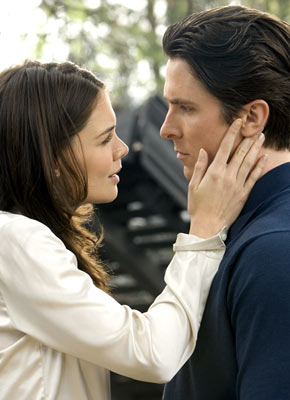 Today, Cinecultist and the Capn' began discussing the plan of attack for our Saturday, aka Movie Binge II: AMC's Revenge. You may have read about our exploits previously on Gothamist, but we're shooting for seven flicks in a row this time, people. Frankly we didn't want to mention it to Matty -- as he's already a little testy that we've seen more than one of the flicks being offered, thus cutting down our scheduling options -- but our ass hurts just thinking about spending 14 hours in the Times Square theater. But, we shall soldier on.
Today, Cinecultist and the Capn' began discussing the plan of attack for our Saturday, aka Movie Binge II: AMC's Revenge. You may have read about our exploits previously on Gothamist, but we're shooting for seven flicks in a row this time, people. Frankly we didn't want to mention it to Matty -- as he's already a little testy that we've seen more than one of the flicks being offered, thus cutting down our scheduling options -- but our ass hurts just thinking about spending 14 hours in the Times Square theater. But, we shall soldier on.
Bad news though. Batman Begins, a movie CC might like to see as we do try to catch the comic book adaptations, is not playing there. So that means we could be spending 16 hours plus of our weekend at the cinema. Even to us this sounds a tab obsessive. Maybe we should take in some guest reports on Batman Begins viewing experiences, if only to keep from becoming too mole-like from the lack o' sun? So all Cinecultist readers (aka our family and a few loyal friends) please e-mail your impressions of the flick and its various TomKat related hype by Sunday night and we will share the rewards next week. Think of it as guest blogging, sorta. Hope to hear from you!
It really is getting ridiculous how influential these pre-release celebrity stunts are on weekend box office. "Are They/Aren't They A Couple" really whomped the ass of "No Anger Managment" in terms of receipts. Before you know it, the star's romantic and personal lives will become a regular part of the marketing discussion. Or maybe we're just being naive to think that it's not already.
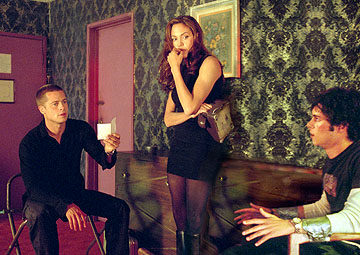 CC did take in the boffo b.o. on Saturday afternoon at our local theater and quite enjoyed it, if you'd like to know. There's a reason why Angelina and Brad are such highly paid and in such high demand as stars, their presence on screen is really quite arresting. It's easy to accept them as images of the ultimate bourgeois fantasy. Their clothes, their flooring, their perfect perfect meals on that long dinner table. It's almost enough to make a boho, Eee Vee livin' Cinecultist ready to give up the illegal sublet for the 'burbs.
CC did take in the boffo b.o. on Saturday afternoon at our local theater and quite enjoyed it, if you'd like to know. There's a reason why Angelina and Brad are such highly paid and in such high demand as stars, their presence on screen is really quite arresting. It's easy to accept them as images of the ultimate bourgeois fantasy. Their clothes, their flooring, their perfect perfect meals on that long dinner table. It's almost enough to make a boho, Eee Vee livin' Cinecultist ready to give up the illegal sublet for the 'burbs.
Doug Liman is having a barrel of fun squewering his stars and their lovely image. Chase scene in a mini-van -- cute concept. Granted, we couldn't quite catch all of the dialogue during this sequence but that could've been from the speakers in our theater or the print, not necessarily the film itself. We also chuckled mightly at Adam Brody in the Fight Club t-shirt (slightly visible in the picture above). If anything, Mr. & Mrs. Smith is the kind of movie that benefits from more po-mo reference, rather than less. It's not a masterwork by any means, but as silly, exploding summer fun, it's not bad.
In a slightly music related note: CC wants to thank the Shout Out Louds for putting on such an amazing show with the Dears on Saturday at Bowery. Everytime we've been talking about it in the last few days, we've been gushing like some kind of music blogger. It's intense. But really, go out and buy the record if for no other reason than when CC was chatting with their keyboardist Bebban after the show, she referenced Barry Lyndon. They play happy-go-lucky pop and they know Stanley Kubrick's 3 hour 18th century period film? Wow.
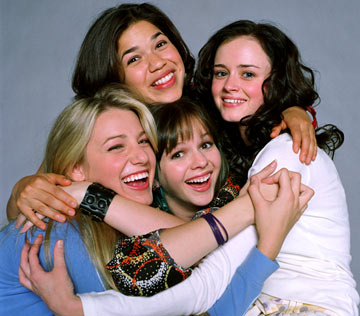 Last week on Thursday, Cinecultist and her friend, who also happens to be a children's book writer, Lisa went to see The Sisterhood of the Traveling Pants. We expected... not much. But as the credits rolled, CC sheepishly wiped away our tears and looked over at Lis. She was also totally bawling. Following, we explain why we're such ninnies for the Pants.
Last week on Thursday, Cinecultist and her friend, who also happens to be a children's book writer, Lisa went to see The Sisterhood of the Traveling Pants. We expected... not much. But as the credits rolled, CC sheepishly wiped away our tears and looked over at Lis. She was also totally bawling. Following, we explain why we're such ninnies for the Pants.
Cinecultist: so, The Sisterhood of The Traveling Pants -- best movie of 2005?
Lisa: hmm. Lemme think ...nothing better comes to mind, actually.
CC: Were you surprised at how much you liked it? I know I was. I expected to be mocking it much more than I have been.
L: Yeah, I really was surprised. I expected it to be a much more teen-angsty kind of movie. With cheesy slapstick falls every five minutes. But it really wasn't like that.
CC: I think I expected it be more of a reprise of Now and Then, that horrible movie with the kid versions of Rosie O’Donnell, Demi Moore, etc. There's something about that shot in the gazebo that's in the preview that makes this movie look so incredibly trite. I know that's a lot of burden to put on one shot but when you're scrutinizing the previews, this is the kind of thing one tends to go on.
L: Sadly I never got to see Now and Then. I think I tried to several times, but my VCR was allergic to the video I rented. Now I thank that VCR. But I think I know what you're saying. But I think what was really remarkable about this film was that it didn't just cater to what teens will pay to see, it also tried to accurately depict their world (as much as one can, in a teen movie, I mean). Maybe I’m giving the pants too much credit, but honestly I think it's the most *realistic* teen movie I’ve seen in a long time. In terms of emotions and relationships, I mean, not the part with the magical pants.
CC: Yes, magical pants are totally far fetched. But I guess I like the way that the movie is inherently about teenage body issues without completely hitting you over the head (be happy with your body as it is, dammit!), but also really about the struggles of young girls coming of age. Friendship, divorced parents, family commitments, the difficulties of becoming a sexual being, etc. The book also has this interesting plot element where each of the girls falls into a funk of sorts, a spell of depression which while not completely debilitating (except maybe border-line in Bridget's case) is very real. You don't often see that depicted in movies -- that teen girls can be moody. I remember thinking when I was 13 that the best movie dialogue was from Heathers: "if you were happy all the time, you'd be a game show hostess." I found that idea so hilarious and empowering.
L: Interesting what you're saying about body issues. I didn't see that so much as a theme while I was watching the movie, because I don't think it plays so much throughout -- but I definitely like that idea. After I saw the movie, I was trying to think about what, exactly, the Pants' "powers" were supposed to be. It seemed not entirely consistent through each storyline. I’m not sure it needs to be, but I was just thinking ... so (Dr. Lisa asks), what do the Pants mean to you?? And yes, I definitely agree about showing girls being unhappy but not suicidal or drugged up. Just having teen girl problems. Sometimes it sucks being a teen girl, but most of us get over it okay. I thought this movie showed that well.
CC: I suppose in terms of the Powers of the Pants that they can make you more than you think you can be alone. They're the support of girl friendships; to make you more powerful, braver, more sure of yourself than you could be on your own.
L: I like that. Yes. I saw them as kind of a kick in the butt, if you will -- showing each girl what she needed to do, even when she really didn't want to go that route. I think that fits in with your idea, too, in a way, that friends can be your support in making those difficult decisions. (Now I’m getting a little cheesy, though...)
CC: I know. This movie inspires you to be so darn earnest. It’s scary.
L: Okay, a question: Do you think the movie (or the book, for that matter) could have worked without the magical element? Would it have been as good if they took the pants out of the pants movie?
CC: I think it's the vaguely cheesy catalyst for the plot. It seems to be essential to me.
L: Yeah, I think somehow the Pants really need to be there, even though I can't quite put my finger on why. It’s odd that it's the one magical element of the whole story, though, isn't it? I mean, it didn't bother me while I was watching at all, but afterwards it did start to bug me that everything else is based in reality when that's so off-the-wall fantastical.
CC: Well, that's the children's book writer in you. Either it all has to make no sense or complete sense. As though you were workshopping it or something.
L: I know. That’s annoying, huh? Okay, I’ll stop doing that...
CC: No, it's interesting. I’m just saying I accepted it easier than you did, because my brain isn't tuned into that element.
L: How do you think the Pants compare to other kiddy lit books of that genre? The first series that comes to mind is Babysitter's Club. A little bit younger target audience, but it still has the whole "four very different girls as friends" aspect. How would you compare this to BSC?
CC: I loved BSC when I was a kid, but I wouldn't say that it made me cry. Though I will say after spending all Friday night reading the book (like a big fat loser with no friends!) it wasn't as moving and emotionally affecting as the movie. I really think those four actors really brought something special to the proceedings.
L: Yes, I’ll agree with that. The blond girl? What’s her name? I loved her. I felt for her.
CC: Blake Lively. From an acting family apparently, but I read that this is her first film role. She knocked it out of the park.
L: (Although, I personally DID get choked up reading a BSC book once. Claudia And The Sad Goodbye. Man! Mimi was the best!)
CC: But I really liked all the girls: Amber Tamblyn, America Ferrer and Alexis Bledel. I predict big things for all of them.
L: Yes, she really was amazing. And when America Ferrera tells off West Wing dad? Wow, that got to me. I started to wonder at that point if I deep-seeded father-daughter issues. I have to say, of all four stories, I wasn't as into the Amber Tamblyn one. But we already discussed that the little blond girl bothered me. Maybe that's the thing -- I identified with the other three stories very strongly, but had trouble latching onto the one about the little cancer girl.
CC: I suppose if you had to point to a slightly less interesting story it would be hers. Though kids dying of cancer are always a gut-wrencher for me. I didn't identify so much as found it affecting.
L: Ooh, I’m just realizing ... death, love, sex, and family. Four story lines, four gigantical issues of growing up. This Ann Brashares woman is a genius! I can't believe it took me so long. And I call myself a writer.
CC: I don't know if I’d say she's an expert prose stylist but she does know structure.
L: Do you think it worked as an adaptation? You said you liked the movie better, right?
CC: Yes, I did like the movie better. The book isn't bad. As I mentioned to you, they changed some major in elements in the Lena story (Alexis Bledel in Greece) but I think that was for the sake of shooting all of those great Roman Holiday on Santorini sequences. It is my humble opinion that all movies benefit from cute boys riding around on Vespas.
L: Totally!
CC: I guess even though I spent all of that time reading the book, I’m thinking less about it being an adaptation than a movie based on a book. I can see how in Lemony Snicket you became obsessed with how the book was portrayed on screen but I didn't find the characters in the book got so under my skin that I was that protective of them.
L: By the way, I just IMDB'ed Blake Lively and it turns out she's been lying to us all. The Pants was not her first movie -- in 1998 she played Trixie/ Tooth Fairy in Sandman, which sounds like the best movie EVER. The plot summary ends with this line: “In the end, both Knapp and the children learn valuable lessons about doing the right thing and the necessity for kids to go to sleep.” And there's a character named "Marigold Pixietwiddle."
CC: Sweet! I know what we're renting next weekend! Any final thoughts on the Pants?
L: I guess I’d just say it was a very surprising look at teenage girl-ism, and it manages to be emotional without being TOO super cheesy. In conclusion, Lisa hearts The Pants.
CC: Cinecultist does too. It’s our official first favorite guilty pleasure for the summer. We’re hoping Mr. and Mrs. Smith and $2 Brooklyn Lagers at the Havana Outpost round out the rest of the list.
L: Thanks for a most thought-provoking discussion on The Pants! (Go pants go!)
Watching movies about "real life," whether they are documentaries or fiction films based on real people, usually makes film viewers wonder where does the story end and the "realness" begin? But actually, what CC always thinks when watching docus is, "how did they think to put the camera there?" This question is particularly pressing in the two "dogtown" movies, Lords of Dogtown (the fiction film out in theaters last weekend) and Dogtown and Z-Boys (the docu from 2001). With skateboard wheel p.o.v.s, mid-air freeze frames from above swimming pools and archival footage from blacktop playgrounds, it's amazing where Stacy Peralta, Catherine Hardwicke and co though to put their cameras. Almost as amazing as the boarding itself.
Cinecultist watched these two movies in a slightly surprising order -- we saw the fiction film on Saturday afternoon and then with our interest piqued, forced our friend Ilana to go to two West Village video stores on Sunday night after dinner to find a copy of the documentary. With the fiction film fresh in our mind, it was fascinating to see how Peralta (the director of the documentary and the fiction film's screenwriter and a subject in both films) extrapolated moments or phrases into full-blown scenes realized by the actors. Apparently, the goofy character played by Heath Ledger, Skip, the Zephyr surfboard shop impresario was an amalgamation of two figures from the docu, Skip Engblom and Jeff Ho. Neither of them had teeth in the docu footage of the caliber Ledger sports, but their smaller personalities added up into his over the top performance. This is just one example of a detail from the documentary extrapolated from the source but not really distorting the original's intention.
In addition to Ledger and his awesome, ill-fitting chompers, we enjoyed the performances of nearly everyone in the fiction film except save Nikki Reed. Memo to Miss Hardwicke: Nikki can not act. Don't subject us to her again. Thank you for your kind attention. But otherwise, this is a cast comprised of all of the best of the bright young things. These are the kids that you expect to see really make something of their careers. Our new favorite has to be Michael Angarano, who you may recall as the younger version of Patrick Fugit in Almost Famous and as Jack's son on Will and Grace. Here he plays a rich kid who's a skateboard enthusiast and whose backyard becomes the site of the infamous Dogbowl Sessions. Where the other boys hit the growling notes, the tongue stuck out at authority moments and the burgeoning sex object appeals, Angarano brings a tenderness to the mix that mellows the rest of the cast.
In a way, despite the obvious stylistic imprint by Hardwicke, the real author of both films would have to be Peralta. Though neither film sets out to make this explicit, it was his forethought to make more of this thing that he loved as a kid until it became his career, which set the whole deal in motion. There's something a touch narcissistic about perpetuating your own legend as an instigator of cultural change, except that the number of people in the documentary who agree that he's the Man is so overwhelming. While CC would certainly not call ourselves a sports movie aficionado and the thought of watching a bunch of endless footage of the sweetest grind ever leaves us a little dry, there's an exhilaration evident from both of these movies that's palpable. It reminded us that when we were in elementary school, we could ride our bicycle home from school the entire way with no hands. That youthful impulse to drive your body beyond what you think it should do just because you can is why the Z-Boys birthed the X-Games. If you don't understand that impulse, then you don't get what it means to be young.
Pictured via Yahoo! Movies: On the left is skater Tony Alva, on the right is actor Viktor Rasuk, who plays him in Lords of Dogtown.
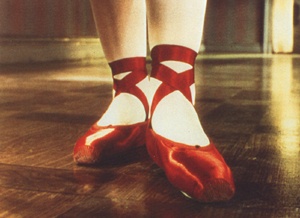
On Saturday, while surfing the internet for upcoming film events to update in our left sidebar, Cinecultist realized that this was one of our last chances to watch one of the Michael Powell movies at the Film Society. The Red Shoes was playing at 2 pm. It was 1:10 pm and we were still in our pajamas with dirty hair. Could we make it? Flying from shower, to fresh clothes, to the street and then the subway, we were a movie-goer with a mission.
Fortunately, the MTA gods approved of our plan and ferried us to the Upper West with five minutes to spare. Whew. Then our luck continued as we ran into fellow film blogger Aaron Out of Focus. Despite internet rumors to the contrary, he lives! And leaves his apartment! Occasionally! We jest, obvs, but impromptu movie partners are the best, don't you agree?
Apparently, the print we were watching wasn't as good as the one used for the transfer by Criterion on their DVD, but as this was CC's first viewing we were mostly caught up in the story and the dancing. Both are very dramatic and strong, full of sincere intensity one doesn't see to much at the movies these days. Everything has to be glib and winky and po-mo, which don't get us wrong, we love but in Powell and Pressburger's universe, it's all about the highs and the lows. Everthing is capitalized. Dreams. Romance. Beauty. Tragedy. Good stuff for sure. Our favorite dancing movie is still An American In Paris because we're loyal to the Gene Kelly to the end, but surely The Red Shoes will be added to the personal cannon. That's the list of movies that when someone we know mentions they haven't ever seen it, we exclaim in mock horror, "You've never seen [insert film title]? You have to! It's essential viewing! Do you want to stop by the video store right now? 'Cause we totally could."
Update on our search for a screening of Cafe Lumiere, the Ozu tribute by Hou Hsiao Hsien which stars Tadanobu Asano: we forgot that it's playing at BAM this weekend as a part of their Village Voice: Best of 20004 series this month. Saturday, June 4 at 6:50 pm and 9:15 pm. Be there or be sorry.
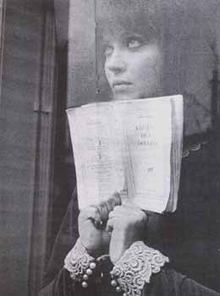 Silly Godard. Silly, lovely Jean-Luc. You're so brilliant and such a prankster. But really what more can Cinecultist possibly add to the general cannon surrounding this bastion of the New Wave? All we can report is that on Tuesday night, we saw Alphaville at Anthology Film Archives.
Silly Godard. Silly, lovely Jean-Luc. You're so brilliant and such a prankster. But really what more can Cinecultist possibly add to the general cannon surrounding this bastion of the New Wave? All we can report is that on Tuesday night, we saw Alphaville at Anthology Film Archives.
So. Anna Karina looked amazing in her short coat trimmed in fur. The soundtrack of noir-ish themes was jarring and delightful. Anthology's theater seats are still nearly as uncomfortable as the classrooms in NYU's Cinema Studies department (they don't have those lame folding desks attached, so they at least have that going for them). We went to the film with our friend Adriane and many, many Eee Vee hipster types. Adriane made us sit near the front, as she's wont to do. That's about all, folks.
However, we will point out that the evening was sponsored by Storefront Films, a non-profit film series put on by Storefront Art and Architecture. This movie was a suggested donation of $5 but the odd conversation with the girl checking names at the door on their RSVP list threw the Cinecultist and we didn't give them any money at all. (Adriane's not there yet. Is CC going up to save a seat or wait in the lobby, because it's first come, first serve? Well, actually we're going to use the restroom first if you must know, Odd Girl, but then we'll go up to save the seats.) Anyhoo, bad CC; support the arts, stupid! So we offer this link sheepishly and in lieu. Check out their film next month on Tuesday, June 28 as it'll be Werner Herzog's Lessons of Darkness.
Here it is, the half-day Friday before a long holiday weekend and Cinecultist can feel ourselves stretching our wings like a long dormant moth. One of those pretty moths, not the ugly, super furry ones but a moth nonetheless, because while we appreciate our freedom, what we really want is to be back in the dark (at the cinema, of course). Sure enough, post our 1 pm Day Job let out today CC slipped on the flip flops, donned the sunglasses, popped into Jamba Juice for a 16 oz smoothie and then thought about what movie we were going to see this afternoon.
Now, last weekend CC (like most other suckers born or living during the late '70s) had gone to see Star Wars: Revenge of the Sith but we couldn't really bring ourselves to post something about it before now. In fact, we even had difficulty talking about it amongst our friends who wanted to know what we thought of George's supposed final chapter. Generally, we liked it but we didn't love it and we really couldn't figure out why. Sure, it's better than the other two prequels but is that really a reason to recommend a movie? It could suck at the level of one of those fancy schmancy Dyson vacuum cleaners but instead it just sucks like my Mom's 25 year old upright Maytag? Is this a real review?
 Then today, CC went to see The Hitchiker's Guide to the Galaxy and suddenly our opinion on SW: part trois was made clear. Hitchhiker's is a sci-fi movie that knows how to have fun. Star Wars used to be fun. Remember when it was just a screwball comedy with cinnamon bun hairdos and over-grown laser pointers? It didn't take itself so seriously, and it certainly didn't expect its audience to think it was the most profound thing since Goethe. But somewhere along the way, perhaps after the zillionth interview with Joseph Campbell about the leitmotifs, Lucas lost his sense of humor. The only laughing in our theater happened when Nathalie asked Hayden hold her like by the lake on Naboo. This most recent installment has plenty of explosions and an army of Wookies which would ordinarily give CC much pleasure, but there's no sense of fun in the proceedings. George, where did the "yahoo!" go?
Then today, CC went to see The Hitchiker's Guide to the Galaxy and suddenly our opinion on SW: part trois was made clear. Hitchhiker's is a sci-fi movie that knows how to have fun. Star Wars used to be fun. Remember when it was just a screwball comedy with cinnamon bun hairdos and over-grown laser pointers? It didn't take itself so seriously, and it certainly didn't expect its audience to think it was the most profound thing since Goethe. But somewhere along the way, perhaps after the zillionth interview with Joseph Campbell about the leitmotifs, Lucas lost his sense of humor. The only laughing in our theater happened when Nathalie asked Hayden hold her like by the lake on Naboo. This most recent installment has plenty of explosions and an army of Wookies which would ordinarily give CC much pleasure, but there's no sense of fun in the proceedings. George, where did the "yahoo!" go?
Hitchhiker's by contrast is silly and real and fanciful and wry and has tiny talking mice seeking world domination. Unlike our Seattle Maggie, who's a long time fan of the book and saw it before its release, CC didn't really know anything going into the movie but sitting there in the theater, we couldn't have been more contented. The film's also filled with charming performances, particularly from four of the most likable yet grossly underrated actors working today (ie. Martin Freeman, Zooey Deschanel, Mos Def and Sam Rockwell), though we also loved Alan Rickman's voice of the depressed robot, Marvin (pictured). Here's a movie that exists in a "real" place, one that despite its gadgets and intergalactic space travel, seems rooted in humanity. Cinecultist is all for geeking out, but the way that Lucas has come to express it, there's no room for something plausible. It's too refracted.
Perhaps the most telling moment for us was when the film cut away to Ewan McGregor walking down a hallway and we thought "crap! That's a real hallway set that they're walking inside! Weird." If your movie world is so removed that even an actual hallway looks out of place, there's something seriously wrong with your cinematic technique.
Sitting in the Cinema Village East on Monday evening eating birthday desert number two (banana pudding) with two friends up for some last minute birthday hanging (Matty and Jori), Cinecultist got to thinking about children's movies. Those live action family friendly tales, some featuring Don Knotts, that occupied our not-so-state-of-the-art VCR while growing up. The trigger to this nostaligic musing? A pretty sweet trailer for the movie version of a tv show we lurved as a kid, Dukes of Hazzard (is it just us or is the casting of Sean William Scott and Johnny Knoxville kinda inspired?), and then the travesty that was the Will Ferrell version of Bad News Bears with soccer, Kicking and Screaming.
Really, we can't stress how god-awful this film was. It's the sort of movie going experience that causes CC to loose faith in the whole thing. Shoddy editing (Hello? 180 degree rule? Continuity? Heard of them?), a soundtrack straight out of 2001, a inexplicable sub-plot about coffee addiction and a script that makes the brilliant Will look like a piece of dead wood on screen; this thing as a trainwreck. The saddest part is that it felt like a terrible kids feature that would be foisted on an unsuspecting babysitting Cinecultist. You think you're sitting the children down for 90 minutes of harmless, perhaps fun distraction but instead you just want to claw your eyes out from the pain.
At this point it would be oh so easy to lapse into some nearing-30-god-my-childhood-entertainment-was-so-choice ruminating but we'll spare you. You've see the Brady Bunch movie and the Starsky and Hutch movie and the trailer for Herbie Fully Loaded, you know what this looks like. Instead we'll just sign off with a worry for the future cultural well-being of the little children. Don't do this to the kids, Will Ferrell and producers et al! Think of them and their fragile little personalities forever warped by Kicking and Screaming being in the world! It's worthy of a telethon or something.
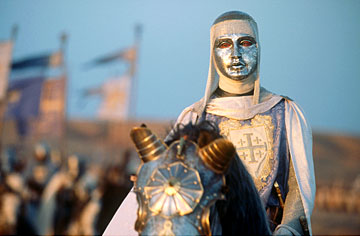 Cinecultist is just a captive audience for certain new releases. Romantic comedies, no matter how abysmal looking. Crap starring Jennifer Lopez. Sci-fi and historical epics. We're like a disappointed lover listening for the key in the door; we wait for that particular magical experience to be repeated though, lord knows we expect it not to really be the same.
Cinecultist is just a captive audience for certain new releases. Romantic comedies, no matter how abysmal looking. Crap starring Jennifer Lopez. Sci-fi and historical epics. We're like a disappointed lover listening for the key in the door; we wait for that particular magical experience to be repeated though, lord knows we expect it not to really be the same.
In all of the pre-release speculation on Ridley Scott's newest, Kingdom of Heaven a bunch of box office stinkers of various degree were trotted out as examples of the filmmaker's folly: Troy, Alexander, King Arthur. Everytime we read about these, CC'd look around, shifty-eyed and guilty-like. We saw all three of those in the theater the weekend they came out. CGI some castles or forts, throws some fiberglass shields on that mass of extras you've got in the deserts of Lodi, Cinecultist is totally there in the plush seat.
Frankly, we're still working out what compels us so. It might have something to do with Queen Margot. For some reason, it might also have something to do with David Lynch's Dune. Anyhoo! That's the long way of saying we watched Orlando Bloom make a mad dash for leading man status this weekend. He's a fast runner that Bloom and he can haul the broad sword above his head in a realistic fashion, but we're not sure if he's got the stuff that made Russell Crowe an action star AND a serious actor all in one fell swoop. Especially when he's sharing the screen with such fascinating beasts as Liam Neeson and Jeremy Irons or even just the voice of Edward Norton (who plays the disfigured King pictured above).
So between Ed in the silver mask, some nicely choreographed battles, a sprinkling of camels (we rode one once! they spit and make funny noises!) and Eva Green with her bewitching kohl eyes, it took the full 2 hour plus running time in addition to the time it took to hit the street before we realized we couldn't really follow the plot. Crusaders, filial duty, Christian guilt, respect for the exoticized Muslims -- we don't know. There was a story in there somewhere but it was difficult to follow despite its event laden timeline. Now, it's but a smush of sensory overload in our brain, not nearly the thought-provoking engagement with Middle East relations promised by the pre-release think pieces.
Somehow, it seems more honest to market a Troy or King Arthur as randy historical reinterpretation or Mike Bay rambunctious po-mo fun rather than this political discourse with boiling oil scenes junk. As a critic, we guess we like to draw meaning from the meaningless instead of the schlockmeisters promising that there will be something intriguing inside of the summer action blockbuster. That may seem ass-backwards but we don't want the work done too much for us.
 Cinecultist thought they had rules about re-using the same title for more than one film? Maybe there's a James Spader loop hole we're just not aware of... [Oddly, if you google "crash movie" the 1997 David Cronenberg flick which where people fulfill their sexual desire via car crashes is the number one hit.]
Cinecultist thought they had rules about re-using the same title for more than one film? Maybe there's a James Spader loop hole we're just not aware of... [Oddly, if you google "crash movie" the 1997 David Cronenberg flick which where people fulfill their sexual desire via car crashes is the number one hit.]
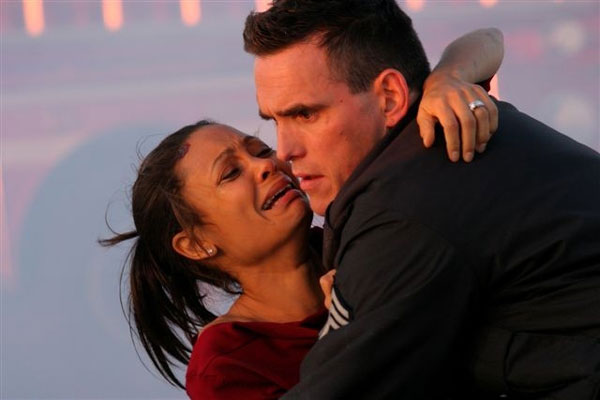
When we saw Crash last week (ie. the picture on the right) courtesy of James and Jen*, Don Cheadle, Larenz Tate, director Paul Haggis and the Reverand Al Sharpton were in attendance (and participated in a post-screening Q&A). Al loves this movie. He's seen it four times. He's a fan.
At Q&As at the Film Society or various film festivals, audience members usually use this a time to make sure the panelists know they are thoughtful, insightful film viewers who can use phrases like "authorial intent" or "motif" in conversation. However, when the film screening is for a humanitarian organization like this one for Crash, questioners make comments about the film being more about power than race, don't you think Mr. Cheadle?
Gawd, people. It's so easy to just hate them sometimes, don't you find?
* Jen has watched quite a few films with the Cinecultist, but apparently she didn't realize we'll cover our eyes for melodrama as well as horror. We don't like anticipating random violence befalling even the most cliched stock character. We're sensitive that way.
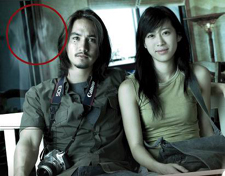 Cinecultist is quite pleased with ourselves -- we actually made it to a screening at the Tribeca Film Festival courtesy of our friend William. Granted, he had to call with free vouchers in hand Friday afternoon and tell us which screening we were going to attend (Friday night, 11:30 pm) but we made it to the Battery Park Regal Cinema none the less. Scheduling triumph! Standing in the springtime drizzle, CC surveyed the scene. Who knew there was an Applebee's, a giant DSW shoe store and this random bagel chain place deep in the Westside? Multiple lines divided by metal temporary fencing snaked around the cineplex segregating the viewers into ticket holders and ticket purchasers. Various staff people directed the flow of traffic, as queues of film fans were let into the theater for their show times. Movie theaters in Manhattan don't go out; they go up and up we went, escalator after escalator.
Cinecultist is quite pleased with ourselves -- we actually made it to a screening at the Tribeca Film Festival courtesy of our friend William. Granted, he had to call with free vouchers in hand Friday afternoon and tell us which screening we were going to attend (Friday night, 11:30 pm) but we made it to the Battery Park Regal Cinema none the less. Scheduling triumph! Standing in the springtime drizzle, CC surveyed the scene. Who knew there was an Applebee's, a giant DSW shoe store and this random bagel chain place deep in the Westside? Multiple lines divided by metal temporary fencing snaked around the cineplex segregating the viewers into ticket holders and ticket purchasers. Various staff people directed the flow of traffic, as queues of film fans were let into the theater for their show times. Movie theaters in Manhattan don't go out; they go up and up we went, escalator after escalator.
Tribeca is a pretty slick affair and the sheer number of films on their roster, from new releases like The Interpreter and 2046 (which we tried to get into the next night and at which the guy at the ticket booth nearly laughed right in our face) to more obscure docus and foreign fare, is pretty overwhelming. Everytime CC visited the website's handy schedule, we felt our eyes glazing over from the volume of possibility. So then ending up at Shutter, a Thai horror film about a photographer who sees ghosts in his snapshots, was a bit out of character for CC. However, there's something to be said for having no choice and/or letting someone else pick the movie for you, because you never know what might unspool on screen.
Like Ringu (or so we've seen from clips only -- we hear it's pretty scary), Shutter's ghost once we see her finally has lanky black hair and the tendency to crawl out of pools of water. The protagonist and his incredibly understanding girlfriend begin exploring the concept of "spirit pictures" after they have a I Know What You Did Last Summer-style car accident on the way home from a wedding. Is the girl they mowed down haunting his graduation snaps? Why would she do that? Why?
And in a slightly different vein, what's up with Asian cinema and revenge plots, particularly from rejected women? Are Asian women scorned actually just scarier, as the directors postulated in broken English during the post film Q&A? Like the girl sitting next to the screening's questioner who turned to ask her "are you?", we'd have like to give the elbow and glare to the directors for saying that but maybe there is this feeling, out there in the ether. Or perhaps it's just jerk-head filmmakers who dicked over their former flames who generally fear some otherworldly retribution. Cinecultist says to those romantic idiots with DV cameras, you're right karma still exists and if you've been an ass, you better start looking over your shoulder. Or under the bed and in that dark room of yours, as the case may be.
BTW: If you attended Tribeca and have some opinions about its organization please pass them along to our buddy Aaron, who has finally surfaced from those 14 plus hour days programming the sucker. Good job dude, we're proud of you! Hope we get the chance to remember what you look like sometime soon!
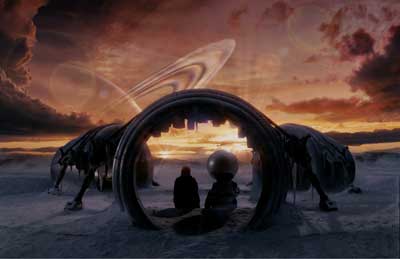
Guess who got our hot little hands on a pass to an advance screening of The Hitchhiker’s Guide to the Galaxy? Seattle Maggie will give you three guesses. We humbly thank The Stranger for the honor even though we had to jump through a few hoops, including completing a Hitchhiker-themed maze and forfeiting two stamps. “We did the maze!” we proclaimed proudly to our neighbors, while standing in the astonishingly long line that wrapped twice around Pacific Place mall. “What maze? My buddy gave me like five of them,” was a typical response. The audience was something of a puzzle, made up of mature Douglas Adams fans, disdainful comic book shop owners, twenty-something hipsters, and a surprisingly large crew of Mos Def admirers.
As for the movie - let’s just get this out of the way. Yes, the film takes liberty with the book. And no, it doesn’t suck. While the general storyline of Arthur Dent’s introduction into the world of interstellar travel and ensuing high jinks remains mostly intact, it has been molded a bit to form a free-standing film. The romantic plot is also played up a good deal more than the book, which may be troubling to hardcore fans. Seattle Maggie admits that it has been more than a few years since we read the book, but we felt as though the movie captured the overall spirit of Douglas Adams’ classic with just the right amount of quirky British humor, sci-fi adventure and ironic elbow jabs at Life, The Universe and Everything. We know we have a tendency to err on the side of saying only nice things about movies, but seriously - this movie was pretty darn awesome.
Director Garth Jennings does an admirable job of creatively providing a visual aspect for some of the more theoretical aspects of the script, especially in scenes concerning the fallout of the Improbability Drive. Somehow, the movie manages to make it work, and even pushes the envelope further than we would have expected. While your head tells you, “There is no way they are going to pull off the interior monologue of a sperm whale”, lo and behold a giant sea mammal appears floating in space on the screen in front of you. We were also pleasantly surprised to find that the movie seemed well managed as far as its special effects. The heavy hand of computer animation was present but not overwhelming; there were enough actors in alien costumes and fun whirring machines to keep us happy. As amateur enthusiasts of animation, we were tickled by the short stop-motion section in which a sock puppet Arthur Dent upchucks colored yarn into a basin, and especially impressed with screen version of the Guide itself. Featuring the soothing voice of Stephen Fry, the Guide was updated for the movie with hilarious bits of IKEA-colored silhouette animation, just the thing to induce a calming state of “Don’t Panic”.
As Arthur Dent, Martin Freeman continues to be our favorite schlubby everyman (only a true British lad can utter the phrase “lovely” without sounding like an interior decorator), while Zooey Deschanel provides a nice mixture of spunkiness and sexy intelligence as Trillian. Mos Def gamely tackles professional hitchhiker Ford Prefect, although we felt that his character seemed a little underused and a bit more of a dandy than we remembered. Alan Rickman’s droning voice as Marvin the Paranoid Android hit the punch line of more than a few jokes with droll finesse. And can we just say, if Johnny Depp can wrassle up a Best Actor Oscar for freakin' Pirates of the Caribbean, we vote hands down that Sam Rockwell gets this year’s dark horse nod for Zaphod Beeblebrox. From the burnished shine of his giant belt buckle to his snakeskin-boot swagger, Rockwell’s intergalactic party-boy president (freakishly similar to another all-too-real cowboy president) is brilliant in its brashness. “I’m the President of the Galaxy, I don’t have time to read,” he slurs winningly, pitched somewhere between a boast and a wheedle. He’s egotistical, unmannerly, vain and oh so very annoying, but somehow you can’t help be sucked in by his toothy charm. With each progressively fabulous new outfit, Rockwell’s Zaphod grows on you - along with the urge slap him upside one of his pretty blond heads.
Unless your bladder insists, don’t be so quick to exit once the credits start rolling. Not only will you be enlightened as to exactly who holds the coveted title of “Head of Hair and Fur” (hee - yes, we are twelve), but patient filmgoers will also be rewarded with one last parting lesson in audio wormholes from the Guide. As we sat there, unable to stop our face from beaming idiotically, two older gents to our right began a lively discussion about the translation of book to film and various similarities to the work of Terry Gilliam. “Well,” one man pronounced, with an air of finality, “I quite liked it.” We couldn’t agree more.
 Many apologies – the fact of the matter is, we were meaning to pen an impressively comprehensive review of Steamboy, incorporating our many years of anime enjoyment into an eloquent passage that would thrill and illuminate all. Unfortunately, we could not build up the requisite, uh, compressed vaporous metaphor to get started, so we realized what it all (hah!) boiled down to was this: Seattle Maggie loves gears. The more gears, switches, levers, and elaborate machinery there are, the more we love it. Case in point would be the example of the similarly boyish Hellboy which, while admittedly not a great movie, will forever be fondly remembered because of its proliferation of cool clanking, whirring machines. Steamboy has more gears than anyone could want, from the giant flying citadel to an inside-out motored unicycle to a wild-flying steamball, and we just ate it up with a spoon; however, we could have done without some of the heavy technological posturing ("Science will SAVE mankind!" "No, Science will DESTROY mankind!" "SAVE!" "DESTROY!" “Your MAMA!” “Don’t EVEN go there!”) as well as the fluffy side story involving the snobbish young heiress Scarlett O'Hara.
Many apologies – the fact of the matter is, we were meaning to pen an impressively comprehensive review of Steamboy, incorporating our many years of anime enjoyment into an eloquent passage that would thrill and illuminate all. Unfortunately, we could not build up the requisite, uh, compressed vaporous metaphor to get started, so we realized what it all (hah!) boiled down to was this: Seattle Maggie loves gears. The more gears, switches, levers, and elaborate machinery there are, the more we love it. Case in point would be the example of the similarly boyish Hellboy which, while admittedly not a great movie, will forever be fondly remembered because of its proliferation of cool clanking, whirring machines. Steamboy has more gears than anyone could want, from the giant flying citadel to an inside-out motored unicycle to a wild-flying steamball, and we just ate it up with a spoon; however, we could have done without some of the heavy technological posturing ("Science will SAVE mankind!" "No, Science will DESTROY mankind!" "SAVE!" "DESTROY!" “Your MAMA!” “Don’t EVEN go there!”) as well as the fluffy side story involving the snobbish young heiress Scarlett O'Hara.
Director Katsuhiro Ôtomo, the creative mind behind the classic mind-melt anime Akira, stretches the art of animation to its limit and, as turn-of-the-century London was blanketed by a frozen explosion of tiny ice crystals, we wanted to stand up and applaud. Steamboy is playing until Thursday at the Varsity, dubbed in English with an all star cast that includes Anna Paquin and Alfred Molina, and all late shows will be shown in Japanese with English subtitles. Our Inner Geek would only allow us to see the latter, but we hear that the dubbing is actually halfway decent. Now, if only someone will explain what that random montage during the credits was all about.
Let us jump to a shout-out to reader Liz, who sent us our first Seattle Maggie fan email (we are seriously all a-flutter!). Knowing our shameless penchant for tear-jerkers, she was kind enough to let us know about Hard Goodbyes: My Father, playing for a week at the Grand Illusion beginning April 22nd. This little import from Greece tells the story of a pact between a young boy and his father to see the first man walk on the moon, and promises some creative flights of fancy and whimsical storytelling. Warning, tough guys: be sure to stash a couple extra tissues for some surreptitious eye-dabbing. You can always blame it on your allergies - while we are fond of the ol' Grand Illusion, we are guessing that it probably still smells a little like cats.
And lastly, during a preview for Major Dundee: The Extended Version, Seattle Maggie could not help but notice as the guy sitting next to us began to twitch visibly. The inevitable thought raced through our mind as we scrunched away in the opposite direction: "Why? Why did we sit next to the crazy guy at the movies?” As the preview came to a thunderous close of galloping posses and rifle blasts, our neighbor's frenzied jiggling also seemed to reach an orgasmic peak. With unrestrained joy and excitement, he rapturously hollered out, "I LOVE PECKINPAH!" then quietly collapsed into an exhausted state of post-Dundee bliss. What is it about the directorial stylings of Sam Peckinpah that could inspire a verbal explosion of such heady delight? As we are not huge fans of the Western, we can only wonder...and perhaps check it out at the Varsity, starting April 22nd.
There is something to be said about film directors who, when casting themselves in their own movies, give themselves the part of the schmuck. Sure, Woody Allen does it sorta but his schmucks always land the hot model/ingénue even though they're schmucky and where's the verisimilitude in that? No, CC's talking about making yourself look like a complete wanker, with horrible facial hair, clothing and and perhaps some sort of disfiguring tick.
That's why Cinecultist salutes Mike Binder writer/director The Upside of Anger who gives his character in the movie not only the unfortunate name of "Shep" and the predilection for dating girls half his age but he's also sporting the most atrocious handle-bar mustache. Now here's an auteur dedicated to his art form. CC enjoyed this little flick, which isn't going to revolutionize cinema as we know it, but has some lovely performances and a flair for the dramatic American family.
Solid step number 1 on Binder's part: casting Joan Allen as the Detroit suburban housewife Terry Wolfmeyer, whose abandonment by her husband unleashes an embittered, drunken period in her life. Are there too many good things to be said about Joan Allen's abilities as an actress? We think not. She's just solid. She knows what she's doing up there. Surprisingly enough, so does Kevin Costner who plays her washed up, former baseball star neighbor who installs himself on the couch for happy hour and then just never leaves. Their middle-aged chemistry is quite fresh and the scene where he stops her car in the middle of a suburban street to discuss the pros and cons of going back her place just crackles with energy.
Those who know CC also know we loves us some Keri "Felicity" Russell so her segue onto the big screen, along with other young starlets to watch Alicia Witt, Evan Rachel Wood and Erika Christensen is reason enough for us. While these four girls don't really look like sisters and the fact that they're all so flipping gorgeous is never addressed head-on in the film, we still enjoyed all of their contributions. There are some movie worlds that while they don't seem particularly believable. their Ethan Allen bougie interiors are pleasant enough for a two hour habitation. While Allen's rage upon being left does take on some interesting gradations, the level to which she manipulates her daughters and how little they do to fight back seemed like an unadulturated fantasy.
On Saturday, quite a few other people had the same idea as the Cinecultist — to visit the Union Square cineplex for a movie. A whole snaking line nearly out the door and two long queues filling up the pay by credit card vestibule, plus a sold out 5:10 pm showing of Bride and Prejudice. As we stood there, still a bit shell shocked from the humanity overload in that lobby and trying to figure out what to do next, we started to eavesdrop on the animated conversation behind us. Two young men, college-aged and with the look of Dave Matthews Band fandom about them, were raving about how excited they were to see Hitch. Had we stumbled into a wormhole on Broadway and 13th Street? Two straight-seeming guys, with no girls in tow, psyched for a rom com? What kind of movie twilight zone had we entered here?
With this oddly placed recommendation in mind, we bought a ticket for the Will Smith and Eva Mendes flick, despite the misappropriation of the Master of Suspense’s nickname in the title. To our surprise, Hitch succeeds as a result of numerous small elements done deftly. A bunch of choice New York exteriors (look, Eva lives around the corner from our office!), character-driven as well as slapstick comedy and sweet little performances from unlikely pairings (ie. chubby comic Kevin James believably wooing former model Amber Valetta).
From Carla Meyer’s review in the San Francisco Chronicle which sums up well another aspect of its appeal—
Hitch' has served up a duo we didn't know we were missing: well-drawn, sharp, gorgeous characters of color in a big-budget romantic comedy. These are parts that usually go to Jim Carrey and Sandra Bullock, but this time they didn't, because Smith has enough clout to get a movie like this made. If five Oscar nominations for black actors represents a breakthrough, than so does "Hitch.'' The most satisfying part is that the movie's so good.
In summation, any movie which invents a dance move called "the Q-tip" can't be all bad.
Cinecultist would like you to believe that our absence is because one can't blog from beneath the duvet, which is where we've been since watching Nobody Knows and Born Into Brothels recently. The children! The sweet, little children! So abused, so much hope dashed by this brutal world. Ok, that's it. We're going back. It's cozy under there and no will be abandoned by their selfish parents or forced into prostitution. See you in March.
Ha ha. Actually, the new Day Job sometimes makes it difficult to get around to cataloguing our viewings. Fed Ex tape recorders to A-List celebs' manager's assistants, answer the phone to discover a knighted pop legend on the other end, transcribe a brief interview wherein an awesome indie actress remembers your first name and BAM! Before you know it, the day is gone with no blogging done. Plus in this shoddy post-Oscar nom movie season, we've turned to our other love and have been on a bit of a music binge which will only be continuing this weekend. [If you care, the sched. — Ted Leo & acoustic Sufjan Stevens with the hipsterlettes* last night at Webster Hall. Swedish cutie Jens Lekman on Saturday, All Rattle and Dust on Sunday and then Kaiser Chiefs on Monday. Whew.]
But getting back to the films. We won't lie to you, these aren't really happy movies. This is cinema to slit your wrists to. But both Nobody Knows and Born Into Brothels will uplift, even as they try your faith in the goodness of humanity as only painful movies can. Despite being the documentary, and thus supposedly more "real," Brothels has a bit more hope built in as it's part of a traveling group of photographs made by the children in the film, all of which are for sale as a benefit to fund Calcutta red light district kids' educations. Nominated in the Best Documentary category for this year's Academy Awards, Brothels follows a small group of young photography students whose parents live and work in the red light district. Their teacher encourages them to capture their world even as she's teaching them to see it through the studied lens of the camera and some of their work is aesthetically breath-taking. Though of course the really compelling parts are when these charming children talk to the documentarian's camera about their heart-wrenching life experiences. Yet, these children don't seek the viewers pity, in fact the joy they find in the mundane details of their lives is utterly inspiring. The depressing part comes when we realize how quickly this joie de vivre will be snuffed by their inescapable circumstances.
Nobody Knows is a work of fiction which perhaps gives director Kore-eda Hirokazu more leeway to be emotionally brutal. Based on real-life events, the film follows four siblings abandoned by their mother in Tokyo and it won numerous prizes at last year's Cannes, including an acting award for the eldest boy. Similar to the working style of Mike Leigh, Kore-eda works without a set script during shooting and often with non or unexperienced actors who he follows with the camera relentlessly, seeking an unassuming, naturalistic performance. This movie is not for the faint of heart or those who cry when a poignant detergent commercial comes on television. The mother in this film is so childish and negligent, we wanted to leap through the screen to throttle her. This kind of parental evil reminds CC of the Flowers In The Attic books, only not gothic or incestuous. At fifteen, that kind of injustice seemed romantic but over a decade later, it just sucks out every ounce of energy we might have mustered to go to the movies in the first place. Hence, the crawl under the covers and don't come out until spring impulse we mentioned. While this movie-going experience may not be pleasurable per-se, we have to respect the filmmaker's ability to make us feel so deeply for these children. It won't be everyone's cup of tea but it's powerful nonetheless.
* Baby hipsters. Hipsters so little that when CC started being a hipster, these little ones were still slow dancing at junior high sock hops. These kids make us think we should hide the beer. They make us feel old.
Seattle Maggie could not help noticing that A Very Long Engagement has been enjoying a, well, very long engagement at the Egyptian. It has playing for at least a month and a half, which seems like eons for a theater with only one screen. Luckily, this gave us the opportunity to actually get ourselves together to see it, which was much harder than it should have been for a theater that is literally just around the corner from our apartment. Inspired by the recent post of EW’s list of 2004 movies to see, we made our way to a lonely matinee; we were hoping to redeem ourselves as a serious filmgoer after an embarrassing incident in which we snickered at an inopportune moment during The House of Flying Daggers (somehow, Eddie Murphy’s tiny dragon from Mulan kept shrieking in our head, “They popped out of the snow! Like daisies!” and we couldn’t help ourselves. We are so sorry.)
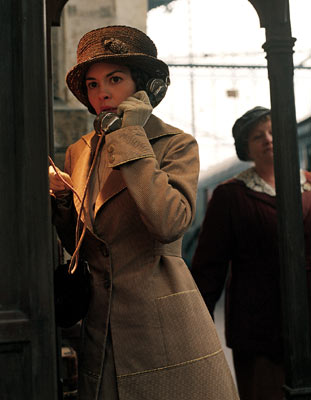 A Very Long Engagement once again pairs that magical couple from Amélie, leading lady Audrey Tautou and director Jean-Pierre Jeunet. In the aftermath of World War I, Mathilde (Tautou) is searching for her missing fiancé Manech, who had been sentenced to death for the crime of self-mutilation in order to escape the fighting. As no one actually saw Manech die, Mathilde becomes convinced that he is still alive and sets out to investigate, despite the fact that the last place he was seen alive was the dreaded No Man’s Land between the French and German trenches. Add a polio limp, a vengeful prostitute, a witty private investigator, an eccentric aunt and uncle, a tuba, a flatulent dog and a naked Jodie Foster, and you have a film that careens from gentle quirkiness to stark devastation with very little breathing room between the two.
A Very Long Engagement once again pairs that magical couple from Amélie, leading lady Audrey Tautou and director Jean-Pierre Jeunet. In the aftermath of World War I, Mathilde (Tautou) is searching for her missing fiancé Manech, who had been sentenced to death for the crime of self-mutilation in order to escape the fighting. As no one actually saw Manech die, Mathilde becomes convinced that he is still alive and sets out to investigate, despite the fact that the last place he was seen alive was the dreaded No Man’s Land between the French and German trenches. Add a polio limp, a vengeful prostitute, a witty private investigator, an eccentric aunt and uncle, a tuba, a flatulent dog and a naked Jodie Foster, and you have a film that careens from gentle quirkiness to stark devastation with very little breathing room between the two.
We always has time for films by Jeunet, which include the midnight movie classics The City of Lost Children and Delicatessen, as well as the better-than-the-third-one Alien: Resurrection. It’s always a good time playing the “Find Dominique Pinon” game, the distinctively craggy-jawed homme being one of the best character actors out there, and we do find Tautou captivating, especially once we got over her slightly creepy, beady-eyed Amélie poster. So we hope that no one will be offended if we quote Cher from Moonstruck, and say: “That was so awful.”
Like the opera, the film is so big, so powerful, so awful in its themes that it becomes more than a story. War is not just bad, it is a gray horror that whistles through the air and disintegrates hapless souls before your stunned eyes. Love is not just good, it is a magical force that transcends reason, logic and fate. This extravagant method may not sit well for some viewers. In one scene, an ill wind ripples through the wheat as the government men approach to draft a man to fight; we heard someone snort disbelievingly behind us because of the thin line that it treaded between beautiful metaphor and outrageous cliché. Seattle Maggie, however, tends to err on the side of grand gestures, and we had ourselves a good cry at the truly bittersweet ending. We were especially affected by the film’s treatment of the raw ugliness and absurdity of war. The fact that someone somewhere once thought that ordering men to run straight at a machine gun was a good idea has always rankled at our good sense. The scene in which Mathilde and a German woman meet in a café bathroom seems to encapsulate how Jeunet feels about it all; when all the explosions and haughty posturing of nations is through, all that is left are two grieving people washing their hands and apologizing for their respective countries.
Oh dear. At least this time that pert little voice in our head kept quiet until after the credits finished rolling. All we have to say is this: Maybe a dingo ate your fiancé? That’s it – Seattle Maggie is officially not allowed back into the movies until we really, really think about what we’ve done.
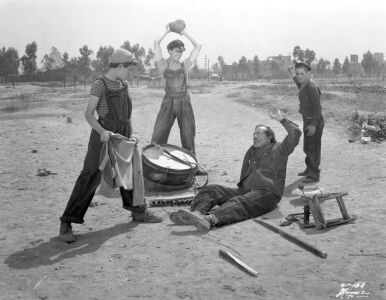
J Ho calls it a personal favorite and so does Cinecultist, it's Luis Buńuel's Los Olvidados. Playing for two weeks at Film Forum with a new 35mm print starting tomorrow, CC's so psyched for some brutual Mexican surrealism. A story of street children trying to eek out a life in Mexico City's slums, Los Olvidados kicks you in the teeth and you beg for more. There's a reason that Buńuel's in the pantheon and watching this "masterpiece" will further cement why.
Like Dalě's lobster telephone, which alters the way you think about shellfish and telecommunication devices forever once you've stared at it long enough, Los Olvidados does funny things to your brain in relationship to roosters. You never knew they were the birds of the subconscious, but once Buńuel plants that idea in your mind, it's tough to shake it.
PS. For a little more winterish New York-based surrealism, check out this weekend's Idiotarod. "The Iditarod is the famous long-distance race in which yelping dogs tow a sled across Alaska. Our Idiotarod is pretty much the same thing, except that instead of dogs, it's people, instead of sleds, it's shopping carts, and instead of Alaska it's New York City." The thing starts in Brooklyn and ends at Tompkin Square park in the Eee Vee, so between that on Saturday and the Hot Chocolate Festival in front of City Bakery on Sunday, CC thinks we have our weekend plans pretty mapped out.

If the merits of a movie could be based on the number of weird and vaguely hysterical telephone calls the Cinecultist felt compelled to make after watching it, Hotel Rwanda would deserve a special award. After we caught a screening a week or so ago with the Capn' and lovely Jori, we walked home in a daze, still wiping the fresh tears out of our eyes. In this emotional state, we felt it necessary to try to call random family members promising we'd protect them from the machete.
This may sound like a silly response to a mere movie, but there's something extremely resonant about this character's experiences. Oddly, Hotel Rwanda despite capturing the experience of one man and his family during genocide in a remote African country, felt incredibly immediate. Obviously, this has huge part to do with Don Cheadle's stand-up-to-cheer acting performance as Paul Rusesabagina, the real Rwandan hotel manager who saved over 1000 people from massacre.
But the most amazing thing about Paul, as depicted by Cheadle, is how ordinary he is. He lives this enviable but mundane middle class life. He holds a good job, knows the right people, and thinks of himself as a rational man living in a rational world. However, all of these "truths" can not protect him from the upheaval across formerly European imposed racial lines as he witnesses his countrymen at war with each other in the most brutal fashion. The fact that Rusesabagina risked his own life to save so many other lives is incredibly inspiring, but to also see him make mistakes and at times doubt his decisions, is incredibly affecting.
Even though the film ends happily for Paul's immediate family, the journey they take during Terry George's film is so exhausting and emotional, CC couldn't help but desolve into tears during the final reel. Hotel Rwanda is a movie which unsettles our routine as it thrusts us into this horrific, real world experience. This may not be a feeling which lasts, and in some ways, it just wouldn't be possible to maintain that level of empathy through the day to day grind. Yet as an object of artistic expression, Hotel Rwanda appears to be one of lasting importance.
As it seems that Japanese horror is all the rage these days, Seattle Maggie would like to take this opportunity to point out that Koreans can be scary, too. We’ve got the hottest food, the kicky-est martial arts, and the most bad ass grannies on the planet (you try getting on an elevator in a Seoul bargain basement – those little old ladies will plow right over you with their push walkers). And we don’t need our Homegirl Margaret Cho to get us started on our moms. So, move over J-Horror, and bring on the K-Horror! When we heard that the Varsity was showing A Tale of Two Sisters, we hustled our kim-chee lovin’ buns over to catch a screening. If you chose to click on the link to the movie on the Tartan Films website, you may be surprised to hear that we survived the screening with our hearts un-shredded and our eyeballs un-seared. We were also treated to a few truly creepy moments, an Ah-Ha! plot twist and some genuine bittersweet emotion that is often lacking in horror films.
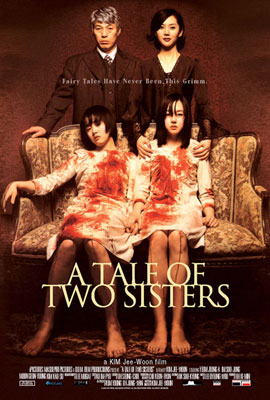 Sisters Su-Mi and Su-Yeon have returned from an unspecified stay at the hospital to their father’s remote house in the countryside, only to greeted by their aggressively cheery stepmother. There are some hints that things are amiss: the house presses in on the sisters with claustrophobic Victorian patterns; their father is full of nervous silence; their mother is mysteriously absent, presumed dead; their stepmother careens from manic to depressive at the drop of a hat. As the dark and shadowy house begins to produce more solid horrors, the sisters cling to each other as the only remaining bastions of trust and hope. When the final secret is revealed, it is the sisters’ love that remains the ultimate tragedy, tainted with unspoken regret, traced in the single tear on a young girl’s cheek.
Sisters Su-Mi and Su-Yeon have returned from an unspecified stay at the hospital to their father’s remote house in the countryside, only to greeted by their aggressively cheery stepmother. There are some hints that things are amiss: the house presses in on the sisters with claustrophobic Victorian patterns; their father is full of nervous silence; their mother is mysteriously absent, presumed dead; their stepmother careens from manic to depressive at the drop of a hat. As the dark and shadowy house begins to produce more solid horrors, the sisters cling to each other as the only remaining bastions of trust and hope. When the final secret is revealed, it is the sisters’ love that remains the ultimate tragedy, tainted with unspoken regret, traced in the single tear on a young girl’s cheek.
It’s official: Seattle Maggie is putting our foot down about twitchy female apparitions with the long, tangled hair. Enough, already! We’ve seen it so many times before that it is more likely to make us shrug rather than send a shiver up our spines. Another appearance of a disheveled black wig, and we’re already bored. But we did like the nerve-tingling mood of the A Tale of Two Sisters, especially the intense wallpaper prints and aggressively patterned fabrics that brought to mind Charlotte Perkins Gilman’s crazy-making short story “The Yellow Wallpaper”. Also, the narrative itself was a strong player – even if the horror element was removed, the story would stand well on its own, plying the themes of family, death and guilt into a coherent story line. We did feel that the movie started out a little slow for our tastes (as evidenced by Boyfriend Todd leaning over halfway through and whispering, “You got some ‘splaining to do”) but it managed to wrap up in a satisfying rush to the finish (BT, as the credits roll: “Oh. Never mind.”)
This is not director Ji-woon Kim’s first foray into horror; we were tickled to recognize his work from the horror trilogy Three, in the segment entitled “Memories”. His other film, The Foul King, the story of a bank clerk turned professional wrestler, was not in the horror genre, but did turn out to be an underground favorite at the 2001 Seattle International Film Festival. We look forward to more horror films from Kim and our other Korean brethren, but please – salons exist for a reason. All those ghouly ladies need a trim.

Another meeting of the Gael Garcia Bernal fan club of two (aka Cinecultist and the Real Janelle) occured last week at a screening of Pedro Almodóvar's new film, Bad Education at the Sunshine on Houston. Fueled by some tasty wings and happy hour beers, we were so ready to take in some equally tasty Bernal. But of course, an Almodóvar movie is so much more than cute guy oggling (though surely the director wants us to indulge with him in this healthy past time too). At once a comedy of errors, a pastiche of noir elements, a biographical musing and a compelling narrative, Almodóvar's movie is a stunning work.
We'd been anticipating seeing this movie for a few years now, ever since Almodóvar came to town to promote the screening of Talk to Her at the New York Film Festival. At the time, CC had been working in the trenches of downtown cool at Paper magazine as an editorial intern, and one day glanced up from our fact checking to see the adorable Spanish director standing in front of our computer. He wanted to know where the restroom was. We pointed in that direction. He said thank you. It was a thrilling moment, no question about it. Almodóvar is a long time friend of Paper's publishers and conducted a long interview over lunch with their film editor, which CC had to transcribe a few days later. He spoke about his personal connection to his up coming project (ie. Bad Education) and the potentially shocking material in the story about priests and their students. From a transcriber's point of view, Almodóvar's accent is a little tricky to say the least, but from a film fan's his deep film love is easy to understand.
Our movie club, Cinema Ahh*some will be screening an early Almodóvar this week, Tie Me Up! Tie Me Down! which we're excited to see and discuss with our film buddies.
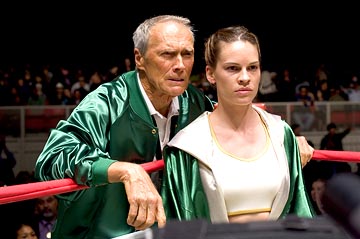
If only Cinecultist had the technology capabilities or know-how or clearance rights of a commercial movie review website, we'd love to post little wav files from Clint Eastwood's new movie, Million Dollar Baby, so you could hear these outrageous accents put to celluloid. For a flick that appears to be set in LA (based on the surfboards and beach front restaurant), everyone is totally down home, y'all. We've been doing impressions of the classic lines all weekend. "I don't train girls." "Maryann, they laugh atchoo." "Mo Calackalacka!" Ok, fine. We can't remember how they actually pronounce the Gaelic phrase on the back of Hilary Swank's green silk robe, but it's something along those lines.
Hilary plays Maggie Fitzgerald, a young woman boxer who's trash (so says Morgan Freeman's ever present voice over) but she's got a dream. She just needs to be trained by Frankie Dunn, the curmudgeon of a cutman, who owns the Hit Pit Gym and has some powerful guilt over the deterioration of the relationship with his daughter. After some prompting from his half-blind and former fighter gym assistant (Freeman), Frankie trains Maggie to the pinnacle of the welter weight. That is until tragedy strikes. Oh right, that pesky tragedy which always seems to intercede.
We suppose if you've been making movies as long as Clint has, you're bound to become a cliche of yourself. Some might find his growl, craggy face and irreligious banter with his priest comforting (ah that ol' Clint, back at it!) but CC just found it sort of silly. At times, his growl even seemed to overpower the growling of the 6 train underneath the Anjelicka theater on Houston. The plot also can be read in two ways — lyrical fairy-tale or overly simplistic, depending on whether you're caught up in the training of Maggie and the redemption of Frankie. Either way though, CC found the plot backed into an impossible corner in the third act. Without giving it away, the movie gets to a point where there can be no happy ending and the come uppances seem half assed based on these stakes.
Swank delivers the goods in these scenes, and we won't be surprised to see all three stars on the Oscar rosters this year. If only we could have had that final scene with Eastwood and Swank, with all of that vague inklings of romance and filial devotion intermingled with such exquisite complexity, minus the lemon pie, poor white trash relatives and Danger the skinny white boxer underdog junk. If only Oscar contenders could be striped of their fluffy trappings and we could pay the $10 bucks for pure performance in a bite sized, chewable caplet.
And without further ado, the Tenner from your Cinecultist. Happy New Year!
1. Sideways
2. The Incredibles
3. The Motorcycle Diaries
4. The Twillight Samurai
5. Before Sunset*
6. Harry Potter and the Prisoner of Azkaban
7. Kinsey
8. Badaasss!
9. Sex is Comedy
10. Super Size Me
Honorable Mentions: Stage Beauty, Imelda, Fahrenheit 9/11, Goodbye Dragon Inn, Saved!, Kill Bill: Vol 2, Infernal Affairs, Hotel Rwanda, The Dreamers, Eternal Sunshine of the Spotless Mind, Finding Neverland, Garden State, Hero, I Heart Huckabees, The Life Aquatic, Mean Girls, Ocean’s Twelve, Team America: World Police, Closer, Harold and Kumar Go To White Castle, The Bourne Supremacy
This Year's Guilty Pleasure: Wimbledon
Worst Movie of the Year: Jersey Girl**
Runner Up: New York Minute
* We realize we wrote some preview post on seeing this movie, and mentioned seeing it after hearing Ethan speak at the 92nd St Y but never wrote a more concrete review post. Hmmm. Well, it topped the ranking of the Village Voice's Take Six, that counts for something, right?
** More of the Worst Films of the year from Reverse Shot on indieWire this Tuesday. Let the eviscerating begin!
When one peruses the list of theatrical releases for the year with the purpose of composing a Top 10 of the year, which Cinecultist did last night, mixed emotions arise. Can one place a film on the list which one hasn't seen yet, but which we think will be on the TT (ie. Hotel Rwanda)? And what should one do with the guilt over certain pantheon directors still not making TT worthy films? It tears us up inside Marty! Quit breaking our hearts! This is our roundabout way of saying sadly, The Aviator was totally butt-numbing.
It's been requested that with our tremendous pull in the movie making industry, CC put a call out to directors to restrict themselves to 120 minutes. We don't need 180 minutes of Leo with long nails, twitching, peeing in milk bottles, seducing starlets and flying phallic airplanes. It's just not necessary. We did like Cate Blanchett as Kate Hepburn, she does that eccentric WASPy thing very well. Actually, now that we think of it, Cate has delivered two weirdly wonderful performances this year, as Kate and then as the journalist Jane Winslett-Richardson in the Life Aquatic. They're both just this side of caricature and quite engaging.
This doesn't redeem Martin Scorsese from the double whammy of Gangs of New York and now the Aviator, but at least we know he can still make some good choices. However, whoever decided on those wacked out faux superhero title credit should be given the boot.
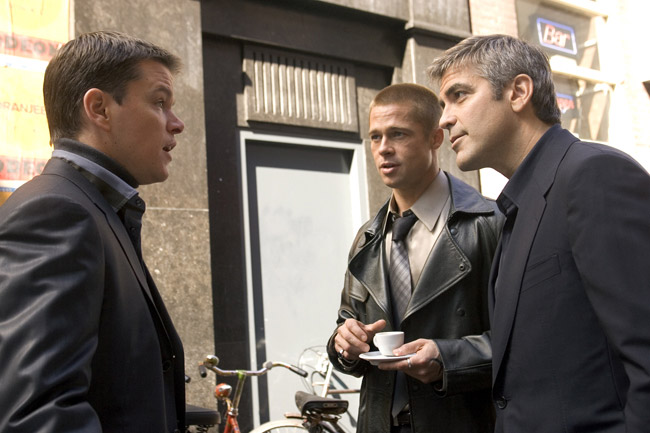
About a week ago, Cinecultist watched Ocean's Twelve, now referred to with fondness as The Twelve. Who knew a vanity project like this, chock-a-block with self-indulgent stars, and a sequel to boot could be so darned entertaining? It only goes to show that Steven Soderbergh is really The Man. At least when it comes to constructing likable Hollywood product, when he could be just paid to phone it in.
Right after she went to see it, our friend Ilana, programmer of the Twelve Days of the Cloon, called to warn us that The Twelve is a heist movie with no heist. Knowing this before you go to see the film will alleviate any pesky desires for causal plot. One of the strengths in The Eleven is the way the camera shows us every little black leather clad detail of the casino's heist. But this time out, Soderbergh eschews revealing for obfuscation, otherwise known in less skillful hands as inside jokes. Like the scene depicted in the still above where the young Matt Damon goes along with George and Brad for a sit down in an Amsterdam "café" to discuss business with one of their contacts. Like those weirdo childhood games where your statement has to include certain letters or images to count as a clue, the other three men seem to know how to communicate while Matt's character is completely useless.

No one in this is taking it all to seriously, except for perhaps Vincent Cassel, who plays François Toulour, the master thief and playboy trying to out nab Danny Ocean. Silly, silly man. Doesn't he know who he's dealing with here? This is the Cloon, in all of his middle-aged, salt and pepper, impeccable suits, rakish grin firmly planted glory. Look at the international super star go, as he does what he does so well. But getting back to Vincent, aka Mr. Monica Bellucci, he keeps himself in good shape. The sequence where he break-dances through a laser field is worth the price of admission alone. Though, the scene where he works out in those white pajama pants is pretty damn good too.
With so much loveliness and finesse and sleek little roadsters motoring up to Lake Como villas (remember Ilana, when you're Mrs. The Cloon, we're coming for late summer visits), it seems perfectly acceptable to ignore the less than stellar performances or bits that pop up. Yes, we're looking in your directions Andy "One Step From Liberace" Garcia and Julia "Look, I'm Preggers!" Roberts. Or rather, we have our fingers in our ears and are singing, while you're on screen. No hard feelings. With this much unabashed movie fun going on, we don't feel guilty about shunning you a bit.
Last night, Cinecultist caught a post-day job screening of the much buzzed about movie, Finding Neverland starring one of our first American thespians, Mr. Johnny Depp. As soon as the "The End" title faded and the credits began to roll, CC and our movie going buddy, Capn' Design, launched into a debate* over whether this could be indeed considered the best movie of the year (as the National Board of Review thought last week), surely causing rampant second-guessing around us in theater and probably ruining our fellow audience member's viewing experience.
This kind of bitchy criticism for criticism's sake reminded CC that we recalled Dorothy Parker wrote reviews of J.M. Barrie plays and was a tad harsh on his sweetness and nostalgia for childhood. But then we were worried CC was just thinking of that one review where she rips A.A. ("Winnie the Pooh") Milne a new one. Rushing home to our Portable Dorothy Parker (no household should be without one), we were relieved to discover, she ragged on both of them. Gotta love our girl Dorothy! Just when you think the sight of Johnny Depp communing in an Irish accent with sickly Kate Winslet and her four towheaded poppets is enough to warm your heart through to new year's, you re-read some acidic DP and all is right in the world.
"I suppose that the fair thing to do is to let the blame for the dullness and the embarrassment of The Admirable Crichton rest equally upon the cast and upon Sir J. M. ("Never-Grow-Up") Barrie. It doesn't, I feel, matter. Conciseness is not my gift. All my envy goes to the inspired Mr. Walter Winchell, who walked wanly out into the foyer after the third act—there are four and they are long, long acts—and summed up the whole thing in the phrase, "Well, for Crichton out loud!"Personal: Robert Benchley, please come home. A joke's a joke."
- from "No More Fun" published in The New Yorker, March 21, 1931
*By the by, CC's stance was "good but surely not the best thing we saw this year," while the Capn' says, "really like it right now, but not sure how I'll feel about it tomorrow."
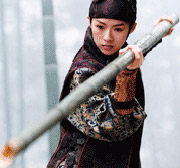 Cinecultist was pretty psyched to see Zhang Yimou's The House of Flying Daggers. From people who'd seen it during this year's New York Film Festival, we'd heard it was better than Hero, a movie we enjoyed quite a bit. Also, it seemed to bode well that the distributor, Sony Pictures, seemed more anxious to get Flying Daggers into American theaters than Miramax did with Hero (2 years is a long time to sit on a movie people, we will continue to hold a grudge on that one).
Cinecultist was pretty psyched to see Zhang Yimou's The House of Flying Daggers. From people who'd seen it during this year's New York Film Festival, we'd heard it was better than Hero, a movie we enjoyed quite a bit. Also, it seemed to bode well that the distributor, Sony Pictures, seemed more anxious to get Flying Daggers into American theaters than Miramax did with Hero (2 years is a long time to sit on a movie people, we will continue to hold a grudge on that one).
However, Flying Daggers had an even patchier plot, and while the visuals are quite lovely (Zhang Yimou makes moving paintings, not moving pictures) it wasn't enough for CC. Leaving the theater we marveled over the awesomeness of Takeshi Kineshiro (feel free to whisper in our ear any day), but why the obsession with being the wind? Isn't that just another way of saying you're a commitment phobe? It all seemed too juvenile to CC. The kind of story written by a spurned junior high school boy convinced that the cute girls always choose the bad boy over the one who's really dedicated to her, ie. him. It seemed like too much special pleading to us, and not emotionally resonant as it was trying to be.
Picture a Cinecultist in the lobby of the 14th Street Loews trying to pick up a pre-purchased ticket to Closer on Sunday afternoon with our credit card. The movie starts a 1:55 pm, but we were way-layed in Filene's purchasing some new tights then held up at Cosi grabbing a sesame ginger chicken sandwich, and so it's now 2:07 pm. The reader won't recognize our card. Weird. Neither will the other one. That's funny. CC walks over to the counter to enquire with a real person as to why we can't pick up our ticket to Closer. Oh wait, here's why. Closer isn't playing at this theater. Head smacking and muttering ensues. Where is it playing? Quick consultation with Moviefone. 3rd Ave and 11th Street is where we're supposed to be for the 1:55 showing. Drat!
Needless to say, after we booked it over there, CC missed the first 15 minutes of the movie. But that's okay, as we think we caught the gist of it pretty well. Two couples, swapping of various partners, pain, upset, conversations about sex, and beautiful faces. As many of the reviews have been saying, it's a technically well done movie but it's not really something which resonates beyond the credits. Clive Owen, well, CC went to see King Arthur on his behalf so you understand the level of our devotion. Jude and Julia also quite good but neither give revelation performances. And Nathalie Portman, eh? She sure is pretty but we have to say we found her cerebral stripper a bit creepy. She's too tidy to be the sex industry, or maybe that's just us.
The most arresting part for Cinecultist actually was the theme song which plays all through the preview and is in the final montage of our sad protagonists. We've given you a downloadable audio link below and suggest just looking at pictures of Clive and Jude while listening to it, rather than spending the $10 on admission. It's cleaner and more to the point this way, wouldn't you agree?
Damien Rice — "The Blower's Daughter"
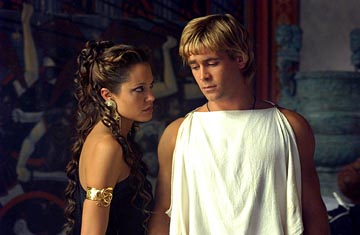
As we mentioned earlier this week, Cinecultist has been feeling a bit overwhelmed by the sheer number of great movies coming into the theaters right now (House of Flying Daggers! Finding Neverland! Life Aquatic with Steve Zissou! Bad Education!), and thus it was with perhaps a bit too much Schadenfreude-tinged glee that CC plunked down our $10 for Alexander the other day. And boy, was it bad. But it's one of those movies where the badness contributed to the fun and if your butt can stand the 3 hour running time, we might actually recommend it to you.
If only Oliver Stone were less himself ("this is my opus") and more Jerry Bruckheimer (Look, it's Johnny Depp in an eye patch!), then we wouldn't feel so much like we were puncturing his auteur balloon with our reveling in the bad epic-ness of the movie. Don't worry, we'll get over our Stone as serious director guilt in a second. Whew, it passed. And speaking of eye patches, CC was fascinated with Val Kilmer's single eye. Why is he missing that eye? Who the hell know. Battle injury, perhaps? There's another minor character who also only has one eye, also unexplained, but we think we recall it was on the opposite side of Val's, which then leads to the confusing thought that perhaps continuity messes up and switched Val's good eye back and forth during the picture.
Either way Mr. Kilmer yells quite a bit, which apparently is what counts for acting in this movie. Yelling and crazy, geography-defying accents is the method to this madness. The Macedonians all sound either Welsh or Irish and then anyone from the outer provinces or who you might call a barbarian behind their back, like Angelina Jolie or Rosario Dawson's characters, sound like Natasha from "the Bullwinkle Show". Poor Rosario. She sounds weird and then she has that blush inducing nude scene with our man Colin where they growl at each other. Girl has got no where to hide, and more enormous breasts than we realized, by the by.
Despite her weirdo accent and snake fetish, Angelina is the best part of this movie. She's seventeen different kinds of crazy, but to watch her in an epic, with all the sweep of history at her finger tips and a larger than life figure to inhabit, is heaven. With her as your mother, you can understand why Alexander had issues with women. We like Colin doing tortured and sexually confused, but for our blood there isn't quite enough pay off on the love affair between his character and Jared Leto's. Perhaps Jared is supposed to be just the coy tease but we would have liked to see a little more actual "stuff," beyond longing looks, requests to "stay" and declarations of undying manly love.
All of this is mere dressing to the climactic battle scene between the bedraggled Macedonians and the Indians with their elephants. Here's where Stone really gets cooking with the reverse color correction to red and the slo mo black stead versus charging pachyderm. That's pretty awesome. If only the whole movie could have had all that energy and verve but sadly, it was not to be.
Seattle Maggie trusts that everyone had an enjoyable Thanksgiving holiday, hopefully involving more than one type of pie. During our obligatory trip to visit the family in Silicon Valley with Boyfriend Todd in tow, we found ourselves shockingly drugged with turkey and various starches, so much so that it took a heroic amount of effort just to drag ourselves out for a cup of coffee the Friday after. What is there to do amidst such food-drenched sluggishness? Why, go to the movies, of course! Luckily, while the Bay Area seems to be drowning in strip malls, big box stores and Applebees, it does boast a good number of theaters with a fine selection of independent films. While vaguely tempted by Nick Cage’s Great American treasure huntin’ hijinks in Indiana Jones IV, er, National Treasure, we instead opted for something a little less frenetic in The Machinist.
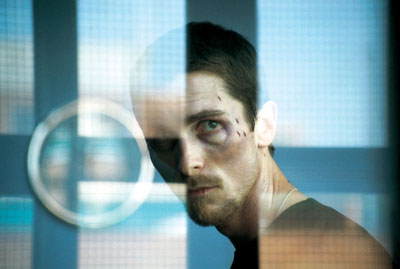 In the film, machinist Trevor Reznik (Christian Bale) hasn’t slept in a year, leaving him in near-skeletal shape. After a horrific accident at the machine shop, things begin to conspire against him – anonymous notes stuck to his refrigerator, dark looks from his fellow machinists, and the appearance of a shady fellow named Ivan. Good thing he has the reliable embrace of hooker with a heart of gold Stevie and the confidence of beautiful airport café waitress Marie…but why is it always 1:30am?
In the film, machinist Trevor Reznik (Christian Bale) hasn’t slept in a year, leaving him in near-skeletal shape. After a horrific accident at the machine shop, things begin to conspire against him – anonymous notes stuck to his refrigerator, dark looks from his fellow machinists, and the appearance of a shady fellow named Ivan. Good thing he has the reliable embrace of hooker with a heart of gold Stevie and the confidence of beautiful airport café waitress Marie…but why is it always 1:30am?
First things first – Seattle Maggie is aware that the 63 pounds that are missing from Bale’s hunky frame are being bandied about like the cry of carnival freak show barker: See the Man Who Lost A Bunch of Weight! Never mind that director Brad Anderson has already proved himself to be a thoroughly creative and absorbing director/writer. We know you have heard us rave about Session 9, a symphony of quiet horror that plucks each taut nerve to the perfect screaming pitch, but Anderson’s work in other genres, such as the sweetly romantic Next Stop Wonderland and the weirdly affectionate Happy Accidents, also makes us a huge fan. Never mind that cinematography is beautiful, both stark and full of portentous dread, much like the dark storm clouds that linger throughout the movie. One feels sucked in by the oppressive remoteness, from the soulless whirling gadgets of the machine shop to the impassive faces of the other machinists to the pale, dreamily unreal color palette, broken up only by the flashy cherry red of a mysterious car, the dribble of crimson blood down a refrigerator door, or the smiling ruby lips of the friendly Marie. Never mind that the film is engrossing, thought provoking and thoroughly entertaining. But no – what about those 63 pounds!
Okay, we admit it – even though we scoff at the hallowed weight loss trumpeted in ads and reviews, we found ourselves completely and utterly shocked by the first sight of Bale’s emaciated naked body. It is impossible not to be. And as the film progressed, it became clear to us that the dramatic weight loss was not the product of a publicity stunt or because Oscar favors the bodily-altered. Trevor is a character who is being wasted away by a force beyond his control. He is being gnawed at by sleepless nights and a past that he cannot bring himself to face. His body is the physical definition of guilt, gnarled and fragile, nibbled away to the core. The machinist is on the verge of becoming the machine, with no past, no feelings, no regret and no hope. For this bold statement, we applaud The Machinist, and even those of us sodden with the aftermath of holiday feasts can relate to the all-too human feelings of regret and longing to escape our mistakes. Seattle Maggie hopes to escape that extra helping of chestnut stuffing that is currently making our jeans so snug.
P.S. Our impromptu Primer competition a few weeks ago yielded a less than enthusiastic response. This leads us to believe that our fellow cinecultists have:
a) not seen it
b) seen it, but like us, did not get it
c) seen it, understood it completely, but are trapped under some thing heavy, mostly likely an expired equine beast that is still being unmercifully beaten
Ah well, we knew we were geeky, but we suppose this indicates a new low. Big thanks to reader Craig, who was kind enough to point us in the right direction to find some answers to our questions. The poster is yours if you want it, dude – otherwise, it will most likely end up as ultra nerdful wrapping paper for our holiday gifts.
Cinecultist never noticed before but Dr. Alfred Kinsey and his book about the American male's sexuality was such a cultural phenomenom that his name appears in the Ella Fitzgerald standard, "Too Darn Hot." According to the Kinsey report, every average male you know..." That's the power of good movies, like Kinsey, they shift your view just slightly to allow another intriguing person into your field of vision, so to speak.
What we loved the most about Kinsey -- though there's lots there to adore, not least of which is the performances by Liam Neeson, Laura Linney and Peter Sarsgaard -- is the way that it shows the mistakes made by a brilliant, and at times perhaps too passionate, scientist. There's been a bit of an uproar trying to get this movie banned it certain places because of the frankness of its sexual depictions, and one might think to a liberal, free-thinking Manhattanite like ourselves, there'd be nothing in Kinsey that rankles. However, writer/director Bill Condon finds a way to make even CC feel uncomfortable and judgmental (in the form of Kinsey's interview subject who's catalogued his vast life long sexual exploits including animals and children -- eww) and we respect him for that.
Kinsey pushed boundaries because he believed that the understanding scientific inquiry brings could ultimately make people happier with themselves and in their relationships. While this is a beautiful idea, the movie shows how blind devotion to an idea can be important but not always perfect. Oh, how CC loves these Winter movies that make us think!
In the last week, Cinecultist has sort of turned into an Incredibles idiot. We keeping working it into the most random and unrelated of conversations. "Have you seen the Incredibles yet? No? You're waiting? Why?!? No don't save it until Thanksgiving when you're visiting your family and want something appropriate to see at the cineplex. Go now! See it twice! Run to the theater!" We've been known to be evangelical about the movie going experience, but this is getting a little ridiculous.
Even as we sat in the theater watching it, we kept turning to our sister Laurie to ask, "isn't this so good? Don't you just love it?" She didn't appreciate that. She shushed us. Then as the credits began to roll, we thought we'd watch it all over again right then, if we could. See what we mean? This movie has done some strange voodoo on the Cinecultist.
Though obviously there's much to love in this movie, our favorite character would have to be Edna Mode, the super fashion designer to the supers, voiced by the film's writer/director Brad Bird. Those glasses. That old fashioned cigarette holder. The fact that she's only about three feet tall. Beautiful stuff, darling. Apparently, she's based on award winning costume designer, Edith Head, who did the Hitchcock movies and many more. She's an icon, darling.
Needless to say, if you see the Cinecultist soon and we either push a ticket for the Incredibles into your hot little hand or start calling you "darling," you'll know what's up. Don't mind us, we're just an I.I.
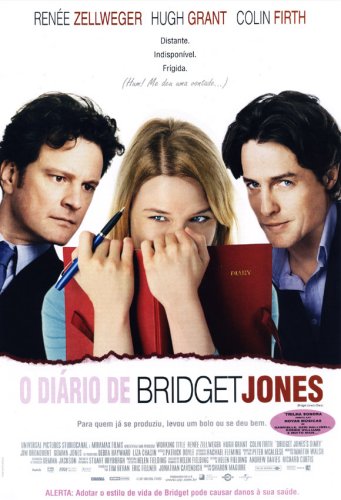 Even with family visiting, Cinecultist still was able to work in two movies. But then again, that's what happens when you have two California visitors in New York during a cold, rainy, windy November weekend. In the Saturday afternoon screening at Kips Bay of Bridget Jones's Diary: The Edge of Reason, it was chick lit city, so we fit right in. We weren't really looking to see if there were any fellows in the audience, but our guess would be nary a one. Which is fine really, unless a movie wants to venture outside of its expectations for a niche audience, a goal this Bridget Jones installment doesn't appear to have.
Even with family visiting, Cinecultist still was able to work in two movies. But then again, that's what happens when you have two California visitors in New York during a cold, rainy, windy November weekend. In the Saturday afternoon screening at Kips Bay of Bridget Jones's Diary: The Edge of Reason, it was chick lit city, so we fit right in. We weren't really looking to see if there were any fellows in the audience, but our guess would be nary a one. Which is fine really, unless a movie wants to venture outside of its expectations for a niche audience, a goal this Bridget Jones installment doesn't appear to have.
CC's a big, big fan of the first novel and thus, it's difficult to evaluate the movie as purely a film. Everything we tend to think and write about this movie lapses into literary criticism, so if that's not your bag, forgive us.
BJD is a redux of Jane Austen's Pride and Prejudice. Marriageable and witty young woman meets stuffy, uptight man at party and instantly hates him. He doesn't find her attractive either. She also meets another rogueish young man, who is not a suitable match but charming. He treats her poorly. Young woman's family member commits social faux pas, uptight man swoops in to help thus winning the heart of the witty woman.
While The Edge of Reason, the follow up novel to the wildly successful BJD, wasn't as good it still had things going for it, namely the plot's redux of Persuasion, another classic Jane Austen story. However, the movie version has jettisoned that structure in favor of the salacious plot points like the silly trip to Thailand (which we guess was intended by author Helen Fielding to satrize the runaway success of another British novel turned movie, The Beach) and a reappearance of Hugh Grant. However as lovely as he is, a Bridget fan can not live on Hugh alone. (Sidenote -- has Hugh's chest always been so hairless? V. noticable on the Today show interview with a twitter-pated Katie Couric this morning. Check with Four Weddings to be sure.)
There's no meta to The Edge of Reason, no further purpose of being besides more silliness on the part of Renee Zellweger -- prat falls, weight gain, lesbian kissing, etc. It's tough to convince people that appreciation of the rom com as a genre in literature and cinema is worthy of inquiry when this is the drivel the industry puts out. Sure, the movie had a few laughs but in the end for CC that's just not enough.
As a part of Cinecultist's movie binge with Matty, aka Capn' Design, documented on Gothamist yesterday, we saw as our first film the new Nicole Kidman movie Birth. Directed by Jonathan Glazer, who did Sexy Beast which we've heard lots of great things about, CC found the mise en scene from the trailer's totally intriguing. It feels quite a bit like Eyes Wide Shut, Stanley Kubrick's last movie, all baroque old money New York with secrets simmering just below the surface. But like Eyes Wide Shut, Birth has a number of intriguing elements which don't coalesce into a cohesive movie.
Perhaps the real problem is that despite our collective fascination with the idle rich and their wily ways, our current screenwriters or even novelists don't tend to be the idle rich. Someone like Edith Wharton or even Henry James knew what went on behind the closed doors of the upper eschelon, but did Stanley or does Milo Addica and Jean-Claude Carričre, Glazer's co-writers of the screenplay? The set-up (rich woman still mourns the loss of her husband 10 years ago when a young boy comes into her life claiming to be him reincarnated) is an intriguing one, but the third act twist is far too simplistic. While CC can't necessarily suggest a better ending, the one offered by the film seems to be too pat and thus disappointing.
The gorgeous opening sequence -- with a voice-over by the husband suggesting that if his wife Anna died and a little bird then came to him and said she was Anna he'd believe it, and then his final silent run through the snowy Central Park shot from behind -- is so evocative, that the let down from the rest of the movie was quite palpable.
Certainly, Jude Law is winning as the cad about town limo driver, Alfie Elkin, despite the number of times CC had to put our head in our hands over the self-absorbed, deluded, and at times close-minded things spewing from his confessional mouth. In the first five minutes alone, he tells the audience he's calls his penis "Big Ben" and it goes down hill from there. Alfie wants to be Dick Lit via the Sex and the City model, with metrosexual consumption alternating with Penthouse letters scenarios. Except that no matter how self flagellating Alfie's pity party becomes as the film winds down, he never finds salvation. This makes for a supremely unsatisfying, though perhaps "realistic" downbeat ending. We mean, lordy, even Carrie got her Mr. Big in the end, but Alfie gets bupkiss. CC doesn't feel sorry for him exactly, but it still seems unfair by Hollywood standards.
As for the other elements in the film, Nia Long is smoking, as is Susan Sarandon, and for those into the decidedly small niche market of aging Italian American starlets, rest assured that Marisa Tomei looks great too. Her final outfit inspired CC to go heavy on the upper lid mascara and to look around for a kicky, tomato red mod coat with over sized buttons. Though as far as Sienna Miller goes, the current object of Mr. Law's real life affections, we don't get the attraction. Sure, she looks like a sex kitten with those smokey eyes and those swishy long bangs, but there doesn't seem to be much there there. Maybe she read Proust in her trailer between takes, CC couldn't tell you for sure, but she seems dopey on screen. We predict flash in the pan for Ms. Miller, though her more talented paramour should continue his rise to further fame.
The soundtrack's is pretty good too. Make like the Cinecultist and download via iTunes the film's title track, "Alfie" by Joss Stone, which we added to our growing list of kooky covers.
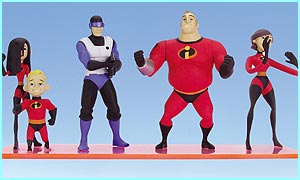
How much are we looking forward to seeing the Incredibles, the new Pixar/Disney movie out this weekend? Quite a bit, actually. As an animation studio, Pixar's releases seem to be the best hitting theaters in the last few years. They're clever and fun and heartwarming and lovely to look at. Incredibles also has, besides its cast of geek-alicious voices like Holly Hunter, Sarah Vowell and Wallace Shawn, the writer/director Brad Bird who made the Iron Giant, a delightful and underappreciated animation feature with '40s style pulp comic drawings about a giant who falls to earth and befriends a young boy.
Apparently in their redesign, New York magazine lured Ken Tucker away from Entertainment Weekly where he was their lead tv critic to write about movies for their new Culture Pages. Sure, it's a little text heavy for our weary urban eyes, especially since CC also tries to read the New Yorker every week, but if they're going to have great reviews like his insightful and entertaining take on the Incredibles this week, we'll keep our subscription. We expect our New York mag to be salacious and filled with weird information about New York real estate, but also great film critics? Who would have thunk it.
In the tumult that is the days surrounding a presidential election, it's a good thing we have movies, to you know, distract us from everyday life. And fall 'tis the season, as you well know, cinecultists. So far, one of our favorites has been Alexander Payne's newest, Sideways which we watched last weekend. Solid adult filmmaking with complex characters, quirky circumstances and a third act which defies Payne's previous difficulties with resolving his baroque set-ups, Sideways is the kind of movie going that makes Cinecultist happy to be fueling this biz. Movies like this one, which makes us grin like an idiot all the way home, muttering "damn, that's a good ending," is something we want to recommend whole heartedly.
College buddies on a bachelor party road trip through the Santa Barbara area wineries, Miles (Paul Giamatti) and Jack (Thomas Haden Church) geek it up with soliloquies about pinot grapes but that doesn't prevent them from hooking up with wine pouring locals Maya (Virginia Madsen) and Stephanie (Sandra Oh). Like in their previous film Election, Payne and co-screenwriter Jim Taylor revel in the awkward moment born from inherent character traits, the ordinariness of our inabilities to be smooth much of the time. In a Woody Allen-esque take on romantic comedy, Payne finds the most drama in those moments when people can't connect. When the romance is palpable and we're practically jumping from our chairs yelling "kiss her you fool" but he can't. Hilarious and heart-breaking, no?
All four leads give quiet but stand out performances. Seattle Maggie got Cinecultist hooked on the bad ass mojo spun by Sandra Oh a few years ago, and if she were posting here, she'd urge you to run out and rent Double Happiness (1995) and Last Night, two of her other previous excellent roles. Oh is also married to Payne, so let's assume that means he will continue to write her excellent roles and we'll do a little happy dance in celebration.
Again as in About Schmidt the cast of extras or bit characters feel like authentic Americana, you expect them to be carrying around shopping bags film with stuff from Wal-Mart or ordering Franklin Mint commemorative coins off camera. Also a Payne trademark in evidence here, the perfect production design. Close-up of real live barbecue in a cheesy steak house — it's comic gold. The filthy red Saab the guys road trip in couldn't be more perfect either and that's just two minor but memorable details in a finely crafted production.
In the days ahead, we're going to need things to cheer us up and lots of good fall movies is one way Cinecultist fills the void. Might we also suggest doing like Giamatti in the Talk of the Town piece on him in this week's New Yorker and spending lots of time at Junior's in Brooklyn eating cheesecake? Nothing assuages election grief like fat, carbs, sugar and le cinema.
 One of Cinecultist's favorite games ever is "make our friends squirm with plot descriptions from edgy European art films." Have you ever played? It's a blast. The rules are thus — 1) be the first on your block to see X controversial and sexually explicit subtitled feature film, 2) have friendly but detail-laden movie conversation with friends is crowded public place and/or work (watch out for that sexual harrassment thing, though!) and then 3) watch your acquaintences squirm away. What fun.
One of Cinecultist's favorite games ever is "make our friends squirm with plot descriptions from edgy European art films." Have you ever played? It's a blast. The rules are thus — 1) be the first on your block to see X controversial and sexually explicit subtitled feature film, 2) have friendly but detail-laden movie conversation with friends is crowded public place and/or work (watch out for that sexual harrassment thing, though!) and then 3) watch your acquaintences squirm away. What fun.
Anything with our girl Isabelle "Hoopie" Huppert in it is good for this game, as was that novel from a year ago, The Sexual Life of Catherine M. But the best for causing the impressionable and weak stomached mens to scurry is the directorial work of French filmmaker, Catherine Breillat. Rife with complex sexual dynamics, unabashed full frontal nudity from both genders and graphic humilations galore, Breillat's work is about exploring the female sexual subjectivity. If it's unpleasant and disturbing and difficult to watch in the realm of sexual relations, chances are Breillat has included it in one of her films.
CC had been wanting to see her film Sex Is Comedy from 2002 for a while, and even discussed reviewing it for Reverse Shot about a year ago, but the US distribution was so up in the air, we put it off. Then, it began a run here in New York at the Film Forum around the same time as her more recent feature, the Anatomy of Hell was released. CC intended to go see it straight away with Josh but as his job has swallowed him whole, it's been difficult to schedule an agreeable time.
This seemed to be okay though, because Aaron Out of Focus told us he thought it was one of the worst movies of the year. But then, we read J. Hoberman's review of Anatomy of Hell and his review of Sex is Comedy, both quite positive and though-provoking. Now, sadly it's a bit too late. We saw Sex Is Comedy before we posted our recommendation to catch it at Film Forum on Gothamist before it leaves on Tuesday. But Anatomy of Hell is now gone-zo from New York. Would CC have liked it as well as we loved Comedy? Or could it have been the intriguing set up of the same director making one of our top 10 favorites and least favorites of the year in the same year?
Our review from the archives of Breillat's Perfect Love which involves broom handles going where broom handles shouldn't.
We aren’t the first and we certainly won’t be the last – after the extremely short credits of Primer finished rolling, Seattle Maggie exclaimed, “Holy Ray Bradbury, Batman, what in the Fourth Dimension was THAT all about?”
 Let us digress for a moment by saying we are actually very smart. Really. While we admit padding our college GPA with extravagant grades from our theatrical lighting design instructor, we do manage to grasp concepts such as parallel universes, wormholes, and the fact that Universe is gradually going room temperature. Given our science fiction readin’ and role-playin’ gamin’ geekish past, we figured we could approach a movie about time travel without fear. We had not, however, figured on Primer's ability to twist one’s mind into an elaborate pretzel, and we now feel about as smart as a bag of hammers.
Let us digress for a moment by saying we are actually very smart. Really. While we admit padding our college GPA with extravagant grades from our theatrical lighting design instructor, we do manage to grasp concepts such as parallel universes, wormholes, and the fact that Universe is gradually going room temperature. Given our science fiction readin’ and role-playin’ gamin’ geekish past, we figured we could approach a movie about time travel without fear. We had not, however, figured on Primer's ability to twist one’s mind into an elaborate pretzel, and we now feel about as smart as a bag of hammers.
The movie follows two young programmers who, disillusioned with the dreariness of office life, manage to invent an incredible box with even more incredible powers. It seems that the box holds the key to the mystery of time travel, and our heroes are now left with the big decision of what to do with this power. What does one do with a day one can live over? Why, play the stock market, of course! Things soon escalate out of control once the time travelers begin to have ideas outside making a little extra cash, and that is just about where our vocabulary was reduced to “Huh?” and “Wha?”
A strange thing happened – even though we didn’t know what was going on, we still kind of liked it. It was like watching someone incredibly smart think aloud.
Even though most of it sounded like gibberish, we couldn’t help but feel smart by association. Unfortunately, the production value on Primer was not the best. The whole movie was a little too dark and smudgy for our taste, and this doesn’t help when there are multiple timelines to keep track of. We are aware that Primer was made with an admirably low budget, and it shows at times. However, we had a special fondness for the box itself, which looks like it was tacked together with tin foil and the remnants of an eighth grade science fair. It has just the right balance of ominous cheesiness, and reminded us fondly of the first season of Red Dwarf, where the enormous city-sized mining ship basically consisted of two rooms and a corridor, filmed from different angles.
At any rate, the parts of our brain that haven’t been fried beyond repair are still thirsty for knowledge. Seattle Maggie will send a free Primer poster (compliments of the Varsity in the U-District) to anyone who can explain the last half of the movie to us, especially the parts about the guy with the shotgun and the comatose boss, what exactly happened with the multiple Aarons, and the whole concept of the Fail Safe box-in-a-box. Please use short sentences and, if possible, avoid using the words “continuum”, “paradox”, and “Weeble” – they still make us break out in a cold sweat.
That's the order and the elements from the Motorcycle Diaries which Cinecultist liked the best, if compelled to pick three and rate them. Such lush vistas, a moving story and did we mention that Gael García Bernal is yummy? Well, he is. However! The Motorcycle Diaries is more than just the sum of its pleasant parts, Cinecultist might call it one of our favorite films of the year. The sweep and the resonance linger longer with one than just the mere beefcake factor.
Gael plays Ernesto Guervara de la Serna, a young medical student who takes off on a grand tour around South America with his buddy, Alberto, on the back of their motorcycle, a dilapidated but beloved hunk of junk. Intending to backpack around getting by on their ability to bullshit the locals and a few formal introductions in scattered cities, the trip becomes a consciousness altering experience for the two young men, in particular Ernesto, the film implies, who later becomes known as "Che." While the movie doesn't set out to be a biographical sketch of the full life of Che, or really try to connect the dots between this experience and what comes later in his brief life, it does allude to a compelling, developing character. Rather than doing a tidy cause and effect storyline, the Motorcycle Diaries strives to be more.
Leave it then to CC and her estimable viewing companion, the Real Janelle to discard any conversation on aesthetics or the making of a Great Man, and to sink to the lowest common denominator, aka drooling on Gael. Here's a sampling of a recent IM conversation after seeing the movie together:
cc: Hey, I'm working on a posting on Motorcycle Diaries. Any words from the Real Janelle to the Cinecultist kids on that flick?trj: No, not really. I thought it was good. Mostly just couldn't stop thinking about Gael. So handsome.
cc: Yes, he's swoon-worthy.
trj: But I kept thinking about how he's petite. You can kind of tell. I never noticed before. b/c he's so hott.
cc: I've heard good things come in small packages.*smirk* Though, when I saw him on the street near my house (!), he did seem to be on the shorter side. [Ed Note: 5' 6," according to Imdb.]
trj: Well my rule is, greater than or equal to. He's got a little leeway. Er, a lot.
cc: But maybe not when you wear your Otto Tootsi Plohound heels.
trj: Haha. Well, when you're, um, horizontal you might not notice. [insert maniacal IM laughing] Hahahahahah.
All senseless objectifying aside, the film is filled with lovely moments of poetic beauty and grace. Playing soccer with the lepers, first glimpsing Manchu Pichu, or even every time that crazy motorcycle wipes on on a gravel road sending the riders to the edges in a heap, CC felt like we were there. And if we had been, we'd have written all of you a postcard saying "Wish You Were Here."
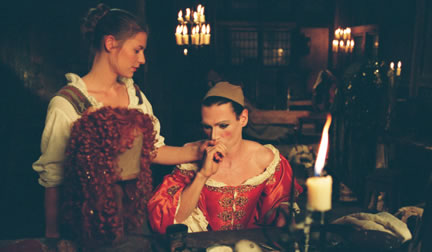
He used to just be a Golden God, and Cinecultist was fine with that. But now, Billy Crudup wants to be an Ahct-or, in his new movie with Claire Danes, Stage Beauty where he plays one gender confused character inside another gender characters. All while sporting a British accent. And being attracted to Claire. Whew, it makes us tired just writing about it.
Billy plays Ned Kynaston, the famous Shakespearian actor from 1660's London who's spent his whole life training to play women's roles on the stage. However, his dresser Maria (that's Claire) would also like to have some strutting and fretting time, so she convinces King Charles, (even without all of those spaniels underfoot, Rupert Everett's still the gay-est ever, god love him) to lift the edict against women on stage and to ban the men in women's parts. And hilarity ensues. Just kidding, no actually this is one of those "artistic independent dramas produced in Europe," so then, drama ensues.
Our problem though with the movie in general is how it tries to illustrate this grand moment (women take the English stage, how revolutionary!) but instead it merely seems petty and small. Shouldn't there be more to it than the jealousy/sexual tension between Ned and Maria? Even the city of London seems small, as the same minor characters appear over and over again on screen in the background. Is there no one else important to be at court beside a bunch of actors and Samuel Pepys? (10 points to whomever can e-mail us and remind us what Pepys is famous for in English letters.) Also, is Ned gay? Or just a little gender confused and easily sorted out by Maria's adoration? That doesn't make a whole lot of sense in our post-Stonewall world.
The final thing CC was left with for certain after seeing Stage Beauty, we never want to see Claire Danes flash her bare breast at us ever, ever again. *Shudder.* Not exactly knowledge that is worth the admission to the theater.
Trey Parker and Matt Stone hate terrorists and self-important Hollywood actors, so their bile directed at both groups in the new movie Team America: World Police, really does balance out. Cinecultist realized as the lights began to dim in our screening over the weekend, that we've seen quite a few the Parker/Stone productions in the theaters. Orgazmo, BASEketball and of course, Bigger, Longer and Uncut, which won Parker an Oscar for best song. He should be nominated again for his witty ditties in this picture, because like the rest of Team America, they're in equal parts clever, disgusting and hilarious.
Some of America's favorite cinematic models get a harsh ribbing in this movie, such as the cocky swagger of Top Gun's Maverick, the xenophobia of Star War's alien bar and the sucky acting of Ben Affleck in Pearl Harbor. Mostly it's the whole Jerry Bruckheimer school of action which is mercilessly flogged, the formulaic emotions set up to fuel the gratuitous violence. However, for two guys who seem to so love the structure of the musical, they appear to be out to murder that genre too. Highlight for Cinecultist included Kim Jong Il's plaintive ballad, "I'm Lonely," though of course it sounded more like "I'm Rone-ry" with Parker's un-PC performance as the voice of the Korean dictator.
Like a marionette projectile puking after an all night bender, Parker and Stone don't know when to stop, but that's perfectly fine by us. No one likes passing out in a pool of your own green gunk, by if that's the by product of such smart satire, we'll take it.
Cinecultist knew we went to the movies last weekend, and thus had a current release to review, but we were quite hard pressed to remember what we saw. We decided to retrace our Saturday steps, in our mind.
Woke up late. Coffee and toast. Surfing over TBS, HBO, BBC America and any internet tidbits we missed. Dressed and out the door, finally. Stopped into the post office to pick up a package. Leisurely second coffee at Mudspot, sitting in the window box seat and reading this week's Entertainment Weekly. Eye doctor's appointment. Then, movie at CC Village East. What was it now? Not something that just came out this week, because of the venue. We don't recall we read subtitles. But that only narrows it down so far. What was it...(*insert whatever sound you think omits from the Cinecultist brain racking)
Finally, CC had to consult last week's Time Out New York to remember it was Bright Young Things. It wasn't that we disliked Stephen Fry's adaptation of the Evelyn Waugh novel, it's just that it was apparently extremely unmemorable.
Actually we also forgot that this was Fry's directorial debut, after a long acting career, but that's partially because it's such an assured feature. It doesn't have the usual first film tender missteps. Except maybe the all too convenient ending. We're boycotting convenient endings right now. CC liked the smart set in '30s London plot, with all fancy dress balls, sex intrigues and posh accents. Also, the interaction between the media and their subjects, and how the subjects became the media, also seems particularly relevant and current. The performances were nice too, not anything that hugely stood out but all adequate.
What was it that caused this film to literally flee our mind, when so many horrible, humiliating pictures have been lodged there? Perhaps it's time to start taking some of those memory herbs they sell over the counter. What are they called again?
Standing around a certain party in Midtown Manhattan last night, drinking far too much free champagne and oggling the young men in their swanky suits and floppy hair, Cinecultist wonder if they'd heard. You know, that the aliens have come to experiment on them. We're not making this up people, that's according to the new Julianne Moore movie, The Forgotten. Volvo-purchasing, Brooklyn Heights living yuppies are the aliens' targets, my friends, they want to see if the bourgeois are easily manipulated. Whatcha think the aliens find out in their little experiment?
Oops, sorry cinecultists. Maybe you didn't want to know the "plot twist" is this laughably bizarre thriller, because you were still desperate to see Julianne swing her lovely auburn locks around as she runs through downtown Brooklyn for yourself. We apologize then. However, we can't in all good conscience recommend that you through your own hard-earned cash at this implausible but earnest yarn.
There are loads of things we could harp on in this movie but we'll take one small gripe, so you can see what we mean here. Note to screenwriters everywhere: We know you want your creations to be unique and thus you give them unique names. But kids, there ain't nothing wrong with a Jane or a Pete, especially if your plot is intending to take the mundane and make it horrific. You know what's a bad idea, calling your main character Telly. Who's called that? (Besides fuzzy monsters on public television, that is.)
Then, when their balding spouse must spell it for the earnest cop in the precinct after they've run off, after apparently having a psychotic break triggered by their child's untimely death, it's just going to sound weird. T-E-L-L-Y, ma'am. And then her cohort is called Ash? As in short for Ashley? And he's a former professional hockey player? That's when Cinecultist wants to throw down the ticket stub and go home, because the afternoon is a wash now.
When a moviegoer becomes obsessive about a certain genre — like Cinecultist's need to see all things billed as a romantic comedy — the psychologist within would like to reason that has to do with a cinema primal moment, a perfect film scenario that no other can ever compete with, though we constantly search for its equal. Though it'd be tough to pick out what that moment was exactly for CC, we'd hanker it probably involved Hugh Grant somehow. Now we have another paradigm of the stuffy Englishman longing to be cool and in his bumbling being all the more charming in Paul Bettany.
Paul Bettany should be the new Hugh Grant. He's foppish and awkward and self-deprecating. He rocks this Chris Martin of Coldplay look with the distressed jeans, pale button down shirt, dark blazer with trainers ensemble like nobody's business. His accent makes one want to take one's clothes off in the movie theater. He's that good.
Bettany is in Wimbledon with Kirsten Dunst, a rom com about a lackluster tennis player about to retire who has a wild card at Wimbledon and with the help of a whirlwind romance goes all the way to win the cup. CC first noticed Bettany when he was the naked Geoffrey Chaucer in A Knight's Tale because a turn as a literary forefather while wearing no clothing is certain to get our notice. You may also remember him from his work as the second fiddle to Russell Crowe in both A Beautiful Mind and Master and Commander. CC's wanted to see him as a lead for ages and now we get all we could want in his rom coming around with Dunst, wooing her over fish and chips takeaway and day trips down to the cliffs of Dover.
Our only complaint about the set up? Dunst, god love her, looks like she's about twelve while Bettany seems to be not a day under 35. It reads a tad inappropriate is all. [Actual birth dates, Bettany on May 27, 1971 and Dunst's April 30, 1982. Thanks Imdb!] She's still very likable and all as the hard ass tennis player, she just seems a bit too young, especially in the final denouement. By the way, one of the best small performances in the picture is delivered by John McEnroe as himself, a Wimbledon commentator along with Chris Evert at the final match. McEnroe has such presence, we don't think he could do Death of a Salesman or anything, but he's certainly natural in front of the camera.
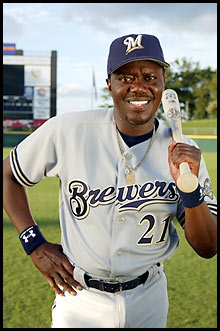 Chris Rock. To a lesser extent, Wanda Sykes. Margaret Cho. David Cross. Bernie Mac. These are comedians for whom Cinecultist will follow to any number of stupid features in the theaters if they're in them. [In case you didn't know, Pootie Tang is a movie that just gets weirder and better on each subsequent viewing. The train of thought goes like this: Bernie Mac -> Head of State -> Chris Rock -> Pootie Tang -> On TV again this past weekend. ]
Chris Rock. To a lesser extent, Wanda Sykes. Margaret Cho. David Cross. Bernie Mac. These are comedians for whom Cinecultist will follow to any number of stupid features in the theaters if they're in them. [In case you didn't know, Pootie Tang is a movie that just gets weirder and better on each subsequent viewing. The train of thought goes like this: Bernie Mac -> Head of State -> Chris Rock -> Pootie Tang -> On TV again this past weekend. ]
 Needless to say, CC went to see Mr 3000 at the 3rd Avenue theater on Sunday afternoon purely because Bernie Mac was in it. Other actors may do a scene, but Bernie Mac, now he bernie macs it. He has a grin like a Cheshire cat and a weird sex appeal that makes his banter with Angela Bassett, who plays his love interest in the movie, actually believable.
Needless to say, CC went to see Mr 3000 at the 3rd Avenue theater on Sunday afternoon purely because Bernie Mac was in it. Other actors may do a scene, but Bernie Mac, now he bernie macs it. He has a grin like a Cheshire cat and a weird sex appeal that makes his banter with Angela Bassett, who plays his love interest in the movie, actually believable.
Now it's important to understand that CC isn't saying Mr 3000 is not a formulaic three act Hollywood sports movie. That's exactly what it is. The trailer spells it out for you, the plot follows all the road marks like it's the President of AAA. However! Bernie Mac has charm. Bernie Mac has verve. Bernie Mac has this smile, that lets you in on the joke and makes it actually okay to yuk it up at the corny gags. That's some serious star quality if we ever saw some.
The character motivation is also straight out of a bad Syd Field Screenwriter's book. However, Bernie Mac actually turns it into something that you don't want to hurt yourself while watching. He plays Mr 3000, Stan Ross, a former major league baseball player who upon hitting 3000 base hits in his career, quits the Milwaukee Brewer's mid season with the assumption that he'd be inducted into the Baseball Hall of Fame asap. Now, nine years later it comes out that three of the hits don't count and thus, Stan Ross returns to the majors to regain his title. See, his character is a Bad, Selfish Man who only thinks about himself, and Bernie Mac is pretty convincing as the cock of the walk pro athlete. In fact he's doing this shtick so well in the first 20 minutes, CC wondered if he could turn it around to make him likable at the end, when he has the inevitable change of heart. But he does. Bernie Mac's Mr 2999 at the end of the movie is a pretty good guy, with a bit of an edge still on him and though the closing shots are treacly, we actually kept down the bile.
Sure, it seems weird to recommend a movie by saying, "the ending didn't make me throw up into my popcorn tub!" but that's what we're saying. Formulaic isn't all bad, when you've got a charmer above the title like Bernie Mac.
Frankly, watching Wicker Park — the final installment in our summer long quest to see total crap on our Friday afternoons free [sigh, Labor Day approacheth] — was a tad disappointing. Kind of like going to a party with the express purpose of getting off with a certain someone and discovering that he stayed home with the flu. It wasn't Josh Hartnett that Cinecultist was there to see, but rather one of our not-so-secret boyfriends Ben Gibbard.
See Ben wasn't to be in the movie, but one of his songs, a cover of the Phil Collins classic "Against All Odds" recorded with his side project, the Postal Service, was supposedly on the soundtrack. Alas, it is on the album but not in the film. Cinecultist thought we'd be making out rockin' out to Ben but all we got was Chris Martin. Sure, Gwynnie likes him but he's not our melancholy, melon-headed emo boy toy.
Instead we were forced to pull out the iPod and listen to the track at unnatural decibels all the way home. On single track repeat. (Thanks Scott!) Sorry 'bout that eardrums. What was it about Wicker Park that inspired such obsessive behavior? Fittingly, it's a movie about obsession, though a particular kind, one tinged with the anonymity of modern urban life and flavored by an interest in indie rock. It takes that fantasy of seeing someone on the street whom you fancy and who you play a little flirty flirt with as you go on your way, but expands it way out of proportion. We'll call it the F train syndrome. This movie takes that idle thought — maybe I'll follow that Hottie McHotHotHot, we'll meet, fall in luv and then live happily ever after! — and turns it into a full-blown, European art house-esque convoluted drama. He watches her, she loves him but that one also loves him and did we mention his friend's involved too?
Mostly CC found ourselves rooting for the underdog, the brunette chick played by Australian actress Rose Byrne. [Why's it the brunette who never gets the guy and is always portrayed as kinda psycho? Just askin'.] She's not all thriller, menacing stalker ready to kill him if she can't have him as implied by the perplexing trailer, but rather a shy girl who sees Josh Hartnett and doesn't have the guts to talk to him. Why are her obsessive following and voyeuristic tendencies not rewarded but Josh's are? Would it be too simplistic to see that the reason is because voyeurism in a guy is manly but in a girl is reereeree (insert miming of knife wielding)? It just seems a bit unfair.
We still find the behavior unsettling all around, this fascination with looking at rather than engaging with. The most romantic moment of the movie is meant to be when Josh's character Matt finally finds his Lisa, rushes to her side, and then stares at the back of her head. Until she realizes he's there and turns around of course, but that is a full minute or so later. It's the unreturned gaze that lingers and that means something. That smacks of a kind of cultishness that even the Cinecultist can't get behind.
Hey guys!
How's it going? Thanks for a summer of great programming. We're psyched for the Murnau series coming up. Sunrise; totally in our top 10.
Just a teeny, tiny request. Could you think about extending the run of the Leopard? We've tried to go twice now, and on Saturday even arrived an hour before the screening, but it's been sold out. Two weeks is just not long enough to get a three hour Italian masterpiece into our busy viewing schedule. You're only showing it three times a day, after all. Alain Delon, Luchino Visconti, the Risorgimento -- we love it so much. So much. Two more weeks perhaps? For little ol' us? Just see if Criterion can help you out with that. We'd appreciate it.
Unless of course, you want to write an excuse note to CC's Day Job. "Please excuse the Cinecultist from work today, as she must watch a three hour Italian film." That'd be good too.
Kisses,
the Cinecultist
[UPDATE: So Harris Dew wrote to us from Film Forum to say there's not any way to extend the run, as the print has been booked for another venue right after New York. It looks like CC's going to have to advise the use of excessive elbows and the hairy eyeball to get people out of your way in line for tickets betweeen now and Thursday.]
As you might have heard, the reviews for Ju-On: The Grudge were a mixed bag, ranging from "Scary" to "Silly", "Boring" to "Inspired", and back again. Seattle Maggie caught a showing at the Varsity Theater in the U-District, where it is playing for a scant week. Compared to the ever-popular Ringu (and sequels, and prequels!) and the truly creepy Dark Water, Ju-On is about a haunted house and those who have the misfortune to come in contact with it. The primary inhabitants of the house are the ghosts of a murdered housewife, her glassy-eyed son and the truly unlucky family cat, and they sure are pissed off. Set up as a series of short stories featuring young women, the mother-son-cat team make sure that all of their victims are pursued by a frenzy of unsettling visions, resulting in a nasty end. In most cases, the final blow is suggested rather than splashed across the screen - this movie is definitely more concerned with atmosphere and building up tension. This is also evident in the thin plot tying it all together which doesn't even attempt to build to a climax, at least none that we could discern.
 Does it work? It is hard to say. Having watched a fair amount of this new wave of Japanese horror, Ju-On featured many of the scare tricks we have seen before, including the weirdly lurching ghouls with masses of unruly black hair, the creepily staring young children, and the spiritually warped video tape. This took away considerably from the scare factor, although it may still work nicely for someone seeing them for the first time. Also, we must admit we had a bit of a hard time following the intertwining stories because (saints preserve us from the fury of our Asian sisters!) a lot of the characters just look alike, mostly young women with short hair and stylish clothes. We aren't given the opportunity to get to know them before they are snuffed out, so they get hasty labeled in our minds as "the Sister" or "the Social Worker", which doesn't make us care terribly about their untimely fates. The swift, constant cycle of lurking and dying can numb the viewer, which doesn't help you hold onto that creeped out feeling.
Does it work? It is hard to say. Having watched a fair amount of this new wave of Japanese horror, Ju-On featured many of the scare tricks we have seen before, including the weirdly lurching ghouls with masses of unruly black hair, the creepily staring young children, and the spiritually warped video tape. This took away considerably from the scare factor, although it may still work nicely for someone seeing them for the first time. Also, we must admit we had a bit of a hard time following the intertwining stories because (saints preserve us from the fury of our Asian sisters!) a lot of the characters just look alike, mostly young women with short hair and stylish clothes. We aren't given the opportunity to get to know them before they are snuffed out, so they get hasty labeled in our minds as "the Sister" or "the Social Worker", which doesn't make us care terribly about their untimely fates. The swift, constant cycle of lurking and dying can numb the viewer, which doesn't help you hold onto that creeped out feeling.
If there is something truly frightening about Ju-On, it is this: Evil doesn't care about you. It doesn't care about your sex, religion or race. It doesn't care if you floss twice a week, or whether you tip the barista every time you order that triple vente mocha, or if you flush live spiders down the plughole for fun. It doesn't care about how old your kids are, or how you met your spouse, or how much money is stashed in your 401K. Your hopes and dreams, your good intentions, your murderous thoughts, your beliefs, your regret, your very life, the essence that makes you an individual - none of it makes the slightest difference. This is the true meaning of fear, when evil does not pause in its rage to recognize you.
The evil in Ju-On lashes out without logic or pity, with no regard for those lying in its path. Whether the characters entered its realm by accident, or on a dare, or just to care for a lonely old woman, they are all cut down in the same unrelenting way. And there is no escape, no silver bullets or crucifixes, no moments of "A-Ha!", no forlorn spirits just waiting to be understood, vindicated and sent on their merry way to a peaceful afterlife. In Ju-On, there is only fear and death and rage, rippling in inexorable waves over anything unlucky enough to cross its path, as boundless as the sea and with as many untold secrets. In the face of her ultimate demise, one character flees to her bed, the only safe haven she has, and pulls the blanket over her head like a child. We wish that this was enough to ward the evil away, this childhood belief in warmth and protection, but it is not. This is the meaning of evil and its ever unsatisfied grudge, and Seattle Maggie found she was, indeed, afraid.
On a Lighter Note: During the broadcast of the Athens Olympics this weekend, Seattle Maggie caught Bob Costas intoning the phrase "Hubris of Folly". Bob Costas, you gotta get over yourself, dude - there ain't no Olympic event for "Thesaurus Abuse".
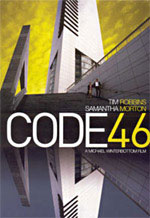 The really good thing about airing our cinematic fetishes in such a public forum five days a week, is that Cinecultist's movie-going companions really know what buttons to push. After seeing the trailer for Michael Winterbottom's new movie Code 46 starring Tim Robbins and our girl Samantha Morton, CC's friend Ilana turned to us and said, "so we're totally going to see that, right?" And we did, on Sunday at the Angelika.
The really good thing about airing our cinematic fetishes in such a public forum five days a week, is that Cinecultist's movie-going companions really know what buttons to push. After seeing the trailer for Michael Winterbottom's new movie Code 46 starring Tim Robbins and our girl Samantha Morton, CC's friend Ilana turned to us and said, "so we're totally going to see that, right?" And we did, on Sunday at the Angelika.
Let's get the obvious Blade Runner parallels out of the way first -- futuristic government agency controlling the social agenda of the people (check), Asian metropolis with international flavor bleeding into all transactions (check), issues of class and identity explored (check) and an illicit sexual attraction not deemed appropriate by the infrastructure (check and double check). In fact, now that we're thinking about it, Tim Robbins really is channeling a younger Harrison Ford in this movie. He's all about the compassionate masculinity, struggling with his charisma and power, his place within the family unit and his desires outside of it. Like Ford, Robbins is all MAN in this movie, a bundle of post-apocalyptic sexual energy that can't be denied. It buzzes around him on screen. It makes you realize Susan Sarandon's a lucky, lucky woman.
Not that Morton's a slouch in the charisma and appeal department by any stretch of the imagination. She has the most fascinating face and like her roles in Minority Report or In America, her close cropped hairdo only further accentuates the expressive range that can play across her features at any given moment. We've said it before, but we could literally watch this woman read the phonebook for two hours, no problem. She has an amazing innocence about her and yet she's still a woman, with a distinctly womanly body that we found fascinating to watch move on screen. Like we saw in Morvern Callar, Morton looks best under a strobe light in a crowded dance club where she can be lost in her revery, observed and yet sort of possessed. Winterbottom's camera turns her into a fetus grooving in the electronic amniotic fluid, but a sexy fetus if you can believe it.
With performances like these two and the stunning futuristic yet very "real" production design, it was easy for Cinecultist to get caught up in the flow of this film. By which we mean to say, please check your overly fastidious plot concerns at the door because CC suspects much of this movie doesn't really make sense. So much so that you may have noticed we really avoided any sort of plot summary in this review. That was a conscious choice, because we're pretty sure we don't have such a firm handle on that pesky plot. But no matter. Code 46 is confusing and gorgeous and moving and weird and thought-provoking. Not half-bad for a late August afternoon at the cinema.
Though there seem to be no rules, regulations or stipulations which legally prevent (it says it right there, silly us) Cinecultist from entering Gothamist and Miramax's Hero contest, we figure we ought to recuse ourselves based on our contributor status to Gothamist Arts + Events and just graciously point it out to our readers instead. With the playing field now level so to speak, we encourage all of our Asian cinema fanatic friends to send in your answers. And if you think any of the queries seem too tricky, you can drop us a line (karen AT cinecultist DOT com) and we'll send you a recommended viewing list.
 Thursday night as a part of the Urban World Film Festival, Cinecultist finally saw one of our most anticipated movies for the last two years, Zhang Yimou's Hero. Released in China in 2002 and owned for US distribution by Miramax, the film has been leaking out into festivals for the last few months and is finally going to see the US theatrical light of day on August 27. We weren't able to catch it at the opening night of Subway Cinema's Asian Film Festival though we did hear Zhang speak about the movie to the Asia Society and his comments about making the movie to film the color black plus a kick ass cast had CC waiting with baited breath for this picture.
Thursday night as a part of the Urban World Film Festival, Cinecultist finally saw one of our most anticipated movies for the last two years, Zhang Yimou's Hero. Released in China in 2002 and owned for US distribution by Miramax, the film has been leaking out into festivals for the last few months and is finally going to see the US theatrical light of day on August 27. We weren't able to catch it at the opening night of Subway Cinema's Asian Film Festival though we did hear Zhang speak about the movie to the Asia Society and his comments about making the movie to film the color black plus a kick ass cast had CC waiting with baited breath for this picture.
If you're familiar with Zhang's earlier work when he was the golden boy of the Chinese Fifth Generation, making Oscar favs like Raise the Red Lantern or Ju Dou, you know that for him plot is just a means to the end of production design with his exotic locales, sumptious colors and practically mathematical shot formations. Where those films used these painterly effects (emphasizing visuals over story) for the purpose of historical drama, Zhang has now taken this technique and applied it to the martial arts movie. And wow, it is a stunning thing to behold.
While the fight scenes are fun, in particular an early sequence where Jet Li fights an assassin in a rainy chess house, they aren't something so spectacular and ground breaking. However the spectacle of all of those colors swirling from the screen, the most shocking reds and cooling blues and vibrant greens, made Cinecultist's jaw drop for nearly the full two hours. The most stunning of all though is indeed Zhang's use of black. According to his research, black was the official color of the Qin court, and the sea of baroque courtiers peering around the black columns in the all black receiving room for the Emperor is something really worth seeing.
However, sensory overload visuals wouldn't be enough to make for a wholly compelling movie. Without the performances delivered by Maggie Cheung and Tony Leung as lovers/assassins Snow and Broken Sword, as well as Jet Li as the stony Nameless assassin, filling the screen with passion and verve, Hero could have easily fallen flat. As our friend William pointed out after the screening, the best martial arts movies combine high emotions with action and watching Maggie and Tony together on screen is like poetry. The feeling of a shared past seems to emanate from them and as they die tragic deaths a bunch of times (the story is a bit Rashomon-y, it's retold a number of times with different details revealed) each one resonates more.
Cinecultist urges you to disregard the pretentious Quentin Tarantino Presents over the title with the single billing of Jet Li on the American posters (he's good but he's not the whole story) and support this movie when it comes to your town. Art house meets ass kicking and it's a happy union, we are pleased to report.
After last weekend's glut of movies, Seattle Maggie is running a little low on inspiration today. Between the ridiculous heat wave and The Man Getting Us Down at our crappy office job, we find solace losing ourselves in the oblivion of so-so movies that one can always find playing somewhere on cable any time of day or night - Kindergarten Cop, for instance, or Mystic Pizza. We paraphrase Cameron Crowe when we say that being with these movies is like being alone - comfortable, undemanding, and reliable to a fault. Background noise, if you please. However, these trifles are less than exciting to anyone not suffering from a summer slump such as we languish under.
Therefore, we turn to Boyfriend Todd, who is enjoying a much needed break from adult life by recently becoming a full time student. As such, he is able to take in an afternoon movie much more easily than us poor working slobs. His latest foray into the theater was to catch Napoleon Dynamite, a quirky indie flick that somehow held little interest for us personally. It seemed to be another one of those pictures that was filled with crazy characters whose main purpose was to be crazy and little else, something which can be interesting, but usually turns into a mess. As luck would have it, BT found that it tickled his funnybone with all the right moves. The following is a transcript of our conversation after the movie:
Seattle Maggie: So, how did you like the movie?
Boyfriend Todd: It was weird, but good. And funny.
SM: How do you mean?
BT: Well, for example, there is this...heh heh...
SM: What?
BT: This llama...heh...and it was...(snort) HA ha...!!
SM: A llama?
BT: It was named TINA....WAH HA HAH HA!!!
Transcript ends in a barrage of hilarity.
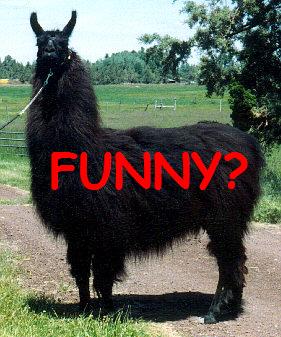 Hm. Whether it is the inherent nature of llamas to be humorous or something more, we are not sure (although just writing the word "llama" over and over again does make us crack a tiny grin). It is mystery that will be investigated further, perhaps when this movie makes it to DVD. However, we must say that when a movie causes such an impressive eruption of laughter, there can only be something good going on. Everyone could use a belly laugh like that every now and then. See if Napoleon Dynamite does it for you at theater in your neighborhood.
Hm. Whether it is the inherent nature of llamas to be humorous or something more, we are not sure (although just writing the word "llama" over and over again does make us crack a tiny grin). It is mystery that will be investigated further, perhaps when this movie makes it to DVD. However, we must say that when a movie causes such an impressive eruption of laughter, there can only be something good going on. Everyone could use a belly laugh like that every now and then. See if Napoleon Dynamite does it for you at theater in your neighborhood.
On A Personal Note: We speculate that another reason that BT found this movie so enjoyable was the opportunity to identify with another film redhead. Apparently, the stigma of the red hair (especially among boys) is something that haunts a person for life. According to BT, who sports some fine bronze curls himself, redheaded men/boys are always portrayed on screen as "nerds, bullies or weirdos like that kid in Children of the Corn". Seattle Maggie challenges you to present us with any examples of Titan-haired leading men of some sexiness, so we can continue in our quest to trump BT's pessimistic views with a hearty "A-HA!"
Oh fine readers, Cinecultist comes not to bury Little Black Book, Brittany Murphy's new rom com out this past weekend, but to praise it. And before you click over to one of the fine links on the sidebar in a damn hurry, give us a second here to make our case. First off, disregard the lame tag line and any sort of trailer you may have seen -- it doesn't do this film justice.
Where the story may sound from the premise like it's going to be hysterical and retrograde -- girl investigates boy's exes --, it actually comes out swinging for women's autonomous identity and their value without a relationship. CC likes it when rom com's pander to our feminism. Where Brittany Murphy's knobby knees and sometime skankiness make CC want to poke her with a sharp stick, here she won us over. Plus, the movie has Carly Simon in it. And Carly Simon rocks. "You're so vain. You probably think this post is about you, dontcyou, dontchyou!"
Brittany's character, Stacy loves Carly because that's the music her mother used to listen to when things got too chaotic in her life. Stacy on the other hand, sings Carly songs in the echoing bathroom and loves the Carly track from her favorite movie Working Girl, "Let The River Run," it's her theme song. Like the tennis shoe clad Tess McGill from Staten Island, Stacy too has a dream -- to work for Diane Sawyer. But for now, she works at the Kippie Kahn Do show as an associate producer in New Jersey and practically lives with her boyfriend Derek (Ron Livingstone). All seems to be going swimmingly until Derek let's slip out the supermodel former girlfriend and Stacy's co-worker (Holly Hunter) convinces her to "look under the hood before buying the car."
CC went to see this movie last Friday as a part of our "See Crap on Friday Afternoons" program and we did have excessively low expectations for it. But what surprised us about this movie was the devoted cinephilia, the introspective monologues and the fact that it ends not with a romantic triumph but a career one. Any time a silly rom com takes the road less traveled, CC finds that reason to celebrate. It's so easy for Hollywood to go with the formula and reinforce women's fears about dying alone half eaten by wild dogs. That's why we need sly movies like this, which seem to be about one thing, but really are about Carly Simon theme songs and living your dream.
Thus Cinecultist proscribes putting said theme song on your iPod and listening to it while storming off to work. It does wonders for the complexion.
Cinecultist kinda loves it when certain movies turn us into an obsessive fan girl. It's all about the tingling love of cinema buzzing through our veins. The newest installment to the list of films that have this power over us — Zach Braff's Garden State which we saw over the weekend. More The Graduate than The Pallbearer, Garden State details four days wherein the morose Andrew Largeman (Braff) returns from his beige life in L.A. to his hometown in New Jersey to bury his mother. He meets a girl (Nathalie Portman), he goes off the meds, he finds himself AND he's introduced to the music of the Shins. It's a bildungsroman for the emo set, and though we found it sorta twee in the end, Cinecultist has to admit we sorta love twee. We do live in the Eee Vee afterall, ground zero for twee.*
Perhaps what Cinecultist found ourselves responding most strongly to in this movie, is the feeling Braff captures of walking through life with your earphones on. There are moments where the emotionally stunted Large fades away from an experience, disengages himself frozen in his spot as the other players rush around him and the soundtrack swells over the ambient noise. Partially a by product of a MTV-raised moviemaker where the song takes higher precedence over dialogue, but also partially a (seemingly conscious) expression of Large's modern malaise; this is a very effective technique Braff uses throughout the movie. And what a soundtrack this movie has as the dialogue fades away! Not just two tracks by the Albuquerque band the Shins, who Portman's character Sam introduces by telling Large "they'll change your life," but some Simon & Garfunkel, Coldplay, Nick Drake, Remy 7, Thievery Corporation and a cover of the Postal Service's "Such Great Heights" by Iron and Wine.
But getting back to the whole twee thing, the Postal Service cover is prime example of this movie's tendency to take romanticism just that little bit too far. Ben Gibbard, the emo king and our not-so-secret secret boyfriend, tempers his twee lyrics written for side project the Postal Service with the harder edge techno beats provided by Dntel. However Iron and Wine do the song purely as a folk tune, acoustic style. It's all too much sweetness, once we got beyond the thrill of hearing Gibbard lyrics coming from the big screen, as we watch Large and Sam spoon post-coital. The same can be said for the film's ending, which we'll refrain from detailing, except to say that it's much too tidy for our taste. As a self-avowed devote of Harold and Maude, Braff should have known better in this case. Let's hope for a more ambiguous sophomore effort with all of the wit and heart displayed in this picture.
For your listening pleasure we bring you the eponymous track from Garden State's trailer, Frou Frou's "Let Go." Listen to it loud and do some sort of dance movement that's entirely original, never before done in the history of humanity, just like the too quirky but adorable Portman. The soundtrack comes out August 10 and the film opens wide this coming weekend.
*Courtesy of a Convo yesterday with Jen we bring you a definition of "twee" from the Merriam-Webster Dictionary:
twee
Pronunciation: 'twE
Function: adjective
Etymology: baby-talk alteration of sweet
chiefly British : affectedly or excessively dainty, delicate, cute, or quaint
And there you have it. Definitions of obscure British words and movie reviews, Cinecultist is a full service weblog. P.S. to Jen, we'd so go and see this movie again with you. Let's go, right now.
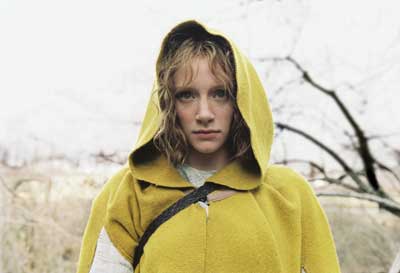 As previously mentioned, Seattle Maggie loves M. Night Shyamalan, unabashedly and unreservedly. Having claimed the honor as the only person in America who will enthuse about Unbreakable in public (so good! so good!), we hope our readers will see beyond our blind affection for all things Shyamalan and heed us when we say that The Village really is a very good film.
As previously mentioned, Seattle Maggie loves M. Night Shyamalan, unabashedly and unreservedly. Having claimed the honor as the only person in America who will enthuse about Unbreakable in public (so good! so good!), we hope our readers will see beyond our blind affection for all things Shyamalan and heed us when we say that The Village really is a very good film.
One thing up front - this is not a horror picture. All of the critics currently bashing this film as "not scary enough" is like complaining that crčme brűlée is "not chocolatey enough" - of course it isn't chocolatey, you nitwits, it's CRČME BRŰLÉE, does this mean that the king of desserts is somehow less rich with custard goodness, less crisp with burnt-sugar deliciousness, because it does not hold up to your silly chocolate expectation? Of course not. We even think our dear squeamish Cinecultist would be able to make it through this one, that is how much of a non-horror picture this is.
All dessert allegories aside, The Village is suspenseful, thoughtful, and surprisingly touching. Its fairy tale styling takes many forms, from the striking use of color to the oddly-apt speech used in the dialogue - many phrases get the Capitalization Treatment, such as "Those We Do Not Speak Of" and "The Bad Color," which would be annoying if it didn't work so well in setting the tone of the piece. The love story between the blind Ivy (Bryce Dallas Howard) and the taciturn Lucius (Joaquin Phoenix) caught us off-guard with its quiet beauty, showing us that the simple act of holding hands can be more emotionally moving than a embrace.
As for Ye Olde Giant Plot Twist, Seattle Maggie feels that Shyamalan's work has been hampered by the expectation of this lumbering beast. While The Village does have a pretty mighty twist revealed at the end, but trying to figure it out ahead of time left us restless and unhappy. Halfway through the film, we abandoned our junior sleuthing and just enjoyed the movie as it unfolded. If this meant jumping at things we felt a little silly about afterwards and being clueless about things we felt a little stupid about not seeing before, it was a small price to pay for a terrific film experience. Please give this movie a chance and try to ignore all the hype, and Mr. Shyamalan will tell you a story that will move you, intrigue you and make you think.
PS Last word on the Harold & Kumar front, we promise. We did catch a matinee this weekend and were suitably entertained and grossed out. However, perhaps even more disturbing was the fact that OUR PARENTS also saw it, enticed into the theater by the idea of seeing a nice Korean boy on the big screen. Erg. This reminds us of the time they saw American Wedding in the hopes that it was like My Big Fat Greek Wedding, at which we could only clutch our heads in disbelief. At any rate, things ended on happy note, with our straight-n-narrow Asian parents pronouncing it "good and funny," although they failed to recognize Neil Patrick Harris from our family sitcom days and thought he was "some famous rock star". Maybe they also thought the giant bag of pot was "special oregano". We can only hope.
Cinecultist is now referring to ourselves in the third person in yet another location on this here Intraweb, ie. Gothamist Arts & Events. We'll be covering film and other sundry New York arts events with the lovelies Jen, Janelle and Mindy. To get started, we've reviewed Harold and Kumar Got To White Castle, a screening of which we caught on Sunday at the Asian American International Film Festival.
Our review? In a nutshell, it's totally stupid. And we mean that as a compliment.
Following a day of sweaty hipsters, soft serve ice cream and sunscreen residue at the Siren fest on Coney Island (CC <3 Ben Gibbard!), Cinecultist exited the Q train at 14th Street to do the Union Square to Eee Vee movie lap in search of something to watch. At the 14th Street Loews theater the Anchorman screening for 10:10 pm was sold out and I, Robot only barely looks HBO-worthy. Down 4th Avenue we walked, pausing briefly for a fortifying slice at Pie then over 12th Street to 3rd Avenue to peruse the Loews Village VII options. Fahrenheit 9/11 we'd seen, Cinderella Story (see Avowed Moratorium), De-Lovely looks shudder inducing. Crossing 11th Street and heading back up 2nd Avenue we made a little prayer to the Movie Gods. "C'mon something decent to see at 10:30-ish." Bingo! Badassss at 10:20 pm at the CC Village East, we have a winner.
Cinecultist wishes we had seen this movie sooner, just so that we could have had more time to urge you to go and see it before it slips away from theaters. Directed by and starring filmmaker Mario Van Peebles, Badassss is a historiographic film, telling the story of the making of his father's seminal '70s blaxsploitation Sweet Sweetback's Badassss Song. After completing Watermelon Man and receiving a tempting 3 picture deal from Columbia, Melvin Van Peebles wanted to make a movie about the black community, to represent the real struggles of the black man on the silver screen and to capture the national unease of the late '60s. But without the backing of a studio for his picture, he had to literally borrow, beg and steal to get his movie made with independent funding. No action was too sneaky and roundabout for Melvin in his unrelenting quest to get this picture made. He pretended to the unions it was a porn, so he could make it with an interracial crew. He enlisted an actress to do a nude scene by inviting her on a date to the set. He even almost shaved his son's beloved Afro to make it look like ring worm because Mario was playing the young Sweetback.
What makes Badassss such thrilling filmmaking and more than just a movie about moviemaking is the cross-over of people who were there and those retelling the tale. The script is adapted from Melvin's memoirs about the movie's creation, but the film shows how much a part of the film Mario was at every step and his own recollections of events must have heavily influenced his directing and performance as his father. In fact, it's surprising how sympathetic Melvin is, despite his depiction in the film as completely single-minded and kind of an asshole. Badassss shows a film who's filmmaker felt it politically and socially imperative that it be made, and his passion elevates the fictional drama to a level where you're literally on the edge of your seat to see if he can pull it off. Over the credits, Mario alternates footage of the actors and the real people they portray, and when we finally get to see a shot of the real Melvin with his beard now gray but still chomping away on his iconic cigar, you want to cheer. Here's a movie maker who strove to make a difference with his films and to tell stories about his own life experience. As the soundtrack reprises the musicical theme of "you bled my Mama/ you bled my Papa/ but you won't bleed me" it sounds like a real rebel song. And there couldn't be a more loving tribute from an artist and a son indebted to his trailblazing.
"Those two fucking deserve each other."
— mini-review from two elderly ladies leaving a screening of Before Sunset, as overheard by CC's sister Laurie in Los Angeles.
[Ed. note: Which is more disturbing? That the ladies cursed so blatantly in front of our sister? Or that after a certain age, the romance between Jesse and Celine seems utterly juvenile and self-indulgent it's worthy of this level of derision? Toss up.]
In Ramona Diaz's documentary Imelda, currently playing at the Film Forum and held over for an extended run, Diaz allows the Filipino former dictator's wife to speak in her own words, which is at moments even more shocking than her legendary collection of shoes. Unlike other rulers who sucked their country dry of resources in pursuit of their own vanity such as Marie Antoinette or your sundry feudal lords, Imelda Marcos came to power during the television age and Diaz combines extensive archive footage with current interviews to show viewers the woman at close range. It turns out there's so much more to her than all those shoes, though not to worry the documentary gives a detailed enough look at all those '80s pumps to satisfy even the biggest shoe fetishist.
The scariest and simultaneously most fascinating thing about hearing Imelda speak is how much she thinks her actions were justified, even an aid to her country. Popularly elected in the mid '60s as President of the Philippines, Ferdinand Marcos and his former beauty queen wife seemed to be the Kennedys for South East Asia with all the optimism and dynamism necessary to transform a currently underdeveloped country. Only thing is, after 8 years in office they just decided not to leave and declared martial law, staying in power for the next 18 years as dictators. During this time, Imelda ordered acres of couture dresses, acted as ambassador to her country visiting despots from around the world, cozied up with the Reagans and built million dollar cultural centers for a country who lacked basic services in some areas. All the while, she believed she and her husband were a beacon of beauty to her country. She's even developed an almost cult-like religion around her theories of humanity and beauty, which she attempts to explain to the camera with a notebook and a sharpie pen. Bizarre and hilarious and sorta freaky, this earnest rationalizing must be seen to be believed.
Imelda is booked to begin playing in other cities besides New York around the country through the summer, check out the official website to see when it's coming to your town.
It's not really that Cinecultist expected boos and rotting fruit to erupt from the audience at last night's 8:45 pm screening of Michael Moore's newest Fahrenheit 9/11 in the East Village, we just weren't prepared for the rousing support in the form of applause before and after the film. Then again, if there ever were a choir to Moore's preacher man, it would be the 20 and 30 somethings gathering on opening night in Manhattan's downtown for a liberal political flick. Moore is a propagandist of the highest order, he constructs his argument and footage to fit his message but CC wouldn't say that it's not a persuasive case that he makes. It certainly is an unsettling and at times moving argument, as CC jumped, cringed and cried a little through the 2 hours.
Cinecultist will say that MM and his editors Kurt Engfehr and T. Woody Richman do know a little something about the Kuleshov effect. As the Russian director Lev Kuleshov and his Moscow film students discovered in the '20s, most meaning in films are derived from the mental association between two images edited side by side and MM deploys this effectively as he cuts together pictures like playing Iraqi children and exploding bombs. As per his usual pull at your heart strings documentary technique, MM takes to the streets sharing the stories of "ordinary Americans" whose interaction with the policies enacted by the Bush Administration reveals its corruption, injustice and heartlessness. In particular the scenes with a Flint Michigan mother who professes herself as a patriotic American reacts to her son's death in Iraq particularly wrenched our guts. MM wants to make it clear that this is a person who feels they've been lied to by the government in regards to terror and the Iraq War, but now her eyes are open.
While CC would never advocate all Americans switch from mouthing the platitudes of Rummy, Cheney and Bush (WMDs, Saddam and Al Qaeda linked, etc.) to spewing exactly what MM tells you, we will be keeping our eyes and ears open to further support of this severely dissenting evidence. To put next to each other 3 or so minutes of black screen with sounds from September 11th and then to show Bush just sitting in the Florida classroom for minutes on end doing nothing, its enough to make anyone sit up and pay attention to this coming election. Which if CC understands MM's agenda and the purpose of making Fahrenheit 9/11 in the first place, is exactly what Michael Moore intends.
Below you can see Cinecultist's slightly grainy phone cam pictures taken at the screening, from the left: A listing of available showing on the door last night, starting at midnight and running through the early morning to 8 am. A group of political activists talk it up to the exiting crowd at 11 pm. A view of the theater from across the street, Loews VII according to MM's website this morning, brought in record ticket sales of over $49,000 worth last night. Zowie, that's a lot of politico hipster kids at the movies.

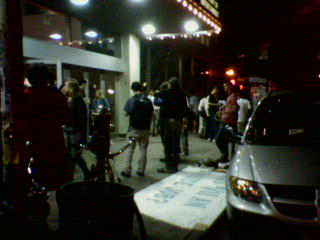

Cinecultist's thoughts in May on the Disney distribution controversy. IndieWIRE's coverage of the release.
Cinecultist had one particularly fussy and uptight Lit prof in undergrad who used to make us identify the stressed and unstressed syllables in iambic pentameter and had this to say about literary criticism — "some books ARE up for discussion, but some books are just GOOD and some just BAD and there's NO room for discussion." Insert "movies" for "books" and you'll understand why CC had to literally yell at the newspaper after reading ol' A.O.'s review of The Terminal in the Times this weekend and then at the computer upon reading Charlie Suisman of the beloved MUG's praise of it. The Terminal = BAD. Maybe Scott is blind? And we should know, because like AMD we actually went to go see it on Saturday afternoon.
[Ed. Note — Excuse CC while we continue to use the all caps key in this here review but apparently, the memo did not get to Steven and thus the need to shout.] Firstly) airport security, the homeland department and the fact that our country works so damn hard to keep people out ARE NOT funny. Secondly) the ubiquity of corporations and America's equation of consumerism equal a national past time ARE NOT funny. Thirdly) Tom Hanks's utterly ham fisted accent IS NOT funny. The only thing really funny in this movie — and when we say "funny" we really mean "perplexing" — is the complete disregard for anything resembling realistic causality, continuity or the way the world actually works in this picture.
What so rankles CC then about Scott's review is the way he characterizes the film's glossing of any disturbing aspect into clichéd comedy types as admirable in these troubled times. He describes what passes for the plot as "...a mess of runny egg yolks and artificial sweeteners that Mr. Spielberg has somehow cooked into a light and pleasing soufflé." Our faithful readers know that CC likes escapism in our movies perhaps even more than the usual viewer but there's no credible attempt made by the movie to be either a complete fairy tale or a comedy about the realities of our global culture. The Terminal is merely "real" when it suits and less so when it doesn't. It's lazy filmmaking.
In addition to Aaron of Out of Focus's well thought out questions to the causality of the film, here are a few of CC's that particularly bugged.
• How can you have a listing of flight destination be Frankfurt, Berlin and then Krakozhia? That's like saying next stop, Iowa. You fly to Des Moines, not Iowa. Couldn't they think of a fictional capitol city for this lame-ass named fictional Eastern European country?
• Why doesn't some New Yorker kick Victor Navorski's ass when he steps out of the Terminal finally and hails a cab? Doesn't everyone know JFK is all about the militant taxi queues?
• Homeland security provides Navorski with a PAGER to get in touch with him if they need to, but not a HOTEL ROOM? Or any of his own Krakozhian money changed into CASH? But they leave him inside what is essentially a crowded MALL to shop for 9 odd months?
• How does Navorski acquire all of the materials to build his romantic gesture in the airport? Is there a ACE HARDWARE next to the Discovery store and the Hugo Boss in that place?
For even more snark on The Terminal, leave it to the Cinetrix and TMFTML to provide. (Are there bees in the room? No wait, that's just the blogosphere.) Cinecultist's previous thoughts on the corporate branding in the film.
Somehow in Cinecultist's humidity addled mind, we've deemed our Summer Schedule Fridays (done with the Day Job at 3 pm, baby!) a free pass to go see complete crap at the cineplex. Something about the convergence of drawing that salary, having 3 plus hours to kill and a need to sit in air conditioning while drinking smuggled in ice coffees which allows for complete indulgence. This week's installment featured burly Vin Diesel in the Chronicles of Riddick, his follow up to the star-making role in 2001's sci-fier Pitch Black. Much has been snarked about in the film media regarding Diesel's expanding ego and his unlikely costarring with Dame Judi Dench in Riddick, but Cinecultist found ourselves instead thinking much more during the screening about the Aliens connection.
When Cinecultist watches sci-fi or horror films, it's hard not to always be thinking of Aliens — but also Blade Runner and to a certain extent Star Wars — because with the bar set by these films, their aesthetic and themes in some way or another seem to be borrowed by nearly every other picture in these respective genres. But Aliens has also been on the CC brain lately too because we watched The Thing with our movie group a week or so ago which has a strikingly similar plot about a parasitic alien thing which invades a group and takes it over as well as the previews coming down the pike for Alien vs Predator. Conveniently enough, an edited version of Aliens was also playing this weekend on TNT, so CC watched it again and started having a Ripley versus Riddick face off in our head. Here's how the stand-off progressed:
Both Ripley and Riddick are bad-asses softened by a maternal devotion for a grimy young girl with piercing eyes and an oddly masculine name. Where Ripley is the voice of caution and at times a Cassandra of doom, Riddick's all about the fearless rush into danger and a disregard for being out-numbered because he's confident he can whomp anything that comes into his path. Both have a lair to infiltrate to save the girl, both must battle one on one with an evil parental figure who is birthing minions, and CC doesn't think we're giving anything away to tell you both end the film exhausted but triumphant.
Perhaps the connection in CC's mind between the two films also occurs because of their ability to be read with a cultural subtext. Aliens starts to get really interesting when viewed through its feminism (Vasquez as the ultimate lesbian, the Alien's a bitch, etc.), while the Chronicles of Riddick and Pitch Black take on a different cast when read through their relation to race. Following his shades of slave monologue in the first film, Riddick is told by some bounty hunters who capture him that he's "back of the bus" and discovers later in the film, his race has been systematically wiped out following a Macbeth-ish prophecy.
And speaking of Macbeth, Thandie Newton makes for a brilliant Lady Macbeth, at least that's what her character really should be called as she uses sexual heat and conniving to get her way. The two favorite scenes in CC's screening: the moment when Newton parades out in a smokin' bustier dress and Riddick's saving of Jack by Tarzan bungee cord from a blast of 700 degree sunlight. Don't ask, it's too complicated to explain. Certainly, Riddick's plot is nearly as unnecessarily baroque as the interior decorating in the Necromancer's space ship but there's something much too intriguing about it for CC's part to dismiss as pure summer fluff.
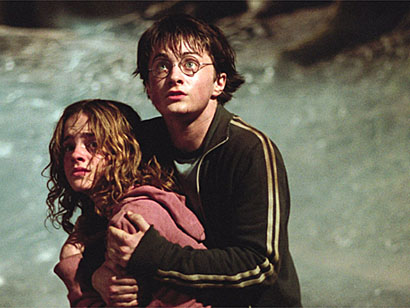
Towards the end of last week, Cinecultist discovered our not particularly movie savvy boss at the Day Job had already seen Harry Potter and the Prisoner of Azkaban twice, when we hadn't even seen it once yet. This was something CC remedied post haste, but as soon as we walked out of the theater after the two hours, CC wanted to duck into another one just to see Daniel Radcliffe et al do it all over again. When a artistic product is set up from the outset as a serial — whether it be novels, movie sequels or even 69 Love Songs on 3 CD volumes — it is difficult to expect them to maintain or even build upon the quality of an original. What a relief then to see Harry Potter the movies following in the legacy of Harry Potter the novels in a progression of complexity and sophistication.
It's pretty easy to allow a review of Azkaban lapse into pot shots at Chris Columbus, and lord knows there are times when his treacly direction of the first two pictures deserved it. However! It is not just the take over by Alfonso Cuaron (he of the artsy threesome, Y Tu Mama Tambien) which results in such a splendid installment. Rather, it's the freedom allowed to all of the filmmakers, we're talking everyone from the title designers to the CGI geeks, to not produce a slavish 3 hour adaptation of the novel but a separate cinematic universe which strives to capture the tone as well as the details of the beloved books. It also wouldn't be a Harry Potter movie without the best supporting cast in all of the realm of Britainnia. David Thewlis, Gary Oldman and Alan Rickman all on screen at once? Now that's a threesome Cinecultist can really get excited about. Even John Williams' score sounds less like a amusement park ride theme song and more like a mood setting device. Kudos to all involved, Azkaban is a film Potter fanatics can be proud to call their own.
 Hopefully Cinecultist isn't going to encounter any lightening bolts today after posting the above headline alluding to a connection between certain deities and the pop princess. God forbid, though she did act in The Best Movie of The Year. It's just that her gleefully evil performance in Saved! — along with all of the other top young actors contributing to this stellar cast — makes CC want to flout any religious propriety we might have previously held.
Hopefully Cinecultist isn't going to encounter any lightening bolts today after posting the above headline alluding to a connection between certain deities and the pop princess. God forbid, though she did act in The Best Movie of The Year. It's just that her gleefully evil performance in Saved! — along with all of the other top young actors contributing to this stellar cast — makes CC want to flout any religious propriety we might have previously held.
We caught a screening last last weekend* with the dear Jose, recently released from his scholastic indentured servitude for the season and our favorite co-pilot for all teenage level cinematic detritus. This is our second Jena Malone picture we've seen together, after both enjoying The Dangerous Lives of Alter Boys, and we're also both big fans of Patrick Fugit's work thus far (Jose likes Spun and CC's a Almost Famous fan), so needless to say we were psyched. CC only mentions this pre-viewing internal hype because as is a proven fact, internal hype over a particular film can only lead to heartbreak and disappointment. Fortunately, that didn't happen here with Saved. There's not a weak member of the cast, the soundtrack is pop-y fun and the story dramatic enough to hold together the string of teen vignettes.
Apparently, there's been a criticisms by Armond White in the Press and others, that Saved is not irreligious enough and purely unpoliticized pop drivel. However, Cinecultist would argue that Saved represents that teenage awakening of consciousness, one where someone as religious as the main character Mary (Malone) comes to terms with her relationship to God through her unplanned pregnancy in a subtle way, that's neither pro nor con the Christian faith. To make a movie like this, filled with born again characters we're supposed to identify with and enjoy, would then be completely counter productive to vilify or satirize them to a degree that White appears to expect. Rather the redemption of their beliefs, or at least the softening of their exclusion of natural teenage alienation at the movie's end, makes for a more complex film which can be thought-provoking to those inside and out of the WWJD? fold.
*An aside, sorry for the quietness in regards to movie chatter around last weekend, your truly was in Nor Cal for a family funeral. But now we're back and chattier than ever. Promise!
There are certain things which without fail turn Cinecultist into a blubbering sap. Even the hint of a death of a sibling in the movie's narrative is enough to send us straight for the hanky. For this, and a few other acting related reason, we didn't find Kate Hudson's newest, Raising Helen as terrible as we expected. Though that's hardly a ringing recommendation, CC thinks Gary Marshall and his manipulating, back-sliding feminism ilk should take the compliments where they can get them.
[An aside to the newly returned Uncle Grambo, as a big ol' Liz fan have you been keeping track of the number of films tracks from Liz Phair's most recent album, particularly "Extraordinary" the theme on RH's website, have ended up in film soundtracks this year? Is it a million zillion like CC suspects? A rough number would be interesting to see.] What saves this movie from the bottom of the Gigli slush heap are performance by a couple of character actors in the ensemble who understand what it means to actually create a character on screen. Though it's already an established fact that she enhances anything she graces with her presence, Joan Cusack as the uptight super mom sister to Kate Hudson's free-wheeling Helen actually elicits some real moments of tender pathos as she comes to terms with the death of their other sister. In addition, John Corbett has some pretty strong touching but comedic moments as well as the sensitive AND sexy Pastor Dan, though CC has wanted to write him off as a rom com actor after his involvement in the Big Fat Greek Waste of Time (highest grossing rom com ever, how it burns CC). And who can't appreciate a little Hector Elizondo every now and again? CC certainly can.
Back in April, during our review of Jennifer Garner in 13 Going On 30, we made the assertion that Katie H had more of the makings of a rom com star than Jennie G, and now seems like an opportune moment to assess that statement further. Kate certainly has the non-threatening sexually yet covetable physical form ala Meg Ryan down pat. She looks good in fancy clothing but she's not vavavoom, check. She sells the chemistry with her lead pretty well and she seems into the prat falls, but then again there's lots of chicks on the scene who can do this passably. Really the moment CC liked her the best in the whole movie is during a scene at the used car lot where she sells a mint green Lincoln to a Queens lothario — she appeared to be channeling her mother. Goldie Hawn has an ability to channel her sexiness into a power which charms her co-stars and her audience. In an instant, Kate had that power too and it was awesome to watch. Keep that up, and the kid might have a real career in Hollywood.
Cinecultist's reaction to the Cannes Film Festival scheduled screening/"psyche! no screening, yet" of Wong Kar Wai's 2046: What the hell, dude? Did it screen? Is it totally awesome? A. O. Scott in the NY Times today says, yeah and it rocked. But clicking over to IndieWire's correspondent Eugene Hernandez, it appears the film has been rescheduled to Friday. And today's Friday right? Would the time difference or some sort of wrinkle in the space time continuum allow Scott to see the picture and then file his story for publication on the web this morning? We suppose if it was very early Friday, as IndieWire reported Thursday it will be. But all of this waiting and delaying has put CC in a kerfuffle. Don't forget, you still can see some previous Wong Kar Wai pictures at BAM through this weekend, if like Cinecultist you're in a bit of 2046 tizzy.
In honor of this being Cinecultist's 401th post on this site, we bring you a quote from Jonathan Rosenaum's book Placing Movies: The Practice of Film Criticism, a birthday gift from our friends John and Adriane which we've just started reading and really like. Concluding a section where he details his at times rocky relations with other critics like Annette Michelson, Pauline Kael and finally Andrew Sarris, he writes:
"In recent years, I should add, he's been friendly. This paragraph, of course, may conceivably lead him to cut me again, but I should stress that I'm less interested here in settling old scores—or opening old sores—than in revealing to disinterested students the prices that have to be paid sometimes for speaking one's mind in print, especially when it concerns critics in the New York area."
Maybe that's what Cinecultist needs to do to boost up the traffic on this site, a bloody public throw down with anther critic. Take that AMD! Want a piece of CC, Doug French? Karate chop to the neck Michael Koresky! Just kidding guys, we're all still buddies and partners in crime in trying to rock the NYC critical establishment. Kisses!
Cinecultist is a firm believer that despite the technological advances and conveniences of watching movies on DVD, if you can get a chance to see a movie on film on a big screen, you should. Rereleases and reperatory runs of older films are the bread and butter of being a cinecultist, and fortunately for CC New York is awash with this kind of fare. Last weekend, CC caught a screening of Monty Python's The Life of Brian (1979) at the Landmark Sunshine theater on Houston. While Brian isn't the type of movie that needs the scope of a large screen to revel in its photography, it surely benefits from the collective experience of being in an audience. And it's goofy and fun to be walking down the street afterwards and encounter other people humming the final song as though they were turn of the millenium martyrs nailed to the cross with Brian.
Cinecultist really thinks much would have been enhanced in Wolfgang Peterson's newest extravaganza with an Oklahoma!-style punctuation — Troy! Anything really to distract CC from the fact that this Greek epic runs over 2 and a half hours long. That's just unnecessary for an action spectacle, surely they could've cut some of the superfluous Brad Pitt bare ass shots? It seemed like every few minutes there he was, cheeks bare to the Mediterranean air. Not that we're leveling this as a criticism of the film per se, but just that it added to the over long quality of the picture. Summer action extravaganzas with big stars and lavish sets should keep it short and sweet in Cinecultist's point of view.
Mostly Troy wants to be earnest in it's over the top delivery, in the tradition of the '50s ancient world costume epics. There's no Clash of the Titans-style cheesy gods and godesses on high, just enormous set piece scenes, scads of extras and elaborate Greek armor filling every frame. In fact, all discussion of the Greeks religious convictions sounds like a monotheist editor got in there to sprinkle seeds of Judeo-Christian doubt. Achilles (Pitt) knocks the head off of the statue of Apollo in Troy and everyone wonders why he's not struck down instantly by a lightening bolt or whatnot. But despite these anachronistic details, the film has no problem sticking with what it must think is period dialogue. A ridiculous example: when furious Achilles insults the hated king Aggamemnon (a growling Brian Cox) by calling him "a wine sack." As in, "you wine sack!" Because that's what all the kids on the Sparta playground are saying to each other these days when the teachers aren't around.
We'd sort of been putting off mentioning it this week but Cinecultist watched New York Minute, the Olsen sisters/girls/starlets (since they don't want to be referred to as "the twins" anymore) theatrical release last Friday. Picture it — Cinecultist and about 35 to 40 under 15 year old girls watching a Mary-Kate and Ashley movie in the Eee Vee. The amount of plastic, pseudo-'80s Urban Outfitters-esque accessories peppering the audience was staggering. One girl, looking to be about 12 was wearing a Spence t-shirt. Yup, it was that kind of evening, filled with squealing and giggling and gushing every time Jared Padalecki came onto the screen.
Here's where this movie won Cinecultist over — when Andy Richter doing a bad Chinese accent pulls out nunchucks and starts kung fu fighting one of the Olsens on a subway platform Matrix style. So bizarre and sorta brilliant. This is not to say that much of the film didn't try our teenie-bopper cheese tolerance. Mary-Kate and Ashley have this "acting" technique wherein the look really wide eyed to give the semblance of emoting. It's very disconcerting. However! They are kind of cute in a way similar to those Japanese electronic pets from the early nineties where you had to feed them on the hour by pushing buttons or else they would die. It's a novelty act difficult to look away from but all in all not very satisfying or probably very lasting.
Twin-ish Remainders: Ultragrrrl (aka UltraOlsen) recommends drinking while watching this picture, check out her rules on the May 7 posting. Amy Benfer wrote this wonderful article on the Sweet Valley High books and our collective fascination with twins for the Believer last December.
There was a brief moment, we think it was 1993, wherein Cinecultist was a vegetarian for six weeks. Some might think our briefly adopted vegetarianism was just a further extension of our childhood eating designation "picky," but at the time CC honestly wanted to try on this lifestyle to see if it fit. In the end the lure of grilled chicken, and a few years later Seattle's Two Bells hamburgers, led us back to meat eating but the impulse to examine your eating choices, as filmmaker Morgan Spurlock does in his new movie, Super Size Me, makes sense to CC.
Cast in the mold of a Michael Moore documentary, though with less bitter and more funny, Spurlock brings his downtown New York liberal, anti-corporation, living with a vegan chef point of view to the question of America's growing obesity. Inspired by the lawsuits filed against McDonald's by a pair of severely overweight girls, Spurlock's shtick is to undertake a 30 day all McDonald's diet all to the service of exploring the detriment our fast food laden diets take on our health. In particular, Spurlock's concerned by this trend for children and spends quite a bit of screen time showing how McDonald's markets to kids and how most school lunches are also influenced by corporate interest.
What scared and grossed out Cinecultist the most in all of this — not the second day vomiting from just eating a super size Big Mac meal — was how unprepared his team of three doctors were for Spurlock's rapid health deterioration. No one seemed to anticipate that eating like this would "turn his liver to paté" in a matter of weeks, but it does. Also, CC wasn't aware that New York had so many McDonalds' for such a small island. Super Size Me made Cinecultist linger even longer than usual in the produce aisle during this week's grocery trip. That bag of spinach salad never looked so good.
Remainders:
• Morgan is blogging about the release of his film Super Size Me and his current press junket through IndieWire.
• Thanks to our Canadian reader Jeremy (Victoria, B.C. no less) for pointing out this article in Sunday's Los Angeles Times about the coming summer's trend for more "adult fare" after last summer's onslaught of caffeinated sequels. Just as long as we don't have to sit through League of Extraodinary Gentlemen again, Cinecultist will be fine.
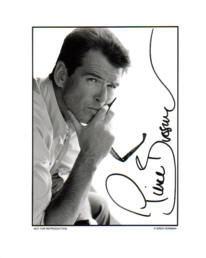 As Cinecultist searched the web today to post an image to accompany our thoughts on Laws of Attraction, the lawyers rom com with Pierce Brosnan and Julianne Moore we caught last weekend, we found ourselves drawn to pics not of the two stars but to ones just of Pierce. And we like the Julianne, but Pierce — zowie. Swoon-worthy. Hunk-alicious. Bring over some of that devil-may-care attitude to Cinecultist, baby. And the movie's not have bad either, by the way.
As Cinecultist searched the web today to post an image to accompany our thoughts on Laws of Attraction, the lawyers rom com with Pierce Brosnan and Julianne Moore we caught last weekend, we found ourselves drawn to pics not of the two stars but to ones just of Pierce. And we like the Julianne, but Pierce — zowie. Swoon-worthy. Hunk-alicious. Bring over some of that devil-may-care attitude to Cinecultist, baby. And the movie's not have bad either, by the way.
The premise of this Hepburn-Tracy style farce is that Brosnan and Moore find themselves squaring off as high powered New York divorce attorneys for various opposing clients as their own attraction to each other grows. Then in a night of drunken revelry in a tiny Irish town, as you do, they get married. As is customary for more and more current rom coms, the dramatic pull of this narrative is that the guy wants to commit but the girl can't because of that darn feminist chip on her shoulder. She must learn to love, folks, rather than focus so much on her pesky career and independence. It's totally retrograde to posit that Julianne would be a schoolmarm of a woman with this successful career, but who cares when you have Pierce looking this good? All thoughts of legitimate film criticism have flown out the window for Cinecultist on this movie. That accent, that twinkly eyed look, the ease with which he removes his shirt... Enough!
Perhaps this is some sort of conspiracy on the part of Hollywood to keep us questioning critics from getting to thoughtful but parading your Pierces or Keira Knightleys before us? Just a thought.
With such a gorgeous weather weekend for New York, Cinecultist spent part of it outdoors slathered in sunscreen (not to worry Daily Gusto!) and of course the other part indoors watching movies. One of the highlights of our viewing was the Tina Fey scripted/Lindsay Lohan starring teen chick movie, Mean Girls. Knowing full well that any sort of movie about girls in high school is going to be automatically compared to Heathers and parts of the John Hughes oeuvre, Mean Girls embraces this history rather than merely spoofing it. It also goes in two unique directions for a teen film which Cinecultist can't help but respect — allowing its main character to become unlikeable and twisting the expected heart warming speechifying with a dark denoument.
Like some other people we know, Cinecultist lurves Saturday Night Live head writer Tina Fey. She's so smart and sassy, you can't help but admire her wit. And the fact that she optioned a nonfiction book before its release to base this script on. Smart. Fey took the observations from Rosalind Wiseman's Queen Bees and Wannabes: Helping Your Daughter Survive Cliques, Gossip, Boyfriends, and Other Realities of Adolescence as well as her own to craft her knowing script. Without giving away some of the best lines because they're best enjoyed without expecting them, the script is filled with one off barbs that sound straight out of a SNL Fey written script. The casting is also reminiscient of SNL with Amy Poehler, Ana Gasteyer and Tim Meadows making appearances along with Fey herself as the bitter but inspiring math teacher. But even this tiny decision on the part of the filmmakersis is great, when it could have been lame, as each of these actors have real roles to play rather than just being familiar face cameos. See what we're saying? Smart.
Promotional Website for Mean Girls Remainder — our horoscope as read by a mean girl guessing by the tone: "Taurus you are really starting to bore me. All these 'deep' feelings you are having are making you a real drag. Just because you got dumped last month doesn't mean anyone cares this month. I don't know, I'd say go to the mall and binge shop but more clothes at the discount stores isn't going to cut it. Oh well. Better luck soon."
 It really shouldn't surprise any regular readers of this space that Cinecultist caught a matinee last weekend of the new bit of Jennifer Garner fluff, 13 Going On 30. It has all the hallmarks necessary to peak CC's interest — New York setting, cute girls, cute boys, cute clothes and reference to the publishing industry. (Play a "fun" game with yourself -- try to name as many film or tv titles that have that premise. Lots and lots, right?) We liked the film well enough, but only a few days later we're hard pressed to really recall anything memorable about it.
It really shouldn't surprise any regular readers of this space that Cinecultist caught a matinee last weekend of the new bit of Jennifer Garner fluff, 13 Going On 30. It has all the hallmarks necessary to peak CC's interest — New York setting, cute girls, cute boys, cute clothes and reference to the publishing industry. (Play a "fun" game with yourself -- try to name as many film or tv titles that have that premise. Lots and lots, right?) We liked the film well enough, but only a few days later we're hard pressed to really recall anything memorable about it.
Except that some of the outfits they put Jennifer Garner into are just so beyond hideous, we can hardly stand it. We found this gem of an ensemble to show you at the right, but really this isn't the worst offender. This is an attempt at Patricia Field chic at it's most perplexing. With this much money supposedly at her disposal, why would a someday soon high level fashion (because see, she thinks she's 13 even though she looks 30) pick all of these hairy sweaters and necklaces made of roses? Cinecultist did appreciate though the soundtrack editors and their excellent choices of signature '80s hits. Kudos on getting the rights to "Thriller" and Pat Benatar's "Love Is A Battlefield," their inclusion really makes the scenes they appear in.
The question of course though on everyone's mind is — Jennifer Garner: the next big Rom Com star? Cinecultist will say this for Jen G., girl's got spunk. She attacks this role and takes no prisoners. But her intensity for comedy (insert wide eyes and concentrated prat fall), isn't too much different from what she displays every week in her intensity for action or drama on Alias. We admire this work ethic, but work ethic isn't really what's wanted for stardom. America like our stars effortless and of the toothy grin. Will Jen G.'s sweet dimples stand in for this Julia or Meg ease? CC thinks Kate Hudson will become a big Rom Com star before Jen, unfortunately.
 Though Cinecultist would never really suggest a life free of movie publicity and journalism consumption, there are times where going into a picture with no expectations can be so delightful. On Sunday, CC thought we'd see one of the two Asian films playing at our neighborhood Landmark Sunshine theater and in the toss up between Shaolin Soccer and Twillight Samurai, we randomly decided on Twillight. What a wonderful discovery this picture is; filled with touching performances, gentle humor, gorgeous camera work, thrilling fight scenes and a daughter's dedication to a father that made CC a little weepy as the credits rolled. And CC's not one of those at the drop of the hat movie criers either.
Though Cinecultist would never really suggest a life free of movie publicity and journalism consumption, there are times where going into a picture with no expectations can be so delightful. On Sunday, CC thought we'd see one of the two Asian films playing at our neighborhood Landmark Sunshine theater and in the toss up between Shaolin Soccer and Twillight Samurai, we randomly decided on Twillight. What a wonderful discovery this picture is; filled with touching performances, gentle humor, gorgeous camera work, thrilling fight scenes and a daughter's dedication to a father that made CC a little weepy as the credits rolled. And CC's not one of those at the drop of the hat movie criers either.
Japan's official nomination for the foreign language Oscar last year, Tasogare Seibei was originally released in 2002 and actually is available on DVD already but is now getting a theatrical distribution by Empire Pictures. The story of a samurai set during the period in Japan's history just before the dissolution of this political institution, Seibei Iguchi's wife has just died and now finds himself responsible for his infirm mother, two young daughters, and a farming household while also fulfilling his duties as a low level civil servant. While there are two wonderfully dramatic sword fight scenes in the film, most of the plot focuses on the strictures Iguchi experiences as a samurai low on the totem pole in his clan's ranking.
Imagine Jane Austen meets Akira Kurosawa and you can get a sense of the film's rhythms and preoccupations. The director Yoji Yamada captures that Kurosawa drum beat necessary for the long walk to the moment of duty, but he also has a grasp of the deft touch needed for an intimate drawing room drama. Some might not think the two traditions could meld well together, but for a fan like Cinecultist who always thought Pride and Prejudice could have done with a little ass-whomping, it's a match made in heaven.
NYU Remainder Quote of the Day from a Times article about a writing student who has been living in Bobst Library: "N.Y.U. doesn't attract just smart students, it attracts smart, eclectic students," said Mr. Beckman, the university spokesman. "We had a film student who wanted to film a couple performing a live sex act in front of a class. We had students who set up a swimming pool in their dorm room. Now we have this fellow."
Damn him. Damn him all to hell, that Quentin Tarantino. Just when Cinecultist think we've got him figured, or at least our opinion about him, he goes and makes a movie which causes our cinephilic heart to soar on a wing. Yup, just when you thought you couldn't be surprised -- CC lurved Kill Bill, Vol. 2. *Argh* Foiled by that nefarious QT!
A few bits to love about killing Bill all over again:
• The cinematography. As the frame fills with the sweeping western vistas in the obvious style of John Ford and Sergio Leone, the pairing of these visual influences with Kill Bill's revenge story works so well together. The Bride's lanky silhouette stands watch over Budd's trailer -- awesome.
• Uma Thurman looks amazing. QT slavishly dotes on her and the final credit "based on the character the Bride by Q & U", brings their collaboration to a new level of symbiosis. It's easy to think of fruitful creative pairings between directors and their female muses (Godard/Karina, Von Sternberg/Dietrich, Bergman/Ullman, Rosellini/Bergman, etc) but as usual QT wants to take his use of Uma to a new level. He wants to insist that he's not using her but creating with her.
(Slightly negative) Sidebar: Uma is really best when she's not compelled to speak. Perhaps the most impressive eyeball emoting since Maria Falconetti in Dreyer's The Passion of Joan of Arc, Uma sort of grates when she's doing the monologues. Don't try to out-David-Carradine David Carradine, hon. It's not possible. As mentioned in the dialogue, he is sort of the Man.
• Not having to see the Pussy Wagon on screen again, even though we hear mention of it. That joke was tired, QT.
• The final credit sequence (that rolls for 15 years, but whatever). So old school and so beautiful, in the vein of Todd Haynes and Steven Spielberg's amazing credit sequences from Far From Heaven and Catch Me If You Can, respectively.
• Gordon Liu. Those eyebrows are freakin' amazing.
• Punching your hand through wood. In Cinecultist's next life as an ass kicking assassin we're totally going to be able to do that.
 Independent American young women depicted in movies have it tough these days. We're encouraged to long for a handsome price to come sweep us away but also expected to insist upon our careers. Since when can't one put "Princess" on one's business card? It's already on Cinecultist's, the crown Princess of the Eee Vee; but for Julia Stiles in The Prince and Me, it's not enough to be whisked onto a horse in the midst of a Copenhagen parade by Luke Mably, she needs to be a doctor too.
Independent American young women depicted in movies have it tough these days. We're encouraged to long for a handsome price to come sweep us away but also expected to insist upon our careers. Since when can't one put "Princess" on one's business card? It's already on Cinecultist's, the crown Princess of the Eee Vee; but for Julia Stiles in The Prince and Me, it's not enough to be whisked onto a horse in the midst of a Copenhagen parade by Luke Mably, she needs to be a doctor too.
CC has realized our favorite love stories begin with the two people hating each others guts, and that's the appealing structure used by Prince. He's a secret playboy prince come to Wisconsin for the coeds who flirts with the pre-med farmer girl but keeps getting shot down. They're chemistry lab partners but he sleeps through an important experiment. He gets a job at her bar by using her name as a reference -- oooh, how she hates his hottness! But then they have a romantic moment over the meat slicer (seriously! who comes up with this stuff? and why can't CC be paid to do it?) and you know how it will go from there. Couture ball-gowns, picking out jewels with Miranda Richardson, crashing the opening of Parliament, a butterfly-adorned proposal, that sort of thing.
Honestly though, CC can mock this kind of movie because it's so damn easy, but we did get caught up in its narrative. Julia's character may be trying to have it all -- career and prince -- but then again so is the Cinecultist. We want to enjoy watching our crap romances and our high end art house flicks, after all. Next week, reviews of serious cinema, we promise.
Sunday evening, Cinecultist let curiosity get the best of us and attended as screening of Kevin Smith's Jersey Girl, as we'd promised on Friday. We've long been a fan of Smith's work; even when we haven't loved the entire film he's made CC appreciates his point of view and deft turn of phrase. Which left us wondering how the hell did our Kevin end up making this illogical, emotionally discordant and at times, just plain creepy picture.
Ben Affleck, an actor Smith calls his "proxy, a way better looking proxy," stars as Ollie, a widowed Manhattan publicist who gives up his glamorous life to raise his daughter in New Jersey. Major problem straight off though, is that Affleck has zero credibility as a father and less than zero father/daughter chemistry with the precocious Raquel Castro who plays Gertie. He's more like a strange uncle dropping in for a weekend to inappropriately flirt with the seven year old, than a man who's raised this baby on his own from birth. What's up with the scene where Ollie takes Gertie to Manhattan for the day, which ends in a handsome cab ride in Central Park and says he's only going on dates with her, not the pretty lady from the video store? It gave CC the icks.
At least this element of the plot sort of made sense -- Jersey Girl is a romance between a father and his daughter -- as opposed to practically every other continuity detail of the film. Smith appears to want us to suspend our disbelief for his narrative, an incredibly vast task, but the holes even troubled David Ansen in the following interview in Newsweek.
Ansen: He has to run because the road in town is blocked, and I couldn't help but ask myself, Well, how did all those other people get to the show? They weren't running! It's picky, I know. Smith: David, this is the part of your job that would be the most irritating to me if I were a critic. Sometimes you just have to kick back and suspend disbelief and not ask, How did they all get there? Ansen: But as you know, you're more inclined to do that when a movie is working for you. Smith: That's true. Ansen: And when you become disengaged from the movie, you start to see things. Smith: You start to take it apart. Look, at the end of the day I'm not an inventive or very creative filmmaker....I cannot reinvent the wheel. All I can do is add a spoke to an already existing wheel, and hopefully it's my spoke and it kind of stands out a little bit.
Our final beef with the film came from his use of Liv Tyler's character, the pretty video store lady/romantic interest Mya. Ollie and Mya meet cute when he tries to rent porn from her store and she puts him on the spot by asking to interview him for her graduate school paper on family men who watch adult videos. This leads to a lunchtime diner scene where the two have an extended dialogue about their masturbation frequency. CC thinks that Smith must encounter these lovely, quirky independent women in real life and just write down their dialogues verbatim to insert them in his scripts. Which is fine, except that he doesn't understand their motivation -- why would this gorgeous young girl talk masturbation in diner -- and thus gives the actors no context to act these lines from. Screwball for its own sake really leads to nothing concrete and the promise of Mya's character falls flat.
Cinecultist didn't want to overload our readers with Eternal Sunshine of the Spotless Mind postings, but we did see the film this past weekend after much build up. And we loved it, not to fear. All of the expectations were met and there were no lingering feelings of overrated buzz.
But what to say now about said lovely, luminous, melancholy film that either hasn't been said by other critics or doesn't seem like general consensus retread? (Other than of course, "run don't walk to the theater to see it.") We knew all along that we would love it, and that was based on the preview. It made CC bop in our seat. It made us happy to be at the movies. We hadn't felt this elated watching a few minutes of edited footage since first seeing the trailers for Rushmore and Lost in Translation. Sometimes a film speaks to you bout how you feel about your universe, that seems to take a part of your imagination perhaps you weren't even consciously aware of and puts it on the screen. Eternal Sunshine is one of these kind of movies and we're not sure we can think of a more thrilling film going experience.
Below we offer a non-IMdB Eternal Sunshine photo harvested from the web for your viewing pleasure.
Remainder: If you haven't been over to Daily Gusto in a while, you should check out their hot new redesign. And we're not just saying this as a former, and hopefully future, contributor -- Jennifer and Harry, the blogazine looks good on ya.
For some reason, Josh of Cultivated Stupidity found it imperative that Cinecultist watch Dawn of the Dead this weekend, despite our well-known aversion to the horror genre. We made plans to meet at Union Square for the 4:30pm showing on Saturday but a phenomenal amount of human congestion on the subway in SoHo (since when does the platform fill up between trains so that you can't move on a weekend afternoon?), resulted in a very late Cinecultist and a very pissed off Josh. After much shoving, waiting on line and other such Manhattan annoyances, we caught up with him finally in the balcony about 25 minutes into the picture. "What happened so far?" we whispered. "There are zombies. Now they are in a mall," Josh whispered back. And strangely, that was all we really needed from those missed first act moments to understand the plot of this formulaic and disappointing re-make.
We've said this before, but Cinecultist is very susceptible to the structures of suspense in movies. The music cuts out, the character on screen drops their guard or does something stupid like opening a door that clearly has zombies on the other side and CC can't help close the eyes and cover the ears. This does not make for an enjoyable movie watching experience, feeling compelled to look away when what we are there to do is watch. Dawn of the Dead is filled with these suspense-leading-to-total-ick moments with zombie babies, hay wire chain saws and bloated old lady zombies who get fire pokers through the head. Blech, entirely unnecessary. In addition as Josh pointed out, the film doesn't have a consistent mythology which really seemed to get in his craw. What makes you a zombie, the blood or the bite? Is the super-bleak final credit denouement really possible? Shouldn't Canadian indie queen Sarah Polley being in this movie automatically make it infinitely better than it was? Basically, if the goal of the afternoon was to convert CC to a finer appreciation of the pleasure of horror films, this was not the picture to try to do it. No funny, no witty just icky -- no thanks.
Cinecultist never could be a ballet dancer, the feet are much too leaden and the idea of only eating fish and salad sort of depresses us. But apparently former child television actress Neve Campbell always longed for pointe shoes and she has the chance to show off her considerable dancing talent in Robert Altman's newest, The Company. Starring the Joffrey Ballet of Chicago, as well as Malcolm McDowell and James Franco both in non-dancing roles, the film alternates between elaborately staged dance sequences and a fiction following a young dancer (Campbell) becoming a principal at the Joffrey.
This kind of story is perfect for Altman's pseudo-documentary style, as his camera sort of spies on the characters, pulling in closer for us to hear the juiciest gossip and then swooping away to follow other action occurring out of frame. There's also the requisite gentle mocking of the subject Altman is so obsessively following, but unlike in Pret A Porter where that ribbing deteriorates the fiction because the object is so ridiculous, in the Company the expectation that the bizarre ballet we've seen coming together will flop, is turned on its head by the beauty of the dancing despite those odd costumes and painted faces. Campbell brought the film's concept to Christine Vachon's Killer Films, created the story, worked on the script with writer Barbara Turner and stars in some of the most rigorous dances of the film -- begrudgingly Cinecultist may have to forget her obnoxious whine from "the Party of Five" and even shelve in our mind the insult that was Two to Tango in favor of respect for her co-authoring/creating of this film with Altman. Dammit, another seemingly rational blind judgment overturned!
[Not So Confidential to Peter Howell of the Toronto Star, an Altman movie indie 'nough for you? Just because CC is of the Eee Vee doesn't mean our taste has to be high fallutin'. We do the High and the Low -- and we are enjoying ourselves, thanks for noticing.]
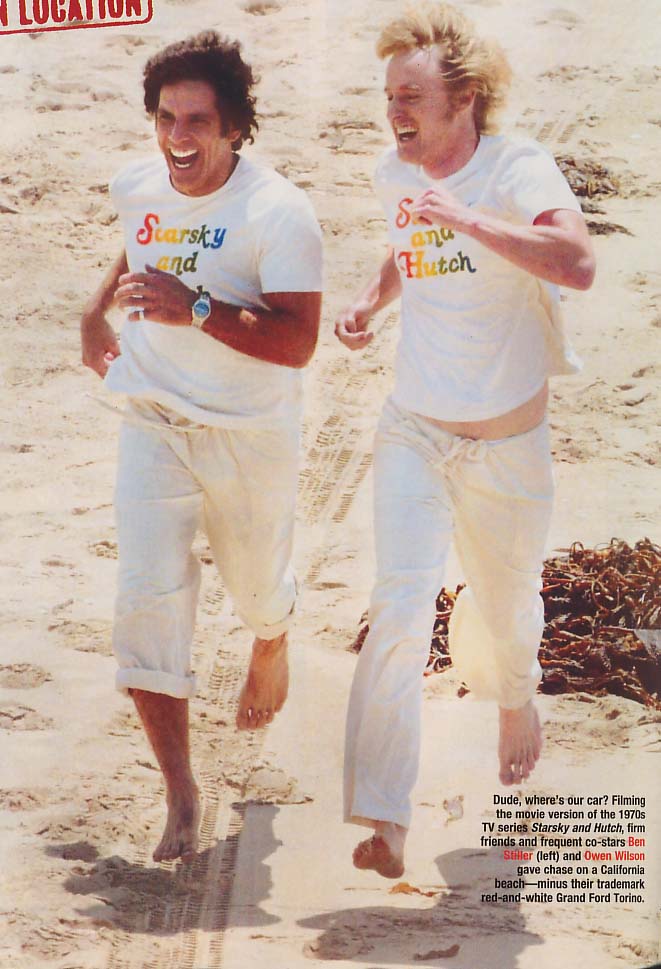 Men with perms. Barry Manilow on the soundtrack. Girls in terry cloth short shorts and knee high socks. Pimp-tastic suits all around. Is this all that is needed to make jokes about the cultural oddities of the '70s? According to the recently released movie version of Starsky and Hutch starring Owen Wilson and Ben Stiller, this should be enough to put us in stitches. But sadly, S&H is more of a funny movie in theory, rather than practice.
Men with perms. Barry Manilow on the soundtrack. Girls in terry cloth short shorts and knee high socks. Pimp-tastic suits all around. Is this all that is needed to make jokes about the cultural oddities of the '70s? According to the recently released movie version of Starsky and Hutch starring Owen Wilson and Ben Stiller, this should be enough to put us in stitches. But sadly, S&H is more of a funny movie in theory, rather than practice.
When CC first heard that Wilson and Stiller were going to be in a movie version of the popular buddy cop show, the first question which popped into our head was, "Do we really need a Starsky and Hutch movie?" But to see the comedians dressed in their tough guy garb walking down an alley in slo-mo, the connection makes sense. However just because it seems like a good premise, doesn't mean that the filmmakers will execute it into a compelling full length feature. Even though it never was a SNL sketch, that's sort of what these two hours feel like, a comic sketch stretched to its limit. All of this is not to say that there aren't elements to like -- Stiller and Wilson's undeniable buddy chemistry, Vince Vaughn's bat mitzvah throwing bad guy, and Snoop Dogg in general. Now talk about star presence, that Dogg has it in spades. But in general, CC only had a few audible chuckles through the whole thing, and that's not a good sign.
Ranting aside : What's up with IMdB.com lately? The flash movie previews, the rerouting from the page requested to a full page ad for an HBO movie, are so very annoying. There's commercials for a captive audience and then there's overkill. Time to look for another movie info resource...
After a long week at The Day Job, Cinecultist was in serious need of some cinematic silliness and thus Friday night took in a screening of Dirty Dancing: Havana Nights with our friend Lisa. After seeing The Best Movie of 2004 with Lis a month or so ago, it was hard to imagine we could enjoy Havana Nights as much as Chasing Liberty, (and when we say "enjoy," we mean "laugh our asses off at") but we did. Between the appearance of Patrick Swayze, the smarmy good evilness of Jonathan Jackson (Lucky, son of Luke and Laura from Days of Our Lives!) and the oddly modern '50s Cuban pop music sung by Mya, this is a classic in the making. A classic train-wreck that is.
Romola Garai stars as Katie Miller, a do-gooder over achiever who moves to Cuba with her family right before THE CUBAN REVOLUTION (caps intended to convey the gravitas the movie tries to grant this political upheaval in the midst of dirty dancing in cute costumes). They move into a fancy hotel where she tries to blend in with the pool lounging richies but is more drawn to the street music and the sweaty delight of Diego Luna (the slightly less hot one from Y Tu Mama Tambien). The Swayzack makes his appearance as the phenomenally well-preserved dancing instructor in the hotel who teaches Katie to feel the music, and there is no moment when he's on screen that Cinecultist wasn't totally creeped out. The man has been bathing in formaldehyde and while he seemed to be knowingly mocking himself in Donnie Darko, here he's trying to play it straight. There's nothing like a former beef cake sex symbol swirling an awkward ingenue around the dance floor to induce the snickering.
And boy did the snickering spread through the audience as the film began to wind down to its inevitably tragic conclusion. Their love may be over, but they'll always have those Havana nights, etc etc. CC might like to think that it was our irony that rose the audience's consciousness but really the dialogue in the last 20 minutes is so horrid, it would make the most dedicated Dirty Dancing fan roll their eyes. Best moment during the screening? When a particularly cheesy and yet quiet moment enabled the entire theater to hear the audible *thwack* of Lisa smacking her head in disbelief. Havana Nights -- so best.
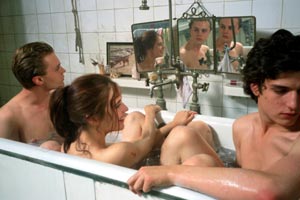 It's a tough thing to be friends with Cinecultist. Sure, you get to hob nob with the glamour and the wit swirls around like so much magical detritus but there's no mere "let's go to the movies." There's nothing so simple when you're friends with the Cinecultist. A simple movie date with CC? Forgetaboutit.
It's a tough thing to be friends with Cinecultist. Sure, you get to hob nob with the glamour and the wit swirls around like so much magical detritus but there's no mere "let's go to the movies." There's nothing so simple when you're friends with the Cinecultist. A simple movie date with CC? Forgetaboutit.
CC had been wanting to catch The Dreamers for awhile now and Sunday afternoon seemed like a good time, a really lovely spring day in the Eee Vee. But is a NC-17 movie about cinephilia and Paris in May '68 really the best thing to watch on a first date? Of course not. All of this absurdity aside, CC did enjoy the film if only from the love of cinema surging from Bertollucci's movie. The reconstruction of famous movie scenes and the quotation are meant with such devotion, the Cinecultist can't help but be touched by this fellow feeling for the movies. Eva Green does even have a touch of the Anna Karina to her (so obviously implied by the threesome allusions to Band of Outsiders), and we were tickled to see Jean-Pierre Leaud reconstructing his famous speech before the Cinematheque Francais inter-cut with footage of him as a young man. That playing with time and commentary on the process of historical reconstruction was quite interesting.
But there is the lingering feeling that this is a weird weird movie. The way the characters react to things, so accepting of their anti-social tendencies and sexual anomalies, is completely unsettling to the point of nervous laughter. It's not that anything they did on screen was so shocking, but that they had no awareness within the narrative that their romantic intricacies aren't the end all be all. There is a tinge of Romance to this film, the belief that all of this emotion is truly epic, that seems to be too sincere to be accepted.
Last week, Cinecultist caught a screening of Osama and then sat down with Doug French of Filmington.com via IM to discuss the Taliban, the camera as character and how CC is going to single-handedly make ankles the new cleavage. Following is the a reprint of our conversation, published yesterday on Filmington.
DOUG Welcome to Filmington’s Religious Zealotry Week! After all, what better way is there to kick off Lent than a back-to-back smack of man’s inhumanity to man, all in the name of devotion? We’ll get to THE PASSION OF THE CHRIST soon enough, but first we have OSAMA, an insider’s view of life under Taliban rule. And with us once again to discuss this Golden Globe winner is Cinecultist’s Karen Wilson.
KAREN I too thought of this film’s relation to Ash Wednesday with its fixation on sin and redemption. Watching it last week reminded me how happy I am to be a young Manhattan Jew who can enjoy working and doesn’t have to wear one of those olive green burkas. OSAMA is a beautiful and moving picture with thoughtful things to say about the state of women in the Middle East, but it’s not particularly upbeat or fun-loving.
DOUG Them Talibansters weren’t exactly a barrel of laughs. We’ve all read that the Taliban were a rare breed of religious hotheads who subjugated women to the point of nonexistence. But from OSAMA, written and directed by Afghan filmmaker Siddiq Barmak, we learn that a lot of this stricture comes from a deep fear of temptation. Sins of the flesh, and all that.
KAREN It’s interesting how the Taliban rhetoric, as depicted in the film, implies that women just can’t trust men to control themselves—which is why women must be covered and curtailed—and then shows that men are motivated by lust to do despicable things. One of the film’s most evocative shots is the close-up of a pair of a woman’s ankles as she rides the back of a bicycle. Her feet are so delicate in those utilitarian sandals, but just as we’re admiring them, she is told to cover them up to avoid arousing some passing man. OSAMA succeeds because it allows these moments to be visual and subtle, rather than purely melodramatic or histrionic, while still driving home that sense of injustice.
DOUG And that’s ingrained into us from the very beginning, as a brave troupe of women (still covered from head to toe in the desert heat) dares to protest their inability to work and is violently dispersed with hoses and gunfire. It’s a great motif, since the waves of sky-blue burkas offer the only color in an otherwise grim palette of gray, beige, and black.
KAREN The other thing I loved about that sequence is the way the camera becomes a character in the scene. How could we be glimpsing this dramatic moment as these women take to the street? Why, if there’s a foreign journalist with a VHS camera there, of course. It reminded me a bit of RUSSIAN ARK, in which the narrator becomes a character, as we later see the grave consequences of that foreigner watching the actions of the “holy” Taliban. Beautiful and scary, that’s what this movie is the whole way through.
DOUG ARK is a spot-on appropriate reference, since Barmak trained in Moscow. But I hope you mean “beautiful” in the stylistic sense. Because though OSAMA is delightfully unassuming in its blunt character portrayals, its settings are arid enough to make you feel like you’ve stuffed about a billion saltines in your mouth.
KAREN The camera work is very assured, and the women’s complete resignation to their lot in life based on their gender is quite depressing. But because even the thought of rebellion is so foreign to the women, OSAMA is not the sort of plucky feminist movie you might see Hollywood make (about a blonde female boxing promoter, say). The mother and grandmother must either disguise the daughter as a boy or starve. It’s not as though the girl longs to be a boy—in fact, she must be convinced every night to keep up with the charade. To be talked into having hope, now that’s a bleak life to be living.
DOUG The truly inspired turn is Barmak’s casting of Marina Golbahari, who has a fragile Natalie Portmanlike look about her, as the girl whose real name we never learn. (What would be the point?) Rather than fit in easily, she stands out as girlish and awkward, and worse still, she seems aware of it enough to look over her shoulder at every turn.
KAREN All the actors are fabulous in a Italian Neo-Realist “look at the diamond in the rough we just discovered!” sort of way. I wonder, though, how much of what they’re doing on screen is actually a performance, or just being lead by a skillful director to project what they already have experienced in their own lives.
DOUG Yeah. Maybe it’s an Afghan BEST IN SHOW. The you-are-there POV is enthralling, but about halfway into the charade I began to wonder if some of these plot escalations were a bit contrived. If gangs of boys are pestering her and saying she’s a girl (and the assertions are understandable, given her high voice and slapfighty defenses), why not check under the hood and be done with it?
KAREN You think those thugs are afraid of some ankle but will make some random little “boy” drop trou on the moment’s provocation? The audacity of what she does is obviously unusual, otherwise wouldn’t all of those protesting women also be impersonating men so they could work? There wasn’t any part of the plot that I found unbelievable, mostly because the injustice of the whole lifestyle is so jaw-droppingly horrific. I give this movie a resounding recommendation, though it’s not for the faint of heart or the easily upset. $10.25. I’d pay full NYC price for sure.
DOUG Healthy plaudits for a worthy film, but it ain’t worth Filmington’s first $10+ rating, in my view. I felt for “Osama,” especially as she navigated the genital-washing seminar from the old mullah/perv, but she remained oddly flat to me. I suppose that’s the point, since the real “Osama” was probably no one that special: just a girl who did what needed doing. It’s great enough that OSAMA was ever even made, and all the more gratifying that it was made so well.
KAREN OSAMA is the rare kind of movie experience that gives you an intimate look at a new universe and also makes you feel blessed to be only looking in from afar. I don’t think I could see it again soon, but like some of my favorite films from last year—such as LILYA 4EVER—OSAMA was very emotionally gripping. Maybe that’s why I appreciate movies that depict religious zealotry or injustice. I can look at the women in burkas without having to wear one myself.
DOUGOoh, yeah. Show us them ankles!
In case you were wondering what the best thing about being the Cinecultist is, it ain't the glamour, the fame or the formerly anonymous vacuous star-kins throwing their hot bods at us while we eat chicken. (That's how we're spinning our "relationship" with Michael Pitt right now, by the by. Until we get a cease and desist from his publicist or something. "Our client does not nor has he ever partook of greasy East Village chicken wings...") Oh no. It has to be constantly surprising our readers and friends with our phenomenally horrible and at the same time brilliant taste in movies. "But you're the Cinecultist!" we're told as we regale with the listener with sordid tales of our debauched weekend viewing. That's right, dammit, we are the Cinecultist -- and that means of course, that CC saw Adam Sandler and Drew Barrymore in 50 First Dates on Saturday. And we liked it.
Walking out of the theater, CC got to pondering what exactly constitutes the pleasure of an Adam Sandler film and decided it was auteurist in nature. Which may piss off those who've come here after googling "Jean-Luc Godard" and "Anthology Film Archives," but the Sandler product is really all about the continuity across a filmography and authorial point of view. His production company is called Happy Madison (an amalgamation of two of his first film titles), he re-uses the same actors in his films (in particular his re-teaming here with Barrymore after the Wedding Singer) and even visual references to previous work, such as a golf ball to the noggin sequence. Also, like the Farrelly brothers when they succeed, Sandler's work has an unexpected sweetness amidst the Rob Schneider in a coconut bra jokes. He's a guy's guy who cracks up at projectile walrus vomit but he also deems the construction of an extended family a true happy ending.
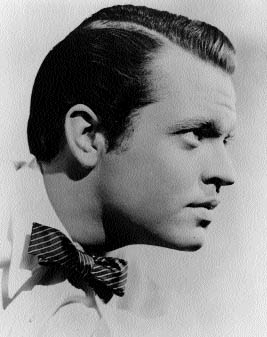 To kick off the two month long Orson Welles series at Film Forum, they've been screening the Magnificient Ambersons (until Feb 29) and if you've yet to be acquainted with this cinematic forerunner this is a good place to start. Actor, director, screenwriter, playwright, radio announcer, impresario and dare we even say it, pretty damn hunky when he wasn't making himself look old and fat with makeup, Orson inspires serious devotion from serious film people. When you learn a bit of Orson's biography and see the half-finished projects which litter his filmography, it would be easy to pigeon hole him as a genius who sabotaged himself more often than not. But CC is letting this judgmental attitude go for this series at the request of our many Orson fanatic friends, and is just going to sit there accepting what artistic beauty is on the screen. Highlights to come include Touch of Evil (March 12, 13, 14), the Lady from Shanghai (March 19 - 22), It's All True (March 24) and culminating with the Third Man (April 9 - 15).
To kick off the two month long Orson Welles series at Film Forum, they've been screening the Magnificient Ambersons (until Feb 29) and if you've yet to be acquainted with this cinematic forerunner this is a good place to start. Actor, director, screenwriter, playwright, radio announcer, impresario and dare we even say it, pretty damn hunky when he wasn't making himself look old and fat with makeup, Orson inspires serious devotion from serious film people. When you learn a bit of Orson's biography and see the half-finished projects which litter his filmography, it would be easy to pigeon hole him as a genius who sabotaged himself more often than not. But CC is letting this judgmental attitude go for this series at the request of our many Orson fanatic friends, and is just going to sit there accepting what artistic beauty is on the screen. Highlights to come include Touch of Evil (March 12, 13, 14), the Lady from Shanghai (March 19 - 22), It's All True (March 24) and culminating with the Third Man (April 9 - 15).
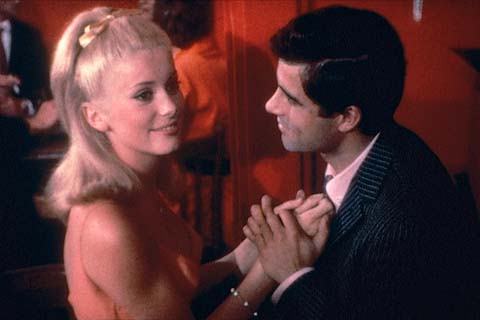
Melancholy and joyous simultaneously, a movie that just makes CC feel buoyant walking home from the theater is an apt thing to see as the weather begins to warm. We caught one of the last screenings for the week at Film Forum of Jacques Demy's the Umbrellas of Cherbourg or as the French have it, Les Parapluies de Cherbourg. Even the French word for umbrella makes CC grin -- parapluie, trying to say it aloud will make your day. But at the same time, when the fresh faced Catherine Deneuve looks into the camera, her face smeared with tears for her mechanic boyfriend off at the army, your heart can't help but break.
Although, CC will admit that not everyone in the theater seemed to be caught up in what seems like the story's obvious poignancy. CC and friend Stephanie ended up behind a group of enthusiastic girls who joyfully squirmed as the credits began but giggled mockingly as the melodrama unspooled. Is our generation too ironic, too meta now to appreciate with a straight face this operatic-style love story? We can understand it can be difficult to take a movie world seriously where the walls are electric green but how can you not be swept along by the strains of Michel Legrand's amazing score? Just hearing a few of the notes strung together is enough to bring a tear to CC's eye.
When the former incarnation of Cinecultist, graduate student CC, lived in the Park Slope slum (where the ceiling fell in during the winter -- twice), we had a weekend ritual with the roommate known fondly as Movie Binge. This is what happens when you put together the lethal cocktail of "movie academia" + "some disposable income" + "high level of procrastination" equaling three or four movies in one day, and at least one, if not two, of those in the theater. The night before we would consult over what craptacular thing we both wanted to catch (the latest Jackie Chan, Scooby Do et al.), then haul out of bed groggy the next day, pull on some sweats and book it down the street two and a half blocks for a matinee. CC would grab a coffee and a scone from the local Connecticut Muffin and Lauren with her stomach o' steel would often eat a hot dog from the concession calling it breakfast. Later, it would be another one or two on DVD or on tv and then perhaps a screening in the evening as well. But it was getting up for a matinee which really started the weekend off right.
There's no matinee prices at the movies in the East Village, it always cost an ungodly $10.25 for a film, but that didn't stop us from revitalizing the Movie Binge. This last Sunday, Cinecultist grabbed a scone and a coffee from Taylor's on Second Ave to munch while watching The Big Bounce, a movie that fulfilled the craptacular distinction for Movie Binge. As the only person in the 11 am screening, there was no one to consult about why this caper story taken from an Elmore Leonard book and starring Luke Wilson makes no sense. The femme fatale Nancy (played by Sara Foster) was too boney, Morgan Freeman was phoning it in and they edited the continuity right out of the thing. And in a caper movie to remove the causality -- where all of the elements adding up makes for the enjoyment -- is sort of a terrible idea. But despite the fact that we literally threw up our hands in disbelief as the credits rolled, a matinee is still a great way to spend a weekend morning.
Before we forget, Cinecultist wanted to offer a few general thoughts on In America, a film we saw a week or so ago which inspired our musings on actress Samantha Morton last week, who is up for an Oscar for Best Actress for her performance. The film is also up for Best Original Screenplay and actor Djimon Hounsou received a nomination for Best Supporting Actor as well. A story based on his own experiences and those of his daughters coming to America as immigrants, director Jim Sheridan with co-writers Naomi and Kirsten Sheridan create an experience of nostalgia and melodrama that's wholey moving.
In many ways, the film is about this family falling in love with New York City as they attempt to recover from the major loss of one of their children dying of cancer. There's something so visceral about the scenes where they first drive through Times Square or play in the first snow which made CC want to get out of the theater just so we could be back on the streets of the City. Usually good movies make us want to stay longer in the world they've created on screen, so to have the opposite reaction, of wanting to be more in the real world the movie tries to reflect, is really quite something. Much of the film rests on the young shoulders of sisters Sarah and Emma Bolger who play the daughters in the film, and they are both delightful. So natural and immediate, you have to marvel at a director who can elicite such performances from these adorable young actors who never seem too precious.
The award for the best animated feature at the Oscars has three entries this year, but Cinecultist loved Finding Nemo so very much it seemed difficult to imagine any other film supplanting it in our affections. But after seeing the Triplets of Belleville yesterday with Josh, our loyalties will definitely be torn. The film has also garnered a nomination for best song with that catchy jazz theme "Triplets of Belleville" which sticks to your brain like glue.
There's been talk about how Sylvian Chomet's style of little dialogue on a soundtrack which favors sound effects and atmospheric music instead is similar to Jacques Tati, and that wouldn't be such a stretch since we glimpsed a Tati movie poster in Souza's bedroom. The wit here is very different from Finding Nemo which depends on banter and word-play, Triplets is a mostly visual humor experience. It also expanded our movie vocabulary for battling gangsters -- would Scorsese or QT have thought to attack a roomful of shoulder endowed men in black suits armed only with a frying pan and some hats? We think not.
 Here at Cinecultist we like to appeal to all of your movie-going needs and thus bring you the following picture at right as a part of our new ongoing feature, Beefcake Tuesday. Just kidding sillies, that's actually a production still from the new film Win A Date With Tad Hamilton which CC saw over the weekend at a preview screening. (We strongly urge you to click over to the official website just so Josh Dushmal can whisper to you in the Flash intro, "Dance With Me" it will make your morning.)
Here at Cinecultist we like to appeal to all of your movie-going needs and thus bring you the following picture at right as a part of our new ongoing feature, Beefcake Tuesday. Just kidding sillies, that's actually a production still from the new film Win A Date With Tad Hamilton which CC saw over the weekend at a preview screening. (We strongly urge you to click over to the official website just so Josh Dushmal can whisper to you in the Flash intro, "Dance With Me" it will make your morning.)
Win A Date isn't a very good movie, it's very typical of this January film season littered with filler and fluff at the cineplex. If it comes out now, there's a reason that it's not a part of the end of the year Best Of pool. But even in its badness, there was something interesting about the picture, in that it seems to be strangely representative of this fascination with "real guys" versus media constructed hunks ala tv's "Average Joe". These stories show us the average guy pineing for the girl who is enamored with this construction and it expects us to be rooting for him. It is the most natural thing in the movies that the girl should give up the rich actor who says he loves her because its crystal clear that he couldn't love her as much as the average guy does. But in the end, this foregone conclusion is surprisingly unsettling. Not that CC doesn't like Topher Grace or think he's unworthy of Kate Bosworth's Barbie dollness but it felt more "unreal" than anything we've seen at the movies in a long time. Maybe CC just wants to see movie characters acting more crass, materialistic and self-serving on screen. That's what reality tv says we're doing in real life, after all.

Dramatic physical transformations of actors and actresses are often perversely fascinating, even when PCC reminds herself that these people have the money, and the time, to hire trainers to drop or gain back the excess weight before the next role beckons. Cynicism aside, Charlize Theron's transformation from a tall, blonde beauty with a model's body to a paunchy, disheveled prostitute in Patty Jenkins' debut film, Monster, is truly remarkable. Theron plays Aileen "Lee" Wurnos, widely regarded as America's first female serial killer, a prostitute who killed seven of her johns in the mid-1980s before being executed in Florida in 2002. The victim of abuse as a child and a long string of bad luck, Lee found herself hitch-hiking and prostituting along Florida highways. It was along a rainy stretch of road near Daytona Beach that Lee first met Shelby (Christina Ricci), a shy lesbian who tries unsuccessfully to hit on Lee in a bar. After denouncing Shelby's homosexual advances, Lee eventually gives in and the women become friends and eventually lovers. Shelby leaves her home to live with Lee in a rundown motel, drinking and partying all day long. It is during this time that Lee kills her first "customer", a man who drives her deep into the woods and proceeds to rape and beat her. This is the first and only of Lee's murders that can be considered self-defense. After her escape, Lee develops a pattern of shooting her johns and stealing their money and cars, until she is finally caught and sentenced to death.
The narrative structure of Jenkins' film is nothing special, and at times feels a bit repetitive, what with the numerous drunken bar excursions and hitch-hiking late at night. But any lag in the story is compensated for ten-fold by Theron's phenomenal performance. The weight gain alone shows committment, but just because one packs on the pounds for a role doesn't mean that the audience will buy into the psychological transformation necessary when a film's heroine is a serial killer. Theron's Lee is bold and fragile, fiercely protective of Shelby, but unsure at times of the direction her own life is heading. While it is almost impossible to make a film about a female serial killer without some degree of valorization, Lee isn't a completely sympathetic character. We understand that her life has been horrible since day one, but we don't excuse her murder spree along the humid Florida highway. Theron's ability to make us both fascinated and repulsed by her heroine is evidence of a huge step in the actress' career, away from just another pretty face and towards a serious dramatic player.
With temperatures in the teens and below this weekend in New York, it was tough getting the Cinecultist to leave the East Village headquarters. It was as cold as Eskimo hell, if that gives you any kind of idea of our weather and the pain it inflicted. But Sunday we did venture out with Lisa for a screening of the teeny-bopper-tastic Chasing Liberty in the nabe. What did CC know about this movie before going to see it? 1) Mandy Moore, pop star turned actress is in it, 2) she still has brown hair, 3) her character is the President's rebelious daughter, and 4) there's a hunky boy in it. To be honest, we've thrown down good money knowing less about a movie than this, but everything evident in the previews made Chasing Liberty look like the most inconsequential bit of cheesy fluff. Which it turned out to be, but completely in the best way possible.
First off regarding the hunky boy, known to most as Matthew Goode. This kid is so handsome you'll want to catcall him from your reclining theater seat. "Hey sugar baby, bring that English-accented, hard ab, faux-backpacking scruffy goodness on over here! Yeow!" Or something along those lines. The interaction between him and Ms. Moore is lovely, in particular this one scene where he offers her toothpaste for some finger toothbrushing after a night on the train. So sweet.
Why are they on a train, then? See, Anna the President's daughter (secret service code name: Liberty) has traveled to Europe for some diplomat stuff with her 'rents but she's all fed up and stuff with being always watched by those secret service dudes. So she like, takes off with this hot guy on a moped that she meets outside a club in Prague and they visit all of these cities in Europe together with like, no money. It's awesome. CC and Lisa were rockin' out in our seats to the Euro-pop soundtrack and giggling like girlies at the kissie bits. Dare we call it the best film of 2004? Okay perhaps not, but we did vow to purchase it straight away when it comes out on DVD.
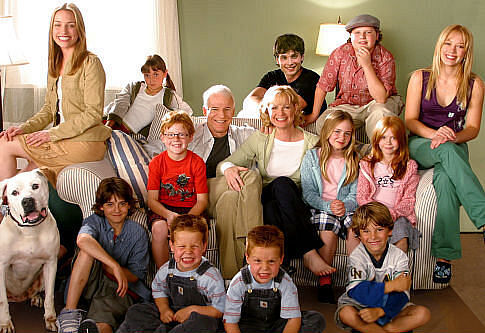 The most innocuous movie in America, aka Cheaper By The Dozen, is also the most popular comedy at the box office (trailing behind LOTR, but then again, who wouldn't be?). How can something so blah blah blah, be so damn popular? Cinecultist guesses it's the same think that keeps vanilla ice cream, Yanni and USA Today in business. But should you go see this picture, since everyone else seems to be loving it?
The most innocuous movie in America, aka Cheaper By The Dozen, is also the most popular comedy at the box office (trailing behind LOTR, but then again, who wouldn't be?). How can something so blah blah blah, be so damn popular? Cinecultist guesses it's the same think that keeps vanilla ice cream, Yanni and USA Today in business. But should you go see this picture, since everyone else seems to be loving it?
DO NOT SEE THIS MOVIE IF... you think it will be like the book of the same name published in 1948. The similarities are bare -- 12 kids is about where it begins and ends.
...you prefer the darker side of Steve Martin ala Spanish Prisoner. This is all very Eddie Murphy-kid friendly stylin' here.
DO SEE THIS MOVIE IF...you can't wait for the Lizzie McGuire Movie 2, Coyote Ugly: Uglier Than Ever, or The WB's Superman: Hunky With a Vengence as the tween stars all have moments worth oggling. If oggling is your thing.
...you'd like a little meta-Ashton Kutcher. As the uncredited model/actor boyfriend of eldest daughter Piper Perabo, Kutcher basically is humiliated time and again by the gaggle of kids (underwear soaked in meat, etc.). He also does a little winking at the camera acknowledging that he knows he's not such a good actor, he needs his pretty face to get parts. Heh. Ashton punk'd himself, sorta.
These are the film's charms, take them as they are, expect little but entertainment soon forgotten after exiting the theater.
Despite attempts to keep us from the theaters, Cinecultist did attend a screening of the Oscar hopeful Cold Mountain over the weekend. Sidebar: has Miramax won it's war for our brains that something compells CC to mention Oscar-wannabe in the same sentence with Anthony Mingella's new flick? Anyhow, like Master and Commander, CC wanted to dislike the film on Weinstein brother-hater principle alone, more than we did. Well shot, with intense performances and brutal extras-tastic battle scenes, it is tough not to get caught up in its emotional steamroller. Although its difficult not to see Cold Mountain as that tarted up chick with the huge corsage standing around in the corner of the prom (aka the Awards Season). Depending on how cynical you are, either you hope she gets lucky or you secretly wish she's left there alone to cry.
When talking about this movie, we need to acknowledge that Jude Law is a very pretty man. Heck, even one of the characters in the movie calls him a pretty man. If like CC you want to break off a hunk of Jude, might we also recommend renting Enemy at the Gates with his stellar performance in last year's Russian army story. He's good here as well, showing his longing to escape the horrors of war for this promise of a romance. Despite the fact that everyone is saying it, props do need to be handed to Renee "Zelweggs" Zelwegger. We want to hate her with the stupid weight issues but she delivers damn good performances so we begrudgingly appreciate her abilities. We loved seeing indie rocker Jack White on the screen as well in his small but sweet role. Cinecultist has also heard good reviews of the soundtrack album where White's songs written for the film appear.
 Despite our documented skittishness around the publicity juggernaut promoting Master and Commander back at its release in November, Cinecultist and Ilana decided to catch a screening of it anyhow on Saturday a few weeks post-hype. M & C is the kind of movie that invariably ends up being nominated for various awards but that CC hasn't got around to seeing, and thus cannot bash with the abandon we'd like. Not that this stops us, per se, we just don't feel good about it. But after seeing the film we can say, lo and behold, shiver our timbers, swab Davie Jones's locker and other faux-nautical exclamations, Cinecultist really liked this movie. We're not motifying the top 10 or nothing, but if Russell Crowe makes good on his buzz, or better yet we see some kudos for director Peter Weir or the delectable Paul Bettany, CC won't be sad.
Despite our documented skittishness around the publicity juggernaut promoting Master and Commander back at its release in November, Cinecultist and Ilana decided to catch a screening of it anyhow on Saturday a few weeks post-hype. M & C is the kind of movie that invariably ends up being nominated for various awards but that CC hasn't got around to seeing, and thus cannot bash with the abandon we'd like. Not that this stops us, per se, we just don't feel good about it. But after seeing the film we can say, lo and behold, shiver our timbers, swab Davie Jones's locker and other faux-nautical exclamations, Cinecultist really liked this movie. We're not motifying the top 10 or nothing, but if Russell Crowe makes good on his buzz, or better yet we see some kudos for director Peter Weir or the delectable Paul Bettany, CC won't be sad.
Somehow, CC has turned into the kind of movie-goer who comments on battle scenes, and the ones in M & C are particularly beautiful to look at and horrific to contemplate. Hanging around exploding cannons, not really such a hot idea. Also, some of the apparently very realistic looking 19th century doctoring scenes made CC pull our turtleneck over our face but as we've said, we're squimish. A lesser director than Weir might have allowed the insider details and sea battle trivia drag down the story's pace, but the movie clips along with a compelling intensity. Though if anyone has some translation of what happens exactly in the last 10 minutes, please send them along. CC did get a bit bogged down in the vocab.
Despite all this and the stellar performances by Crowe and Bettany, teaming up for a second time now in a very fruitful way, as well as the rest of the prodominantly male cast, do the filmmakers really expect us to believe life on a ship with a bunch of men for that long was so very straight? "I slept next to him in a hammock for two years, but we're just good friends." Does this statement sound as fishy to you as it does to CC? Nary a longing look, and some of those fellas are quite pretty in their royal blue.
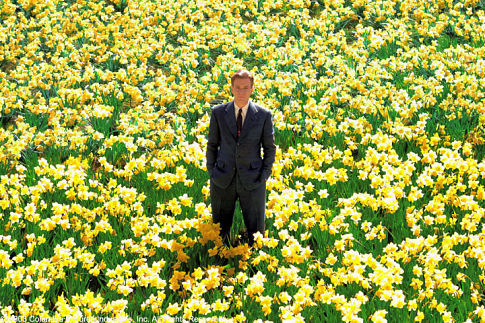 Pardon the horrid analogy, but Cinecultist was caught up in the Tim Burton's Big Fish end of the year awards-hype like a mammoth catfish on a homemade fishing line. There's something about the phrase, "Tim Burton's Masterpiece" intoned on the television commercials that will lure CC into theater every time based purely on fond memories of Pee-Wee's Big Adventure, Edward Scissorhands, Ed Wood and Sleepy Hollow alone. We won't say that our Burton itch wasn't scratched by parts of Big Fish, but in the end CC expected a more typically dark twist than this sweetly Oedipal story delivered.
Pardon the horrid analogy, but Cinecultist was caught up in the Tim Burton's Big Fish end of the year awards-hype like a mammoth catfish on a homemade fishing line. There's something about the phrase, "Tim Burton's Masterpiece" intoned on the television commercials that will lure CC into theater every time based purely on fond memories of Pee-Wee's Big Adventure, Edward Scissorhands, Ed Wood and Sleepy Hollow alone. We won't say that our Burton itch wasn't scratched by parts of Big Fish, but in the end CC expected a more typically dark twist than this sweetly Oedipal story delivered.
Told primarily in flashback/tall tale, Big Fish brings to technicolor life the experiences of another Ed, this time Edward Bloom (Albert Finney/Ewan McGregor) as told to his son Will (played as an adult by Billy Crudup) throughout his life but painfully resented for their exaggeration as a grown-up. Visually, the movie soars when allowed to play in these fantasy sequences as Burton and his production team concoct stunning, elaborate sets pieces for them. In particular, the part where WWII combatant Ed lands in an Asian vaudeville show complete with barking ventriloquist is delightfully witty as well as gorgeous.
But all of this loving attention to surface detail leaves a few holes in back-story and character development. As the investigation by Will plot sets out to debunk some of Ed's stories with real life truths, the story could have plumbed some darker depths regarding his father's double life and the escapist impulses of a life-long story teller, but doesn't. Instead Burton chooses to linger his camera on the patiently hagged-uped face of his real-life girlfriend Helena Bonham Carter (look honey, this time I didn't make you look like a monkey!) and sticks us with a heart-warming ending when we're not looking. Some people might find their cockles warmed and their strings tugged by this kind of father-son bonding junk, but Cinecultist wonders if those people are a true Burton acolyte like they say. CC thinks we'll hold off on dubbing Big Fish an "instant classic" but it is still worth a holiday time viewing if your schedule allows.
Back in Nor Cal for the holidays with the fam, the Cinecultist headed out to the suburban cineplex for a post-Christmas screening of the Lord of the Ring: Return of the King with our favorite Tolkien geek, CC's Dad. We had actually held off seeing the film at midnight on its release with some of our NYC-based geeks, so that we could continue our tradition of seeing the epic installments with the pater familias. Someone who's read the books numerous times over the years even listening to the entire trilogy on audio tape while commuting, CCD knows the stories inside out and thus makes for quite the educated screening partner and he admires the genius of director/visionary Peter Jackson nearly as much as CC.
Sign Number One that CC has been attending the movies too long in over-priced Manhattan: when we went to go purchase the tickets on Fandango we were shocked to be reminded that the 'burbs features both matinees and $6.25 ticket prices for said matinees. Cinecultist literally thought it was a typo or a glitch in the website's calculations. Arriving at the Century 12 in Redwood City, we also were overawed at the size of the parking lot in comparison to the smaller sized lines inside. In New York nearly everyone (or at least it seems this way) is at the theaters on a holiday afternoon, while in the Bay Area everyone seemed to be at the mall. Or more specifically, the Gap, the madhouse of sweater piles CC had visited earlier in the afternoon.
But anyhow, the movie. The opinion of the final installment, already slated for the top of the list this year even before viewing it, is that it rocks, of course. Examined as an 11 hour movie, it's a fearsome accomplishment. Jackson continues to out do himself, visually and emotionally, as he brings to life this deeply textured universe on screen. The battle scenes in particular blew CC away, the vastness of the fields, the intricacies of the props and the intensity of the actors in their elaborate costumes. Viggo Mortenson is wonderful, Orlando Bloom is all dreamy blondeness with kick-ass fighting skills again, and of course, Andy Selkirk as Gollum is one of the most evocative portrayals of a literary figure brought to life that could be imagined. However, the most stand-out performance had to come from Sean "Rudy" Astin whose Sam Wise Gamgee makes for a completely heartfelt platonic bond that can't help but be truly moving. And not just a little bit homosexual, although CC will leave that analysis to the experts at CS and DYFL?.
Inspired by the slang-tastic Uncle Grambo and an odd little segment we heard on NPR on the way to the movie, Cinecultist invokes a new slang word we've decided to adopt calling the Lord of the Rings completely Poppins*.
*As in entirely perfect in every way.
Movies are a great medium and all, but when it comes to being a barometer of the cultural zeitgest, they are always a touch behind. Inherently, by the time a trend gets pitched as a part of a feature, the feature gets made and then released, that trend is probably already so over it's not funny (see XXX and X-treme sports). Not that movies are the only media killing the cool buzz (see the New York Times Style and magazine sections), to even talk about the trend usually means it's over too.
Cinecultist was thinking about this phenomenom in the last week or so as we watched Honey in the theaters and Style Wars on DVD. Admitedly, one is a fiction film and the other a documentary, but both are trying to capture the energy of New York hip hop culture on screen and both come off as completely square in the process. This is not say they are not entertaining movies, but they aren't cultural windows offering a real look at the trend to their audience. Neither film skimps on the cameos either, most notably Crazy Legs in Style Wars and Missy Elliot in Honey who keeps yelling in a oddly sexual way, "I need Honey Daniels!" So what goes wrong then? It's the voice over of The Man, both literal and figurative, that kills the buzz here. To be told what is cool makes it instantly uncool and there's no way around it. And trust Cinecultist, we know from cool.
Imagine the scene: EXT. Outside a bustling movie theater on 3rd Avenue in downtown Manhattan - NIGHT. Two girls stand on the sidewalk arguing. One (our Cinecultist, 26) insisting she will buy a ticket to see Timeline, a movie about archeologists and time travel to 14th century France based on a best seller by Michael Crichton. The Other (Ilana, 24) disparaging her choice vehemently tries to extract a promise from Cinecultist that she will not spend her hard earned money on this flick. The two walk to the corner of the street, part amicably despite their difference in opinion and Cinecultist turns back to the theater, $10 bill fluttering in her hot little hand.
 Though it had earlier this year been the opinion of this blog that overloading on Summer Action Flicks was causing CC's brain to dribble out the ears, we realized Saturday that in the face of the Holiday Season a dose of junkie action and Paul Walker were needed to balance things out. Hence the above scene with the original PW fanatic, who we couldn't talk into attending Timeline with us. CC won't lie to you -- Timeline is not a good movie. PW has spent far too long enrolled in the Keanu Reeves School of Acting, dude. Frances O'Connor and her "smart girl" boring brown hair grate on the nerves to the point of distraction. Historical anomaly is more common than those greek flame-tipped arrows zipping threw the sky. Actually, it was the battle scenes which Cinecultist found the most interesting in the movie. Look kids, it's a working catapult and a group of soldiers with their shields forming a phalanx, neat-o! In the end, it is hard not to respect the sheer dollars fueled into productions like these that not only feed all those soldier extras but clothe them and organize them into fighting formations for the camera.
Though it had earlier this year been the opinion of this blog that overloading on Summer Action Flicks was causing CC's brain to dribble out the ears, we realized Saturday that in the face of the Holiday Season a dose of junkie action and Paul Walker were needed to balance things out. Hence the above scene with the original PW fanatic, who we couldn't talk into attending Timeline with us. CC won't lie to you -- Timeline is not a good movie. PW has spent far too long enrolled in the Keanu Reeves School of Acting, dude. Frances O'Connor and her "smart girl" boring brown hair grate on the nerves to the point of distraction. Historical anomaly is more common than those greek flame-tipped arrows zipping threw the sky. Actually, it was the battle scenes which Cinecultist found the most interesting in the movie. Look kids, it's a working catapult and a group of soldiers with their shields forming a phalanx, neat-o! In the end, it is hard not to respect the sheer dollars fueled into productions like these that not only feed all those soldier extras but clothe them and organize them into fighting formations for the camera.
However after the neat-o-effect wears off, Timeline must be assigned to the dustbin of really terrible time travel movies inhabited by such travesties as Stargate, Back to the Future II, Highlander and Clockstoppers. Makes a cinecultist long for a La Jetee, or Bill and Ted's Excellent Adventure at least.
In our continuing search for art house movies not screened at the dreaded Angelika (no subway rumbling during our movies, thankyouverymuch), Cinecultist and our friend Lisa met at the Paris theater on 58th and 5th Avenue on Sunday for Shattered Glass. Across the street from what Cinecultist thinks of as Manhattan's Magical Palace (aka the Plaza, dah-ling), the Paris is a plush theater, if sparse by way of customers on a Sunday night.
A drama about the real life journalism kerfuffle surrounding editor Stephen Glass's dismissal from the Washington D.C. rag the New Republic, the film both gives the viewer an intriguing insight into Glass's troubled psyche at the same time keeping us guessing about his true nature. Much of this ambiguity comes from Hayden Christianson's stellar performance as Glass. He's so damn likable at the start of the film -- all wide-eyed and seemingly ethical as he lectures a classroom of adoring high school students. But as the film wears on, his incessant ass-kissing and fearful pleas that no one be mad at him begin to grate considerably.
Besides Christianson, the picture is filled with top notch acting particularly from Peter Saarsgard as Steve's editor Chuck Lane, who has a thrilling scene where they try to return to the scene of the crime, so to speak. Chloe Sevigny does her brittle ice queen thing which we always like and Melanie Lynsky, our favorite underappreciated indie actress who lives in the nabe (spotted at the Astor Place Starbucks!), represents. Shattered Glass is one of those fall movies that makes you think, should get some sort of awards and will be promptly ignored. Go see it now, and be ahead of the Academy curve just like CC.
Too. Much. Hollywood. Product. Elves, suicidal literary chicks, philosophy spouting super humans and now this weekend disaster prone cats. Must have balance in our viewing. Must attend some repertory movie screenings before Cinecultist's brain implodes from slick pre-packaged over stimulation.
Your fanboy heart called out for more after watching Kill Bill? Might we recommend some communing with one of the sources, as the Leonard Nimoy Thalia/Symphony Space screens Akira Kurosawa's Stray Dog, Drunken Angle, Yojimbo and Sanjuro. And they have double features, 2 movies for $10 bucks. It don't get much more fanboy than that, kids.
For more auteur action, the American Musuem of the Moving Image in Queens is doing a series on Francis Ford Coppola. This weekend, you can remind yourself to leave the gun, take the cannoli with the Godfather on Friday and Saturday evenings.
For national cinemas you didn't know you needed to know about, the MoMA Gramercy Theater provides for your needs. Cinema from developing nations is more than just Abbas Kiarostami, as is evident in the Global Lens series and German film did progress after Fassbinder as the curators of Das Neue Kino would like you to know.
One last suggestion for cinecultists: you can't really call yourself a cinecultist if you're not intimately familiar with Federico Fellini. You've lived La Dolce Vita and you've walked down La Strada but perhaps Amarcord didn't satisfy you in terms of Fellini's reminiscing on his fertile childhood? Then I Vitelloni is for you. Our girl Pauline Kael called it the director’s “first fully confident piece of direction”, and according to Film Forum "its style and story of aimless youth inspired, among others, George Lucas’s American Graffiti and Scorsese’s Mean Streets."
Sounds like a full weekend of quality film viewing, no?
Growing up a nice Jewish girl in the San Francisco Bay area, Cinecultist treaded lightly through the Christmas season. We had to be aware of inadvertently partaking in the holiday -- like sprinkling the all green and all red sprinkles on the menorah shaped Hannukkah cookies. And we certainly didn't gather as a family around certain classic holiday movies like It's A Wonderful Life, White Christmas or How the Grinch Stole Christmas. Although CC has seen all of these pictures since then, as we have plenty of nice goy friends. So, it was with a certain amount good old fashioned Jewish guilt that Cinecultist watched and really enjoyed Jon Favreau's Elf starring Will Ferrell.
Here's what Will Ferrell understands, perhaps better than any other comedian: you gotta sell it. There's not a trace of self consciousness in this man, as he saunters down the street in full elf regalia. Yellow tights and a cut away velvet green jacket do not slow him down and you have to respect that, even as you laugh at it. To that end, you can't help but get swept up in his energy, as Ferrell wants so much to make you believe he believes he's an elf, that it completely endears him. For this performance alone, the movie is worth a viewing. However, Elf also has other things going for it such as an awareness of the cannon of Christmas movies, particularly the influence of claymation. As well as strong supporting performances by Ed Asner, Mary Steenburgen, Zoe Deschanel and James Caan (who we've recently become sold on based on his solid performances on Las Vegas. Yeah, that's right, CC watches Las Vegas. And the O.C., they are our soapy tv guilty pleasures this season.)
The only thing we might caution though is try to attend the movie late in the evening. Children really do ruin the children's movie viewing experience, as CC was continually elbowed by this curly headed rugrat all through the 7:15pm showing. It made CC want to get all very bah humbug on her and her parents.
 When the Cinecultist's mother comes to town for a visit attending a chick flick is always a safe bet for cultural activity. After we've exhausted Fifth Avenue near the Park, a Broadway musical and the Met of course. Lucky for CC, neither of us had caught Sylvia yet -- a dramatic biographical women's film about a major figure in literature, aka a lit chick flick. [Not to be confused with chick lit flicks like Bridget Jones's Diary 2.] We cabbed it up to the Lincoln Plaza Cinemas, as an alternative to the Angelika Monday night but CC has to put in as an aside, it's really not much of a better art house theater option. 1) The theater is subterranean which always weirds CC out and 2) the cliental/staff look like they might be a rare strain of West side mole people. Not a healthy glow, let alone a tan, in the bunch. Also, 3) our Toblerone paid for by Mom was stale. But, on to the movie.
When the Cinecultist's mother comes to town for a visit attending a chick flick is always a safe bet for cultural activity. After we've exhausted Fifth Avenue near the Park, a Broadway musical and the Met of course. Lucky for CC, neither of us had caught Sylvia yet -- a dramatic biographical women's film about a major figure in literature, aka a lit chick flick. [Not to be confused with chick lit flicks like Bridget Jones's Diary 2.] We cabbed it up to the Lincoln Plaza Cinemas, as an alternative to the Angelika Monday night but CC has to put in as an aside, it's really not much of a better art house theater option. 1) The theater is subterranean which always weirds CC out and 2) the cliental/staff look like they might be a rare strain of West side mole people. Not a healthy glow, let alone a tan, in the bunch. Also, 3) our Toblerone paid for by Mom was stale. But, on to the movie.
Sylvia follows Gwyneth "I'm Ready for Oscar 2" Paltrow playing the troubled poetess Sylvia Plath, who when she meets her future poet husband Ted Hughes at a Cambridge party, she bites his cheek. Their marriage is all downhill from there. As other folks have said, the movie is production designed within an inch of its life. Nary a fifties style headband or bit of North England foliage is out of place throughout. However, in a lit chick flick this is a quality we're looking for, as the prettiness on screen can act as a lightening agent for the dour emotions on screen. All of those angry stares at the potentially philandering husband and the long frusterated sighs at the blank typewriter can begin to grate on a person after a while. We did enjoy the quality of the film stock though, the grainyness of the color in the image makes some of the early sequences feel like old home movies which was quite evocative. Also, the scene where Sylvia recites the Wife of Bath for the cows as she floats in a boat down the river tickled our former English major sensibility.
Upon leaving the decrepit theater, CC's Mom commented that the movie made her think "Sylvia snap out of it and quit moping around after this man!" She felt there was too much emphasis put on Sylvia's inability to get over herself. While CC felt the movie very effectively showed how motherhood and being a wife trapped Sylvia and separated her from her artistic ambitions. It all seemed delightfully post-feminist to CC. But that's what happens when you have two movie watchers at the same film -- you get two very different opinions.
Cinecultist teemed up again with Doug of Filmington.com to review the newest picture by GVS Elephant. We sat down over IM to discuss the film's suspense, Van Sant's cinematic influences and the use of non-actors in this "docudrama."
[Josh Cultivated Stupidity also enjoyed the movie, but for slightly more "superficial" reasons.]
DOUG
The killings at Columbine High School in 1999 were the centerpiece of Michael Moore’s blunt-edged attack on gun culture in BOWLING FOR COLUMBINE, but Gus Van Sant’s ELEPHANT is a far more Spartan effort. And with us to discuss this pachyderm of a movie, making her sophomore appearance, is Karen Wilson, editrix of Cinecultist.com. Welcome back, gally gal.
KAREN
Thanks, I always appreciate being called upon to lapse into feminist ranting when provoked by particularly offensive movies. Although I can’t say that being a chick really helps or hinders when it comes to parsing this picture. Rather, I think it’s about remembering what it’s like to be an angst-filled teenager.
DOUG
Thanks to my recent high school reunion, I had the singular pleasure of re-living that exact feeling — only with bald spots and slenderizing undergarments. Despite appearances, most of the vivid personalities haven’t changed. And they bear strong resemblances to the handful of students we meet in the film’s first reel.
KAREN
I really loved that first 40 minutes or so; the photography is so beautiful, I can see why audiences at Cannes, Telluride, and Toronto went nuts for the film. The pacing and the imagery walk the gorgeous fine line between severely mannered and completely naturalistic. The shots are like museum-quality photography come to life — which, theoretically, is what movies should be but so rarely are.
DOUG
Despite this lovely and simplistic quality, the suspense is just awful. We’re getting to know these ordinary high schoolers — the hunky lifeguard the girls drool over, the even-tempered shutterbug, the achingly self-conscious girl who won’t wear short pants in gym — and we also know what’s about to happen. The apprehension makes you want to rip the armrests off your seat.
KAREN
I hope that’s not a dig at the way I jumped about a mile every time something happened toward the end of the movie. But the suspense is effective, and I wanted to cover my eyes and scrunch down in my seat. ELEPHANT has this strange quality; you know the inevitable ending, but you don’t know quite how it will go down. It takes a scary topic — how a supposedly safe place like a school can be so unsafe — and makes it downright horrific.
DOUG
Another skillful turn involves Van Sant’s taking of temporal liberties, as the film backtracks on itself and shows the day’s events as a fugue from several points of view. The effect is good for another shot of adrenaline, because one brief and innocuous conversation signals what’s about to come. But to whom will it happen?
KAREN
Yes, it’s a bit of shades of PULP FICTION. The whole movie kept me thinking how effectively GVS borrowed from different directors. The refusal to develop character beyond evocative stereotypes was so Richard Linklater in SLACKER or DAZED AND CONFUSED, while the use of first-person camera is so Brian de Palma and the steadicam all Stanley Kubrick.
DOUG
And beyond that impressively apt bit of name-dropping (I saw lots of parallels to Kubrick’s THE SHINING), we see that Gus has taken a specifically vaporous tack since FINDING FORRESTER fell flat on its fanny. With GERRY and ELEPHANT, he’s given us two atmospherically stark films about long walks toward doom, and the critics are back on the bandwagon.
KAREN
Van Sant goes back and forth between these “arty” projects and Hollywood feel-good entertainment pretty consistently. GERRY and ELEPHANT are back to back, but I’d certainly expect GVS’s next movie to have a huge bankable star and a clear mentor figure to warm the cockles of our hearts. I find it annoying that critics can champion his arty stuff but lash out against the entertainment, as though they were disappointed he was trying to make money with his movies. Not that I didn’t find FORRESTER totally vapid too, dog!
DOUG
Hey, no one’s begrudging the commercial efforts of indie auteurs — especially when they succeed, like Doug Liman’s THE BOURNE IDENTITY and Linklater’s SCHOOL OF ROCK. And though GOOD WILL HUNTING has been maligned by revisionists, I think it retains a lot of charm. FORRESTER might be his least successful film because it looks too mainstream, so unlike a Van Sant movie.
KAREN
Another thing I found fascinating (but ultimately a bit faulty) about ELEPHANT was his use of amateur actors. Van Sant seems to want to capture a completely naturalistic impression of these teenagers, to communicate a sense of “realness” about this milieu. Yet, you can see the kids trying so hard to hit their marks and not look into the camera. In the beginning, their awkwardness as performers endears us to them, but as the drama escalates, the lack of familiarity with how to deliver an acting performance detracts from the movie a bit. As a result, I found certain lackluster reactions unbelievable.
DOUG
Indeed, that last act is as a bloodless as it is bloody (the squibmaster must have put in scads of OT). I think I can fathom Van Sant’s motivations for ending ELEPHANT the way he does. We had no answers then, and we have no answers now. So, he’s saying that it’s a terrible thing when screwed-up social outcasts murder their classmates at close range and with no shred of remorse? If you’ve nothing else to say, why make this thing?
KAREN
Would it be cynical of me to say “so he could shoot the two boys kissing in a shower?” GVS obviously finds young people fascinating — whether you call it a fetish or not — and he’s spent quite a bit of time cataloguing their beautiful deviancy. Maybe what he’s saying is that for our society’s health we need to capture this elephant of teenage violence on camera, and then perhaps, if we name it, we can begin to understand it. Or is that too tidy and aphoristic a response?
DOUG
Depends on your view of this statement: ELEPHANT may refer to the creature in the room that no one talks about, but it might also be a veiled urging that we never forget about what happened. Despite its achievement, ELEPHANT is gripping but ultimately unsatisfying docudrama, because Gus so quickly blows the tension he’s worked so hard to build.
KAREN
I think to call ELEPHANT a docudrama pigeonholes it and ignores its greatest strengths as art cinema — the lyrical photography, breathtaking composition, and meditative pacing. It’s about a sensational, topical subject and yet it’s not about that at all. Or at least, it’s about the way Gus Van Sant views that cultural moment through his particular artistic lens. I’m giving this $9.50, and I’m frankly surprised at my resounding recommendation. I suppose I liked it more upon reflection than I did when I initially walked out of the theater.
DOUG
I admire Van Sant’s restraint, as he deftly reduces the events to its most mundane elements and subtracts the subsequent media frenzy. But if his goal was to hold a mirror to society, he’s done so in a most literal sense. Innocents died in Columbine? I knew that already.
KAREN
I don’t know how it could be a mirror, because its such a blatantly composed piece of art. ELEPHANT is mannered but natural at the same time, and everything we see is very obviously constructed for a camera.
DOUG
Hmm. Sounds like a political campaign.
Audience Members at screenings of the director's cut of Alien. Kids: This is not your living room. You should not offer your running commentary on Ripley, Mother or that thing bursting from John Hurt's stomach that is so cool. Our cinecultists in the field inform us you've been total chatty cathys. So from us to you: Shut the fuck up. That is all.
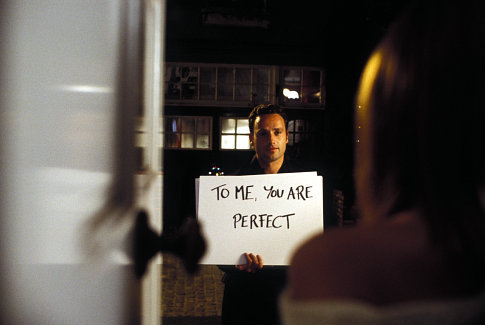 The siren call of the romantic comedy -- an odious melody that draws Cinecultist into its rocky shoals every freakin' time -- sang our name again on Saturday compelling CC to catch an advance screening of Richard Curtis's directorial debut Love Actually. The English screenwriter (Four Weddings, Notting Hill) who created the "many friends driving quickly to a romantic event in a Mini = comedy" convention and made us fall for the foppish side of Hugh Grant, has added the director slash to his title with this new ensemble piece about love at Christmas time in Britain. CC really did want to hate it, thus breaking our long standing unadulterated fascination with the genre. But instead, Love Actually made CC want to run from the theater, shouting "love is in the air!" and snog the first unsuspecting male speciman we saw on the street. Seeing as the screening let out next door to Nevada Smith's (a raucous Irish sports pub on Third Avenue), it's probably best that we restrained ourselves.
The siren call of the romantic comedy -- an odious melody that draws Cinecultist into its rocky shoals every freakin' time -- sang our name again on Saturday compelling CC to catch an advance screening of Richard Curtis's directorial debut Love Actually. The English screenwriter (Four Weddings, Notting Hill) who created the "many friends driving quickly to a romantic event in a Mini = comedy" convention and made us fall for the foppish side of Hugh Grant, has added the director slash to his title with this new ensemble piece about love at Christmas time in Britain. CC really did want to hate it, thus breaking our long standing unadulterated fascination with the genre. But instead, Love Actually made CC want to run from the theater, shouting "love is in the air!" and snog the first unsuspecting male speciman we saw on the street. Seeing as the screening let out next door to Nevada Smith's (a raucous Irish sports pub on Third Avenue), it's probably best that we restrained ourselves.
First off, props must be given for amassing such a phenominal cast -- practically every good English actor who's not in the Harry Potter series or working on LOTR, plus a few top notch Americans as well are in this thing. CC loves anything with our man Colin Firth in it, as well as Hugh Grant, Emma Thompson, Alan Rickman (cast of Sense and Sensibility anyone?) and not to mention Liam Neeson, Bill Nighy, Keira (Mrs. Whatevs.org) Knightley and Laura Linney who aren't much to sneeze at either. We fully expected this much talent to be wasted by a fractured plot, but the episodic structure works well and there wasn't one thread we wished stayed further on the periphery, all the little plots are interesting.
Curtis's comedy centers around taking the awkward moments that occur when we make ourselves vulnerable and heightening them to ridiculousness. This structure also works well for the multiple thread story lines, as the movie moves gracefully from one gag to another. There are some moments that try a bit too hard to warm those cockles in our heart, especially the footage shot in Heathrow's welcome room. Also Hugh Grant as the Prime Minister who stands up for Britain against the bully US Prez (Billy Bob Thorton! CC would so go to Canada if Billly Bob were the leader of the Free World), is a bit too shades of the West Wing for the second fiddle Brits. But in the end, Love Actually's sweetness is too winning to resist. And no one jumps into a Mini and races off to declare their love, so maybe we say the rom com has moved on from this conventional cheese? Maybe?
 This afternoon, PCC tuned out the predominantly wretched reviews and saw Jane Campion's new film In the Cut with CCC. Now, there are several things that intrigued PCC as she sat in the semi-crowded Sunshine Theater and waited for the film to roll. Of course, there's the fact that PCC thinks Ms. Campion is damn talented. Enough said. And then there's question of America's Sweetheart. Like an alcoholic trying to sober up, Meg Ryan is desperately trying to walk the dramatic path. She plays Frannie Avery, an ascerbic English teacher in New York City who inadvertently holds the key to a gruesome slaying and dismemberment of a prostitute at a local bar. Things get complicated when the lead homicide detective on the case, the disarmingly attractive and scruffy Mark Ruffalo, takes an interest in her. Did PCC mention that Frannie is both obsessed with sex and terribly repressed?
This afternoon, PCC tuned out the predominantly wretched reviews and saw Jane Campion's new film In the Cut with CCC. Now, there are several things that intrigued PCC as she sat in the semi-crowded Sunshine Theater and waited for the film to roll. Of course, there's the fact that PCC thinks Ms. Campion is damn talented. Enough said. And then there's question of America's Sweetheart. Like an alcoholic trying to sober up, Meg Ryan is desperately trying to walk the dramatic path. She plays Frannie Avery, an ascerbic English teacher in New York City who inadvertently holds the key to a gruesome slaying and dismemberment of a prostitute at a local bar. Things get complicated when the lead homicide detective on the case, the disarmingly attractive and scruffy Mark Ruffalo, takes an interest in her. Did PCC mention that Frannie is both obsessed with sex and terribly repressed?
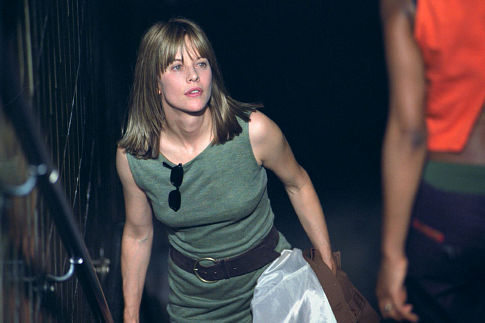
Of course, repressed female sexuality is old hat for Ms. Campion (anyone remember The Piano?), and as CCC noted, Ms. Ryan has also built a career for herself out of trying, and often failing until the climactic final scene, to find a man and get married. Granted, Campion uses drama to dramatize her themes of sexual turmoil, while Ryan has, except for 1994's When A Man Loves a Woman and 1996's Courage Under Fire, resided in RomanticComedyVille. So perhaps a more apt, and explanatory, title for Campion's new film would be something along the lines of "In the Cut: In Which Meg Ryan Finally has Sex". And boy, is there a lot of sex. And nudity. And violence. And every combination of said elements imaginable. Perhaps this is PCC's own fault, but she had a very difficult time seeing Frannie as a character; instead, PCC saw Meg Ryan playing Meg Ryan. Through this rather distorted lens, the full frontal nude scenes with Ryan and Ruffalo took on a disconcerting voyeuristic quality, as if PCC were peeping in the window of Ryan's private window. Not that PCC doesn't admire on some level the fact that Ryan wants to exercise (develop?) her acting chops and try her hand at a dramatic role, but there has been entirely too much press over the aforementioned sex scenes. While sex definitely plays an integral role in the film, PCC thinks that all the buzz about a naked Meg exaggerated these scenes until it was impossible to see them as a part of the narrative.
Overall, PCC is still mulling over the merits of the film. The "moral" of the story was more than a bit anti-feminist -- women can't survive without men. And Ryan's portrayal of the troubled Frannie was a bit too distanced for PCC's taste- sex is such an intimate activity, even for a woman like Frannie who tries to be academic and detached from it all, and Ryan's performance didn't feel "close" enough to the subject matter. But the cinematography was wonderful, at least 90% of the time, though PCC and CCC agreed that the reliance on out-of-focus shots was a bit overdone. The film made PCC feel unsettled and a bit dirty (in the physical sense, since the odor of Campion's fetid NYC practically jumped off the screen and into PCC's nose). Yet there was something intrigiung about it all, even if the values articulated weren't necessarily ones to which PCC subscribes.
How best to put to sleep the legacy of Dawson's Crack and teenie-bopper fame? Why doing indie film, of course. Hell, if it can work for extreme case like 90210's Tori Spelling with a role in the excellent House of Yes, Katie Holmes should be a shoo in for coolness and longevity beyond puberty. Holmes delivers a subtle and suprisingly deft performance in Pieces of April, a story about the black sheep being visited by her family at her Lower East Side walk up one Thanksgiving. In many ways, it has a lot of structural similarities to Day Trippers, with the family trapped in the car together through much of the film, bickering and loving. Unfortunately though, the quality of the image also reminds CC too much of the early '90s.
Back in those halcyon days, it seemed more reasonable to deliver a film to audiences shot in DV and blown up to 35mm and looking like ass in a tub, if it had stellar performances in it. Now in 2003, this seems just unnecessary. But setting this aesthetic quibble aside, Pieces reads like a who's who of Indie actors (god that Patricia Clarkson -- take it on home, girlfriend) and has a soundtrack featuring music by one of the superstars of indie music, Stephin Merritt of Magnetic Fields. Lush and sweet one moment, menacing the next, Merritt makes smart music. A perfect compliment to this charming picture. Now we're psyched to see what Ms. Holmes can do in a slick Hollywood dramedy.
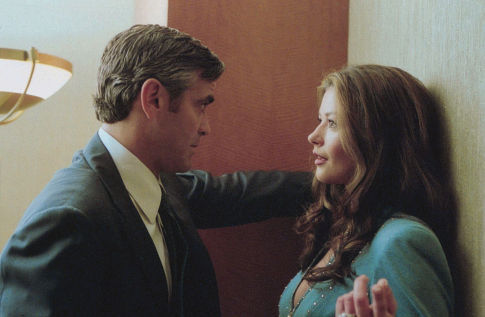 There's a few age old adages in the realm of movie watching, worthy of embrodery on a sampler some where. "Even a mediocre evening with the Coen brothers is better than most evenings with others." This is what Cinecultist kept thinking last night as we headed home from an after work viewing of the boys' newest, Intolerable Cruelty.
There's a few age old adages in the realm of movie watching, worthy of embrodery on a sampler some where. "Even a mediocre evening with the Coen brothers is better than most evenings with others." This is what Cinecultist kept thinking last night as we headed home from an after work viewing of the boys' newest, Intolerable Cruelty.
Many critics have mentioned the cynical and heartless nature of the Coen's work, and no one's been too pleased with this recent reworking of the screwball comedy genre. CC felt that at times, it wasn't nearly slick or caustic enough. (Perhaps the influence of Mr. Feelgood producer, Brian Grazer?) Screwball comedy is a comedy of extremes, such as in Bringing Up Baby where the ditziest millionaress meets the geekest scientest ever, they spar, etc etc.. CZJ's character Marilyn at times seemed too human, not cynical and calculating enough. She should've been harder than nails, not just as hard as. We liked the Cloon as per usual, even the blinding white teeth bit, but his character needed more periphery story. Has Miles Massey ever been involved with anyone romantically, besides that weepy lawyer sidekick of his? But even in all of this not-quite-rightness of the characters, there are some Coen classic walk-on roles. In particular we lurved Weezy Joe the hitman who needs that inhailer and the decrept senior partner Herb, who's the scariest thing CC seen on celluloid since we don't know when.
Sure, it would be easy to get mad at the Coens for not making a perfect movie when we know they're capable of it (ahem, Blood Simple). CC can think of a bunch of even okay other features by them that we love much more than this one. But don't write the film off entirely, it still has some cackle-outloud bits worth experiencing.
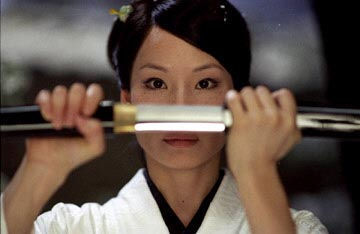 Who needs plot? We mean really, what's the point, when all we want to see is the ass kicking. Particularly, the girl on girl ass kicking. This appears to be the rational behind Quentin Tarantino's newest film (and his fourth film, as he so arrogantly bills it even on the movie's opening credits) Kill Bill—Vol. 1. Cinecultist current theory behind her gut hostility towards QT is this flagrant arrogance from the man who put the oh lord in autuer. He's the ultimate pasticheur, offering knowing reference to a whole host of pop predecessors, from the Shaw brothers to the soundtracks of Sergio Leone's Spaghetti Westerns.
Who needs plot? We mean really, what's the point, when all we want to see is the ass kicking. Particularly, the girl on girl ass kicking. This appears to be the rational behind Quentin Tarantino's newest film (and his fourth film, as he so arrogantly bills it even on the movie's opening credits) Kill Bill—Vol. 1. Cinecultist current theory behind her gut hostility towards QT is this flagrant arrogance from the man who put the oh lord in autuer. He's the ultimate pasticheur, offering knowing reference to a whole host of pop predecessors, from the Shaw brothers to the soundtracks of Sergio Leone's Spaghetti Westerns.
But it is not the fact that you could probably say there's nary an "original" moment in the picture that cuts it off at the knees; as Tarantino's originality lies in his ordering of reference. Rather, it's his position of exclusivity that gets in CC's craw. In QT's world we can never be as cool as him, as quick as him, or as in the know as him to "get" all he throws it as us. Sure, the thing looks slick and there's moments that are truly lovely in their brutality but if CC want to be talked down to, we wouldn't ask for it from a pop flick, a self-avowed paean to grind house movies. Shouldn't all of this populism, this re-appropriation of B-production, be completely accessible?
That said, Lucy Liu as O-ren Ishii, the flashback anime sequence detailing her history and that fight in the snow is awesome. Awe-some. Should've been a whole movie all about her. Zowie. But we could've used with less geyser blood from severed limbs. Yick. Pretty much everybody in the critic world loved it. Also, it made a bunch of money ($22.2 million on 3,102 screens) this weekend. Guess QT's here to stay. So we guess CC will just have to continue to alienate our fellow film geeks but saying the arrogant yahoo bugs us.
Some good things out this weekend. Also, some seriously hyped things. Cinecultist isn't going to tell you not to go see Kill Bill, Vol. 1, because you probably will anyway. Hell, who are we kidding? We're going too. Just remember to consume your Quentin with caution. Also up: the Coen brothers do a classic screwball comedy (not to be confused with romantic comedy -- a very different beast) with Intolerable Cruelty, the NYFF opening film Mystic River gets a wider release (be sure to read PCC's thoughts below) and the Sundance darling about a midget, The Station Agent also hits theaters.
If after all that you still have time/energy for one more, CC would recommend the Andy Warhol Festival at BAM : The Voice Choices pick from the Village Voice this week, as Jen reminded me on Wednesday night, all this month is Warhol month at BAM. Tonight is the double feature of Poor Little Rich Girl (Edie! Edie! Edie!) and Vinyl and Saturday features I Shot Andy Warhol with a Q&A by the director Mary Harron. All kinds of good stuff later in the series too, like Couch, Blow Job, Chelsea Girls and Kiss.
Too much to see. Damn, we love movie going in New York.
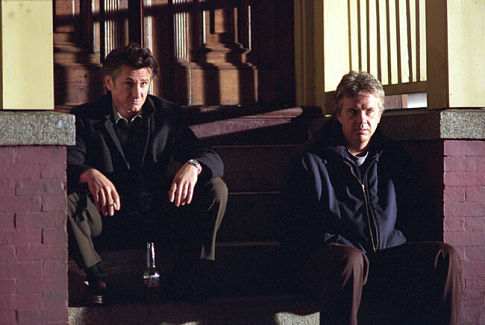 Sometimes loving a book can get you in trouble, especially in a movie theater. Everyone knows that guy behind them who mutters throughout the entire film about how such and such a line wasn't in the book and how the main character should wear a burgandy jacket, not a red one, dammit. For the most part, PCC wages these adaptation wars in the privacy of her own brain. But the tension still exists, building to a tidal wave of equal parts excitement and apprehension as the opening credits of the film adaptation of a beloved book roll on to the screen. Luckily, Clint Eastwood's adaptation of Dennis Lehane's bestselling novel, Mystic River rode the wave of excitement from the first glimpse of the Boston suburbs until the final somber notes of the Clint-composed theme faded out after the closing credits scrolled off-screen.
Sometimes loving a book can get you in trouble, especially in a movie theater. Everyone knows that guy behind them who mutters throughout the entire film about how such and such a line wasn't in the book and how the main character should wear a burgandy jacket, not a red one, dammit. For the most part, PCC wages these adaptation wars in the privacy of her own brain. But the tension still exists, building to a tidal wave of equal parts excitement and apprehension as the opening credits of the film adaptation of a beloved book roll on to the screen. Luckily, Clint Eastwood's adaptation of Dennis Lehane's bestselling novel, Mystic River rode the wave of excitement from the first glimpse of the Boston suburbs until the final somber notes of the Clint-composed theme faded out after the closing credits scrolled off-screen.
Mystic River follows the lives of three boyhood friends, Jimmy (Sean Penn), Sean (Kevin Bacon) and Dave (Tim Robbins), starting on a fateful day when they were eleven and Dave was kidnapped off the street by two mysterious men masquerading as cops. We flash forward 25 years and find that the boys have become men with families of their own. Their lives are intertwined once again when Jimmy's daughter Katie is found brutally murdered in a local park and Sean, now a state policeman, is assigned to the case, which begins to focus on Dave as a suspect. But Mystic River is so much more than a police procedural or a straight-up murder mystery. While Katie's murder serves as the catalyst that brings the men together again after so many years, Lehane's novel and Eastwood's film are more studies in grief, revenge and family than anything else.
Lehane's prose is haunting, seamlessly weaving in and out of different characters' perspectives. With such an "interior", psychologically-driven book, PCC was afraid of how it would be translated on to the screen. But Eastwood nails the tone of the novel, the slowly building sense of dread that creeps along each page, and now through each shot of the film. It isn't a flashy book and Eastwood is wonderfully understated in his depictions of the events of the story. Even the discovery of Katie's body, which in other crime films might be edited together with the cadence of a music video, is sweeping and somber, like a layer of tar oozing over the frame and darkening the mood without a sound.
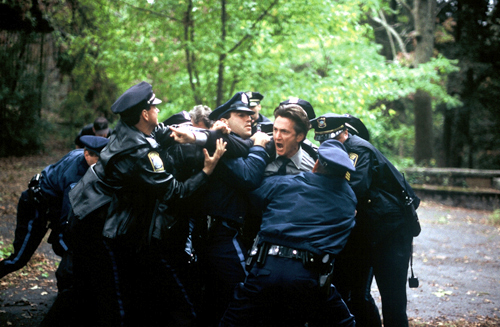
But Eastwood's most remarkable accomplishments in the film are the performances he elicits from his leading men, as well as from Laura Linney as Jimmy's second wife and Marcia Gay Harden as Dave's wife. Sean Penn is breathtaking to watch. You feel his pain, but not because he's forcing it on you, but because he's so open and raw and honest about it that you can't help but take a deep breath and remind yourself that it's only fiction. His monologue on the porch steps with Tim Robbins should convince anyone still out there who doubts his astonishing gift for complete character subsumption that Penn is one of the finest actors working today. Laura Linney is wonderfully cold and controlling as the pragmatic Annabeth, always in control behind the shadows. The final scene, devoid of dialogue but chockful of emotion, between Annabeth, Jimmy and Celeste (Harden) should be included on the list of most powerful closing scenes in recent memory.
 Cinecultist has been thinking a lot lately about where our excellent taste comes from. Just in case you haven't figured it out, CC and staff is on the cutting edge of just about everything, dah-ling. Years of hard work to develop this taste, we certainly never had a teacher like Jack Black in the School of Rock, sitting down to give us the history of pop expression at an impressionable age. Black, the other half of rock group Tenacious D, plays Dewey Finn a washed up bass player still holding out for that big break in rock n' roll. His roommate, Ned (screenwriter Mike White) and Ned's girlfriend (stand-up comedian Sarah Silverman) insist Dewey contribute to the rent and so Dewey starts substitute teaching at a prep elementary school pretending to be Ned.
Cinecultist has been thinking a lot lately about where our excellent taste comes from. Just in case you haven't figured it out, CC and staff is on the cutting edge of just about everything, dah-ling. Years of hard work to develop this taste, we certainly never had a teacher like Jack Black in the School of Rock, sitting down to give us the history of pop expression at an impressionable age. Black, the other half of rock group Tenacious D, plays Dewey Finn a washed up bass player still holding out for that big break in rock n' roll. His roommate, Ned (screenwriter Mike White) and Ned's girlfriend (stand-up comedian Sarah Silverman) insist Dewey contribute to the rent and so Dewey starts substitute teaching at a prep elementary school pretending to be Ned.
Even when his movie's scripts are less than stellar (as in Saving "surprisingly amusing though seriously dumb" Silverman or Shallow "oh no Farley brothers" Hal), Black still has a charm and charisma that translates into some great moments. But here Black has a delightful script from White (the Good Girl) and a sure hand behind the camera in Richard Linklater. His report with the kids is also delightful as he convinces them to abandon X-tina for Robert Plant and Jimmy Hendrix. The movie has wonderful momentum, the two hours sail along with energy and the audience CC watched it with sat through every last credit, they just didn't want to go home. We can understand that, Jack Black was on the screen.
There's a few films that really get the Cinecultist waterworks going. Though we're sensitive, CC's not really a movie-weeper — Terms of Endearment and The End of the Affair are two that caused us to awkwardly rub out eyes as we headed for the door. Now we need to add to that list, My Life Without Me, the new movie by Spanish director Isabel Coixet produced by Pedro Almodovar's production company and starring Sarah Polley. Polley plays Ann, a 23 year old woman with two young children and a young husband who lives in a trailer behind her mother's house and works nights cleaning a local university. When she discovers she has advanced ovarian cancer, she makes a list of all the things she always meant to do and sets about doing them.
Coixet appears to be aware of the history of women's weepies, the melodramas about chicks for chicks, referencing them in her narrative structure and dialogue. Deborah Harry, who plays Ann's jaded mother and Jose's first pick for more than worthy Academy Award nominee, watches the classic melodrama Mildred Pierce with Joan Crawford (whom she intriguingly blocks on the tv screen with her body) and tells the story of a downtrodden mother sacrificing herself to her impressionable young granddaughters. Ann reacts strongly, telling her mother not to repeat these stories to Patty and Penny, and the movie appears also to be reacting against the norms of typical melodrama. Where the movie, with its decidedly depressing subject matter, could be bleak instead has a lightness and irreverance that's entirely engaging. It's also a movie that's really of its cultural moment, intriguingly referencing pop like Milli Vanilli (Maria de Medeiros' hairdresser wants to give whiter than white Ann Rob n' Fab dreads) and Nirvana (really the sort of music that makes young women cry and the impetus for Ann meeting her husband Don). But these references aren't just trivia, they're the texture that allows the film to resonate.
Just like the patrons who dance through their supermarket shopping, My Life Without Me made Cinecultist waltz out of the theater high on the possibility of small character-driven international cinema.
Petroleum jelly, astro-turf, gender bending manimals, amputees, Ursula Andress in a ruff and the Isle of Man — all evocative imagery from Matthew Barney's Cremaster cycle of scultpure-films. If you missed all the hoopla surrounding the exhibition at the Guggenheim earlier this year or you never got around to watching any part of the series during its run at Film Forum, Anthology Film Archive begins screening all five this weekend (Thurs.-Wed.). They will run the films both in chronological order of creation (4, 1, 5, 2, 3) as well as numerical order which could put Barney's bizarro world into clarifying relief. Or not, as Cinecultist's convinced that what makes these works intriguing is their incomprehensibility. [via Flavorpill]
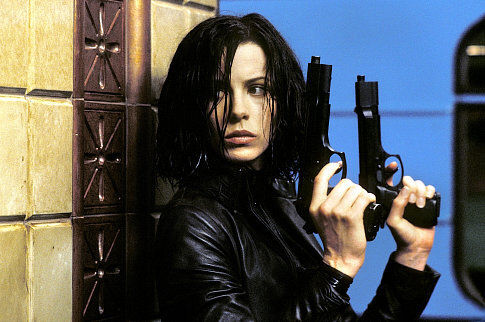 One of the toughest jobs for the critic is commenting on the middling picture, a movie you can't rave about and you can't rip it a new one either. Underworld is one of these types of movies, a slick fantasy project part-Matrix and part-Vampire Slayer. Cinecultist supposes what would have thrilled us more is if there had been even an iota of self-referential verve found in either of those other projects. This made us start thinking such existential questions as, "Can we really appreciate genre flicks any more? Is there a place for sentiment that's entirely earnest?" But then we kicked ourselves and said, to our friend MD so you don't think CC talks to herself as she walks out of movies, "hey, it's just a freaking Hollywood flick meant to have at least two more sequels!" Here's what we know: Kate Beckinsale looks great. We should all wear that much leather all the time, if we've got the thighs to handle it. The vampires and werewolves are properly scary. The blood flows enough so that even the jaded Cinecultist whinced and turned away. But sadly, it just doesn't feel like enough to love this movie.
One of the toughest jobs for the critic is commenting on the middling picture, a movie you can't rave about and you can't rip it a new one either. Underworld is one of these types of movies, a slick fantasy project part-Matrix and part-Vampire Slayer. Cinecultist supposes what would have thrilled us more is if there had been even an iota of self-referential verve found in either of those other projects. This made us start thinking such existential questions as, "Can we really appreciate genre flicks any more? Is there a place for sentiment that's entirely earnest?" But then we kicked ourselves and said, to our friend MD so you don't think CC talks to herself as she walks out of movies, "hey, it's just a freaking Hollywood flick meant to have at least two more sequels!" Here's what we know: Kate Beckinsale looks great. We should all wear that much leather all the time, if we've got the thighs to handle it. The vampires and werewolves are properly scary. The blood flows enough so that even the jaded Cinecultist whinced and turned away. But sadly, it just doesn't feel like enough to love this movie.
 Cinecultist is torn. We heart Woody Allen. But we do agree that the Woodman's prodigious product is often more miss than hit. Yet, Small Time Crooks was much funnier than we'd expected it to be. And we do think that Sean Penn and Samantha Morton really did deserve all of the accolades they received for their performances in Sweet and Lowdown. Prior to the release this weekend of Anything Else, Woody's newest feature, Cinecultist was certain it was going to be just terrible. Train-wreck. A teenie bopper cast Manhattan? Doesn't sound good. Apparently, most of the people in this discussion thread on Gothamist also agree. But then we read yesterday, A.O. Scott in the New York Times raving about it. "Its relaxed, casual air gives the humor room to breathe, and a gratifyingly high proportion of the piled-up one-liners actually raise a laugh." But our favorite Bay Area critic, Mick LaSalle from the San Francisco Chronicle hated it. "It has taken Allen over 30 years, but he has finally made a movie that's almost unwatchable."
Cinecultist is torn. We heart Woody Allen. But we do agree that the Woodman's prodigious product is often more miss than hit. Yet, Small Time Crooks was much funnier than we'd expected it to be. And we do think that Sean Penn and Samantha Morton really did deserve all of the accolades they received for their performances in Sweet and Lowdown. Prior to the release this weekend of Anything Else, Woody's newest feature, Cinecultist was certain it was going to be just terrible. Train-wreck. A teenie bopper cast Manhattan? Doesn't sound good. Apparently, most of the people in this discussion thread on Gothamist also agree. But then we read yesterday, A.O. Scott in the New York Times raving about it. "Its relaxed, casual air gives the humor room to breathe, and a gratifyingly high proportion of the piled-up one-liners actually raise a laugh." But our favorite Bay Area critic, Mick LaSalle from the San Francisco Chronicle hated it. "It has taken Allen over 30 years, but he has finally made a movie that's almost unwatchable."
Argh. With all of this back and forth, CC supposes that despite our best judgement, we'll just have to see the movie ourself. Will report back with any pertinent opinions.
This weekend kicks off a John Frankenheimer 14 film festival at Film Forum with screenings of one of his most famous films, The Manchurian Candidate. A staple of the '60s, creating lasting impressions of Cold War paranoia and intrigue, Frankenheimer's films can be weird and thrilling simultaneously. Even more incentive to catch Manchurian on the big screen, is to better compare it with Jonathan Demme's remake currently being shot with Liev Schreiber, Denzel Washington and Meryl Streep stepping into the ruthless mother role immortalized by Angela Landsbury.
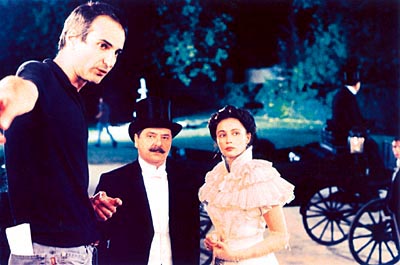 It is a big weekend this weekend in New York for French director Olivier Assayas. A retrospective of his work at MoMA begins (running from Thursday through Sunday) and his newest film, Demonlover finally gets a wider theatrical release (after a few selected screenings at Walter Reade last year). Cinecultist brings you a reprint of her musings on the film, which we've seen twice but still don't entirely understand, to be published shortly in Reverse Shot's Assayas symposium issue. For further Assayas thoughts, check out an extended article by Dennis Lim in this week's Village Voice, a review by J. Hoberman and Cinecultist's analysis of Maggie Cheung's star persona in one of his earlier films, Irma Vep. Assayas introduces MoMA's nine-film exhibition with a screening of Les Destinées today, Sept. 18.
It is a big weekend this weekend in New York for French director Olivier Assayas. A retrospective of his work at MoMA begins (running from Thursday through Sunday) and his newest film, Demonlover finally gets a wider theatrical release (after a few selected screenings at Walter Reade last year). Cinecultist brings you a reprint of her musings on the film, which we've seen twice but still don't entirely understand, to be published shortly in Reverse Shot's Assayas symposium issue. For further Assayas thoughts, check out an extended article by Dennis Lim in this week's Village Voice, a review by J. Hoberman and Cinecultist's analysis of Maggie Cheung's star persona in one of his earlier films, Irma Vep. Assayas introduces MoMA's nine-film exhibition with a screening of Les Destinées today, Sept. 18.
“Does this turn you on?” On the surface this titillating question, posed by corporate spy Connie Nielsen to a rival, in Olivier Assayas’s most recent film Demonlover, refers to the illicit website coveted by the ruthless characters, but it could also be posited by Assayas himself to his audience. Does the thought of attending European art film, with its complex plots, flashing subtitles, images of anonymous urban life, and beautiful people performing bizarre sexual fetishes on each other get you hot? Demonlover delivers all of these reliable Euro-indie art-house movie conventions certain to arouse a specific audience subset, yet the movie is not wholly the sum total of its parts. In Demonlover, this very appealing surface veneer masks the more complex, and often unsettling core.
Intriguingly, a number of the actors in this French film, like Nielsen and Chloë Sevigny, do not speak French as their first language, yet the script calls upon them to be convincing savvy international businesswomen. The fluidity of language in this urban setting creates another masking layer in the film’s narrative.
As a thriller plot point, it makes sense that an assassin and spy could adopt any pertinent language, whether it be English, French, or Japanese, at a moment’s notice. Yet Assayas’s comfort in directing dialogue not in his first language draws attention to his choice to set the primary action in France. Somehow, the scenes where Sevigny barks out her annoyance at her ice queen boss in French has more gravitas, more mystique and more tension than when she lapses into her crudely natural East Coast American accent. Assayas understands this crucial difference (angry blonde in heels speaking French = erotic) and in utilizing it, plays with our expectations for sexy art film. American or Danish or Japanese actors speaking in French only intensifies the European art film-ness of Demonlover and language in this film, like visual queues/porn clichés, becomes another signifier of arousal.
However the most unsettling question posed by demonlover is not whether these scenarios turn us on, but rather if in being aroused we’re then implicated in a responsibility for their perpetuation. If you find torture porn exploitative, then does consuming it, even in a relatively innocent sexy art film narrative setting, make you a slightly culpable for its continued creation? The final images needle the viewer for at least the beginning of an answer.
 Audiences love to laugh at/with the twitchy — those characters whose neurotic foibles border on the manic but still seem containable, understandable and ultimately human. The character Tony Shaloub plays on his USA detective show, Monk, Adrian Monk is a perfect example of this. He's not "dangerous" in his disfunction, just on the other side of unusual which makes him interesting and dramatic to watch. Nicholas Cage's character in Matchstick Men, the new Ridley Scott movie released last weekend, Roy is also from the same mold with his obsessive compulsiveness and agoraphobia. Except, because Matchstick is a Hollywood film, the movie implies that Roy's compulsions spring from a moral dilemma, his guilt over being a con man and having ruined his marriage. Cage makes Roy essentially a good guy, and without giving away too much of the twisting plot, finds him redeemed in the end. This is not to say that Cage, Sam Rockwell and Alison Lohman don't all give very likable performances but isn't this a pretty simplistic way to look at plot and characterization? Cinecultist doesn't know about you but we don't go to grifter movies to be moved by uplifting characters. A needling point in an otherwise enjoyable bit of cinematic fluff.
Audiences love to laugh at/with the twitchy — those characters whose neurotic foibles border on the manic but still seem containable, understandable and ultimately human. The character Tony Shaloub plays on his USA detective show, Monk, Adrian Monk is a perfect example of this. He's not "dangerous" in his disfunction, just on the other side of unusual which makes him interesting and dramatic to watch. Nicholas Cage's character in Matchstick Men, the new Ridley Scott movie released last weekend, Roy is also from the same mold with his obsessive compulsiveness and agoraphobia. Except, because Matchstick is a Hollywood film, the movie implies that Roy's compulsions spring from a moral dilemma, his guilt over being a con man and having ruined his marriage. Cage makes Roy essentially a good guy, and without giving away too much of the twisting plot, finds him redeemed in the end. This is not to say that Cage, Sam Rockwell and Alison Lohman don't all give very likable performances but isn't this a pretty simplistic way to look at plot and characterization? Cinecultist doesn't know about you but we don't go to grifter movies to be moved by uplifting characters. A needling point in an otherwise enjoyable bit of cinematic fluff.
Cinecultist knows we promised an end to the mindless violence and the sexual objectification — that we watched on the big screen, anyway — but as Reuters points out, Once Upon A Time in Mexico is a transitional movie. Transitional, really. Moving from the explosion filled actioners of summer into the more serious Oscar-worthy season. (*ahem, insert not-really-buying-our-own-hype cough here) This argument hinges on the assertion that Robert Rodriguez is an auteur, a director constructing his artistic expression despite his sometimes bordering on schlocky subject matter.
Rodriguez certainly tries to convey this one-man-controls-all image on the credits of his new movie as he's billed as shooting, chopping, scoring, writing and directing. [Worth a read if you're interested in Rodriguez as an auteur arising from nothing, his book Rebel Without a Crew about the making of El Mariachi.] While CC enjoyed the experience of analyzing the movie while watching it, noticing shots and sequences reworked from his previous two films El Mariachi and Desperado, we didn't think it was a good movie. The story gets a little overly plot-y and overwhelmed by the number of secondary characters scheming murder and political upheaval around the heart o' gold revenging Mariachi towards the end of the picture. And CC was disappointed by Salma Hayek's lack of agency in the plot, as the object over which "El" wants revenge, her billing might as well be starring Salma Hayek's midriff. But hey, if you want to call such things art (to get your significant others into the theater with you), Cinecultist ain't going to put up a fight. Also in Once Upon A Time's favor, no cameo by Quentin — that has to be worth something.
 Today Sofia Coppola's new film, Lost In Translation opens in limited release. Cinecultist reprints her following review set to appear in the Sept/Oct issue of Reverse Shot, a symposium issue devoted to French director and critic Olivier Assayas available soon online and in select locations around New York. To put less of a fine point on it all: CC lurved this movie, run don't walk to go see it.
Today Sofia Coppola's new film, Lost In Translation opens in limited release. Cinecultist reprints her following review set to appear in the Sept/Oct issue of Reverse Shot, a symposium issue devoted to French director and critic Olivier Assayas available soon online and in select locations around New York. To put less of a fine point on it all: CC lurved this movie, run don't walk to go see it.
Part of what makes travel so alluring—the bewildering newness of a foreign city—also makes it an alienating by-products of our modern ability to jet about the world at a moment’s notice. The experience of being an American abroad is territory well-tread in literature and cinema, but Sofia Coppola’s sophomore film, Lost In Translation brings a new sense of wonder and delight to the familiar ground.
In her first feature, an adaptation of Jeffrey Eugenides’s novel The Virgin Suicides, Coppola appeared to be dipping into her own girlhood for inspiration, capturing a gold-tinged nostalgia for Seventies suburbia and the hopeful sweetness in budding female sensuality. Yet Coppola made Seventies Michigan much more than we possibly could have remembered, a thinly veiled Breck girl commercial with a purely post-millennium hipster Air soundtrack. The details were just too perfect—Kirsten Dunst’s highlights too honey-kissed, Josh Hartnett’s muscles too cut—but that’s what makes it a movie and not a memory.
In Lost In Translation, Coppola again treads on the cinematic representation of memory, capturing an unlikely friendship in Tokyo more intimately than snapshots or home video ever could. Bob Harris, an aging movie star (played by Bill Murray), has come to Japan for a lucrative licensing, appearing in whiskey ads. In the hotel lounge, he meets Charlotte (Scarlett Johansson), who’s passing time abroad while her photographer husband (Giovanni Ribisi) is out shooting rock stars and vapid starlets. Both characters are in crisis—Bob’s facing midlife while Charlotte’s can’t decide how to truly begin hers. In Tokyo’s surreal urban landscape, where English-Japanese communication seems to be filtered, then delivered in an off-kilter and bizarre version, the foreign-ness of their daily existence throws Bob and Charlotte’s angst into relief.
A wondefully melancholy, post-Rushmore Bill Murray does an excellent fish-out- of-water routine—a little mockery and a lot of tenderness. In particular the sequences where Murray tries to comprehend all the broken English come across as good-natured and funny—a lesser actor could have resorted to malicious condescension for easy laughs. A call girl offered to Bob from the Santory Whiskey executives implores Bob to “lip her stockings,” and an intense photographer, trying to elicit the proper sense of cool from a tuxedoed Bob, tells him to embody Roger Moore as James Bond, while Bob remarks that everyone knows Sean Connery is the ultimate 007. With these exchanges, Murray strikes a delicate chord between detached amusement and resigned ennui. I have never thought of Murray as a leading man per se—no Harrison Ford “hunkiness” here—but playing a movie star just past his prime fits him like a gracefully worn-out suit.
Johansson’s Charlotte makes for an unlikely, poignant counterpoint to all of this messing about by Murray. She spends a lot of time staring wistfully out the window of her high-rise hotel room wearing delicate little sweaters and childlike pink panties. Coppola again proves herself to be a director able to coax thoughtful performances out of young girls just treading into womanhood, having very publicly been this drifting young woman herself. As the daughter of one of our vanguard American directors, it’s impossible to watch her movies without thinking of her father Francis (especially when his production company, Zoetrope, figures prominently in the opening credits) and imagining the pressure young Sofia must have felt as she worked on her clothing line, Milk Fed, or began studying fine art at the California Institute of the Arts before becoming a filmmaker in her own right. Therefore, the speech Charlotte gives Bob about how she rejected being a photographer—because every girl goes through a period thinking she can take pictures but probably shouldn’t—feels immediate and genuine. Johansson has mellowed from a precocious child actor (The Horse Whisperer) and a petulant teen (Ghost World) to a graceful adult. The Anna Paquins and Haley Joel Osments of the industry should hope to fare so well.
But Lost In Translation is more than the sum of its performances, by the two leads as well as the delightful supporting cast and extras. Cinematographer Lance Acord captures with equal beauty the bustling humanity in the metropolis and the serenity of a Kyoto temple. In two separate sequences, the camera lingers on Johansson staring out the window of a moving car, taking in the landscape as the lush score written by Kevin Shields and Air, (the same collaborators from Virgin Suicides) envelops the soundtrack. There is something so picturesque and alluring about driving and listening to good music, that these moments made me want to rise from my chair and enter the frame like a wistful Mia Farrow in The Purple Rose of Cairo.
As summer wears down, Cinecultist headed out to the cineplex this weekend to get in one more testosterone-laden explosion fest before our Art Cinema season begins. Let's first preface our assessment of S.W.A.T. -- the action film with Irish bad boy Colin Farrell, Sam L. Jackson, LL Cool J and Michelle Rodriguez which has been in theaters for few weeks -- with the statement that we used to be immune to Farrell's appeal. When The Recruit came out last year, his movie with Al Pacino, CC swore up and down that we wouldn't go to see it, because it looked hackney and predictable. And yet, the weekend of its release, CC found herself at the theater catching a matinee where we did find it totally hackney and predictable. But we were forced to reluctantly admit that Farrell does have a certain charm.
S.W.A.T. has a larger, more well-rounded ensemble cast than The Recruit, but strangely, in this film Colin really stands out from the rest of the solid cast as an actor with noticable charisma. He's a man's man here. He runs down the beach so hard, he vomits. He gets so involved in a fistfight with the bad guy that he punctuates his arrest by spitting blood. And oh, those tattooes on those rippling muscles. Zowie. This is not ordinarily CC's concept of ideal masculinity, in fact, we usually mock these muscle bound steroid heads so fetishized by action films as out moded. But weirdly enough, Cinecultist can write this sentence after seeing SWAT -- We get where Britney was coming from (by famously, smooching self-avowed sexist pig Farrell. But Fred Durst, not that we'll never understand). A movie worth catching on video or HBO for that reason alone.
Note to Movie Executives -- Cinecultist needs more Josh Charles in her life. Man, he's great.
So, to sum up a summer of watching an astonishing number of movies with over 2 hours of explosions, gadgets and male bonding, CC's still as surprised as anyone that we actually like these films. The formulas and the plot signposts blare out from the screen like air horns but somehow that's okay, comforting even and certainly can be good fun. S.W.A.T's not a bad movie. Neither was Bad Boys II. Or 2 Fast 2 Furious, although it was awfully noisy. And Pirates of the Caribbean was loads of fun. We still hated LXG, but CC supposes that's what makes us Cinecultist and not Ain't It Cool News.
 Sometimes those first ideas really are the best. Take, for instance, the decision to change the title of the new Brian Helgeland/Heath Ledger film (no, not A Knight's Tale: The Sequel) from The Sin Eater to The Order. Though PCC knows in her heart of hearts that regardless of moniker, Helgeland's film would still be the problematic mess it is. That said, PCC admits she was strangely intrigued by the story, unschooled as she is in all things religious and especially all things Catholic. The Order follows Alex Bernier (Heath Ledger), a young priest of the arcane Carolingian order who travels to Rome to investigate the mysterious death of his mentor. Along the way, we meet the talented Benno Fürmann (from Tom Tykwer's The Princess and the Warrior) as the titular Sin Eater and Heath's costar's from A Knight's Tale, Shannyn Sossamon and Mark Addy. Oh, and there's some illicit priest sex, a few demons and a whole lot of sin thrown in for good measure.
Sometimes those first ideas really are the best. Take, for instance, the decision to change the title of the new Brian Helgeland/Heath Ledger film (no, not A Knight's Tale: The Sequel) from The Sin Eater to The Order. Though PCC knows in her heart of hearts that regardless of moniker, Helgeland's film would still be the problematic mess it is. That said, PCC admits she was strangely intrigued by the story, unschooled as she is in all things religious and especially all things Catholic. The Order follows Alex Bernier (Heath Ledger), a young priest of the arcane Carolingian order who travels to Rome to investigate the mysterious death of his mentor. Along the way, we meet the talented Benno Fürmann (from Tom Tykwer's The Princess and the Warrior) as the titular Sin Eater and Heath's costar's from A Knight's Tale, Shannyn Sossamon and Mark Addy. Oh, and there's some illicit priest sex, a few demons and a whole lot of sin thrown in for good measure.

Even with a main character who literally munches on sin, The Order was severely flawed. PCC feels a bit sorry for Helgeland, who apparently devoted much time and effort into researching his latest film. Perhaps in all the excitement over shooting in Rome (PCC doesn't deny this would be a wonderfully intoxicating experience for any filmmaker), Mr. Helgeland forgot to include a story. The final product is a confusing hodge-podge of scenes and references to past events that intrigue us at first but eventually irritate us as we realize that no further information is forthcoming. Ledger and Sossamon's characters obviously share some sort past, but all we know about those lost years are strange mutterings about exorcisms and suicide attempts. The script is so wooden that there is no chance for the chemistry and sense of comaraderie that seemed so natual in A Knight's Tale to develop.
In another director's care, the story of a man (demon? antichrist? God?) who has the power to forgive those who have committed unforgivable sins would be fodder for an excellent film. Unfortunately, in Helgeland's clumsy grip, an intriguing concept becomes a jumble of swirling black capes, crosses and candlelit Roman attics, peppered with actors whose only sin was signing on to this doomed film.
Not that we haven't been caught in the rain before (last night, in fact on the way home from the Bowery Ballroom), but Cinecultist is sorta bummed that the weather promises to continue in its drizzling fashion because we'd love to sneak in another outdoor movie before summer flees for good.
Maybe later in the week, we'll be able to head out to the grandaddy of outdoor space in New York, Central Park. This year the park turns 150 and to celebrate there's been all sorts of events, including the Central Park Film Festival held this week (Sept 3-7) featuring a slew of New York-y movies like Annie Hall and Ghostbusters. Imagine if Woody had tried to use self-depricating jokes to catch the State Puff marshmellow man, now that would've been a classic.
So CCC finally got around to seeing 28 Days Later. Much later. Yes, yes, we're lame and pathetic for taking such a long time to see the summer's second giant indie-baby smash hit of all time 2003 (the first being Bend it Like Hot Jonathon Rhys-Meyers. which, um, we haven't seen either). C3 almost turned in his film student card, but finally gathered the energy and money to go see it with his best pal, Jason.
For the most part, we loved it. And by love, we mean it made us pee ourselves in fright. Just a little. HOWEVER, there were MAJOR problems.
WARNING, MAJOR SPOILERS AHEAD (for those 3 people left who haven't seen the movie)
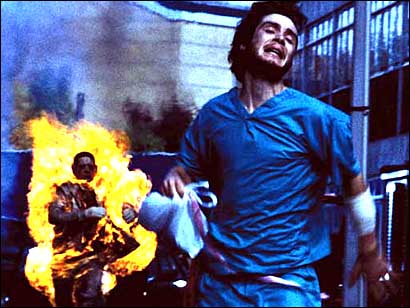 1) How the hell did the disease spread to other countries? It takes 20 seconds for people to go from normal to zombie after infection, so how would the disease cross the English Channel, much less the Atlantic Ocean? I suppose that a boat being boarded could become infected and then leave, fleeing in terror. Same with a plane. The captain could lock him or herself in the navigation room thingie until they got to where they wanted to go, but A) that would mean that the zombies wouldn't be able to break down a door, B) the person navigating would have to be scared stupid to think it smart to dock or land somewhere, and C) wherever they would try to go would have to be really fucking stupid to not shoot the hell out of anything coming from Zombie Town, UK.
1) How the hell did the disease spread to other countries? It takes 20 seconds for people to go from normal to zombie after infection, so how would the disease cross the English Channel, much less the Atlantic Ocean? I suppose that a boat being boarded could become infected and then leave, fleeing in terror. Same with a plane. The captain could lock him or herself in the navigation room thingie until they got to where they wanted to go, but A) that would mean that the zombies wouldn't be able to break down a door, B) the person navigating would have to be scared stupid to think it smart to dock or land somewhere, and C) wherever they would try to go would have to be really fucking stupid to not shoot the hell out of anything coming from Zombie Town, UK.
2) The alternate ending. What the bloody hell? If we’re going to be forced to sit through some very loud credits, we damn well best be handsomely rewarded (Matrix Reloaded, you could take perk your ears up). And while CCC does think that a writer/director's vision (in this case, presenting the original ending to the film as a "What if...") is more important than the whims of stupid audience members, the slightly open-ended alternate original was wholly unsatisfying compared to the new, shot on film, w00t w00t happy ending. And the new ending isn't really much of a "What if...", so much as an "Or...". The difference in the two is that a "what if" should produce a definitively different ending (which it didn't), whilst an "or" just shows some small differences (which it did--ok, the death of a character isn't so small, but still, the two endings aren't mutually exclusive, which is what was expected).
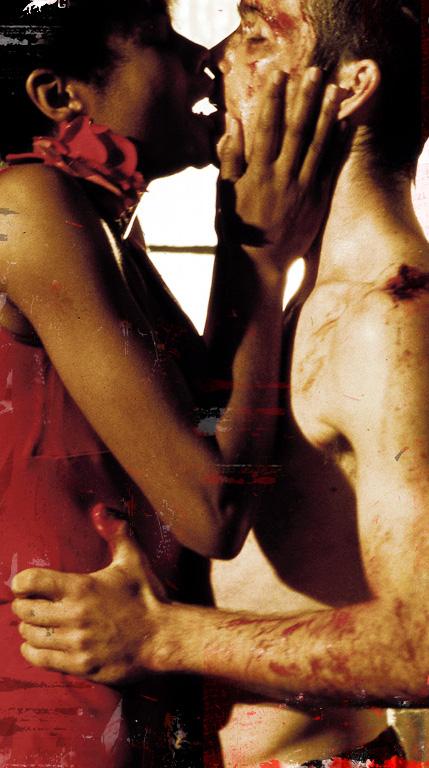 3) "I hate you!" What!? Why is this zombie demon baby child saying this? In case you don't remember, when Jim enters the hamburger stand (a stupid movie decision in the first place) a young kid attacks him, only to be beat down by Jim and his trusty bat, Zombie Smasher. The kid, silent when sneaking up on Jim, jumps on him and shouts, "I hate you!" Yes. He says this. Despite seeing many a zombie in the movie, and knowing that they're infected with "rage", this is the only time one of them speaks. And in our opinion, being able to say "I hate you" denotes a certain amount of intelligence. In fact, knowing grammar gets you pretty high up there. The zombie didn't say "Me hate you," or "Me hates you," or "Hate," or "We hate you, my precious." It had subject-verb agreement and correct first person singular going on. And le zombie said "I hate you" in a clear, loud voice. No grumble or mumble or growl. WHAT THE FUCK?!
3) "I hate you!" What!? Why is this zombie demon baby child saying this? In case you don't remember, when Jim enters the hamburger stand (a stupid movie decision in the first place) a young kid attacks him, only to be beat down by Jim and his trusty bat, Zombie Smasher. The kid, silent when sneaking up on Jim, jumps on him and shouts, "I hate you!" Yes. He says this. Despite seeing many a zombie in the movie, and knowing that they're infected with "rage", this is the only time one of them speaks. And in our opinion, being able to say "I hate you" denotes a certain amount of intelligence. In fact, knowing grammar gets you pretty high up there. The zombie didn't say "Me hate you," or "Me hates you," or "Hate," or "We hate you, my precious." It had subject-verb agreement and correct first person singular going on. And le zombie said "I hate you" in a clear, loud voice. No grumble or mumble or growl. WHAT THE FUCK?!
4) A small thing, but what happened to all the cats and dogs? Can they catch "the rage"? Why were chimps chosen in the first place? Their immune system isn't the closest one to ours, is it? If they can catch it, why not other/all animals? CCC supposes the scene in the tunnel with the wave of rats outrunning the zombies explained that animals were afraid of zombies, but we think that there should be some zombie animals around. Like zombie horses. How completely awesome would it have been if that pack of horses had turned out to be zombies and descended on our band of travelers? Eh? Eh?
5) Why the hell must all end of the world movies (which this wasn't, it turns out) hit us over the head with the "man kills man, left-over man must rebuild society, oh, wait, left-over man is actually crazy and re-enacts Lord of the Flies, left-over man is beaten by other, hotter left-over man and we all see the evils of our ways". This one really didn't need much of the third act. They could have just left it there and not turned Jim into...
6) ...The Terminator. Where did Jim get all these skillz-with-a-zed? Just because your kinda woman and your kinda daughter are about to get raped and crap doesn't mean you’re suddenly imbibed with all sorts of atheletic abilities and a death grip. And why does the movie bother making us think he's a zombie? It serves no purpose. Unless he were to become a zombie with a gold heart. Awww...
Ok, writing all this has made C3 dislike the movie a little bit more than he thought he did. So here's what's good about 28 Days Later:
-Well thought out "what would happen if the world were ending" scenarios involving food, water, and the way people find each other
-Blowing up zombies with land mines
-Pretty red dresses (for girls about to get raped :-/)
-Starving zombies
-A satisfyingly heartwarming ending
-Priest zombies
-Selena (played by Naomie Harris) being an ass-kicking chick
-Jim and his hot ass
-Zombies, now with vomiting action
-Some beautiful videography
-Scary scary zombies that wiggle funny because they're angry
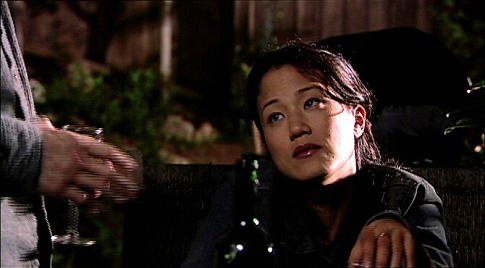 Sometimes Cinecultist likes to play a little game, what do these movies have in common? The pictures in question, screened in the last few days, are Hidden Fortress (a Kurosawa/Mifune at BAM), Double Happiness (a Canadian indie on IFC) and Charlotte Sometimes (a recent indie at Cinema Village). After some brain crunching we decided what makes these movies interconnected (besides the fact that CC watched them all within a few days of each other), are their puzzling Asian women characters. Jet black hair, defiant eyes, murky motives and ready to kick a little ass, we can't take our eyes away.
Sometimes Cinecultist likes to play a little game, what do these movies have in common? The pictures in question, screened in the last few days, are Hidden Fortress (a Kurosawa/Mifune at BAM), Double Happiness (a Canadian indie on IFC) and Charlotte Sometimes (a recent indie at Cinema Village). After some brain crunching we decided what makes these movies interconnected (besides the fact that CC watched them all within a few days of each other), are their puzzling Asian women characters. Jet black hair, defiant eyes, murky motives and ready to kick a little ass, we can't take our eyes away.
 CC really loved watching Yojimbo last week, an earlier entry in the BAM series, but CC and our samourai-loving friend MD agreed that the Fortress left a little to be desired. A half hour too long, a meandering plot and not enough fight scenes left us itching for other Kurosawas we'd loved before. But the film does contain one serious Princess Yuki in some serious short shorts. She'd as soon smack you with her bamboo switch as look at you. Perhaps our general disappointment in the movie springs from wanting the fortress to be more blatently like the Death Star, since it's established among sci-fi geeks that Lucas drew extensively from the film for the Star Wars trilogy. We decided hashing out how bits from each movie coincided was a little too dorky, even for us.
CC really loved watching Yojimbo last week, an earlier entry in the BAM series, but CC and our samourai-loving friend MD agreed that the Fortress left a little to be desired. A half hour too long, a meandering plot and not enough fight scenes left us itching for other Kurosawas we'd loved before. But the film does contain one serious Princess Yuki in some serious short shorts. She'd as soon smack you with her bamboo switch as look at you. Perhaps our general disappointment in the movie springs from wanting the fortress to be more blatently like the Death Star, since it's established among sci-fi geeks that Lucas drew extensively from the film for the Star Wars trilogy. We decided hashing out how bits from each movie coincided was a little too dorky, even for us.
 Sandra Oh, one of the Canadian thespian elite, should be experiencing some serious US cross-over soon as she's set to appear in a bunch of new releases including Under the Tuscan Sun with Diane Lane and she's married to indie auteur Alexander Payne. Also, she kicks some serious ass. Her performance is this 1994 release, Double Happiness is really delightful and will make you forget she ever graced the HBO small screen in Arliss. CC shudders to even think of it. Here Oh plays an actress caught between her Chinese parents traditional expectations and her aspirations for independence. Check it out on tv or from your local video store so you too can say you knew Sandra when.
Sandra Oh, one of the Canadian thespian elite, should be experiencing some serious US cross-over soon as she's set to appear in a bunch of new releases including Under the Tuscan Sun with Diane Lane and she's married to indie auteur Alexander Payne. Also, she kicks some serious ass. Her performance is this 1994 release, Double Happiness is really delightful and will make you forget she ever graced the HBO small screen in Arliss. CC shudders to even think of it. Here Oh plays an actress caught between her Chinese parents traditional expectations and her aspirations for independence. Check it out on tv or from your local video store so you too can say you knew Sandra when.
Our third intriguing Asian chick is Jacqueline Kim, the eponymous Darcy/Charlotte in Eric Byles's Charlotte Sometimes. What's she doing? Where's she going? Who will she screw over next? We're puzzled but still incredibly intrigued. One of the sexiest movies Cinecultist has seen in a long time, as the currents of tension flash between the four leads CC could almost see the air crackle. We'd liked the trailer but really went after reading Mike D'Angelo's rave in Time Out New York a few weeks ago. About loneliness and family and desire and all those good things, it's the bet kind of independent filmmaking. And though the Asian-ness of the actors and director is on the narrative's periphery, it's still intriguingly essential at the same time.
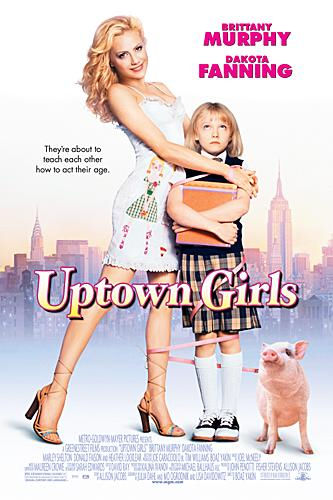
As the title demanded, PCC, CC and K8 trekked uptown on Saturday for a evening screening of Uptown Girls. The theater was surprisingly full, and not with the target teen girl audience. Most of the audience was composed of people around Cinecultist et. al's collective age, which PCC found amusing. Overall, the consensus was a moderate thumbs up, though it was agreed that the skeleton that has invaded the artist formerly known as Brittany Murphy should eat several platefulls of carbs. Aside from her off-putting sinewy-ness, Ms. Murphy had surprising chemistry with her small costar, Dakota Fanning. All agreed that the scenes between Murphy's Molly and Fanning's Ray were the best parts of the film. Many of their interactions were surprisingly touching, especially since PCC had envisioned a large portion of the film to be comprised of various cute montage sequences of the girls bonding and frolicking in Central Park. But the script actually touched on some larger, more thought-provoking issues, such as the death of a parent, the relationships children form with adults and how to deal with grief. This is not to say that Uptown Girls was a deep, art-house drama. But it was more serious than PCC had bargained for.

Finally, a good word must be put in for the phenomenal Dakota Fanning. Unlike many child actors who seem to have a limited emotional range, Fanning is as expressive as any adult. When she's mad, she's mad! She wasn't overshadowed by Murphy- far from it. Fanning isn't a showy actress, but she has an amazing screen presence for someone so young. Comparisons to a young Jodie Foster come to mind...
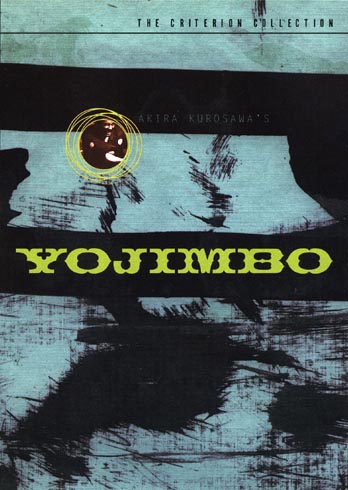 A mysterious stranger wanders into a deserted town. The fearful innkeeper informs him that two rivals gangs are at war and that the stranger best eat his meal quickly and get the hell out while he can. The stranger eats his food in silence and then informs the innkeeper that he's here to stay. A premise that sounds like it could be the start of any number of Westerns, this is the opening of Akira Kurosawa's Yojimbo which played as part of the on going Return of Kurosawa & Mifune (originally shown at Film Forum last year) at BAM Rose Cinemas, a series well worth checking out as it continues throughout August.
A mysterious stranger wanders into a deserted town. The fearful innkeeper informs him that two rivals gangs are at war and that the stranger best eat his meal quickly and get the hell out while he can. The stranger eats his food in silence and then informs the innkeeper that he's here to stay. A premise that sounds like it could be the start of any number of Westerns, this is the opening of Akira Kurosawa's Yojimbo which played as part of the on going Return of Kurosawa & Mifune (originally shown at Film Forum last year) at BAM Rose Cinemas, a series well worth checking out as it continues throughout August.
Kurosawa has this wonderful ability to create real characters out of his motley crew of actors, many with mugs only a mother could love, like the seriously furry brows on one gangster's dumb brother (Daisuke Kat). Unless of course, you're a mother in a Kurosawa movie, then you're a complete domineering bitch. Unlike Throne of Blood or Ran (both excellent Kurosawa's in their own right but very earnest), Yojimbo and its main character Sanjuro the mercenary samurai (Mifune), both have an excellent wit and sense of comic in the tragic. The plot winds around the large cast as Sanjuro double crosses and then double crosses again the townfolk, getting them to act just as he plans, but constant throughout are the unexpected laughs.
Most curious perhaps in the movie is the fight scenes, wherein the bumbling thugs hack at each other with their swords as though they were brutal machetes, not skilled instruments. Even Sanjuro wields his as an object to be used with power, not finesse, but only after he's worked every mental machination possible first. Another ronin carries a gun, a long thin phallus he aims from out of the middle of his robe, but he comes off as a misguided hot head not playing fair having a fire arm. Like all good Westerns, his death can be read as oddly homoerotic, as he pleads for Sanjuro to hand him his gun. He feels naked without it, he gasps. Sanjuro obliges but that's because he doesn't need a penis substitute, he's a real man who saunters out of town as the credits roll. It's true, Westerns just are better when they're set in the East.
Yojimbo and the sequel Sanjuro are also available on Criterion DVDs.

On Friday, PCC and friend K8 trekked uptown to the somewhat swanky arthouse venue, the Paris Theater, for a showing of the new Merchant-Ivory film, Le Divorce. PCC had that familiar tension in her stomach, the tug-o-war between her sky-high expectations of the film, owing from her recent completion of the Diane Johnson novel upon which it is based, and the subsequent fear that since she was so excited, the film in question would be worse than a Russell Crowe double feature. That said, Le Divorce wasn't half bad. In fact, it was damn enjoyable.
This is not to say that there weren't some minor irritations and plot confusions. But overall, when the curtain closed (and at the Paris Theater, it really did!) on Friday night, PCC's anxious stomach was placated. But first, let's get complaints out of the way. PCC and K8 both agreed that the narrative was a bit choppy. Not so much that one's enjoyment of the film was significantly lessened, but enough that there were several moments of puzzlement, of head-scratching and double takes: "now, how did that happen?" "how does that fit in?" PCC bets that most of these narrative hiccups are due to the fact that Johnson's novel is so replete with details and subtle plot points that transferring them all into a two hour film would be impossible.
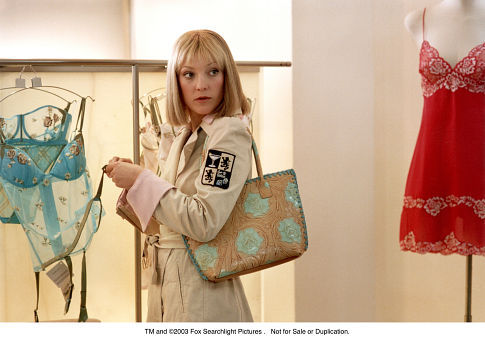
On a related note, PCC and K8 both noted the fact that Kate Hudson's Isabel was rather one-dimensional. This is sad, since in the book she was well-rounded-a heroine you felt you could relate to. But again, the task of condensing a densely detailed 300-page novel into a two hour film is most likely to blame. It should also be noted, in the film's defense, that the novel is told in first person by Isabel herself, while the film (thankfully) avoids a similar voice-over narration. So, while Hudson did an excellent job with what she was given, PCC can't help but wonder how amazing she would have been if the entire book had been made into a film, albeit one several times the length of The Godfather.
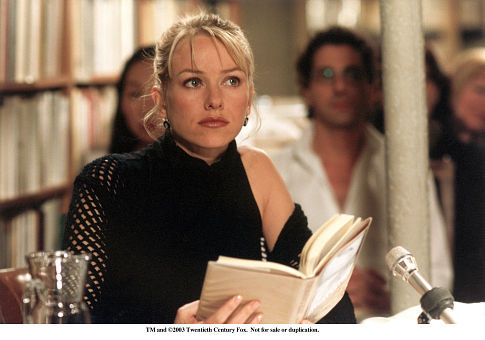
Enough quibbling about adaptation problems, on to some praise! PCC must congratulate Naomi Watts for another stellar performance. As Roxie, the 'American in Paris', Watts is able to convey all the hurt and rejection she feels when her French husband, Charles-Henri, leaves her unexpectedly for a strange Russian woman named Magda, as well as the increasing anger over the perceived sexism of the French legal system when it comes to divorce. And all this is accomplished with a tilt of the head, a stray tear, a concise yet biting speech in the lawyer's office. There are also the instances that are just as brilliant, though nowhere near as subtle. PCC's favorite is when the diminutive- and pregnant!- Watts launches a purse-attack on poor Matthew Modine, the slightly psychotic American husband of Magda. Just when you think Roxie has taken the high road and walked away from the situation, back she flies, almost leaping onto Modine's back and giving him one last thwack over the head with her bag. Priceless.
Overall, with its lush shots of Paris and the French countryside, Le Divorce should be chalked up as another hit for Mechant-Ivory. Sure, it might not be as critically regarded as the several E.M. Forrester adaptations Ismail and James have to their credit, but this latest venture has a terrific cast, an intriguing story and, of course, Paris. What more can you ask for?
Cinecultist doesn't tell a whole lot of people this, but since we're so close, we think we're ready to share. In high school, CC was a Thespian. We even had a card from the Thespian Society to carry around in our wallet proving to the world that we were a theater geek. With this background, we expected to enjoy Camp, a movie about a performing arts summer camp.
 But J and CC agreed that Camp is perhaps one of the worst movies we've seen in a long time. Like an episode of 7th Heaven or other After School Special ilk but with bad singing, two hours long and no commercials was the consensus. For such a supposedly queer-positive teen movie (one character's introduced in high drag at his junior prom), there's nary a real homosexual encounter. Not even some pretty boys kissing, just lots of awkward hetero lip lock and terrible, terrible musical numbers. The Stephen Sondheim cameo comes too late to salvage any of the hackney emoting and the ten odd minutes of charming bits throughout seem only to be insulting the audience's intelligence.
But J and CC agreed that Camp is perhaps one of the worst movies we've seen in a long time. Like an episode of 7th Heaven or other After School Special ilk but with bad singing, two hours long and no commercials was the consensus. For such a supposedly queer-positive teen movie (one character's introduced in high drag at his junior prom), there's nary a real homosexual encounter. Not even some pretty boys kissing, just lots of awkward hetero lip lock and terrible, terrible musical numbers. The Stephen Sondheim cameo comes too late to salvage any of the hackney emoting and the ten odd minutes of charming bits throughout seem only to be insulting the audience's intelligence.
Even more shocking than Sondheim's participation, we noted such current musical luminaries as Stephen Trask, John Cameron Mitchell, Christine Vachon and Paul Thomas Anderson credited or thanked in the credits. Someone needs to remind the writer/director of this horror show, Todd Graff, that to fulfill Susan Sontag's prescription for camp of "failed seriousness," the production need to be as self-aware as it is embarrasingly earnest.
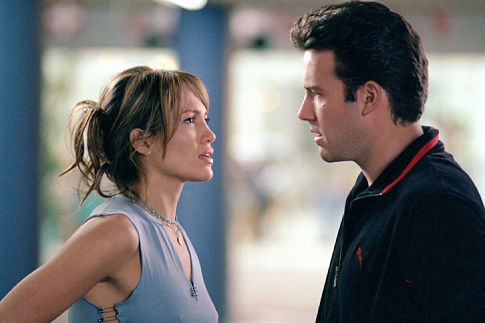 Cinecultist did indeed attend a Saturday afternoon screening of Gigli, damn that alien-implanted J.Lo-lovin' chip. CC thinks that, like most of the people who's hard earned money contributed to the movie's mediocre grosses for the weekend, we wanted to see if it really would be as bad as we'd heard. It was. Gigli's a train wreck. Martin Brest is asleep at the wheel. Jen and Ben have little on screen chemistry to speak of and if CC ever hears the phrase "the Baywatch" again, we might have to hurt somebody.
Cinecultist did indeed attend a Saturday afternoon screening of Gigli, damn that alien-implanted J.Lo-lovin' chip. CC thinks that, like most of the people who's hard earned money contributed to the movie's mediocre grosses for the weekend, we wanted to see if it really would be as bad as we'd heard. It was. Gigli's a train wreck. Martin Brest is asleep at the wheel. Jen and Ben have little on screen chemistry to speak of and if CC ever hears the phrase "the Baywatch" again, we might have to hurt somebody.
If CC were Elmore Leonard, we'd be expecting a royalty check right about now because Gigli wants so desperately to be a quirky and fanciful gangster tale like Get Shorty or even Out of Sight. Yet Gigli never fills in its characters' back stories, so the charisma of the actors and the alleged wackiness of the situations is expected to take up the slack. Kidnapping the mentally handicapped = crazy. Lesbian new age gangster = wacky. Reading the promotional packaging labels as bedtime story = hi-larious. Yet none of these supposed screwball scenes have any punch or momentum, they lie there on the screen with vast silences and odd looks passing between the actors which could have easily be excised by a good editor.
Gigli's filled with disjointed moments and bizarre encounters with ordinarily passable character actors. Al Pacino (as the bad ass gangster in a horrid grey ponytail) and Christopher Walken (as a suspicious cop) wander on screen, gesticulate a bit, explicate some plot, gnaw some furniture then disappear without a trace. Lanie Kazan (the mother from My Big Fat Greek Waste of Time) plays Gigli's mother and upon learning of Ricki's lesbian leanings leers at her like a love-starved sailor, and at the same time urges her to give the penis another try, since Mom can tell Ricki has dabbled in the past. Huh?
But the award for weirdest moment in this movie has to go to Jen's extended vagina monologue wherein she rhapsodizes on the merits of "that hole, those lips, the source of all life." While doing yoga. In a bra top and short shorts. It is like the red, white and blue Bardot body in Contempt, in terms of spectacle but without Godard's cynicism. For the fans of J.Lo's insured assets, she does wear a parade of ass-tastic outfits like ultra low rise pants and a practically indecent jean skirt but the capper is her Britney-style safety pin top. People around CC in the theater literally gasped when seeing her in this top as all thoughts of the plot flew out the window. The lesbian ex just tried to kill herself in the kitchen? Who cares when we can see Jen's not wearing a bra.
Luckily for anyone concerned that Jen might persuade a whole generation of impressionable young women to dabble in the dark side, her co-star is Ben the original cinematic sapphic converter. Normative heterosexuality reigns as the couple single-handedly keeping US Weekly in business ride off into the sunset. Now, will the alien chip please leave CC alone? Until Jersey Girl comes out anyway.
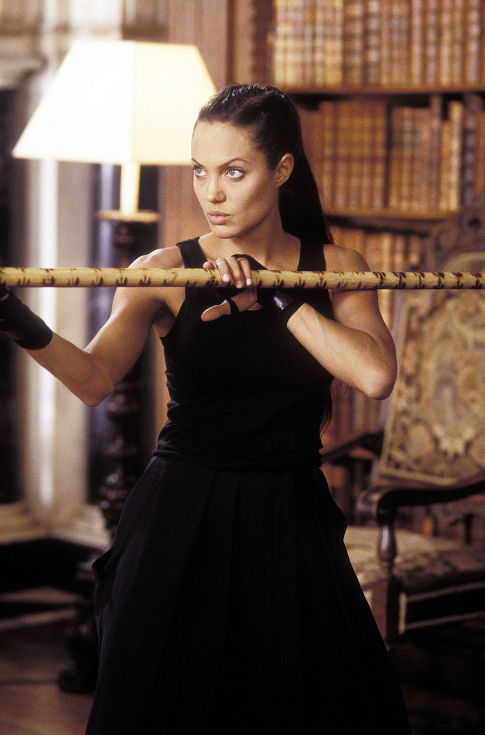
On opening night, PCC and CC joined a theater full of videogame-worshipping males (and a few of their quasi-dates) to watch Angelina Jolie kick some serious ass in Tomb Raider: The Cradle of Life. Now, this wasn't a series of tame, girly catfights, complete with obligatory bitch slaps and hair pulling. This was guns at sea, guns underwater, guns while on horseback, guns in every conceivable position (and a few inconcievable ones). The consensus was the Ms. Jolie could take out the entire Cinecultist staff with one swift kick.
As for the actual story, PCC is pleasantly surprised that now, almost a week later, she still remembers the 'plot', whereas the plot of the first installment is long gone. Lara (Jolie), while traipsing around Greek islands, discovers the lost temple of Alexander the Great, along with a map hidden within a strange orb/magic box, leading to Pandora's box that, when opened, will release the worst plague known to mankind. Of course, the Evil Contingent that's never far behind steals the box from our heroine, forcing Lara to travel from Greece to Hong Kong to Africa in search of it and its uber-evil new owner, Jonathan Reiss (Ciaran Hinds, who, though Irish, always seems to play some sort of villian from behind the Iron Curtain).

PCC and CC decided that, while Tomb Raider was a throroughly enjoyable experience, they weren't sure how much they would have enjoyed it if Ms. Jolie didn't play the title role. The woman is amazing. Really. She's tough, yet incredibly sexy. For a perfect example, pay close attention to the scene on the boat when, mid-kiss and dressed only in a sarong, Lara easily flips Terry (Gerard Butler) over on his back and straddles him and handcuffs the naughty Scot to the nearby bedpost. Wow. Both critics were pleased that Lara seemed to flirt less in this film, instead using her wits to solve the puzzles. Brains AND beauty, an excellent combination for a globe-trotting archeologist.
In closing, it should be noted that both PCC and CC were pleasantly surprised to discover that, even amidst the gunfire, there were actual messages to be derived from the film. Lara's search for the box and her insistence that everything lost should be found is an interesting position to ponder, especially in the field of archeology, where those like Lara must always try to balance the desire to discover with the need to leave the past, and its inhabitants, as undisturbed as possible.
When we live in Cinemascope, the world's an extreme rectangle. Much more seems to be happening around the edges and we can see all the characters enfolded into one composition, their actions and reactions visible in real time. The American Musuem of the Moving Image in Queens is showing a series of 70mm classics, Eyes Wide Open: The Evolution of Widescreen Cinema, two of which CC caught yesterday in the perfect antidote to a horribly humid Sunday, the double feature.
We headed out to Queens with the inimitable J but of course saw other New York repetory theater regulars there (some friends like W, quasi-acquaintences and even a nemesis). It's understandable because even though the movies weren't what one would think of as the "crowd pleasers" in the series (like last week's Contempt, or the up coming 400 Blows or West Side Story) they were both unusual, hard to see films. The first, a Douglas Sirk melodrama shot in black and white (hence the unusual part for that master of color) with Rock Hudson, called The Tarnished Angels, then a Japanese drama from the '60s by Nagisa Oshima, The Sun's Burial.
For an analysis, let's just say neither movie's a masterpiece and there's a reason why you've probably never heard of them. Yet both had a few really gorgeous shots, or well-executed sequences or intriguing moments with odd characters. CC would not urge you to go out and rent them, because that's the point of a 70mm festival, you should see these movies in their large format glory. Rather, the point to take, from this oddly matched double bill, is that just because a picture's not in the canon does not mean it should be forgotten. And some things just look better projected across a wide screen.
After the sickening thought that too many summer blockbusters had caused CC's brain to ooze out the ears, we took in the well-reviewed indie I Capture The Castle. We were pleasantly surprised that well-drawn young women characters still inhabit the silver screen and even more pleased that CC can still appreciate them, thoughtfully and with big words like effervescent (as in star, Romola Garai's irrepressible personality) and tremulous (to describe her character, Cassandra's tenderly blossoming womanhood).

Like a good Jane Austen novel, Cassandra (coincidentally, the name of Jane's beloved sister) lives with her elder sister, Rose and their penniless but creative family in a remote castle in Southern England and spend their days rambling the picturesque country and fearing that they'll never marry. Although, instead of it being the late 18th century, the Mortmain family live in the relatively liberated 1930s where they can talk about assignations in the British museum's mummy room and how father's writing talent may be all dried up. To break the monotony, two young men, brothers (Marc Blucas of Buffy fame and Henry Thomas the ET kid all grown up), the eldest who's inherited the estate on which the Mortmain's live, arrive and the girls get caught up in finagling a proposal from the eldest, Simon (Thomas) for Rose. See, it's all very Jane.
What makes this film so lovely and engaging though, is that these characters don't really stand on the ceremony so characteristic of Austen's drawing room farces. They're real girls with fears, fantasies and dreams and as Cassandra records her thoughts in her journal, we get the honest portrayal of a young woman's emotional and sexual awakening reminiscient of Anne Frank (without the Holocaust) or Bridget Jones (without the bitter). Much of this rests on the charm of Garai, who's set to star in Dirty Dancing: Havana Nights later this year with one of the hot guys from Y Tu Mama Tambien. Let's hope this is her Man In the Moon and we're witnessing the birth of a new Reese, not the beginning of a career in purely teen fare ala a Kirstin Dunst.
After the credits began to roll, and a few of the young women around me tried to dry their eyes (the end is quite moving), this crazy woman asked a person near her, "what happened at the beginning of the movie?" A bunch of us laughed, partly at the absurdity of being late to the movies and not being able to figure out the set up. But also at the way I Capture The Castle had brought us on a journey, like the best movies do, and to try to explain the beginning at the end is entirely ridiculous. Guess that lady'll just have to pay to see it again.
Cinecultist has seen some really bad movies in her day. Terrible insults to celluloid. Travesties in cinematic history. Puke on screen. Three to Tango. Resident Evil. Kalifornia (okay, so we turned that one off before watching the end, but we got the drift). Children of the Corn. After yesterday, CC has a new one to add to the pantheon, The League of Extraordinary Gentlemen. Although to call it bad, is not really to mine the depths of the pain this movie induced in us, it is more about severe mediocrity.
We hear that LXG is a kickass comic book and let's hope that's why our friend, G, who usually has such good taste, suggested we attend. Always up for a little schlocky action amidst the a/c on a summer evening, CC agreed. But as the film wore on and on, we found ourselves bogged down in some serious plot issues and lost in holes in the characters. Here's a few questions CC contemplated during this movie:
Isn't Dorian Gray supposed to be queer? (Stuart Townsend should have been giving the look to Shane West, not Peta Wilson his "lov-ah.")
Wasn't Tom Sawyer set in pre-Civil War times? What's he doing cherubic in 1899?
Was Kenya called Kenya in 1899?
Did they have tanks then?
Or automatic machine guns?
How does Captain Nemo's giant ship fit through the canals of Venice?
Isn't Carnivale held in February, not July?
If Mina Harker's a vampire, how can she go out in the sunlight?
When stabbing her, was it really necessary to make a joke about getting to "nail her one more time"?
And the list goes on, but CC won't belabor the point that for all the fancy shooting, literary characters, growling Sean Connery who's always good for a campy laugh and whatnot, LXG is perhaps the worst thing we've seen in a long time. We never thought we'd say this but, your better bet this weekend is to go with a, *gasp* Jerry Bruckheimer produced movie like Pirates or Bad Boys II. (Excuse us while we go splash some ice water on our face to try to snap out of this.)
Last night, Cinecultist dragged her tired toochas uptown for one of the Alain Delon (aka the Delon-athon) screenings at Walter Reade, Jean-Luc Godard's Nouvelle Vague. Just as we suspected, a few of our favorite pretentious film types were in the house for this 1990 feature considered one of the best unreleased gems of the '90s according to Film Comment.
People who go to see Godard films, in our experience, tend to fall into two camps: those who earnestly LOVE Godard and those who are so over Godard yet attend nonetheless. Our seat mates included one from each side of the fence, A who likes to sit deadcenter three or four rows back from the screen, so at to be close enough to practically lick the screen and O, who declared he hated it as soon as the final credit flashed across the screen.
Where exactly does CC fall on this continuum? Somewhere probably in the middle, able to appreciate JLG's deft editing of sound and image together into something entirely unique yet still walking out of the theater knowing we didn't really "get" it. Whatever it might be. Godard lives for quotation, and Nouvelle Vague is positively peppered in allusion, although there's more of a sense that a line or shot might be an allusion without really being able to pin down its source. Like reading certain modernist writers such as Borges, Godard makes you realize how little you know and how much you have to learn. As a practice, CC tends to like it when he uses this power to make us laugh (like in A Woman Is A Woman) rather than feel guilty for our decadent bourgeois ways (as in any of his Maoist pictures).
Also, in case you were wondering, old Alain Delon, age 55 in this with Harrison Ford-esque folds in his face but lithe enough for shorts on the yacht -- still totally hot.
Last night, Cinecultist met her two musical mad friends at the Film Forum for a Freed double feature. J had promised some tempting things to lure CC to the cinema -- technicolor, MGM, Vincente Minnelli directs, Fred Astaire dances. It all sounds like Yolanda and the Thief could be a light, magical feature and a nostalgic evening at the theater. Instead, it was seriously painful.

When we thought about it later, really it was a case of extenuating circumstances outside of the movie's or my friends' responsibility. Smashed next to an anonymous armrest hogger on one side, forced to turn self into a human pretzel to try to find a little space, rolling the eyes at the three obnoxious girls in front of us who kept giggling and cheering at random parts ("the Babysitters' Club," JH called them), CC could not help but be a bit perturbed. Then the plot of this movie -- wherein crook Astaire travels to imaginary Latin American country and wooes a naive heiress by pretending to be an angel -- just got odder and odder. And the music sort of sucked. If a musical has no real plot but a bunch of hummable tunes, and a few choice dance numbers, CC can forgive. This thing had an extended dream ballet that wanted to be Dali surrealism meets An American in Paris inventive but instead was hackney and lame. Ooh, the heiress wears garlands that look like gold coins, we get it, 'cause she's rich. Even Freud couldn't have interpreted this one. We took off after the first movie, unable to stand it any longer.
Enough snark for one day, but don't let this review dissuade you from attending some of the other Classics of the MGM titles, or even musicals in general. Like any genre, there's a few stinkers in with the gems. Singin' in the Rain (a personal favorite) plays this weekend, Gigi runs on Sunday and we're set to try again with the musical friends at a screening of Meet Me in St. Louis next week on Thursday. That one has Judy Garland in it, guaranteed to be a winner.
Consider Cinecultist gobsmacked and bowed to the juggernaut that is the summer blockbuster. Just when we think we've got the formula sorted ("Movie based on Disneyland ride = Extreme Stinker), Johnny Depp comes along to louse it all up. Pirate cliches be damned, Pirates of the Caribbean is a really fun summer picture filled with spot-on physical humor, charming repeating gags and likeable, over-the-top characters.

As J pointed out after the 133 minutes unspooled, this movie wants to be a lot of things for a lot of viewers. Fantasy. Action Adventure. CGI Zombie Pirates. Love Story. And while in his educated opinion he thought the film couldn't quite keep up with all of these elements, CC thought Pirates held it all together well. The film suffers from that very now delusion that it must winkwink about its genre for the story to seem fresh and while this can make the movie seem busy, it's also very funny. Can a genre movie be earnest these days? Jerry Bruckheimer tells us, hell no.
A word also about Keira Knightley versus Orlando Bloom. Keira has star quality, as evidenced by her ability to glow, tell jokes and sell that swashbuckling. She was just adorable in Bend It Like Beckham, and since then, she seems to be grown up, or maybe this is just an actress inhabiting a new role with new body language. Either way, we see good things for her in future roles. Orlando, despite his weirdo curly hair and wispy beard is a heavenly eyeful. But we haven't seen any of the verve, any of the intelligence that Depp or Knightly exude so easily. Will he be able to shed his handsomeness to do some acting that's genuine? We're not entirely sold. Yet. Until then, CC's happy to drool.
All the boffo B.O. (that's box office grosses for those not subscribing to Variety's odd little e-mail newsletter) that Pirates is sure to get this weekend is heartily deserved. Enjoy it with a side of irony and a very large Diet Coke.
Here's what Cinecultist did this weekend: sat in the air conditioning. Some of the time it was at home, and some of that time was at the cineplex so you know it was a full three days. The recap goes a little like this:
 Friday CC met up with I for another one of the Heroic Grace movies at Walter Reade, this time Wong Kar-Wai's (subtitled!) Ashes of Time. This lush picture has all the markings of an epic with its large (and at times confusing) but very talented cast, a mythical story of great loves and disasterous betrayals, some fighting with swords and vast vistas to be gobbled up by the camera. Despite loving it, CC didn't really understand it mostly because old Kar-Wai refuses to present his scenes in anything resembling chronological order. Brigitte Lin is particularly wonderful as the man/woman warrior and Maggie Cheung is heart-breakingly beautiful, even though she does little beyond stare off into the sea. Watching Ashes of Time on the big screen made CC so happy for repetory festivals/revivals because the experience would not have been anywhere near the same if we'd just rented this movie. The deserts and the mountain streams need a large format.
Friday CC met up with I for another one of the Heroic Grace movies at Walter Reade, this time Wong Kar-Wai's (subtitled!) Ashes of Time. This lush picture has all the markings of an epic with its large (and at times confusing) but very talented cast, a mythical story of great loves and disasterous betrayals, some fighting with swords and vast vistas to be gobbled up by the camera. Despite loving it, CC didn't really understand it mostly because old Kar-Wai refuses to present his scenes in anything resembling chronological order. Brigitte Lin is particularly wonderful as the man/woman warrior and Maggie Cheung is heart-breakingly beautiful, even though she does little beyond stare off into the sea. Watching Ashes of Time on the big screen made CC so happy for repetory festivals/revivals because the experience would not have been anywhere near the same if we'd just rented this movie. The deserts and the mountain streams need a large format.
 On Saturday, CC watched many crap movies on television (we're talking Three Musketeers with Oliver Platt, Kiefer Sutherland and Chris O'Donnell -- not pretty, folks) until we headed out to meet A and R to see Friday Night at the Quad. The Quad, though it plays the unusual arty movies, has the narrowest seats ever. And we mean ev-er. But despite the potential uncomfort, CC really loved this film. So quiet, it is practically a silent film, with an unexpected thread of whimsy, Friday Night follows a woman meeting a man during a traffic jam and going with him to a hotel room. But beyond this affair or the details of plot, Claire Denis appears to be capturing an impression or a mood that surrounds this night in Paris. It may sound high falluting or boring but every frame engages. And it's damn sexy.
On Saturday, CC watched many crap movies on television (we're talking Three Musketeers with Oliver Platt, Kiefer Sutherland and Chris O'Donnell -- not pretty, folks) until we headed out to meet A and R to see Friday Night at the Quad. The Quad, though it plays the unusual arty movies, has the narrowest seats ever. And we mean ev-er. But despite the potential uncomfort, CC really loved this film. So quiet, it is practically a silent film, with an unexpected thread of whimsy, Friday Night follows a woman meeting a man during a traffic jam and going with him to a hotel room. But beyond this affair or the details of plot, Claire Denis appears to be capturing an impression or a mood that surrounds this night in Paris. It may sound high falluting or boring but every frame engages. And it's damn sexy.
After a browse through the Tompkins Square park greenmarket and a greasy brunch on Sunday, CC found herself drawn back to the art cinema this time Whale Rider. A Sundance audience fav, Niki Caro's feature follows a young Maori girl as she tries to draw her fractured tribe back together. With all the raves the movie's been getting, CC expected to lurve this movie but instead found it sort of slow and lackluster. Each individual scene and the performances have a quiet power but they don't propel the narrative forward. It lazes along rather than rushing to a destined conclusion. Though the scene with the whales did make the tiny hairs on CC's forearm stand up. Academy Awards for all those whales.
Yeah for summer days, controlled climates and the world of art cinema.

Aussie director Scott Roberts' new caper film The Hard Word had several intriguing elements for PCC, the burgeoning Down Under-phile:
1. Six Feet Under's (among other admirable projects) Rachel Griffiths. The woman is amazing, playing everythng from an American housewife (The Rookie) to a British prostitute (My Son the Fanatic).
2. Guy Pearce. It is rare that PCC is able to forgive an actor for such an abysmal starring role as Guy's in The Time Machine, but Mr. Pearce has been absolved. If you haven't seen him in Memento, please stop reading and slink off to your local video store (or Netflix rental queue) and procure Christopher Nolan's amazing film.
3. The promise of an intelligent (Australian!) crime film that (hopefully) would not dissolve into a long, drawn-out shoot 'em up fiasco with elaborate, yet strangely unoriginal, car chases.
That said, Roberts' film delivers admirably. The story centers around three Australian brothers- Dale "the smart one" (Pearce), Mal(com) "the good one" (Damien Richardson) and Shane "the fuck-up" (Joel Edgerton)- all of whom happen to be bank robbers. Griffiths plays Carol, Dale's allegedly two-timing wife. We follow the boys from prison through a series of heists, ending in a surprisingly satisfying climax. The film is conscious of the fact that it needs to rise above your basic stick 'em up bank robber flick, and it does so by not only adding depth to the main characters, down to the most minute detail of the brothers' individual prison duties, but also by adding another layer of suspense in the form of a corrupt lawyer and dirty cops who are trying to cheat the boys out of the money they've stolen. There's an element of Bonnie and Clyde here in the way the brothers elicit our sympathy even as they knock off banks, horse races and airplane hangers. We root for them, not because they're noble Robin Hood-protegees, but rather because, through Roberts' skilled direction, we see them as real people, with personality quirks and tangled love lives. And how can you not root for three Australian brothers who might be more like you than you think?
Yesterday, in a burst of pre-Independence Day weekend consumerist patriotism, Cinecultist doned the pink flip flops to catch an evening screening of Legally Blonde 2: Red, White and Blonde. CC had been really looking forward to watching Ms. Woods go to Washington, partially because the sequel title is just too much fun and because we liked the fluffy escapism of the first. Sadly, though the second movie was more Sweet Home Alabama-ish than Election-esque.
The first section, where the very charming Reese Witherspoon must come upon obstacles even though she's a perfect flurry of good-natured activity, worked very hard to be clever but didn't flow together in an "organic" way. Each bit seemed merely tacked on, and not in the goofy, illogical Elle sort of way that you'd expect. CC would follow certain members of the cast through any number of bad pictures, like Jennifer Coolidge, Mary Lynn Rajskub and Reese, and even Sally Field and Regina King have had their really stellar roles. But here, no one seemed like they had enough screen time to really satisfy. All in all the attention to detail that was so delightful in the first film, down to Elle's just so hairdoes and outrageous clothes, didn't seem to be a priority this time around. There were even moments where, godforbid, the blonde looked like a wig. *Gasp*
As is our wont when we can't recommend the picture in the theaters, let us guide you instead to some older works by Reese available on DVD. Freeway, a neo-Red Ridinghood story with Keifer Sutherland is fab. Also Man in the Moon, her film debut is just so delightful as Reese discovers her hormones with the help of one of the London brothers. And you can't go wrong with Pleasantville, as Tobey Maguire and Reese get trapped in an earnest '50s TV world along with hunky-dumb Paul Walker.
Happy Fouth of July, cinecultists! May your A/C be on full blast and your hot dogs not burnt too much on the grille.
 Bon jour! Allow us to introduce ourselves (my precious), we are Crizazy Cinecultist, the celebrity obsessed, hotness-seeking prong of this Cinecultist trident of power and might. CCC is here to tell you about Swimming Pool--hence our use of ye old French. The newest film from genre-hopping Gaul Francois Ozon, this film stars Charlotte Rampling as popular murder mystery authoress Sarah Morton, vacationing in France to help her relax and let the words flow. She stays at her publisher's house, a peaceful haven of quiet soon disrupted by John's daughter, the luscious Ludivine Sagnier(happy birthday, Luddy! You, too, Tom Cruise). Sagnier's Julie is the Oscar to Rampling's supposed Felix--having sex with different men at all hours, leaving wine and cheese out (the horror!), and incessantly listening to loud French techno. Just like Oscar. Lest we reveal too much, C3 shall cut this short. There's a little murder, a little dancing, and a little lesbian undertoning going on.
Bon jour! Allow us to introduce ourselves (my precious), we are Crizazy Cinecultist, the celebrity obsessed, hotness-seeking prong of this Cinecultist trident of power and might. CCC is here to tell you about Swimming Pool--hence our use of ye old French. The newest film from genre-hopping Gaul Francois Ozon, this film stars Charlotte Rampling as popular murder mystery authoress Sarah Morton, vacationing in France to help her relax and let the words flow. She stays at her publisher's house, a peaceful haven of quiet soon disrupted by John's daughter, the luscious Ludivine Sagnier(happy birthday, Luddy! You, too, Tom Cruise). Sagnier's Julie is the Oscar to Rampling's supposed Felix--having sex with different men at all hours, leaving wine and cheese out (the horror!), and incessantly listening to loud French techno. Just like Oscar. Lest we reveal too much, C3 shall cut this short. There's a little murder, a little dancing, and a little lesbian undertoning going on.
The clever thing about Swimming Pool is that it takes the familiar convention of making a movie about making a movie that reflects the movie being made, and spins it by making a movie about writing a book that reflects the movie being made. Also, since CCC is pathetic and thinks all movies are about voyeurism (ahem) in a Rear Window sort of way, we could see a little something something of that going on in this film.
A word about the actresses: We think we're in love with Charlotte Rampling. She has that Isabelle Huppert quality about her, a fierce intelligence and dangerous sexuality that makes it exciting to see her play someone that sneaks a few drinks and flashes her breasts to distract people.
Speaking of flashing breasts, CCC was dumbfounded by Sagnier. Girl done gone and growed up since 8 Women. The French do like their topless sunbathing, and Ms. Divine participates in that tradition with wild abandon. It's a little disconcerting, though, to see this young woman, with her golden locks and short skirts, occasionally allow glimmers of her coltish youth to shine through. Her face still has a teenaged quality about it (she's 24) that throws one off when we've been seeing her smoking and drinking and sexing it up. She does hold her own against Rampling, however, and the two actresses are entrancing in their roles.
The end of the film is a nice little mind-bender that doesn't ring too false, though CCC wonders if the puzzle it brings up can ever be completed. We will, however, be third in line for Ozon's just completed (and hopefully feature length) film, 5x2.
Perhaps Cinecultist's (pretty negligible) testosterone got in the way of critical distance but CC really enjoyed Charlie's Angels: Full Throttle. We don't usually do this -- as we prize ourselves on our far-thinking independent opinions 'round here -- but we checked in with the critic roundup on Rotten Tomatoes to see if the rest of the lads agreed. They found it to be 41% rotten so far. Hmmm.
We're talking about such statements as "what the picture represents, in a very real way, is the death of cinema." according to Walter Chaw of Film Freak Central and "the worst movie of the year" according to Chuck Schwartz of Cranky Critic. Who are these people? People with computers and opinions, that's about all CC can tell from a bit of cursory web research. However, even Elvis Mitchell at the Times says, "Charlie's Angels: Full Throttle is like eating a bowl of Honeycomb drenched in Red Bull -- a dizzying mouthful of unabashed silliness that leads to an equally precipitous crash once the buzz wears off after the film's first hour." Double hmmm.
Here's the thing -- CC liked it despite being outside the movie's projected commercial demographic. The girls are cute, they kick ass, there's lots of highly stylized camera work (McG HEART slo-mo), a pounding pop soundtrack (including that Pink single, "Feel Good Time" that we downloaded when we got home) and various campy villains. Sometimes, it is okay to like insubstantial crap. It's not going to change the face of cinema or result in any sort of apocalypse if every movie we watch, especially in the summer, isn't particularly mentally challenging. With that said, CC plans to watch Friday Night and Dragon Inn this week, just to balance out the lost brain cells.
Except for three ass kicking girl spies and a few English zombies, it's a light weekend at the cineplex. But, hey cinecultists, look on the bright side, it's time to spend getting caught up on the older releases you still haven't seen and maybe catch a picture at a repetory theater or at an outdoor space. Here's Cinecultist's suggestions on what to watch:
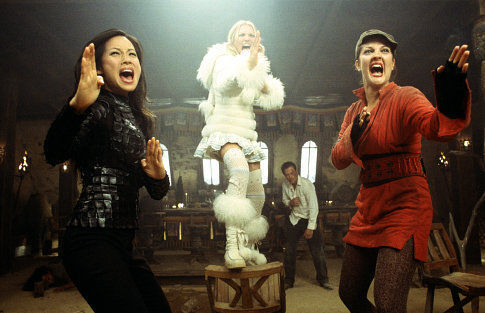
We would be remiss if we did not rhapsodize just a tad on the hotness that is the Charlie's Angels sequel, Full Throttle. Like the first Angels, a kicky cheeky little bit o' fluff with lots of outfits for our babe-licious trio and some fun Asian-style ass whomping, this sequel sounds like just about the same. It has the girls, Drew Barrymore, Cameron Diaz and Lucy Liu, a funny handler (Bernie Mac), some cute boys and various over the top evil characters (the come-back queen Demi Moore and Sir Creepiness Crispin Glover). There's some plot about stealing the angel's database but who cares when there's a car wash scene and those enormous billboards of the girls in bikinis? (Too much summer heat makes Cinecultist into a bit of a dude when it comes to summer films, bear with us.) CC will be there on Friday night with the hordes, not to worry.
We mentioned it last week when it opened in limited release here in New York, but this weekend 28 Days goes wide. It looks real good but also real scary as zombies descend on a diseased London. The kids over at Gothamist saw it a few weeks ago and liked it, and sadly this may be as close as CC gets because really we're wusses. Unless we can find some chatty friend who will first tell us the whole plot and then watch the movie again with us while holding our hand. See, we're big wusses.
That's about all on the big releases, so we'd recommend heading over to AMMI for one of the Polanski movies (Chinatown plays on Saturday at 1.30 pm) or perhaps try to catch one of the unusual action classics screened as part of the Heroic Grace: Chinese Martial Arts films series at Walter Reede. Film Forum also has the very superior double feature of To Be or Not to Be and Shop Around the Corner as part of the continuing Lubitsch Touch fest. Also some of CC's very good friends have been hard at work on MoMA's To Save and Protect series which is showing rare prints from the musuem's collection, in particular a new print of Jean Renoir's Nana with a simultaneous English translation. A very educational experience to be had at the beautiful Gramercy Theater.
Or, you could always go see Nemo again, if only to get in somewhere that has some A/C.
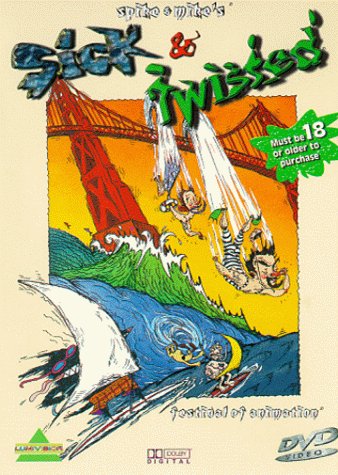 An annual tradition when Cinecultist lived in Davis, CA a town with *slightly* less cultural opportunity than New York, was the Spike and Mike's Sick & Twisted Festival of Animation. Held at the Crest Theater in the "historic" part of Sacramento, it was an excuse to get out for a night on the town. Granted CC, as a pretty serious attender of Women's Studies classes in college, shouldn't have been so into the boob-centric humor of S&M's cartoons. CC can't really speak to how good the shorts are (28 this year according to the flyer) but its silly, juvenile fun. That's something we all need from time to time.
An annual tradition when Cinecultist lived in Davis, CA a town with *slightly* less cultural opportunity than New York, was the Spike and Mike's Sick & Twisted Festival of Animation. Held at the Crest Theater in the "historic" part of Sacramento, it was an excuse to get out for a night on the town. Granted CC, as a pretty serious attender of Women's Studies classes in college, shouldn't have been so into the boob-centric humor of S&M's cartoons. CC can't really speak to how good the shorts are (28 this year according to the flyer) but its silly, juvenile fun. That's something we all need from time to time.
This weekend, this year's version comes to the Village East Theater from June 27-July 3. Just a final word to the wise, there are a few entries that rate "the date's all over" on the puke-o-meter, so keep this in mind when choosing your viewing partners. Also, if you missed the viewing dates at your local theater, many past years of Spike & Mike are available on DVD.
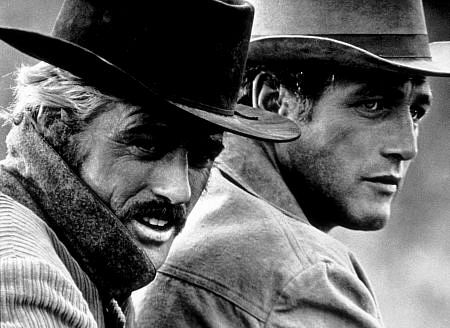
Just a reminder that the Bryant Park outdoor movie series begins tonight. Since the rain has finally cleared (as of the last time Cinecultist was outside of the a/c today), it might be the perfect evening for a little Bob Redford and Paulie Newman action. If the above picture does not get you in the mood, for Butch Cassidy and the Sundance Kid, CC doesn't know what will. Be sure to check out the rest of their schedule because picnicing, movies and summer nights are a combination not to be missed.
A question for the (movie) ages -- how can a genre that can be so charming and effervescient at times also be so very bad? Romantic comedies can make you (and when we say you, we mean Cinecultist) thrill to the possibilities of cinema. Or they can make you weep from the sheer number of cliches lobbed in your general direction.
This weekend, Cinecultist watched two rom coms. One which can be considered one of our new all time favorites, Ninotchka. The other which may now tie Three to Tango as the worst romantic comedy of all time, Alex & Emma. Feast or famine, as my mother likes to say.
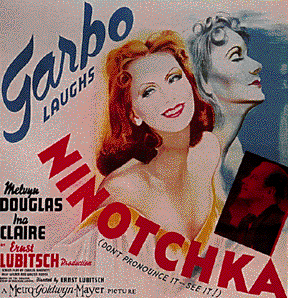 Greta Garbo, as Soviet diplomat Ninotchka, does her best to escape the siren call of Paris and Melvyn Douglas but she fails miserably. Whether it's the silly hat or his dashing moustache that draws her in, we don't know but Cinecultist couldn't keep her eyes of the great Garbo. She is the most charming one. Granted, Film Forum has its share of noisy, obnoxious patrons (as CC with the opinionated and also charming G discovered) but that's understandable considering the devotion Ernst "the Lube" Lubitsch's movies inspires. With its oh so sophisticated comedic dialogue, Billy Wilder's assured writing hand is all over the script as one liners zing and zang past. Also, Lubitsch sets up these delightful aural jokes where the visualization is left up to the audience but the comedy is clear. Walking out of the theater, CC couldn't help but grin from the pure pleasure of the movie. This is the kind of memorable viewing experience the true cinephile treasures.
Greta Garbo, as Soviet diplomat Ninotchka, does her best to escape the siren call of Paris and Melvyn Douglas but she fails miserably. Whether it's the silly hat or his dashing moustache that draws her in, we don't know but Cinecultist couldn't keep her eyes of the great Garbo. She is the most charming one. Granted, Film Forum has its share of noisy, obnoxious patrons (as CC with the opinionated and also charming G discovered) but that's understandable considering the devotion Ernst "the Lube" Lubitsch's movies inspires. With its oh so sophisticated comedic dialogue, Billy Wilder's assured writing hand is all over the script as one liners zing and zang past. Also, Lubitsch sets up these delightful aural jokes where the visualization is left up to the audience but the comedy is clear. Walking out of the theater, CC couldn't help but grin from the pure pleasure of the movie. This is the kind of memorable viewing experience the true cinephile treasures.
Alex and Emma on the other hand, and in particular Ms. Kate Hudson, felt flat like soda left too long open in the fridge.  Even the convention of switching between the period story being told and the current time, which can be fun what with the cute costumes and wigs, just seemed desperate. Luke Wilson's character, the novelist who owes the Cuban mob, was completely unlikable. He spews tired literary convention more akin to Jackie Collins than Dostoevsky and all the while Kate sits rapt. Can this steonographer, even with the mousy brown hair and personality probably acquired by correspondence, really be so hard up that the self-absorbed writer looks good to her? Perhaps it's not a good sign when you hope that the lovers don't end up together in the end because to watch the final triumphant kiss would be too cheesy for words. And let CC tell you, the spinning gazebo cross-cutting costumes shot is not worth 10 bucks. Consider CC the martyr who took this one for the team and save yourself.
Even the convention of switching between the period story being told and the current time, which can be fun what with the cute costumes and wigs, just seemed desperate. Luke Wilson's character, the novelist who owes the Cuban mob, was completely unlikable. He spews tired literary convention more akin to Jackie Collins than Dostoevsky and all the while Kate sits rapt. Can this steonographer, even with the mousy brown hair and personality probably acquired by correspondence, really be so hard up that the self-absorbed writer looks good to her? Perhaps it's not a good sign when you hope that the lovers don't end up together in the end because to watch the final triumphant kiss would be too cheesy for words. And let CC tell you, the spinning gazebo cross-cutting costumes shot is not worth 10 bucks. Consider CC the martyr who took this one for the team and save yourself.
Here's the final score: Lubitsch/Wilder = 1, Reiner = 0 (or less than).
What would the smell of summer blockbuster hype be? Coconut sunscreen flavored popcorn? Anyhow, it's in the air without a doubt. Let's break it down from most bloated to least.
It Must Be Spandex
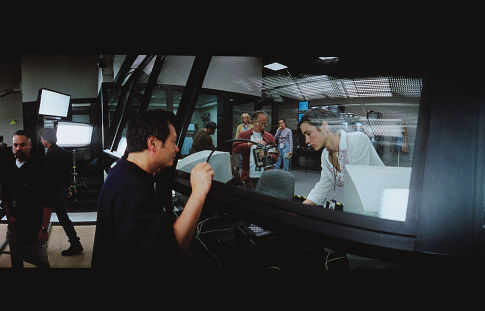
At least that's the thinking of EW's Lisa Schwarzbaum in regards to how the Hulk's pants stay on when he expands in size. Things in the film's favor: directed by Ang Lee (and supposedly the inspiration for the CGI Hulk's facial expressions), starring the gorgeous Jennifer Connelly (we liked her in Requiem for a Dream). More questionable elements: Nick Nolte doing his crazy man thing and Eric Bana trying to be a superstar. Everyone and their aunt will be there this opening weekend. Will you?
J2K
What's it about, From Justin to Kelly? Some say young love blossoming during Spring Break. Cinecultist says, another way for the money whores to cash in on this American Idol fanaticism. We're not on the bandwagon yet, but we did rent On the Line and Crossroads, so it's not like we're not open to being persuaded. And we like musicals.
Sap & More Sap
Kate Hudson and Luke Wilson sap up the big screen with this new Rob Reiner chick flick, Alex & Emma. Cinecultist loves this junk, but it really is terribly cliche of us. Our previous thoughts on the subject say it all.
Not the Sequel to Sandra Bullock Alcoholism Movie
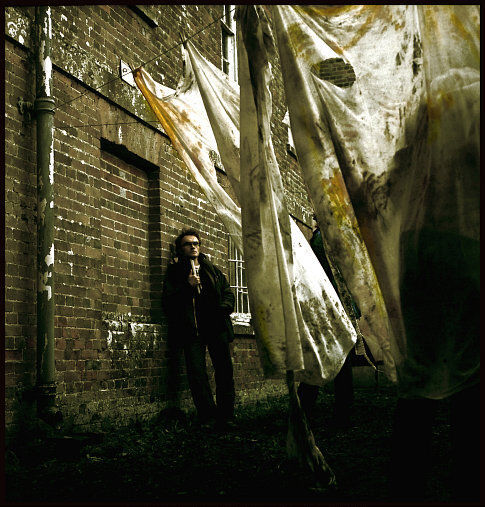 Danny Boyle brings his tale of post-apocalyptic zombies to our side of the pond, 28 Days Later. We like Danny Boyle, despite the Beach debacle but CC is sort of wary of scary movies. Okay, so we refuse to see them for fear of nightmares. CC's former roommate, L, will have to give us a full report because with the creepy looking previews we don't think we can bring ourselves to do it.
Danny Boyle brings his tale of post-apocalyptic zombies to our side of the pond, 28 Days Later. We like Danny Boyle, despite the Beach debacle but CC is sort of wary of scary movies. Okay, so we refuse to see them for fear of nightmares. CC's former roommate, L, will have to give us a full report because with the creepy looking previews we don't think we can bring ourselves to do it.
Francis Ford Produces
A film perhaps worth seeing for the visuals alone, The Legend of Suriyothai, one that recalls the sweeping spectacles of Cecil B. DeMille. Though drama and narrative continuity may be questionable, how often does one get to watch a film directed by a Thai prince? A.O. Scott gives it a mixed bag but supposedly it's the highest grossing film in Thailand ever and they're already planning the sequel. That could mean something, but we're not sure what.
Can't Get Enough of Claire
The art cinema critic circuit is raving about the newest Claire Denis film, Friday Night, so perhaps this is the best bet for the high art fans. Amy Taubin loved it. Though David Denby did not. Jim Hoberman seems to be torn. Perhaps it's time for you to weigh in.
All in all, avoid J2K and Alex & Emma if you can. PCC will be at Whale Rider and CC will be at Cluny Brown at Film Forum. Full Reports to follow.
 The good people at Gawker reminded us this morning that BAM is screening Lynne Ramsay's Morvern Callar tonight as part of the Village Voice Best of 2002. How could we have almost missed this, one of Cinecultist's favorite movies of last winter?
The good people at Gawker reminded us this morning that BAM is screening Lynne Ramsay's Morvern Callar tonight as part of the Village Voice Best of 2002. How could we have almost missed this, one of Cinecultist's favorite movies of last winter?
The times are 4:30, 6:50 and 9:10pm. To get to BAM from Manhattan, take the 4, 5, 2, 3, or Q train to 30 Lafayette Street between Ashland and St. Felix. But before we get ahead of ourselves, we'll remind you the film stars Samantha Morton as a young Scottish woman who's boyfriend kills himself just before Christmas. Instead of reporting his death, she covers it up (in a particularly grizzly fashion) and takes off for vacation in Spain with her friend. Your usual conceptions of morality, character causation and interiority in movies are suspended here. Prepare to have your world rocked. Enough of a recommendation for you?
If you're not in the New York area, CC supposes you'll have to wait for it to come out on DVD. Or you can consol yourself with the excellent soundtrack available online.
Which taudry summer fare will receive our hard earned cash this weekend? Cinecultist weighs in on the contenders like Don King (with less hair but more attitude).
In this corner we have -- THE SCHLOCKY SEQUEL:
2 Fast 2 Furious: CC's editorial board is torn on the issue of Vin Diesel. One member after seeing Pitch Black found that they'd see anything with him in it, knowing they'd be disappointed. Another, after seeing the same performance, liked him too well to be suckered into any further disappointing roles. Verdict on this installment? It stars no Vin, only lame Paul Walker and has no discernable plot. Tough sell.
In the opposite corner -- OSCAR WINNER'S NEW OUTING:

CC drool object du jour, Adrien Brody stars in a new release made in 2001 and a romantic comedy to boot. What's it about? Who knows/who cares. It's called Love the Hard Way. If Adrien can charm us to distraction in a Ken Loach picture (Bread and Roses -- rent it), we're up for his foray into the chick genre.
Wild card competitors:
Capturing the Friedmans. A docu about a family torn apart by scandal who also happened to record most of it on home video. The New Yorker's David Denby called it a "masterpiece," which is a loaded term so tred with caution.
Whale Rider. Sundance darling. Girl power. Pretty whales. Sounds good to us.
The Weather Underground. Another docu (is this the season for these things or has CC just come out of a narrative fog all of a sudden?) highly recommended by the good people at Time Out New York.
Projected Knock-out -- SATURDAY CHEAP MATINEE BABY:
Audrey Tatou in a film about the EU version of year abroad. Cute young Europeans get it on -- like American Pie but with accents. Woohoo. L'Auberge Espagnole.
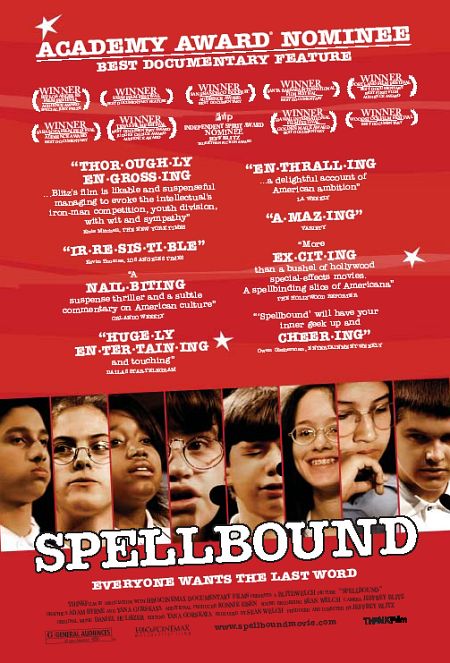
Third time's the charm here at Cinecultist. Two other times CC thought she might pop by the old Film Forum to catch up on this Spellbound movie (not the Hitchcock one where Gregory Peck's insane and Ingrid Bergman has to cure him) but it was sold out. As it finishes its run on Tuesday, CC bought a ticket online for a screening today after work and is now ready to report on the hype which has surrounded this little documentary.
The film follows eight middle school children who spend their every waking moment memorizing words for their local and regional spelling bees and are now on their way to the national competition in Washington D.C. The movie sells itself as slice of Americana with the children hailing from all sorts of regions, ethnicities and socio-economic backgrounds, but fortunately for CC's stomach, it doesn't partake in this Bush II-level hypocritical flag-waving sort of patriotism. You really have to admire the pluck and determination these kids have and surprisingly, the parents come across as mostly just supportive and not Mama Rose-esque. Actually, of all the kids I think I liked the spaz-y boy, Harry, who misspells "banns" the best. He keeps insisting that he missed it because the judge mispronounced the word for him.
In conclusion, lines around the block at Film Forum? Worth it.
Two Cinecultist correspondents watched Finding Nemo this weekend, then they had an IM chat about it.
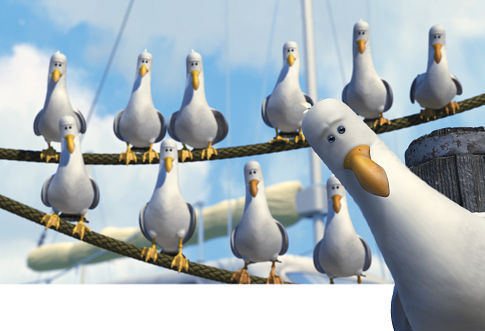
Karen: so, then. Finding Nemo? What’d you think?
Jordan: I really liked it.
Jordan: a nice fluffy response, surely the kind you were looking for.
Karen: yeah, that basically says it all.
Jordan: I wish Pixar was around when I was watching all those Disney movies when I was a kid, their animation is amazing.
Karen: Word.
Karen: but it’s not just the animation, it’s the story and the characters and the voices. It’s all so amazing.
Jordan: yeah, I like that the characters actually have different facial expressions, not just stock expressions. And they actually resemble the actors who are voicing them.
Karen: I like that about it as well. Although, do you think we read more into that because we can identify the voice's star persona?
Jordan: as opposed to people who don't know either who Albert Brooks is or that he's doing the voice?
Karen: right. But more so, I thought, with Ellen DeGeneres's voice and that her standup has such a distinctive, innocent point of view that translated so well into that character of Dory.
Jordan: yes, I agree. I think the connections that one can -- but doesn't necessarily have to- make between character and actor worked to the film's advantage. I agree that ED's star persona was a perfect match for Dory.
Karen: a review I read, said that they thought Albert Brooks played a similar character of Marlin to the one he has in the In-Laws only Finding Nemo's version was better. Why do you think that happens? Wouldn’t you think a less diluted version would be played out by the actor's real face? Or does that just show that Pixar had a better script, editor, etc?
Jordan: I think that in Nemo, and in any well-animated film, the voice/face isn't the only thing that carries a character. I think in this case, In-Laws vs. Nemo, that Pixar was able to integrate Brooks' voice into their visual landscape, so that his voice helped to strengthen what we saw, and vice versa, rather than in a live-action film like In-Laws where Brooks' face and voice had to do all the work.
Karen: how do you feel about digital animation versus hand-drawn? Do you think the difference can be measured, or deemed pejorative? ‘Cause I’m torn on the topic.
Jordan: me too. On the one hand, I’m amazed at what can be done with digital animation, how 'real' it looks. But I suppose I’m a bit old-fashioned too, since I like to think of animation as something that literally comes from pen and paper (or animation cell, whatever) But I’m not against digital animation either, as contradictory as that may seem.
Karen: some examples of hand drawn animation that I thought were quite evocative were last summer's Lilo and Stitch and the Iron Giant. There, the style was in the hyper drawn look of the figures.
Karen: but what Pixar does is really beautiful too, its style is distinctive and pleasing.
Jordan: I’d say then that the difference need not be pejorative, merely different, since I loved Lilo and Stitch.
Karen: I think what makes Lilo and Nemo both so great (besides their rhyming names) is that they both had a sense of an artistic vision. A cohesive concept behind the story, images and characterization that helped the whole thing along.
Jordan: yes, I agree. I also think what set them apart was the fact that they were smart. I know, ironically, that sounds dumb. But I think they were much more multi-layered than the standard Disney fare, and, since we both liked them, appealed to a wider age range than just grade-schoolers
Karen: but that's interesting that you grouped together "Disney fare" as a demarcation of bad animation when Lilo was made by Disney and Pixar is also a subsidiary of Disney. I think the mouse has become an evil force too, but then again they have the funding...
Jordan: yes, but I don't think that L&S or Nemo are examples of 'Disney fare'. I think the upcoming Sinbad or Brother Bear are more along the lines of the cookie-cutter Disney product. But it's true that the mouse does have the money...such a dilemma
Jordan: even though L&S and Nemo are made under the banner of 'Disney'.
Karen: yeah, it’s problematic. I group animation this way too, Disney v. non-Disney but I don't think it can be too easy. Maybe it’s about the producers. Because Titan A.E. stank and that wasn't a Disney, it was Don Bleuth and 20th Century Fox that put it out.
Karen: so, what else did you like about Nemo? Any dislikes?
Jordan: I liked all the little side characters. They had such personality. I especially enjoyed the sea gulls and the little French cleaning crab in the tank.
Karen: yeah, the gulls were great. They do sound like they say "mine, mine, mine..."
Karen: I’m not sure how I feel about so many animated movies killing parents. Do they really have to do that?
Karen: I imagine it must be traumatic for certain 4 foot viewers.
Jordan: it does seem to be a common theme in animated films to kill off mommy or daddy. but it seems to happen in a great deal of kids films in general, not just animated ones.
Karen: yes, I can understand with movies about teenagers that they can't really do anything with the parents there, but for little kid films it just seems sort of mean.
Jordan: And it seems more common to kill off both parents rather than just one.
Karen: I know my brother (age 6) is very sensitive to this kind of thing. But animation always has an inherent sense of violence in it, the slapstick element, but real bodily harm to the characters we like seems to be around every corner in Nemo.
Jordan: yes, my Mother kept whispering to me "what if Marlin dies too? What if Nemo dies?"
Karen: you could sort of imagine that it might happen in this movie. But then again, I worried that the main guy character in Amelie might die the first time I saw it. Maybe it’s just the sign of a film that's really working on us.
Jordan: yeah, I think that's probably it.
Karen: shall we wrap this up? Anything else you want to comment on?
Jordan: no, I think I’ve commented to my heart's content. Just an overall thumbs up.
Karen: from me as well. Good little movie.
Jordan: quite so.
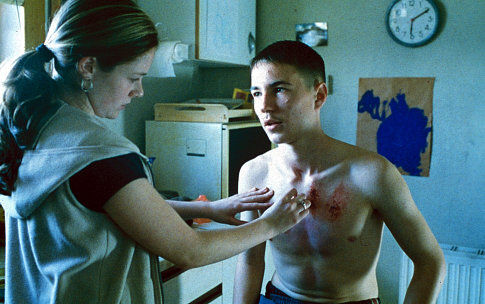
Will Ken Loach's new film Sweet Sixteen be depressing? Well, sure of course. Cinecultist knew this before she laid down her money. But honestly, its the waiting that kills us every time, waiting for that ax of tragedy to fall on the unsuspecting working class Scots.
Liam (arresting new-comer Martin Compston) gets kicked in the face by his mother's boyfriend and grandfather but not to worry, his sister, Chantelle takes care of him. He hatches the plan to sell heroin lifted from the evil boyfriend so to save enough money for a caravan to live in with his soon-to-be-released jailed mom. On paper, this sounds like a hair-brained scheme of a deluded young boy but Liam's smarts, charm and loyal friends like Pinball actually bring it all off. Until, of course, the fateful denoument. (*Sniff*). Just when CC got caught up in Liam's struggles, it all goes wrong in a moment.
Clear the schedule. See it. Bring the tissues. Go home and bury yourself underneath the duvet afterwards.
No real theme this weekend for the suggested viewing, as its all sort of scattershot. Here's some things CC correspondents will be looking into:
Asian Film Releases --
Together. Chen Kaige's new movie. Can this old school Fifth Generation director beloved for Farewell My Concubine et al. top the new mojo put out recently by the Sixth Generation bad boys?
Vampire Hunters. Hong Kong action expert Tsui Hark wrote and produces this bogey man epic. Supposedly the Vampires can suck from their victims at a distance. Cool.
Film Forum Stuff --
Spellbound still playing until June 3.
New additions include Chris Marker's latest Rememberance of Things to Come and a print of the Good, Bad and the Ugly, the Clint Eastwood spaghetti western classic. I know a few people who will be out there for that. Also BAM in Brooklyn is screening some Village Voice favorites from last year. So, if you missed the new Godard or the new Hou Hsio Hsien, here's another chance.
Best Bet --
Finding Nemo. The geniuses at Pixar bring us a little fish and his friends. Adorable.
CC Does Not Recommend --
Italian Job. Charlize Theron, Marky Mark Wahlberg and car thieves in Italy. Looks dumber than toast.
You know when you see someone so terribly awkward and embarrassing but that you see a modicum of yourself in and thus you can't help but cringe? This is the experience CC had as she realized she could name on sight all the screening spaces captured in Cinemania, a documentary about five extreme New York cinephiles. These fans find they must juggle their schedules to fit in all the screenings they'd like to attend, watching up to 5 movies a day, and consider themselves serious collectors of movie trivia.
There are bits of the movie where it drags, and parts where the film seems to unfairly mock their subjects making them seem particularly nutso. In these moments, the film seems to unnecessarily narrow its scope, separating these fanatics from those in the audience who might call themselves just fans. At the screening, CC attended with J a member of the audience turned around after the credits to ask who had seen more than one movie that day and everyone tittered, uncomfortably I might add. But really, what makes the director of AMMI, featured in the film who comments on the cinemaniacs, who's deemed legitimate for his cinephilia so different from these obsessives? Because he doesn't memorize running times of every film screened at his museum?
As J pointed out, it might have been more interesting to use these insular people to further understand the impulses that lead to cinephilia. Do they, and also us "normal" movie watchers, crave the escape? The perfect image made real? Or just the singular feeling of being in those seats as the house lights go down and the screen begins to flicker?
Read a good introspective review in the Press by Matt Zoller Seitz.

Things I learned about They Might Be Giants that I never knew before from their documentary, Gigantic: A Tale of Two Johns:
They were the first indie band to have videos on the fledgling MTV.
They came up in the performance art scene in the East Village.
They wrote the music to the opening of The Daily Show on Comedy Central, as well as a theme for the Austin Powers movie and Malcolm in the Middle (okay, I knew about Malcolm but not the others).
They play a huge stick with a mic on it in their live show (had heard the song, but guess I didn't see this stick at the shows I've attended).
They graced the cover of Paper magazine back in the day and had their first major review in People magazine before they'd even released their first full album.
Very cool people are fans of TMBG like Sarah Vowell, Ira Glass from NPR, Harry Shearer, Andy Richter, Jon Stewart, Michael McKean and they appear in the docu.
Gigantic is the best kind of music documentary in that it gives you information, behind the scenes access and a feel for what it's like to be at a show. Flansburgh and Linnell are wacky guys and it's a real testiment to their dedication to music and their prodigious talents that they've stayed so vital for so many years. The docu also made me desperate to see them live again, which I plan to on June 8 at Joe's Pub in the city. Yeah, TMBG! You've let loose the birdhouse in my soul. Again.
Cinecultist has said this in the past but, Comedy gets no respect. Your Russell Crowe or your Nicholas Cage can chew the scenery from here to kingdom come and get Oscars up the wazoo but a good comedian never can rest. Now, granted, Jim Carrey gets his share of accolades (ie. $20 million plus per picture) but it seems to be much easier to deride what he does, which he does very well. It's comforting, the way that Carrey's manic energy can overwhelm and yet be completely in control of the scene, it feels like an old funny shoe. Bruce Almighty is like a favorite pair of loafers. We've worn them loads of times before and we still like how they feel. But, as Owen Gleiberman argues in his review, it may be time for Carrey to break out into some new territory. However, for the time being, let's enjoy what we've got here: sweet little story about whining guy who get to be God for awhile. It's a Wonderful Lite. Jennifer Aniston = adorable. Morgan Freeman = wise God, likes the Yankees. Steve Carrell = steals this one scene with his Pentacostal speaking in idiot tongues. One particularly classic Carrey moment entails his heaving milk from a pitcher on a line of waiting children with very small cups. In slo mo. Dear me, these shoes sure are comfie.
Cinecultist thinks the theme of this week's viewing activities shall be documentaries, as there are a number of good looking ones in theaters right now. On CC's list:
Cinemania: a documentary about all the freaky, obsessive movie watchers in Manhattan. As a (slightly) obsessive watcher herself, CC has seen these people in action and is thrilled to see them immortalized in the medium they so adore. Check back for review, CC is set to see this little picture with her favorite cinemaniac, J., on Sunday.
Gigantic: Bloggers love They Might Be Giants (see Gothamist for evidence) and CC is no different. She still recalls that first concert at Stanford U. with L, B, B's sister and the infamous JR, when she was a mere 14 years of age. Between CC and L, they have all the albums produced by TMBG, and let me tell you, that's a lot of records. Various famous people like Janeane Garofalo and Dave Eggars support John and John in the docu and from the trailer CC saw last weekend, it also features a kick-ass soundtrack. A must see.
Spellbound: little kids in a national spelling bee has been the runaway hit at Film Forum. CC's going to go down to check out what all the hype's about and will report back.
Also on the list, if CC gets time:
Bruce Almighty (CC likes Jim Carrey, weird but true.)
Blue Car
Mediocre heist movies don’t usually get so pathetically bad as Confidence (2003, James Foley) so easily sinks to. Some intrinsic problems at the casting level alone: 1) diminuative granddad Dustin Hoffman in glasses on a string as scary independent mobster type? 2) Ed Burns as a confidence man smarter than the hair gel on his coiffed head? This movie wanted to be an Elmore Leonard/Steven Soderbergh ‘s Out of Sight but more Tarantino and a little bit of Dashiell Hammett femme fatale thrown in. Children, let’s not get our hopes up here, okay? It also had that annoying metacritical stance, ala John Travolta in Swordfish, as Hoffman says to Burns (twice no less, as the second is in flashback), “Sometimes too much style will kill ya.” Some other laughable moments for me included the post-synced absurdly loud unzip as Burns and the lovely but wasted here Rachel Weisz remove each other’s drawers and their backseat of the getaway convertable make out as the credits roll. I actually sort of felt sorry for the aging frat boys forced to sit next to me in the theater. I should have warned them that this is not the kind of movie I can take seriously and perhaps they’d not like their enjoyment tarnished by my inadvertent “gag me with a spoon” hand gestures and inappropriately timed cackles. But then again, maybe those kinds of guys need a little conscious raising.
What this girl wants on a lazy Sunday at the beginning of April, is a little Colin Firth, some sassy “girl power” and some cute fashions on said sassy girl. Lucky me, What a Girl Wants (2003, Dennie Gordon) is playing down the street. Amanda Bynes of various Nickelodeon programming and now a WB sitcom with Jennie Garth, plays the aforementioned girl, just a sweet bohemian downtown New Yorker, who’s mom, Libby (Kelly Preston) met a titled Englishman in Morocco, Henry (Firth) and fell in love. Except the powers-that-be in his stuffy politico family sent Libby packing and so she raised her daughter, Daphne on her own. At 17, Daph decides to take off for London to find her father and hopefully, herself in the process. This movie is really about the favorite Hollywood convention: the swinging hip American versus the stuffy, emotionally shut-off but rich nonetheless Brits. Everyone plays their clichés to the hilt, particularly Firth with his oddly Hugh Grant circa-Four Weddings and a Funeral fussy stuttering. Bynes comes across as likeable and natural, despite the moments of physical comedy having a wannabe Lucille Ball pratfall-ishness to them. The camera in this movie loves to see Bynes fall flat on her ass and then jump cut to her shiny brunette head popping back up, no worse for the wear. An attempt at comedy in editing, I suppose. Watching the movie set me to ruminating on Kelly Preston, as in, has this woman ever turned in a good performance? How does she stay in the movie industry, on her flaxen head and odd L.Ron-Hubbard-loving marriage to John Travolta alone? In the scenes between her and the otherwise passable other actors in the picture, she practically sucks the thespian right out of them. A quick search on her filmography, care of IMDB, reveals that perhaps her best cinematic moment was yelling at Tom Cruise to “never stop fucking me” in Jerry Maguire, because prior, its Addicted to Love, Jack Frost and Battlefield Earth as far as the eye can see.
This fascination with holding for just too long within the camera’s gaze the repulsive as well as an obsession the evils of the anus can also be found in Irreversible (2002, Gaspar Noé), a film I went to see later in the day. A strangely misogynist and homophobic movie, despite its hetero masculinity revenging the defilement of the woman plot and the mourning for an afternoon between lovers marred by tragedy to come narrative. Real life husband and wife, Vincent Cassell and Monica Bellucci, play the lovers who’s story of a hellacious day is told in reverse, with each scene blending into the one which brought it on, by way of dizzying hand held pans to the ceiling. In fact, the film’s almost exclusive use of hand held camera work made me want to vomit, not for it’s lack of taste or polish, but for the sheer fact of feeling like you’re being jounced around in the bed of pick-up on an unpaved road throughout the picture. Noé uses his wayward camera to penetrate his places and moments of ultimate heterosexual male fear, like the S&M gay male club called without irony, the Rectum which his protagonist and friend searches for La Tenia, the Tapeworm, a name also bestowed with scant parodic self-awareness. Unfortunately for his viewers, Noé does know how to hold an uncomfortably long shot and does so, during the nearing-infamy sequence when La Tenia anally rapes Bellucci’s character in an underground walkway. In these moments, the brutal bashing in of a club patron confused for the rapist included, the viewer longs for distraction, or at least for an eventual ejaculation, but Noé makes them a long time coming (no pun intended). Instead, he appears to want to revel in all the voyeuristic possibilities the camera offers, whether it be menacingly following a naďve Bellucci two steps behind down the corridor, when we know she’s about to be assaulted, or while Bellucci and Casell cavort intimately nude in the way long time lovers reside just beyond each other’s skin. All of this detailed looking and yet, I’m not sure ultimately what it is that Irreversible sees.